





























To maximise client satisfaction through exceptional client care and world-class financial advice and expertise.
Solidity, ethics, credibility and openness are hallmarks of JMMB as experts in all aspects of our operations.
To be a dynamic, international, multifaceted financial group with a caring, loving and fun environment where team members are productive, creative, happy and fulfilled.




We promise to keep your best interest at heart, and we will do so by listening to, understanding and caring for you and your family’s unique needs, exceeding your greatest expectations by providing simple, transparent solutions oriented around you and your family’s life goals.

































August 5, 2024
Dear Valued Shareholder,
RE: JMMB GROUP LIMITED ANNUAL REPORT AND ANNUAL GENERAL MEETING (AGM)
We are pleased to invite you to our Annual General Meeting (AGM) on September 23, 2024, where we will share the results of our performance for the financial year ended March 31, 2024, and also discuss our strategic plans for the near future.
The Notice of AGM can be found on page 11 of this Annual Report.
For the convenience of all shareholders, the AGM will be held in a hybrid format, with both in-person and online live-streamed components. The details regarding how shareholders can join the AGM via the online live stream is available in the enclosed Notice of the AGM and will be published in the national newspapers and on our website. An email advisory will also disseminated to all shareholders for whom we have a current email address.
Should you require a hard copy of our annual report, please contact our Company Secretary at shareholderquery@jmmb.com.
Finally, we would also like to take this opportunity to thank you for your partnership and for choosing to be a part of the JMMB family.
Sincerely,
JMMB GROUP LIMITED
Archibald Campbell, CD, DBA, FCA GROUP CHAIRMAN


NOTICE IS HEREBY GIVEN that the ELEVENTH ANNUAL GENERAL MEETING of JMMB GROUP LIMITED (the “Company”) will be held on MONDAY SEPTEMBER 23, 2024, at 10:00 a.m. (Jamaica) in a hybrid format (i) at the Jamaica Pegasus Hotel Kingston, located at 81 Knutsford Boulevard, Kingston 5 Jamaica, for attendance in person, and (ii) via electronic means* in accordance with the provisions of the Companies Act of Jamaica 2004 (as amended) to consider and if thought fit, to pass the following ordinary resolutions:
1. TO RECEIVE THE REPORTS OF THE DIRECTORS AND AUDITORS AND THE AUDITED ACCOUNTS FOR THE TWELVE (12) MONTHS ENDED MARCH 31, 2024.
“THAT the Reports of the Directors and Auditors and the Audited Accounts for the year ended March 31, 2024, circulated with the Notice convening the meeting be and are hereby adopted”.
2. TO RATIFY INTERIM DIVIDEND PAYMENTS AND DECLARE THEM FINAL.
“THAT the interim dividends of Twenty-Five Cents (25¢) paid on October 9, 2023 and Twenty-Five Cents (25¢) paid on August 12, 2024, making a total of Fifty Cents (50¢) for the year under review be and are hereby ratified and declared as final and that no further dividend be paid in respect of the year under review.”
3. TO RE-APPOINT DIRECTORS RETIRING BY ROTATION PURSUANT TO ARTICLE 105
The Directors retiring from office by rotation pursuant to Article 105 of the Company’s Articles of Incorporation are Dr. Archibald Campbell, Mr. Andrew Cocking, Mrs. Donna Duncan-Scott, and Mr. Dennis Harris, all of whom, being eligible, offer themselves for re-election.
To consider and (if thought fit) pass each of the following resolutions:
Resolution 3 (a):
“THAT Dr Archibald Campbell be and is hereby re-elected a Director of the Company.”
Resolution 3 (b):
“THAT Mr. Andrew Cocking be and is hereby reelected a Director of the Company.”
Resolution 3 (c):
“THAT Mrs. Donna Duncan-Scott be and is hereby re-elected a Director of the Company.”
Resolution 3 (d):
“THAT Mr. Dennis Harris be and is hereby reelected a Director of the Company.”
4. ELECTION OF DIRECTORS OF OTHER RETIRING DIRECTOR PURSUANT TO ARTICLE 108
In accordance with Article 108 of the Articles of Incorporation, the following Director, having been appointed during the year, retires and is eligible for re-election.
“That Director Nerisha Davis Farquharson, having been appointed during the year, be and is hereby elected a Director of the Company.”


“THAT KPMG, Chartered Accountants, having agreed to continue in office as auditors, be and are hereby appointed auditors of the Company to hold office until the end of the next Annual General Meeting at a remuneration to be fixed by the Directors of the Company.”
“THAT the amount included in the Audited Accounts of the Company for the year ended March 31, 2024, as remuneration for their services as Directors be and is hereby approved.”
Dated this 24th day of July 2024
By Order of the Board
Carolyn DaCosta Secretary
REGISTERED OFFICE
6 Haughton Terrace Kingston 10, Jamaica.
NB: A member entitled to vote at the meeting is entitled to appoint a Proxy to attend and vote in his stead. A Proxy need not be a member of the Company. Enclosed is a Proxy Form for your convenience, which must be lodged at the Company’s Registered Office at least forty-eight (48) hours before the time appointed for holding the meeting. The Proxy Form shall bear the stamp duty of J$100.00. The stamp duty may be paid by adhesive stamp(s) to be cancelled by the person executing the Proxy Form.
INSTRUCTIONS TO PARTICIPATE IN JMMB GROUP LIMITED (JMMBGL) 11TH ANNUAL GENERAL MEETING (AGM)
JMMBGL AGM will be held in person as well as virtually. Shareholders will be able to participate online via a private link (subject to registration) and will be able to vote on matters arising at the meeting.
All registered shareholders, regardless of geographic location, will therefore, have an equal opportunity to participate in the AGM and engage Directors and team leaders of the business.
The AGM will be streamed live on our website, https://jm.jmmb.com/AGM as well as on the JMMB Group Facebook page and YouTube channel.
In order to attend virtually and participate (including voting) in the AGM as shareholders, you are required to register in advance for this meeting on the link below:
https://jm.jmmb.com/AGM
You will need your Jamaica Central Securities Depository or Trinidad and Tobago Central Depository account number in order to register and vote. After registering, you will receive a confirmation email containing information about joining the meeting.
After registration and verification, shareholders will receive a unique link granting them authorized access to the private link to enable attendance and participation at the AGM.
This unique link is confidential to the shareholder to whom it is issued and should not be shared with a third party. By applying for and receiving this unique link, each shareholder will be deemed to


have irrevocably represented to JMMBGL that it will be used only by such shareholder and no other person to gain access to the AGM.
As a non-shareholder, you can participate in the AGM but will not be able to vote.
We encourage shareholders to vote by proxy (where applicable) using the Proxy Form. We also encourage you to email us your questions ahead of time to shareholderquery@jmmb.com and we will do our best to respond to your questions during the meeting, time permitting.
Electronic copies of this Notice of Annual General Meeting and the Proxy Form, as well as Minutes of the AGM, may be accessed on www.jmmb.com.



Jamaica Money Market Brokers Limited opened its doors in November 1992 as the first money market broker in Jamaica, marking the beginning of a legacy built on core values of integrity, care, honesty, and openness, underpinned by a Vision of Love. Twenty-nine years later, JMMB Group Limited was formed as the parent of a Group of Companies, including Jamaica Money Market Brokers Ltd. The Group of Companies now serves over 489,000 clients and their families in Jamaica, Trinidad and Tobago, and the Dominican Republic.
Genuine care for clients, credibility, talent, and expertise have catapulted the Group of Companies into a dynamic, international, multi-faceted financial institution. Unlike most, JMMB is committed to heart-to-heart connections and providing genuine, caring relationships while proactively delivering personalized financial solutions across banking, investments, money transfer, and insurance brokerage services.
In 2015, Jamaica Money Market Brokers Limited, under an approved Scheme of Arrangement, became JMMB Group Limited, the holding Company of the Group of Companies (‘the Group’), which includes: JMMB Bank (Jamaica) Limited, JMMB Money Transfer Limited, Jamaica Money Market Brokers Limited, JMMB Insurance Brokers Limited, JMMB Fund Managers Limited, CCSPV Limited (formerly Capital & Credit Securities Limited), JMMB Real Estate Holdings Limited, JMMB International Limited, JMMB Securities
Limited, Jamaica Money Market Brokers (Trinidad and Tobago) Limited, JMMB Investments (Trinidad and Tobago) Limited, JMMB Securities (T&T) Limited, JMMB Bank (T&T) Limited, JMMB Express Finance (T&T) Limited, JMMB Holding Company SRL, Banco de Ahorro y Crédito JMMB Bank, S.A., JMMB Sociedad Administradora De Fondos De Inversion, S.A., JMMB Puesto de Bolsa, S.A., and AFP JMMB BDI, S.A.
This portfolio of companies has positioned the Group to become a financial force to be reckoned with, not only regionally but in the broader international marketplace. This has significantly strengthened its ability to truly deliver partnerships with clients to help them achieve their life goals.
The Group’s commitment to corporate social responsibility is actualised through the JMMB Joan Duncan Foundation. The Foundation seeks to positively impact individuals, communities, and the nation through transformational projects aimed at unearthing individual greatness, resulting in a paradigm shift in attitudes and behaviours. This effort is carried out primarily through nationbuilding projects, educational and transformational training, as well as entrepreneurial transformation and hands-on community involvement.
The Group is committed to maximizing client satisfaction through exceptional client care, worldclass financial advice and expertise, solid ethical business practices, and its Vision of Love. Since the birth of Jamaica Money Market Brokers Limited in


November 1992, the now Group of companies has continued to grow and thrive in an ever-evolving and increasingly globally competitive financial industry, achieving several key milestones:
• October 2023: The JMMB Group officially began operations in Barbados through its whollyowned subsidiary JMMB International Limited (JMMB International).
• December 5, 2019: JMMB Group Limited acquired 33,213,764 common shares of Sagicor Financial Company Ltd. (Sagicor), resulting in approximately 22.5% ownership, which has now increased to 23.44%. Sagicor is now an associated company of JMMB Group.
• September 12, 2018: JMMB Group operations in Trinidad and Tobago launched JMMB Express Finance (T&T) Limited, providing consumer financing solutions based on financial inclusion, fair pricing, and quick response.
• August 14, 2017: The transition from JMMB Merchant Bank to JMMB Bank in Jamaica marked the Group’s entry into the commercial banking sector.
• April 13, 2015: Under an approved Scheme of Arrangement, Jamaica Money Market Brokers Limited was delisted from the Jamaica Stock Exchange (JSE), Barbados Stock Exchange (BSE), and Trinidad and Tobago Stock Exchange (TTSE), and relisted as JMMB Group Limited.
• 2013-2016: JMMB acquired 50% shareholding in Intercommercial Bank Limited (IBL) in 2005 and later gained full ownership. IBL Bank was rebranded to JMMB Bank on May 2, 2016.
• June 29, 2012: JMMB acquired the Capital & Credit Financial Group (CCFG) in Jamaica, expanding its services to include banking, remittance, and unit trust products.
• October 2007: JMMB Puesto de Bolsa opened in the Dominican Republic to develop the money market.
• November 1992: Jamaica Money Market Brokers Limited (JMMB) opened as Jamaica’s first money market broker.
The JMMB Group is poised for even greater success as it continues to streamline operational synergies and build out core business lines by investing in infrastructure, technology, and training, as well as improving service channel delivery. All phases of the Group’s journey have been birthed out of a vision to ultimately build a regional financial services entity equipped with all the solutions necessary to help individuals and businesses achieve their dreams.



At JMMB, we believe in the power of love to uplift our clients, team members, and communities. Together, we achieve greatness by giving our best with pure intentions.















GROUP CHAIRMAN



We are pleased to submit the Annual Report for the JMMB Group Limited for the year ended March 31, 2024. The JMMB Group posted a net profit of J$11.85 billion and operating revenue net of interest expense of J$22.29 billion. Earnings per share stood at J$5.92.
During the Financial Year, the Group and its subsidiaries continued to perform well, presenting a strong financial performance compared to the preceding year, and against a backdrop of persistent challenges in the global and local operating environments.
The Group’s financial results reinforce our confidence in our Diversification Strategy which continues to yield great rewards. Our carefully developed mix of complementary businesses and investments remain a key competitive advantage. It provides us with crucial balance and diversification across geographies, and a variety of risks, helping us deliver effective solutions to our clients and distinctive value to our shareholders.
The JMMB Group’s strategic investment in Sagicor Financial Company Limited (SFC) provided a significant contribution to our overall profitability, which saw positive returns for the Group. We have also had steady contributions from Jamaica, Dominican Republic, Trinidad and Tobago.
Overall, the core operations of the JMMB Group remain robust, and the Group expects to see growth in its key business lines, banking, and investments, in the medium and long term.
A more in-depth analysis of the performance of each business line and of our overall results is presented in the Management Discussion and Analysis Section of this Report.
In October 2023, the JMMB Group expanded its regional footprint into Barbados, as we continue to bring diversified financial options to our regional clients. This is a significant milestone for the Group which now sees JMMB operating in four (4) countries in the Caribbean: Jamaica, the Dominican Republic, Trinidad and Tobago and Barbados.
Our focus on our Client Experience and execution of our Client Partnership Strategy remains a key hallmark of the overall JMMB Group Strategy. Throughout the year, the team worked assiduously in the areas of centralisation, standardisation and digitisation of its processes, systems and technology to improve the client experience across the Group.
We continued to pursue our Digital Strategy and further enhanced our Digital Capabilities with the launch of our Mobile Application Solution. This solution was designed to provide clients with efficient, convenient, and secure access to our services, which is in alignment with our client value proposition of providing a seamless multi-channel experience.
The Board believes the continued focus on innovation and building out our Digital Capability will enable the JMMB Group to capitalize on the opportunities in our industry to drive long-term value for all our stakeholders.
Another key focus of our Group Strategy throughout the year was to improve our operational efficiency and optimize our cost structure across the region, with key focus on Jamaica. We implemented several initiatives and will continue to leverage our shared services model in this area. By enhancing our operational efficiency, we are able to deliver greater value to our clients and shareholders,


while maintaining our high standards of compliance and risk management.
The JMMB Group once again achieved high creditworthiness ratings from CariCRIS in the year 2023. The rating signaled that JMMBGL’s governance structure, risk management practices and robust capitalisation standards. The Board is proud of this achievement as we continue to work in partnership with the executive and management team to maintain good governance in executing our strategy and management of the Group’s operations.
During the Year one of our long-serving Director, Mr. Hugh Duncan, retired from the Board of JMMB Group Limited and its subsidiary JMMB Financial Holdings Limited effective March 31, 2024. Hugh has been an integral part of our organisation, contributing significantly to the growth of the JMMB Group for over twenty years.
On behalf of the Board and the entire JMMB Group, I would like to express our sincere gratitude and appreciation to Hugh for his outstanding service and contribution as a Director of the Group Board.
We continue to add expertise and skills that will add value to our Group’s Governance. As such, we welcomed Mrs. Nerisha Farquharson as a new non-executive member of the Group Board of Directors. Nerisha is a chartered financial analyst (CFA) with extensive experience and knowledge in private markets, financial risk, trading, portfolio and treasury management, investment and corporate strategy formulation and value chain optimisation.
We look forward to benefiting from her experience, insights and perspectives and are confident that she will make a valuable contribution to the JMMB Group.
The work and contribution of our Board of Directors throughout the year was thorough and vital for the performance of the Group. Your commitment to the success of the JMMB Group and your emphasis on good governance augurs well for the future.
We also wish to commend the management team for their expertise, commitment and responsiveness to the market environment, which enabled us to deliver strong results. We further extend our gratitude to all team members across the Group for their efforts and for rising to the challenges during another year of difficult and unpredictable market conditions.
To our valued shareholders and clients, we say thank you for your confidence in us and for your support. Your belief and trust in the JMMB Group propels us to continue on our path of success.
As we enter the Year ahead, we remain cautious about the pressures in our economic environment and the possible impact on our Business Lines in the markets in which we operate. We nonetheless expect our continued prudent management strategies twinned with the expertise and steadfastness of the leadership team, to continue driving our operations to deliver strong results. We remain focused on capitalizing on the opportunities that lay ahead and look forward to partnering with all our stakeholders to achieve our overall Strategic Objectives.
Archibald Campbell, CD, DBA, FCA GROUP CHAIRMAN



We build lasting relationships through genuine care and support.





CAMPBELL CD, DBA, FCA CHAIRMAN
Archibald is the Chairman of JMMB Group Limited and a number of its Subsidiaries, as well as the Board of Trustees of the JMMB Pension Fund. Prior to this, he served as a Director at the University Hospital of the West Indies. He was also a member of the Sugar Industry Divestment negotiation team, a trustee of two pension funds and a Director of several companies, including hotels, property management companies, banks, tertiary-level institutions and several nonprofit organisations. He was a lecturer at the University of the West Indies (UWI), where he taught accounting and risk management for a banking degree. Archibald also served as Bursar of the UWI and Chief Financial Officer, responsible for maintaining relations with the seventeen (17) contributing Caribbean countries regarding funding. He is a chartered accountant and a member and past president of the Institute of Chartered Accountants of Jamaica (ICAJ). He was presented with the Distinguished Member Award for 2020 by the ICAJ for his outstanding contribution to the institute and the accountancy profession.
In 2021, the Government of Jamaica awarded him The Order of Distinction, Commander Class (CD), for exemplary service to his profession in accounting and finance. Archibald is a published author and speaker in the accounting and finance sectors. Archibald is an unmatched resource with a Doctorate in Business Administration (DBA) and an M.Sc. in Accounting from the University of the West Indies, extensive international training and certification, and over 40 years of experience in the banking industry.
KEITH DUNCAN CD EXECUTIVE DIRECTOR
Keith is an Executive Director and the Group Chief Executive Officer of the JMMB Group of Companies and has responsibility for overall performance and charting the strategic direction of the Group.
His financial expertise has not only benefited the JMMB Group but also the Jamaican financial sector. Keith served as President of the Private Sector Organisation of Jamaica (PSOJ) for the period 2019 - 2022, which was during unprecedented times of the COVID-19 Pandemic. He also served as a Vice-President of the PSOJ throughout 2013 – 2015, and is currently Co-Chair of PROJECT STAR - A partnership for social & economic transformation In Jamaica. Keith Duncan is a Past President of the Jamaica Securities Dealers Association (JSDA) and continues to contribute his service to Jamaica through various roles, including his current appointment as Chairman of the Economic Programme and Oversight Committee (EPOC). He is also the immediate Past Chairman of the National Information and Communications Technology Advisory Council (NICTAC), which provides advisory services to the Ministry of Science, Energy and Technology in relation to its’ ICT Portfolio.
Under his leadership, the JMMB Group was conferred with the American Foundation for the University of the West Indies (AFUWI) Award for Excellence in Business Leadership in February 2020 and the prestigious ‘Best of Chamber Award’ from the Jamaica Chamber of Commerce in March 2011. Known for his commitment to youth development, Keith served as Chairman of the National Youth Service from 2003 to 2009. He worked closely with the respective boards and teams to fulfil the mission of creating and reforming Jamaica’s youth to become purposeful citizens. Mr. Duncan is also a founding member of the YUTE Programme in Jamaica (Youth Upliftment through Employment). In 2020, Keith was awarded the National Honour, the Order of Distinction, in the rank of Commander, by the Government of Jamaica for his exceptional service in Finance, Business, Youth Empowerment and Community Development. In April 2022, Keith received the International Achievement Award from The American Friends of Jamaica (AFJ) for his leadership and work in National Development. He holds the Chartered Financial Analyst (CFA), a professional financial designation.




DR. ANNE CRICK INDEPENDENT DIRECTOR
Anne holds a Master’s degree and a PhD in Organisational Management. She is a senior lecturer, former Associate Dean, and department head at the Mona campus of the University of the West Indies in the Faculty of Social Sciences. Anne has served on several boards in Jamaica, including HEART Trust NTA, the University Council of Jamaica Hospitality and Tourism Advisory Board, the College of Insurance and Professional Studies (CIPS) and the Jamaica Association for Training and Development. In addition to being an extensively published author, she brings to the JMMB Group a wealth of knowledge and experience in managing large teams and developing senior leaders in private-sector organisations. She is a JMMBGL’s Culture and Human Development Board Committee member and chairs its Nomination and Corporate Governance Committee.






ANDREW COCKING INDEPENDENT DIRECTOR
Andrew started his banking career at Citibank in 1985. Andrew brings to the Group over 37 years of experience in banking, with over 33 years at the senior management level. He started his banking career in 1985 at Citibank. Andrew’s areas of expertise include treasury management, information technology, mergers and acquisitions, risk management, banking, finance, administration and emerging trends in finance & banking, with a particular interest in technology. Andrew has served on many public and private boards, including Cable & Wireless Jamaica Limited and HEART Trust NTA. As one of the founders of Capital & Credit Financial Group, Andrew served as Deputy Group President of Capital & Credit Financial Group and an independent consultant. He currently serves on the board of Regency Petroleum Company. Before assuming those positions, he served as President and CEO of Capital and Credit Merchant Bank for 11 years.
PATRICIA DAILEY-SMITH INDEPENDENT DIRECTOR
Patricia brings to the JMMB Group over 25 years of experience and has an inexhaustible reservoir of knowledge in accounting, audit and finance. Patricia is a member of JMMBGL’s Audit and Compliance Committee and the Chair of JMMBGL’s Board Finance Committee. Patricia retired from the position of Audit Partner at KPMG, having served the firm locally and internationally at varying senior management levels. While at KPMG, Patricia managed large portfolios covering a broad cross-section of industries, including banking, insurance and other financial services, telecommunications, hospitality, leisure and tourism, manufacturing, healthcare, Government and education.


AUDREY DEER-WILLIAMS INDEPENDENT DIRECTOR
Audrey is the Chief Technical Director assigned to the Social Security Division of the Ministry of Labour and Social Security. She worked in various capacities in the United States in the financial services sector. She is a distinguished public servant whose extensive training and expertise in a multiplicity of areas has made her an invaluable resource to the JMMB Group. Audrey holds an undergraduate degree in Economics and Accounting and a Master’s in Business Administration from Manchester Business School, Manchester, England. She is the Chair of the Group Culture and Human Development Committee and sits on the JMMBGL Board Risk Committee.




DONNA DUNCAN-SCOTT EXECUTIVE DIRECTOR
Donna is passionate about building and maintaining the love-based culture, which supports the Group’s competitive advantage. As an authentic, principled, love-based leader, she works with the Culture and Human Development Team (CHDT) to create and implement the people-operating frameworks, people policies, processes, and practices that develop and maintain our unique culture. The CHDT supports team members to “realise the greatness within, to the benefit of themselves, our clients, the organisation and the society” (Our Vision of Love). She also has extended this transformational thinking to developing the Conversations for Greatness programme, which provides individuals with the tools for mindset change to increase the experience of love and possibility thinking in the world.
Donna holds a Bachelor’s degree in Industrial Engineering from UWI, St Augustine, and a Master of Business Administration from the Richard Ivey School of Business at the University of Western Ontario in Canada. She also holds the prestigious international Chartered Financial Analyst professional designation.
With the birth of her two daughters in quick succession, she chose to swap the emotionally demanding role of the Group CEO, which she assumed after her mother’s passing and co-founder of JMMB, for the role of Group Lead for the Culture and Human Development Team. This allowed her to focus on her passion for creating spaces for individuals to realise their greatness through motherhood and organisational transformation. During her five years at the Company’s helm, she led the team in becoming a full-service brokerage company, expanding regionally and growing our brokerage client base to the largest in the Caribbean.


Donna is the recipient of several awards, most notable of which include the Jamaica Observer Business Leader Award in 2002 for her stellar leadership, then at the helm at JMMB, and later the Lifetime Achievement Award in 2017 for outstanding contribution to the field and her unwavering commitment to Jamaica. In 2022, Donna was awarded the AFJ International Humanitarian Award and The JHUAN Impact Award for work that embodies excellence in truth and service and has positively impacted the broader community.
REECE KONG INDEPENDENT DIRECTOR
Reece has over three decades of experience as an information technology professional. His experience includes developing an Automated Fingerprint Identification System (AFIS) for electronic voting and deploying some of the largest Document Image management systems in the islanding. He was also the lead developer and project manager for developing and deploying Jamaica’s first computerised Government Accounting System.
Reece started his company in 1998– RMP & Associates Limited, which has grown to be one of Jamaica’s leading technology firms, providing expertise to various government agencies, financial institutions and other corporate entities. Most notably, Reece and his company were responsible for developing the Government of Jamaica’s Central Treasury Management System (CTMS), a vital tool in the Government’s IMF-guided financial restructuring. He chairs the Information Technology Board Committee and is a member of the Board Risk Committee.


DENNIS HARRIS INDEPENDENT DIRECTOR
A certified accountant with over 40 years of experience both locally and internationally, Dennis brings an unparalleled wealth of experience and knowledge in the area of finance and strategic business management. Dennis served as the Managing Director of Unicomer (Jamaica) Limited (which trades as Courts, Lucky Dollar, Ashley, Ready Cash and Radio Shack) from 2011 until his retirement in August 2021. He was also the Executive Leader of the Courts USA stores in New York and was the Chairman of Trustees for the company’s pension plan. Prior to his appointment as Managing Director, he served as Regional Finance Director of Courts Caribbean with responsibility for Finance, Consumer Credit and IT, and before that, as Deputy Managing Director of the Courts Jamaica operations with responsibilities that included Marketing, IT and Consumer Credit.
Dennis qualified as an accountant (FCCA) in the UK and, before his return to Jamaica, worked as Finance Director in the United Kingdom, including finance oversight of a Dutch subsidiary.
In addition to his position on the JMMB Group Board, Dennis also Chairs the Board of JMMB Bank Jamaica and the Group Board Risk Committee. Dennis serves as an Independent Director of Sagicor Financial Company Limited (SFC), which trades on the Toronto Stock Exchange, and Gallagher Caribbean Group Limited, the largest insurance brokers in the Caribbean. He also serves as Chairman of the Audit Committee for SFC.




NERISHA DAVIS FARQUHARSON CFA NON-EXECUTIVE DIRECTOR
Nerisha has over 15 years of experience in investment management, portfolio risk management, treasury management, securities trading, and business strategy formulation. Her extensive exposure spans public and private markets, value chain optimisation, business valuation, and acquisitions and mergers. For the last four years, Nerisha has fully immersed herself in the private capital ecosystem, where she substantively functions as an Operating Partner.
Nerisha is the CEO of Private Capital, PROVEN Group Limited, where she leads the division focused on proprietary investments in private Debt and Equity. The role includes strategic oversight and execution of the private capital life cycle from due diligence, integration, value creation and exit. She holds a BBA in Finance from the University of Technology and an MBA in International Business from the University of the West Indies, Mona. Nerisha has been a CFA Charter Holder since 2012 and is currently a Board member of the Caribbean Alternative Investments Association and a Director of Roberts Manufacturing Company Limit in Barbados. Nerisha is creative at heart and passionate about ‘paying it forward’ and currently curates a few platforms that mentor teenage girls and young professionals. Her guiding mantra is ‘you may not be able to change the world, but you can make a difference one deed at a time’.
Leighton brings to the Board over 36 years of extensive and diversified experience in audit, taxation, financial management, reporting, business advisory services, and management consulting.
Territory Leader/Senior Partner of PricewaterhouseCoopers (PwC) Jamaica, one of the premier professional services firms on the island. Leighton was also the firm’s markets’ leader and a PwC Caribbean Region’s Core Leadership team member, where he served as the Diversity, Equality & Inclusion Leader. He also served as the region’s Advisory Leader and locally as managing partner, assurance leader and human capital leader.
Leighton is a graduate of the University of the West Indies, a graduate of the Chartered Association of Certified Accountants, a Fellow member of the Institute of Chartered Accountants of Jamaica, and a Fellow member of the Association of Chartered Certified Accountants. He is an Executive in Residence at the Mona School of Business and Management at the University of the West Indies, Mona Campus. Mr. McKnight is a renowned member of the Kiwanis International movement and a trustee on its Eastern Canada & the Caribbean District board. He has given decades of service to this organisation, and his contributions have been recognised with several prestigious awards.
In 2013, the Government of Jamaica appointed Leighton to the Order of Distinction, Commander Class, for outstanding contributions to Public Service, Philanthropy, and Community Service.






H. WAYNE POWELL O.D, J.P INDEPENDENT DIRECTOR
Wayne is a Business, Financial and Leadership Consultant who served as Vice-President at Scotiabank International, serving the English-speaking Caribbean, and Executive VicePresident at Scotiabank Jamaica. He has been recognized at the national level, Order of Distinction, for his extraordinary contribution to the banking sector in Jamaica. As a finance, business and leadership consultant, Wayne brings to the JMMB Group over 45 years of knowledge and experience in the financial sector, both locally and internationally. He is also known for his contribution to nation-building as a Commissioner on the Integrity Commission of Jamaica and a Justice of the Peace, as well as through his membership and Past President of the Rotary Club of New Kingston. Wayne also serves on charitable organisations, including as the Chairman of the Open Arms Development Centre Limited.
Wayne sits on several corporate and public sector boards and is a member of the JMMB Group’s Audit, Finance, and Culture & Human Development Board Committees. He is a Director of JMMB Bank and Chairman of the Bank’s Board Credit Committee. Wayne also serves as Chairman of the Diocesan Financial Board for the Diocese of Jamaica and the Cayman Islands.
WAYNE SUTHERLAND NON-EXECUTIVE DIRECTOR
Wayne is a professional investor and a First Angels Investor group member. He previously served as the Managing Director of Butterkist Limited and Jamaica Venture Fund Limited, as a Senior Director of Air Jamaica Ltd, and as a Commissioner of the Jamaican Securities Commission.
He has invested in over ten companies over the past 12 years. Wayne currently serves the JMMB Group in many areas; he is Chairman of JMMB Investments (Trinidad and Tobago) Limited and JMMB Securities (T&T) Limited. He is also a Director of JMMB Bank (T&T) Limited and JMMB Express Finance Limited (T&T). Wayne holds a Bachelor of Science degree from the University of the West Indies and an MBA from the Columbia University Graduate School of Business. He is a member of JMMB Group’s and the T&T subsidiaries’ Board Audit Committees. Wayne is also a Nominations and Corporate Governance and Information Technology Board Committees member.




AUDREY WELDS INDEPENDENT DIRECTOR
Audrey has distinguished herself as an outstanding Attorney-at-Law in the private and public sectors, with a career spanning over 40 years. Audrey is also an active member of the legal fraternity who has served on several sub-committees of the Jamaican Bar Association and currently serves on the Accounting Reports Committee and the Proceeds of Crime Act Committee of the General Legal Council.
Audrey holds an LL.B. degree from the University of the West Indies, an LL.M. from King’s College, London and a LEC from the Norman Manley Law School. She has been a Norman Manley Law School Course Director for over 15 years.




V. ANDREW WHYTE INDEPENDENT DIRECTOR
Andrew is the Chief Investment Officer at Jamaica Producers Group (JPG), a company listed on the Jamaica Stock Exchange (JSE), having served as Group Treasurer for several years. Before JPG, he also worked in the financial industry for several years. As an Independent Director, he currently serves as Chairman of the Audit and Compliance Committee, as well as a member of both the Risk and Finance Committees and a board member of several subsidiaries.
Andrew has a Bachelor’s degree in Chemical Engineering and a Master’s in Business Administration. He also chairs the Board of Trustees of Emmanuel Christian Academy, a preparatory school.
CAROLYN DACOSTA JP CORPORATE SECRETARY
Carolyn has served as Corporate Secretary for Jamaica Money Market Brokers Limited and its subsidiaries since March 16, 2008, and for JMMB Group Limited since its incorporation in May 2012. As someone who “grew up” in the organisation, she brings a unique combination of technical skills, experience, and invaluable institutional knowledge to these critical roles. In her role, she ensures that appropriate and timely information is provided to the Board and its committees and is responsible for advising and supporting the Chairman and Board on governance and regulatory matters.
Carolyn holds a certification in Corporate Governance from Harvard Business School, an MBA in Finance, a Diploma in International Compliance from the Manchester Business School in the UK, a Bachelor of Laws degree from the University of London and a Bachelor of Arts degree from the University of the West Indies Mona. Additionally, Carolyn is a Fellow of the International Compliance Association and a Justice of the Peace for the parish of St. Catherine.
Carolyn offers proven, reliable and consistent support to the Board of Directors and Shareholders while, in true JMMB fashion, building real, heart-to-heart connections across the JMMB Group and the Jamaican financial sector.













Based on the International Monetary Fund’s (IMF) World Economic Outlook (WEO) publication in April 2024, the IMF estimated global growth of 3.2% in 2023, highlighting stark deviation between developed and developing countries and among different countries in the two groups. Developed countries grew 1.6%, with the US economy expanding by 2.5%, whereas output in France and Canada expanded by 1.1% and 0.9%, respectively.
The UK’s economy grew marginally by 0.1%, while Germany’s economy contracted by 0.3%. Emerging Market and Developing Economies grew 4.3%, buoyed by growth in India and China of 7.8% and 5.2%, respectively. Within the Group, low growth in Latin America and the Caribbean (2.3%), the Middle East and Central Asia (2.0%) and Sub-Saharan Africa (3.4%) weighed on the growth outturn.
In the US, the economy benefitted from the decumulation of savings built up during the COVID era and the wealth effect from a buoyant stock market, which saw the S&P 500 Stock index return 24.2% in 2023. The war in the Ukraine and high inflation weighed on growth in the euro area. The conflict had a negative effect on German exports, especially to the European Union, on which it is heavily dependent. In China, challenges in the property market and falling exports weighed on growth, resulting in output slowing 370 basis points relative to the 20-year average growth up to 2019 of 8.9%. Across other Developing and Emerging Market Economies, debt buildup during the COVID-19 era, the unwinding of fiscal stimulus, tight monetary policy and structural challenges negatively impacted growth.
Inflation trended higher across the globe despite moderation in the supply-side challenges that emerged during the COVID era. Across the developed world, rising inflation forced central banks to raise their policy rates. However, in Latin America, where prices rose sharply during the pandemic, and central banks raised their policy rates early, prices trended down, resulting in some central banks lowering interest rates.
In its June 2024 WEO publication, the IMF estimated global growth of 3.2% in 2024, which is in line with the outturn in 2023. Advanced economies are expected to grow by 1.7%, 0.1% more than in 2023, while Emerging Market and Developing economies are expected to expand by 4.2%. Underlying global growth is strong performance in the US, at 2.7%, and slowing but moderately high growth in India and China, at 6.6% and 4.6%, respectively. Growth is expected to slow to 2.0% in Latin America and the Caribbean. The IMF expects inflation to decelerate. Within this context, we expect developed countries’ central banks to start unwinding high interest rates and central banks across Latin America to continue interest rate cuts.



Jamaica’s economy expanded by 2.2% in calendar 2023 and 2.0% in FY 2023/24. Both the Productive and Service sectors recorded growth during these periods. With respect to FY 2023/24, the Productive and Service sectors each grew by 2.1%. A granular breakdown of the performance showed that for the Goods-producing sector, Mining and Quarrying (60.9%) and Manufacturing (1.9%) expanded while Agriculture (2.2%) and Construction (-2.2%) recorded contraction.
Sources: IMF and JMMBIR e, estimated; and F, forecast


The resumption of work at JAMALCO and increased capacity utilisation at bauxite plants were the main drivers of growth in the Mining & Quarrying sector whereas reduction in unemployment and robust remittance flows had a net positive effect on Manufacturing. Agriculture production was adversely affected by bad weather for most of the period while high interest rates and inflation weighed on Construction.




For the Service sector, there were increases within every sector, with the exception of Producers of Government Services, which contracted by 0.5%. Leading the growth path were Hotels and Restaurants, which grew by 7.6%; Electricity and Water Supply, 6.2%; Transportation, Storage & Communication, 3.7%; and Other Services, 2.5%.
Throughout FY 2023/24, high interest rates and inflation weighed on business and household spending. With the government maintaining tight control over the fiscal purse, direct support came to the economy by way of capital spending, which has a high import content and a weak multiplier effect on domestic growth. Conditions in the external environment were favourable to the growth outturn, but the impact was mixed. On the one hand, tight labour market conditions in the US and a boom in the stock market positively affected leisure activities and unilateral transfers, of which Jamaica was a beneficiary, resulting in higher visitor arrivals and robust remittance inflows. However, the volatility in commodity prices was one of the main factors that kept inflation elevated throughout the period, curtailing overall spending in the economy.

With the economy back on a positive growth path following the contraction during the pandemic, unemployment fell to a historic low of 4.2% in October 2023. The improvements in the labour market marginally offset the inflationary effect on household income. Remittance inflows for the 12-month ending March 2023 of US$3.5 billion was 2.3% lower than the similar period in 2022. However, inflows are structurally higher than they were before the pandemic. Relative to March 2019, inflows were 37.3% higher. Remittance supplements household income and is a key variable in determining the performance of the retail and distributive trade.
Minister of Finance and Planning, Dr. Nigel Clarke, proposed budgetary spending of $1,239.5 billion for FY 2023/24. The sum is $249.2 billion, or 22.8% more than the estimated spending for FY 2023/24. Abovethe-line spending amounts to $1,023.7 billion, while below-the-line spending amounts to $317.3 billion. The budget is to be funded in part by a combination of revenues and grants ($1,033.6 billion), loan receipts ($191.4 billion) and other inflows from the legacy Petro Caribe Development Fund ($14.5 billion). The combination of lower inflows relative to outflows results in an overall budget deficit of $101.5 billion. The gap will be plugged by funds carried over from the previous budget cycle and the sales of receivables amounting to $25 billion.


The finance minister outlined several measures that will benefit pensioners, taxpayers, persons who become unemployed in the future, and individuals who desire to access loans from the Student Loan Bureau (SLB) to study at tertiary institutions. The key highlights of the budget from our perspective were the following:
1. Increase in the income tax threshold for pensioners;
2. The creation of an unemployment insurance benefit scheme; and
3. Elimination of guarantors for persons accessing loans from the SLB.
The real value of pension payments has been eroded by elevated inflation over multiple periods, so the increase in income tax threshold will allow pensioners to claw back some purchasing power. This threshold revision will cost the treasury a little over a billion dollars. Faced with low levels of savings and wide wealth disparity, persons who suddenly become unemployed often face severe economic hardship. The creation of an unemployment insurance scheme to assist unemployed workers will help mitigate the financial uncertainty associated with unemployment. This will have a net positive effect on households and society.
Many youngsters from economically challenging households find it difficult to get people to act as guarantors so they can access loans from the SLB and attend tertiary-level institutions. Some have had to forgo advancing their education because they do not have anyone to secure a loan for them from the institution. Given the positive benefits of higher education to society and households, we welcome the change in the SLB guarantor requirement.


sources: JMMBIR and the Ministry of Finance & Planning
Inclusive of eliminating the income tax for pensioners and increasing the personal income tax threshold, the revenue forgone from these and other measures equates to $25.1 billion. This is to be funded wholly by the sale of receivables due to government entities. The details of the sources of the receivables and the terms of the sales have not yet been finalised.
With the economy on a positive growth path and the central government running high primary balance surpluses, debt to GDP continues to fall. The debt ratio is estimated at 72.2% as at March 2023 and is programmed to fall to 55.1% at end March 2028, which is relatively in line with our forecast.
The restructuring of wages and salaries for civil servants addresses years of disparities among different classes of workers. However, while we support the process, the pace of adjustment compromises the overall strength of the fiscal accounts. It is important to recall that the initial agreement between the Government of Jamaica (GOJ) and the International Monetary Fund (IMF) was to lower wages and salaries to nine percent (9.0%) of GDP. Currently, wages and salaries to GDP stand at 12.4% and are projected to rise to 12.6% by the end of FY 2024/25. Including the government’s contribution to civil servants’ pension, overall compensation to GDP will increase from 13.3% at the end of FY 2023/24 to 13.4% at the end of FY 2024/25. Had the GOJ stuck to the initial target,
the wage bill would have been lower by at least $108.0 billion or 24.4% of the overall compensation budgeted.
Although the economy is in better shape than it was a decade ago, it remains susceptible to shocks that could have serious fiscal consequences, as evidenced during the COVID-19 pandemic. Within this context, a shock resulting in a 10% decline in revenues would lead to a fiscal deficit of 160.7 billion (4.6%). With the elimination of capital spending, the deficit would decrease to 2.3%. Given the limited fiscal buffer and the fragility of the domestic economy, a severe external shock with a persistent lag effect could have a significant negative impact on the fiscal accounts and the debt ratio.
While we acknowledge the reduction in unemployment, we also recognise the low levels of human capital in Jamaica as evidenced by the labour force’s low level of skills training and educational achievement relative to peers in Latin America and the Caribbean. With the population on the path to decline, it is imperative that the Authority boosts the skill level of the average worker if the country is to achieve meaningful long-term economic growth. Within this context, we believe that some of the measures proposed in this and previous budgets do not sufficiently address this need.


The challenges with human capital in Jamaica are highly correlated with the quality of the education system and its output. Despite the inherent structural challenges, Jamaica still needs to produce highly skilled individuals whose skill sets are aligned with the needs of the modern labour force in large numbers. As a result of low wages and limited social mobility, more than 70% of persons receiving tertiary-level training emigrate to places like the US, Canada and the United Kingdom. We had anticipated a multi-agency effort to implement many of the proposals advocated by Professor Orlando Patterson and his team to transform the education system. In spite of the far-reaching proposals and their potential transformational impact, implementation is lagging and is mirrored in this budget by way of spending allocated to the education sector. Significant improvement in human capital takes many years. Thus, each year where resources are not provided to make meaningful improvements, the timeline to achieve the stated objective increases. This is problematic, as given the current population dynamics where the population is expected to decline, if the challenges facing human capital are unaddressed, we expect a slowdown in long-term economic growth and tax revenue collections in an environment with a massive underfunded defined benefit pension scheme for public sector workers.

12-month inlfation 6 Mth MA Annual (RHS) BOJ target, Lower-end BOJ target, upper-end BOJ Policy rate
Sources: JMMBIR, BOJ and Statistical Institute of Jamaica
In March 2023, inflation fell to 5.6% after trending higher than the Bank of Jamaica’s target range of 4% - 6% for most of the period since August 2021. The deceleration in inflation was due mainly to increased domestic agriculture output and lower external commodity prices. Initially, we expected inflation to trend above 6.0% until the second half of 2024, when it would fall and remain within the Central Bank’s target range. However, steep reductions in domestic food prices and deceleration in the price for Housing, Water, Gas and Other Fuels caused prices to fall faster than anticipated.


We believe that inflation will remain subdued over the next 12- 18 months. However, the risk to our inflation outlook is tilted towards the upside, which reflects geopolitical tension and climatic shocks. Either event could have an oversized effect on domestic prices in the near term. An escalation in attacks on container ships by Houthi rebels could lengthen the lead time for receiving commercial shipments, especially energy products. The continuation of drought conditions impeding the flow of container shipments through the Panama Canal would compound this effect. An increase in the intensity of severe weather events locally could cause agriculture prices to rise at a fast pace. Therefore, the manifestation of one or all of these events could force local prices above the central bank’s inflation target.

Sources: The Bank of Jamaica and JMMBIR
Montly % Change Annual % Change 3 Months
Tight monetary policy and periodic intervention by the central bank in the foreign exchange market helped to contain volatility in the value of the Jamaica dollar relative to the US dollar. Consequently, at the end of March, the Jamaica dollar traded at an exchange rate of $154.70 to US$1, resulting in a 12-month depreciation rate of 2.5%. At the end of March 2023, the Jamaica dollar appreciated by 1.9% on a 12-month basis. Throughout the period April 2023- March 2024, end-user demand was relatively robust. However, this was met by ample supply, including the sales of US dollars in the market by the central bank. With inflation elevated and the Central Bank mandated to contain it, a series of measures in the policy toolkit have been used since the pandemic to curtail the pace of depreciation of the Jamaica dollar because of its high correlation with domestic inflation.


Within this context, financial institutions have to obtain approval from the Central Bank to issue USdollar securities. There is a noticeable slowdown in mergers and acquisitions, partly because of the restriction. In addition, the Central Bank has been active in the Jamaica dollar money market through the issuance of certificates of deposits, which are used to mop up excess liquidity. These measures and robust US dollar inflows via remittance, tourism and foreign direct investments have largely helped to contain volatility in the exchange rate.
We anticipate that the Jamaican dollar will depreciate at a low to moderate rate relative to the US dollar in FY 2024. The risk to our foreign exchange forecast is evenly balanced. Foreign reserves are high, and the GOJ signed an emergency liquidity facility with the IMF, which increases the country’s external buffer in the event of a shock. However, a sharp rise in commodity prices, especially crude oil and natural gas prices, could have an oversized negative effect on the foreign exchange market, leading to a sharp depreciation in the Jamaican dollar.
Although inflation fell within the policy range of 4% - 6% in March, inflation expectations remain elevated. As a consequence, the Central Bank kept the policy rate anchored at 7.0%, where it has been since November 2022. With no shift in the policy rate in an environment with tight monetary conditions, Treasury bill (T-bill) yields increased. During the fiscal year, the 3-month and 6-month T-bill yields rose by 209 basis points (2.09%) and 194 basis points (1.94%) to close at 8.21% and 8.31%, respectively, in March. If inflation expectations are anchored to the mid-to-lower range of the inflation target in the coming months, the Central Bank could gradually unwind its high interest rate policy. It is possible for the first rate cut to take place in the fourth quarter of 2024. However, while possible, we believe that there is a much higher probability of a cut in the first quarter of 2025. After which, we expect the rate cuts
to be synchronized with movements in the Federal Reserve policy rate. This is to minimize the risk of agents in the economy moving their savings into US dollar accounts or transferring their portfolios into US dollar assets, either of which or both would put pressure on the Jamaica dollar exchange rate.
Despite the relative stability in the country’s macro-fiscal framework, the long-term growth outlook remains weak due to structural issues and particularly low human capital. Although the economy operates at a higher level than in the preCOVID-19 era, sustained growth is hindered by inadequate investment in human, social, and physical capital. While occasional spikes in government and private investments may temporarily boost growth, systemic deficiencies persist, limiting the ability to maintain elevated growth rates over extended periods. Past attempts by various governments to address these structural problems have been insufficient, failing to yield the desired outcomes.
Although inflation has trended lower due to slowing global prices and the base effect, there is a significant upside risk arising from weather-related shocks. In FY 2024, the BOJ is likely to maintain the policy rate at its current level and utilize other available tools to help mitigate inflationary pressures. Given this scenario, the Central Bank is expected to remain relatively active in the foreign exchange market, resulting in a low to moderate depreciation of the Jamaican dollar. The process of unwinding the high policy rate will be slow and gradual, over the medium term. We do not expect the policy rate to return to the lows observed before the COVID-19 pandemic.


We celebrate the unique beauty and rich cultures of the countries in which we operate.




Sources: IMF, CBTT and JMMBIR e, estimated; and f, forecast







Real GDP expanded by 2.1% in 2023 due mainly to strong performance in the non-energy sector, which was partially offset by contraction in the energy sector. The positive outturn in the non-energy sector reflects, in part, a relaxed monetary environment and low unemployment. Excess liquidity during the period was relatively elevated, allowing banks to support lending to households and businesses. Credit expanded more than 7.0%, year over year, with increases recorded in loans for motor vehicle loans, construction and mortgages. Unemployment fell nearly a percentage point from the prior year to 4.0%, which, along with a deceleration in inflation, helped to boost household disposable income and add to the dynamism in the non-energy sector.
Regarding the energy sector, years of underinvestment, mature wells and relatively lower international prices compared to the previous year had a net negative impact on production and value-added from the sector. The restricted natural gas supply affected upstream production in the petrochemical industry, leading to lower output of products such as urea. During the period, crude oil and natural gas production amounted to 19.6 million barrels and 17.5 million cubic meters and were 8.1% and 3.3% lower than in 2023, respectively. In 2023, the price for a barrel of crude oil fell 17.6% to US$77.6, while the price for a million British thermal units (BTU) of natural gas fell more than 60% to US$2.5.
In 2024, we expect the economy to expand by 2.0% due to the continued dynamism in the non-energy sector. The rise in the minimum wage, low inflation and unemployment, and robust government spending on capital projects will support expansion. In the budget for FY 2023/24, the government announced an increase in the national minimum wage from TT$17.50 to TT$20.50 beginning January 1, 2024. This will benefit 200,000 workers, or 29% of the labour force. The increase in the minimum wage came into effect at a time when inflation decelerated. On the government side, increased capital spending on infrastructure projects will have a strong multiplier effect and support consumer spending in 2024.
We anticipate slow growth in the petroleum sector despite the Authority echoing a positive theme for the industry in the coming quarters. We have not seen where the investments have taken place to boost nearterm production materially. Additionally, moderate global growth and the markets’ reaction to ongoing geopolitical conflicts are likely to keep near-term energy prices anchored at around the point where they start the year. Given the preceding, at best, we expect the sector to expand marginally. At the extreme, a decline in energy prices relative to expectation could result in output declining.


In the Calendar year 2023, central government accounts showed a fiscal deficit of 1.1% of GDP compared to a surplus of 0.3% in 2022. Underlying the deficit is an increase in expenditure by around 2.3% of GDP. Regarding the budget, which runs from October 2023 to September 2024, a fiscal deficit of 1.1% was realized, 0.2% better than programmed. This comes against the background of higher than programmed revenue inflows from the non-energy sector and lower capital spending. The public sector debt remains elevated at around 73.1%, marginally lower than the Government’s soft target of 75%.
Lower than programmed natural gas prices pose a downside risk to the budget and could cause the fiscal deficit to rise. For FY 2024/25, the Government of Trinidad and Tobago (GOTT) envisages a fiscal deficit of 2.7% of GDP. Underlying the fiscal programme is revenue of of$54.01 billion and expenditure of TT$59.2 billion. A breakdown of the revenue indicates oil revenues of $16.7 billion (31.0% of the total) and non-oil revenue, including capital revenue, accounting for the remaining portion, which is TT$37.3 billion or 70% of total revenue. The budget assumes prices for crude oil and natural gas at US$85 per barrel (West Texas Intermediary price) and US$5 per BTU, respectively.
With natural gas accounting for the lion’s share of domestic energy production and government revenues from the petroleum industry, challenges associated with revenue flows are emerging. Five months into the budget, the average spot price for natural gas over the period was US$2.32 per BTU, which was 53.5% lower than the budgeted price. Over the same period, the average price per barrel of oil was US$77.9. Most recently, relative to budget, gas prices remain depressed while oil prices are trending within budget. A mild winter, slow global growth and buildup in supply since late 2022 underscore the fall in natural gas prices relative to the first quarter of 2022. On the other hand, rising geopolitical risks, including the war in Ukraine and the Middle East, are some of the variables that are influencing oil prices on the spot and futures market. Within the context of the developments in the energy market and slippages in revenue from energy, we envisage a slightly higher fiscal deficit of around 3.0% if there is no shift in the expenditure profile relative to the budget.
Despite our forecasts of fiscal deficits, currency stability and positive real growth will support a decline in debt to GDP. Consequently, we expect debt to GDP to fall to 73.2% over the medium term.



Sources: CBTT and JMMBIR
In 2023, the current account generated a surplus of 7.0%, buoyed by robust energy prices and steady output. We anticipate this surplus to persist in 2024 and over the medium term. Energy products constitute 80% of total exports; we foresee no imminent change in this composition. Terms of trade over the short run will decline marginally despite falling imports, as energy exports, more so natural gas, fall. Over the medium term, we expect the terms of trade to improve as energy exports rise at a faster pace relative to imports. Regarding the capital account, outflows will continue to exceed inflows as oil companies draw down on invested capital, causing outflows to exceed the current account surplus. Based on this dynamic, we expect reserves to decline.
Despite a 51% decline over the last decade, reserves remain relatively elevated at US$5.2 billion or 6.9 months of import cover. However, the precipitous
decline in reserves, especially over the last 12 months, when it fell by 23.0%, is unsustainable. Although the Central Bank of Trinidad and Tobago (CBTT) remains committed to preserving the value of the domestic currency, doing so is causing reserves to haemorrhage while depreciation momentum is building in the foreign exchange market, as demonstrated through the chronic shortage of US dollars for regular uses and portfolio activities. We anticipate no significant change in the exchange rate between the TT and US dollar in the near term.
In the absence of sustained higher petrocurrency flows, the CBTT may have to manage the depreciation of the TT dollar over time. Because of the sensitivity of this matter and the political ramifications, there is no definitive timeline for when it would happen.



Sources: CBTT and JMMBIR
The 12-month inflation rate fell to 0.8% in March 2024 compared to 7.3% for the similar period in 2023. Overall, lower domestic prices were achieved due to a reduction in the cost of rental homes, meats and fruits, and transportation. The base effect also played a role, as cuts in the fuel subsidy by the government in 2022 did not cause the sharp rise in prices for fuel and transportation to persist in 2023.
Within the context of the current price levels and conditions in the local and international environment, we expect domestic prices to rise slowly over the coming quarters. As a result, our core view is that local prices will increase to 2.2% at the end of 2024 and moderate at a lower level thereafter. The risk to our inflation outlook is tilted to the upside, as weather-related shocks could have a negative effect on domestic agriculture output and cause prices to rise. Likewise, increased geopolitical conflict resulting in a rise in international prices
would have a similar impact. The downside risk is very low as, given the current price levels, it would take a strong positive shock to push prices lower.
We expect the Central Bank of Trinidad and Tobago (CBTT) to hold the policy rate fixed at 3.50% in 2024. Inflation spiked immediately following the COVID-19 pandemic, but the CBTT prioritized real economic growth over containing inflation and cutting interest rates. Over time, with the US Federal Reserve Bank (Fed) raising its policy rate from 0.25% -0.5% to 5.25% - 5.50%, the interest rate differential between 3-month Treasuries and 3-month TT T-Bills widened by more than negative 400 basis points. Although the Central Bank acknowledges the propensity for investment funds to flow outwards under these conditions, capital controls have helped to cauterize the haemorrhage. With inflation decelerating in the US and the Fed poised to lower its policy rate, we


believe that the CBTT will hold the policy rate at the current level through the end of the year, with the possibility of adjusting it upwards in mid-2025.
Near-term growth in Trinidad and Tobago is positive, driven by factors such as falling inflation, increased household disposable income, government spending, and the economic dynamism from the previous year. However, the growth outlook heavily relies on the Non-energy sector. Although the authorities expect improvements in nearterm oil output, the sector faces significant downside risk. The risk level could subside over the medium term as new projects come online and output stabilizes. Additionally, the mediumterm outlook for oil and gas prices is positive.
Government efforts to enhance tax efficiency and reduce spending are expected to yield incremental results over the medium term, resulting in marginal reductions in the fiscal deficit and debt. However, achieving fiscal sustainability will require deeper spending cuts and additional revenue mobilization,
which may face political resistance due to potential job cuts in the public sector and slower growth in capital expenditure. While some spending cuts, such as reductions in fuel subsidies, have already been implemented, further actions are necessary. The establishment of the Revenue Authority is expected to enhance tax efficiency, but it will take time to realize its full potential.
Despite the favourable external balances, the significant reduction in reserves is concerning and reflects the structural decline in the energy sector. With no notable oil discoveries and slow progress in diversifying the non-energy sector to generate foreign currency, over the medium term, the CBTT will face challenges balancing the foreign currency reserves while simultaneously maintaining the value of the TT dollar. We believe that the Authority should adjust its policy and allow an orderly depreciation of the domestic currency. Failure to do so could cause reserves to fall to unsustainable levels, increasing macro-fiscal risks and potentially triggering a credit rating downgrade.


Sources: IMF and JMMBIR e, estimated; and F, forecast







At the end of period December 2023 and March 2024, the 12-month economic expansion in the Dominican Republic was 2.4% and 4.1%, respectively, which were below the 10-year average growth rate of 5.6% in 2019. The outturn in 2023 surprised most forecasters, who were projecting growth in excess of 4.0%. Despite the low growth outturn, there were some areas where the economy expanded at a brisk pace, including Agriculture (3.9%); Hotels, Restaurants & Bars (10.7%), Financial Intermediaries and Insurance (6.9%) and Real Estate and Rental (5.5%), and Health Care (10.0%). Despite the strong growth performance in these areas, overall growth was weighed down by contraction in Mining & Quarrying (-16.3%), Commerce (-0.4%) and Manufacturing (-1.5%).
Favourable weather conditions supported domestic food production, which had a positive net effect on agriculture. Strong job market conditions in the US and recovery in Europe had a worthwhile bearing on visitor arrivals and, by extension, growth in Hotels, Restaurants and Bars (HR&Bs). The dynamism in the economy had an overall positive effect on real estate rental. Challenges in the mining sector underscored the negative growth, while high interest rates were the main contributing factor to the low growth in construction.
Despite the setback in growth in some sectors of the economy, we believe that the economy is poised to expand at a faster pace in 2024, with growth in the region of 4% to 5%. This is within the context of tight labour market conditions in the US and continued improvements in growth in the Eurozone, which are likely to have an oversized positive effect on visitor arrivals (HR&Bs). Likewise, we expect vibrancy in US economic growth to positively impact manufacturing from the free zones. The continued easing of domestic monetary policy and favourable job market conditions will help to support strong growth in commerce and real estate. It is our core view that many of the challenges encountered by the mining sector in 2023 will be remedied, resulting in positive growth in the industry, while cuts in interest rates and the base effect will positively impact construction. The risk to the growth outlook is relatively balanced, with downside risk reflecting weather-related shocks, especially from hurricanes. On the upside, deep cuts in the domestic policy rate and more robust external growth could push growth above our forecast path.



Sources: Central Bank of the Dominican Republic and JMMBIR
The Dominican Republic recorded a current account deficit (CAD) of 3.9% in 2023 which is expected to shrink marginally in 2024 to 3.7%. Rising exports and unilateral transfers (remittances) are likely to be partially offset by an increase in imports, resulting in the CAD contracting. In 2023, total remittance inflows of US$10.2 billion (8.5% of GDP) were 3.0% higher than the previous year. The current account deficit was financed through foreign direct investments (FDIs) and other official flows, resulting in growth in net foreign reserves. At the end of the period, foreign reserves stood at US$15.4 billion (12.8% of GDP) and were 7.0% higher than in 2022.
In March 2024, amid robust domestic economic activities supporting increased imports and demand for foreign currency, reserves fell by US$1.7 billion (10.8%) to US$13.8 billion. Despite this tapering, we believe reserves will remain elevated over the short to medium term, supported by rising exports
and elevated foreign direct investment, especially in tourism.
At the end of March 2024, the 12-month depreciation rate of the peso relative to the US dollar was 7.4% compared to a depreciation rate of 0.1% in March 2023. The increase in the pace of depreciation reflects a combination of elevated peso liquidity, which supported higher levels of imports and a rise in the demand for the US dollar. The change in the peso’s value also reflects the base effect due to the sharp appreciation during the second and third quarters in 2023. We anticipate that the pace of depreciation will moderate in the coming quarters despite the Central Bank easing liquidity conditions. The foreign currency market is likely to be characterised by low to moderate volatility amid strong US dollar inflows from tourism and remittance juxtaposed against increased demand for the US dollar to facilitate importation.



1-Month Inflation
Lower Band
Sources: Central Bank of The Dominican Republic and JMMBIR
In an environment of relatively tight monetary policy and falling international prices, especially crude oil prices, domestic inflation fell to 3.4% in March 2024 compared to 5.9% in March 2023. Inflation has fallen more than 560 basis points (5.6%) over the last two years as international supply channels normalised following the disruption caused by the COVID-19 pandemic in 2020 and again by the Russia-Ukraine conflict in early 2022.
With inflation in retreat, the Central Bank commenced the process of unwinding its high interest rate policy in the second quarter of 2023 with a 50 basis points reduction, pushing the policy rate down to 8.0% in May. This was followed by another 100 basis points cut over the remainder of the year, lowering the policy rate to 7.0% by the year end. There were no further rate adjustments during the first quarter of 2024, resulting in the policy rate remaining anchored at 7.0% at the end
-Upper Band
of March 2024. Reduction in the policy rate was supported by improvements in liquidity conditions. The Central Bank injected more than RD$195 billion into the economy to facilitate credit expansion to households and businesses, to help support economic growth over the 12-month period April 2023-March 2024.
We expect the Central Bank to lower its policy rate at least twice in the second half of 2024. These cuts will result in further reduction in the policy rate by 50– 100 basis points. Despite our positive view on interest rates, the Central Bank has to be cognisant of the interest rate differential between the US and DR financial instruments. A positive interest rate differential could force individuals and businesses to convert their savings from peso to US dollar or move their financial portfolios into foreign instruments to receive higher dollar returns. Under either scenario, the peso would come under pressure, which would


have a second-round inflationary effect. If there are no further rate cuts by the Fed, against the background of a less optimistic US inflation outlook, the Central Bank of the Dominica Republic (CBDR) may keep the policy rate fixed at 7.0%.
With the election victory, we expect the president and his party to push through fiscal reforms to lower the deficit and debt. However, this may not happen within the calendar year. In the presidential election held on May 19th, Luis Abinader was re-elected for another four-year term. His political party, Partido Revolucionario Moderno (PRM), secured the most seats in the Senate and Chamber of Deputies. This victory cements the PRM’s position as a dominant political force and gives Mr. Abinader a clear path to push through legislations with limited opposition.
Before taking office in his first term, Mr. Abinader campaigned on promises to embark on fiscal consolidation and reduce corruption. Although the government has largely avoided major missteps, fiscal deficits have persisted due to elevated social and health expenditures related to the COVID-19 pandemic in 2020 and 2021, coupled with a slow pace of unwinding these spending and low revenue growth.
We believe that Mr. Abinader will use his new term to consolidate the fiscal accounts. Within this context, we expect him to contain spending and enhance revenue collection, driven mainly by tax efficiency. Like the IMF, we believe that implementing the Electricity Pact, which has been put on hold, could reduce subsidies to the electricity sector and help lower spending over the medium term. It would be politically challenging to increase taxes without pushback from the business community. The Dominican Republic has used low tax rates to attract foreign direct investments in high-growth sectors such as tourism. Accordingly, we expect the government to implement measures to minimize tax
losses instead of increasing taxes. Raising taxation on high-growth sectors would enhance short-term revenues but could undermine future investments and long-term growth.
In calendar year 2024, we expect the fiscal deficit to decrease to 2.9%, down from 3.3% in 2023. We project a 2.4% deficit by the end of the forecast period. Due to structural constraints, the Authority will be challenged to lower the deficit more aggressively without severe disruptions to the economy. Within the context of the moderation in the deficit and strong growth, we envisage debtto-GDP to move from 59.5% in 2024 to 55.4% at the end of the forecast period. Despite the overall favourable outlook, the risk to the fiscal accounts is slightly tilted to the downside. A higher overall growth rate in the DR does not translate to strong growth in tax revenues due to the many incentive programmes that restrict revenue growth. Conversely, falling growth would lead to lower tax yield. If there are no meaningful cuts in expenditure, the fiscal deficit and debt-to-GDP would rise.
Our core view is that the economy of the DR will remain stable over the short to medium term, characterised by moderate growth and improvements in its macro-fiscal variables. The economy remains on track to be one of the fastestgrowing economies in Latin America in 2024, following years of different political administrations cultivating a business-friendly environment supported by stable governance and pragmatic policies. Improvements in the growth outlook for the US and Europe bode well for the growth prospect in the DR through exports from the free zones (manufacturing) and tourism. In addition, the dynamism in the economy and lower inflation will support the purchasing power for households and businesses, which will help to drive near-term growth.


With the presidential election concluded and the economy on a steady growth path, we believe that President Abinader will embark on fiscal consolidation, primarily through expenditure cuts. Increasing revenues without raising taxes on highgrowth sectors like tourism and exports from the free zones will be politically challenging. Doing so could boost revenues in the short run but might dampen growth in the long run as higher taxes disincentivise foreign direct investments. Our core view is that the government will revive the Electricity Pact, as this area can realise relatively significant savings over the medium to long run without negatively impacting public sector employment or the social safety net.



We are committed to fostering an environment where everyone can achieve their inherent greatness.






The Board of Directors and Management of JMMB Group Limited (JMMBGL) are pleased to present the Management Discussion and Analysis (MD&A) for JMMBGL’s annual report for the financial year ending March 31st 2024.
The Board of Directors and Management are responsible for the integrity and objectivity of the information contained herein and present this information based on their informed judgment with appropriate consideration to materiality.
The MD&A is prepared to enable readers, clients, stakeholders and shareholders to assess the operations and financial performance of JMMBGL for the financial year ended March 31st 2024, compared with prior years and should be read in conjunction with the JMMBGL’s financial statements.
In this regard, management maintains a system of accounting and reporting that provides for the necessary internal controls to ensure transactions are properly authorized and recorded, assets are safeguarded against unauthorized use or disposal, and liabilities are fully recognized. Importantly, the system of control is continually reviewed for effectiveness and is supported by written policies and guidelines, qualified personnel, and strong internal audit and risk assessment procedures.
The Financial information disclosed in this MD&A is consistent with JMMBGL’s audited consolidated financial statements and related notes for the financial year ended March 31st, 2023. Unless otherwise indicated, all amounts expressed are in Jamaican dollars and have been primarily derived from JMMBGL’s financial statements, which are prepared in accordance with International Financial Reporting Standards (IFRS).
This MD&A may contain forward-looking statements. Forward-looking statements are statements made based on assumptions or predictions of the future which may not necessarily be realized. Although JMMBGL believes that in making any such statement, its expectations are based on reasonable assumptions, any such statement may be influenced by factors that could cause actual outcomes and results to be materially different from those projected.








KEITH DUNCAN, CD GROUP CHIEF EXECUTIVE OFFICER



Credible Performance while Navigating an Extraordinary Year
Financial Year 2023/2024 has been a year of transition for JMMB Group Limited (“JMMBGL”, “JMMB Group” or “the Group”), marked by persistent challenges from the operating environment and its impact on its business performance, as well as exceptional positive and negative one-off occurrences; overall resulting in strong bottom line performance of J$11.8B in net profits with a return on average equity (ROE) of 25.53%. Though the global environment has been characterized by uncertainty, high inflation, elevated interest rates and illiquid market conditions across all jurisdictions, the Group remained steadfast in its commitment to its stakeholders due to the effectiveness of its diversification strategy. The persistence of high interest rates and low liquidity has tested the resilience of financial markets, yet the JMMB Group has navigated these challenges with the deepening of its “smart growth” strategy and continued commitment to its clients and shareholders to deliver strong and sustainable returns and exceptional service.
Financial Year 2023/24 was a year of significant milestones and achievements. Throughout the year, the Group benefited from extraordinary gains from its associate company- Sagicor Financial Company Limited (SFC). The Group moved into a new territory – Barbados, where the local investment entity is in the early stages of building out its market presence, having secured its Securities License in October 2023. In the Dominican Republic and Trinidad and Tobago, the Group expanded its footprint with the opening of four new branches between the two countries, deepening their presence to increase market share. Complementing the Group’s physical expansion was the rollout of digital transformation channels and solutions to drive market reach, client experience and efficiency.
The JMMB Group continues to have the best interest of its clients at heart, founded on its principle of unconditional love, birthed from its co-founder, Joan Duncan, whose ultimate dream was to ensure that she built a company that exemplified this internally amongst each other and to those that it serves. The Group, therefore, continues to create and provide a wide array of financial solutions that are a win-win for its clients, at whichever stage they may be at along their financial journey.
The JMMB Group made J$11.8B in net profits driven by a one-off extraordinary gain from an Associate Company. In 2019, the JMMB Group strategically invested in SFC to further diversify its business model and revenue streams. Currently, the Group holds a 23.62% stake in SFC, making it the Company’s single largest shareholder. SFC provides the Group with country and business line diversification, operating in 21 countries and as a major player predominantly within the Insurance industry. This was particularly beneficial to the Group in the adverse operating environment, which negatively impacted the investment business of financial services in the region. The JMMB Group’s investment in SFC contributed J$20.3B in Share of profit of associate, which was significantly driven by one-off gains on its acquisition of the ivari Insurance Company in Canada. The US$250M or 22.52% acquisition of SFC in 2019 has proven to be a good diversification investment that continues to provide solid returns for the JMMB Group.
However, the total contribution from business lines and share of profit from SFC were tempered by prudent loan loss provisioning of J$12.6B for a startup greenfield operation in the Energy sector, which was rated Investment grade by CariCRIS and, as such, was an allowable asset which received wide support from the financial sector in the region.


This is a one-off impairment and will not be repeated as the JMMB Group is revising its Investment Policy Statement to establish limits in relation to capital that will ensure that the Group does not experience losses of this magnitude in early start-up, greenfield investments.
While the increased loan loss provision has impacted the Group’s short-term profitability, this decision forms part of the Group’s long-term strategy to strengthen its financial resilience. The JMMB Group’s core operations remain robust, and the team expects to continue to see sustainable growth and profitability.
The JMMB Group continues to expand regionally and now operates in four Caribbean countries with the addition of Barbados in October 2023. This geographic diversification has helped the Group to mitigate risks associated with economic challenges in any single market and provide diverse sources of income. The Group’s country and business line diversification strategy has proven to be a vital component of its resilience and growth.
In terms of country performance, Jamaica contributed 56% or J$30.2B to gross operating revenue, Dominican Republic delivered 21% or J$11.4B, Trinidad and Tobago contributed 15% or J$8.1B and Barbados contributed 8% or J$4.1B. In terms of profitability, Jamaica would have been notably impacted by tight monetary policy, which would have impacted JMMB’s revenue performance, especially for the Investment business line. Due to the impact of the high cost of funds, low market liquidity and overall limited investment opportunities, including opportunities for gains
on securities trading, the Jamaica operations would have experienced a decline in profitability, contributing 4% to net profits. Profitability of Jamaica was primarily driven by the performance of the Banking operations.
The Dominican Republic faced similar constraints, as its market was also impacted by the high interest rate environment and illiquid market conditions. The DR Group contributed 10% to net profits, mainly driven by the performance of the Puesto de Bolsa, which took advantage of opportunities for gains on securities trading.
Conversely, in Trinidad and Tobago, rates remain unchanged and more accommodative than its counterparts in Jamaica and the Dominican Republic. Trinidad and Tobago contributed 7% to net profits, primarily driven by the performance of JMMB Bank and JMMB Express Finance, which delivered creditable performances.
Barbados’ contribution was the largest, with a contribution of 79% driven by Share of Profits of Associate Company- SFC, which is managed under the Barbados operations- JMMB International. The SFC investment and a portfolio of proprietary investments are held by JMMB International, the investment arm managed by the JMMB Investment team in Jamaica, to which management fees are paid. The launch of investment solutions to clients in Barbados is expected to enhance JMMB Group’s regional footprint and offer additional avenues for revenue generation. The focus for Barbados for the new year is to build out its brand and positioning in the market, leveraging the existing brand equity of JMMB Group across the region to grow its balance sheet.
Despite the varying economic conditions across its markets, the Group’s strategic focus on country diversification positions it to navigate any future challenges while capitalizing on new opportunities that may emerge in each territory.




JMMB Group’s banking business line has been a deliberate strategic focus. The Group began in the Investments business but has strategically diversified and expanded in the Banking business line over time to provide a more comprehensive range of financial solutions for its retail, SME, and corporate clients and greater risk-adjusted returns for its shareholders. This strategic expansion into banking and related services is in keeping with its diversification strategy of tapping into new revenue streams.
This Business Line has been primarily focused on capital-efficient lending and deposit portfolio growth across the region as a part of its “managed smart growth strategy”. This approach has been built on a solid platform of disciplined lending practices guided by its Risk-Adjusted Return on Capital (RAROC) model, which allows the Group to appropriately price its products and services such that the pricing reflects the risk being taken. There is also continued focus on the quality of the Group’s loan portfolio, where Non-Performing Loans (NPLs) currently stand at 3.4% of total loans


for its Banking entities across the region.
The banking business line is being driven by renewed and more robust client partnership strategies and enhanced digital banking services, such as the delivery of its Mobile App. In Jamaica, the Bank saw a 10% or J$733M year-over-year growth in operating revenue. Net profits, on the other hand, decreased by 78% to J$278M, driven by increases in operating expenses and impairment losses. In the new financial year, the Bank will focus on facilitating credit both on the balance sheet and off the balance sheet through loan sales, securitization and other strategies as it seeks to meet the demand for private credit without being constrained by its capital base.
JMMB Bank Trinidad and Tobago (JMMB Bank TT) experienced a 15% or J$770M increase in operating revenue driven by a 19% increase in net interest income and other key line items on account of a relatively favourable monetary policy environment and successful strategy execution. Net profit increased by 27% or J$176.4M to J$841M, as the team was able to manage the growth in expenses. JMMB Bank TT will continue its focus on executing its smart growth initiatives, which includes the


launch of new products; full merchant acquiring (POS) and Visa Debit Card, whilst paying closer attention to growing its profit (ROE) by focusing on segments that provide the greatest return.
Meanwhile, in the Dominican Republic, growth in operating revenue for the bank was constrained by the high interest rate environment, resulting in a marginal increase of 1% or J$11M in operating revenue over the period. In terms of net profit, there was an overall decline resulting in the bank booking a loss of J$69M for the year. Having received a final non-objection to its Commercial Banking license in February 2024, investments have been made in integrating the Savings and Loan Bank with the small commercial Bank, which is in the early stages of development.
Overall, the Banking business line contributed 67% of net operating revenue for the JMMB Group in financial year 2023/2024, driven by 12% growth in loans primarily funded by a 16% growth in deposits, as the team continued to intensify efforts to attract and grow deposits.
As the Group goes forward, it will continue to both expand the range of digital payment solutions and enhance the existing solutions. New card solutions are being developed for the retail and business client segments to complement the existing retail card and recently launched business debit card. The Group will continue to enhance its suite of digital solutions to include new capabilities to the Moneyline App and online banking platform. Clients worldwide demand these services to enable the growth of their businesses and achieve their personal life goals.
JMMB Group’s investment business line has been the cornerstone of its revenue earnings, consistently driving significant financial performance from its
inception. Over the years, the Group has leveraged its expertise in financial markets, established over thirty years ago in Jamaica, to generate substantial returns for its clients and shareholders. While the Investment business line continues to generate strong top-line revenue for the Group, recent challenges have posed notable hurdles. Tight monetary policies, as evident in Jamaica and the Dominican Republic, have stifled investment opportunities and resulted in a lacklustre stock market (Jamaica), depressed asset prices, limited opportunities for trading gains and high cost of funds, ultimately resulting in compressed margins and lower than usual net operating revenue growth.
In Jamaica, due to the operating environment conditions, there was a 4% or $225M decline to J$4.9B in operating revenue for the Investment business line. The business line’s operating profit position was also impacted by the decline in revenue and increase in operating expenses. However, this was offset by taxation credits, which were reflected in the overall net profit of $871M. The dampening of net interest income and overall profitability in Jamaica, therefore, necessitated an acceleration of strategies necessary to strengthen this business line to sustainably deliver profitability to the Group in the short and long term. These strategies are currently in train via the “Maximize Profitability and Productivity” Programme in Jamaica.
The Investment business line in the Dominican Republic delivered reasonable performance. However, as mentioned, revenue was constrained by the high cost of funds and the illiquid market conditions present, resulting in a significant negative impact on its Net Interest Income (NII) line. On the other hand, the team took advantage of opportunities for gains on securities trading presented by the downward shift in interest rates for the first half of the financial year in the country. As a result, there was a 13% or $419M increase to J$3.5B in operating revenue for the Investment business line in the DR. net profit increased by 16% or J$203M to J$1.5B. Going forward, the team will continue to drive growth


in its on and especially off-balance sheet portfolio while also preparing to capitalize on the projection for a downward movement in the rate cycle towards the end of the year. Deepening client partnership strategies, client access, and growing existing funds while improving operational efficiency are key areas of focus for the new year.
In terms of JMMB Investments Trinidad and Tobago Limited (ITT), there was a 39% or $369M decline to J$578M in operating revenue driven by a reduction in asset prices and associated increased costs of liabilities. Coupled with the reduction in revenue, there were increases in expenses, which resulted in a net loss for the period. Despite this, the team remained committed to strategic positioning and improving operational efficiency. The company’s achievements included enhanced brand positioning as a thought leader, largely driven by the Research team. The focus on diversification and the integrated sales approach, as well as the rebalancing strategies and exploration of new issuances to better serve the retail and corporate clients, will bolster the performance of ITT over the medium term.
Consequently, the Investment Business line contributed 31% or J$6.9B to net operating revenue, representing a 25% decline relative to the previous year. Nevertheless, there was a 15% growth in fees earned from managing funds on behalf of clients year-over-year and a 42% increase in gains on securities trading, driven by the Dominican Republic. The Group has continued to provide its clients with innovative investment solutions and client advisory services, reinforcing its position as a trusted partner in wealth creation and preservation, and with the actions in progress to realign the business, the Group is confident in the outlook for the Investment business line.


Collective Investment Schemes (CIS) – Trusted Vehicle for Achieving Long-term Financial Life Goals
Over the past few years, the CIS market has weathered the economic storms and emerged even stronger. While asset prices fluctuated, a series of strategic initiatives deployed by management stabilised fund performance and positioned the various portfolios to benefit from the gradual reduction in interest rates anticipated in the medium term.
In Jamaica, the CIS market share continues to grow despite the challenging market context, reflecting the continued client confidence in the JMMB team and the financial solutions offered. Accounting for approximately 13.5% of the local CIS market, JMMBFM’s market share reflected year-over-year growth in excess of 400 basis points (CIS market growth 340bps) in line with the forecasted longterm growth trajectory for the business line. The rapid increase in interest rates continues to impact asset prices negatively. However, the various portfolios are well-positioned to take advantage of any improvement in market conditions.
In the Dominican Republic, CIS FUM increased by 19% in the last FY. This was due mainly to organic growth, which reflected client confidence in the value proposition of the CIS offering. At the end


of the year, the team had seven (7) funds geared towards varying investment objectives as they continue to review its suite of solutions to ensure that value is maximised for its clients and that they are adequately positioned to meet client needs.
In the coming year, the drive is to further expand the suite of investment solutions both locally and internationally whilst ensuring that value is maximised for clients and that their needs are continuously met through the range of offerings.
The Pension fund business line across the Group continues to grow year over year. In Jamaica, JMMBFM, as of the end of March 2024, saw pension funds under management increase by approximately 15.84%. The pension arm in DR - AFP also produced a credible performance as they reported a growth of 35% for the 2023/2024 financial year. In addition, the return on average equity (ROAE) was 7.69%, an increase of 50% compared to the prior year. As a result, the pension business maintained its profitability, with net profit growth of 73%. The growth in this business line across the Group highlights a business model that embodies a client-centric focus across all client segments, with results above average industry growth.
In Jamaica, the suite of pension services offered by JMMB FM was augmented with digital transformation initiatives to Engage, Educate and Empower Clients and enhance operational efficiency. This framework continues to be the pillar for JMMB FM to strengthen client partnerships and deliver optimal service to various client segments. The Company launched its “Hello Future” microsite in the first quarter of the new financial year, which seeks to increase brand awareness, simplify retirement planning and enhance sales processes.
Moving into the new financial year, the pension team continues to focus on developing its service model, client engagement, and extracting increased operational efficiencies from its pension administrative system. The team continues to develop new and enhanced digital tools.
The JMMB Group in FY 2022/23 established Vertex SME Holdings Limited (“Vertex”) – a JMMB managed private equity investment vehicle fully owned by JMMB Securities Limited (JMMBSL). This is in keeping with its diversification strategy, whereby the Private Equity business line has been a new strategic area of focus to allow growth in earnings for the JMMB Group.
In its first full year of operations, FY 2023/2024, Vertex executed its first two private equity investments, valuing approximately J$750M, representing 50% of its original committed capital. The private equity unit continues to work closely with the management team of these companies to drive value and growth in the portfolio companies.
For the upcoming FY, JMMBSL will continue to build a robust pipeline across several sectors in the region and maintain its disciplined approach to diligence and structuring potential deals to ensure maximum return for investors. Through the further deployment of capital in this asset class and the drive to increase value in the portfolio companies, the private equity business line will continue to provide earning opportunities for the Group and its stakeholders.
Notwithstanding the challenging market environment, the capital market team continued to show its market dominance with credible performance. The unit completed several Debt Capital Market transactions including corporate


bond issuances and preference share issuances. Most of the transactions completed were for refinancing of existing debt transactions. During the year, the unit completed a public issue of preference shares for Sygnus Credit Investments Limited. This transaction for US$40M and J$1.6B, which was oversubscribed was completed in the peak holiday period of December 2023, a testament to the expertise of the Capital Markets business unit. The unit continues to deliver on its promise of delivering innovative tailored structured investment banking solutions to clients which further augments the Group’s diversification strategy and is poised for further growth.
JMMB Insurance Brokers Limited (JMMB IB), remains a strategically important business for the Group in rounding out a comprehensive suite of solution offerings by providing asset protection services for JMMB’s clients. JMMB IB had a strong 2023/24 financial year performance with a 22% year-over-year increase in net operating revenue due to growth in commissions and fees.
Looking ahead, JMMB IB will refine and diversify its solutions portfolio, penetrate JMMB’s deep client base, and leverage digital channels. Consequently, this business line continues to steadily increase its contribution to Group profitability and deepen its partnership with all client segments.
The Remittance sector remains a major area of opportunity for the Group. During the last financial year, the remittance business line delivered solutions aimed at making it more seamless and accessible for clients to access remittances, including the launch of its Money Transfer VISA Prepaid Card, that allows clients access to their funds, which is deposited to the card 24/7.
The service is not predicated on the opening hours of its agents and/or financial institution. The Company also offers Cross Border services, which facilitates business-to-business (B2B), businessto-person (B2P), and person-to-business (P2B) transactions at low costs. As it goes forward, JMMB Money Transfer will continue to pursue opportunities to deliver on its value proposition including positioning itself to deliver Remittance services in the wider region.
JMMB Group established its Real Estate Business line in 2022/2023 as it continues its thrust to diversify revenue streams for the Group. This involves the monetization of its existing landbank through the implementation of its Commercial Real Estate Development Plans via its non-financial subsidiary JMMB Real Estate Holdings Ltd (REHL).
In 2023/24, REHL completed its first major real estate project at Liguanea, a four-storey office building spanning approximately 20,000 sq. ft. In the financial year, designs were also completed for approximately 80,000 sq. ft. of Commercial Office Space for two projects. The first project is a multistorey office complex, with supporting parking and amenities, in the New Kingston Area with 45,000 sq. ft. of Office Space. The second is renovating and expanding an approximately 35,000 sq. ft. building in Downtown Kingston. Both projects are scheduled to commence construction in the upcoming financial year, subject to the obtainment of the approvals from the Agencies.
On completion of these projects, the Commercial Office Spaces will be sold or leased, to generate revenues for the Group. JMMB Real Estate Holdings Limited has already begun planning an additional 50,000 sq. ft. of Commercial Space in Mandeville and Montego Bay. These projects are slated for implementation over the next three to four years. JMMB REHL will undertake the aforementioned


Real Estate Developments directly by managing the planning, design, and construction process, as well as bringing the real estate product to market for sale or lease. JMMB Group is optimistic about its real estate plans as it is positioned to generate revenue, diversify its income streams further, and deliver value to its stakeholders.
The unfavourable market environment has spurred the JMMB Group to develop its SMART Growth strategy and modify its business model to deliver the SMART growth imperatives.


These elements represent the major areas of focus and shifts being undertaken by the Jamaica team as it realigns its business model to sustainably deliver value in this economic climate.
To deliver this value, the Group will be focused on enhancing operational efficiency and improving client experience through the execution of several strategic initiatives. This includes implementing digital optimization processes to streamline operations and reduce manual workload, thereby increasing productivity and reducing operational costs. By investing in advanced technology and automation, significant cost savings and improved service delivery are expected. Moreover, the JMMB Group is rationalizing group and country overlaps and aligning projects to absorb costs more effectively. This involves reviewing its operational structure and identifying areas where the Group can consolidate functions, standardize and or centralize functions, eliminate redundancies, and streamline processes. This is in an effort to continue to lower the pace of growth in expenses and optimize Group structure across business lines and countries. By doing so, the Group aims to improve its efficiency ratios and enhance its overall profitability.
Additionally, JMMBGL is focused on optimizing its sales productivity by integrating its sales force across the banking, investing, and insurance sectors. This integrated approach will enable the Group to better serve its clients, maximize crossselling opportunities, and create economies of scale.
The JMMB Group’s client value proposition (CVP) is anchored on five pillars, namely: Offering simple
integrated solutions, being the premier financial partner, building heart-to-heart relationships, providing a convenient and effortless branch experience and accessibility through a seamless multichannel experience. This is the foundation upon which the Group serves its over 400,000 clients; thus, JMMB is dubbed “Your financial partner who always keeps the Client’s best interest at heart by providing simple, transparent solutions oriented around life goal(s) – “Your Financial Life Goals Centre”. The Group increased its focus on Client Experience in the financial year 2023/24, introducing and embedding key processes, systems and technology and optimising its Financial Life Goals Centre (FLGC) to improve the client experience across the Group. The Group has made significant strides in improving its client experience with the implementation of the Queue Management System (QMS), daily real-time feedback and client feedback repository. As part of the Group’s commitment to providing its clients with exceptional care, in the 2024/25 financial year, retail clients in Jamaica will have one dedicated financial partner facilitating all their banking and investment needs through its FLGC, which provides:
• A single point of contact for all banking, investing and other financial solution needs;
• A holistic approach to service, which is focused on each client’s unique journey towards achieving their financial goals; and
• Greater financial planning support, as clients move along the different phases of the financial life cycle.
This model is currently in use in the Dominican Republic where the team has been successfully serving its clients across business lines through one touch point.


The JMMB Group remains committed to improving its operational efficiency and client experience through its digital strategy. Over the past year, substantial investments have been made in upgrading its digital infrastructure and enhancing its mobile app capabilities. These initiatives were designed to provide clients with efficient, convenient, and secure access to its services, aligning with its client value proposition of providing a seamless multi-channel experience.
During the final quarter of the financial year, the Group initiated the pilot implementation of its digital onboarding solution in the branches in Jamaica and the Port of Spain branch in Trinidad and Tobago. This solution will provide clients with easy, friendly and on-the-go access to open accounts through the branch or online, providing an omni-channel experience for the client. This solution will improve client experience while enabling greater efficiency in the Group’s operations.
The team also successfully launched several other digital products and solutions in the last financial year, such as the Business Visa Debit Card, deepening the suite of payment solutions available to serve its clients’ needs. During the year, the Group also launched its much-anticipated Mobile App in February 2024. This App serves the banking and investment needs of each client at the convenience of their mobile phones. The digital team will continue expanding the features and functionalities of the App to better serve clients. Other launched products include the Money Transfer Visa Prepaid Card and the IPO Platform for non-JMMB clients.
The JMMB Group remains focused on consistently delivering value to its shareholders. The Group has an approved shareholder value proposition underpinned by key principles, which include delivering stable dividend income streams, aiming for capital appreciation and long-term earnings growth. The Group’s dividend policy
seeks to appropriately reward shareholders for their demonstrated confidence in the business as provided through their investments, through consistent dividends while retaining the capital required to support future growth and regulatory requirements. The Group would have declared a dividend payment of Twenty-Five Jamaican Cents (0.25¢) per ordinary stock unit in respect of shareholders on record at the close of business on July 4, 2024.
The Group would also like to articulate that it understands that as a function of the high interest rate environment, the share price is impacted as the discount rate increases, and liquidity remains low, impacting trading. The JMMB Group engaged in a share buyback mechanism due to the predominantly bearish market. JMMBGL is, therefore, trading at a discount to book value and is quite attractively priced; the Group expects that as monetary policy loosens globally and regionally, the stock markets will rebound, and the JMMB Group stock price should see appreciation over the medium term.
From a macroeconomic perspective, the Group continues to monitor the outlook on inflation and interest rate policy decisions by the US Federal Reserve and central banks across the region. In its June 2024 meeting, the Federal Reserve kept its interest rate unchanged, which it has since July 2023, and has projected only one rate cut for the remainder of 2024, down from its March forecast that called for three reductions. With that said, the Group expects that monetary policy will begin to loosen and that there could be interest rate reductions by the US Federal Reserve, Bank of Jamaica and the Central Bank of the Dominican Republic. These initial interest rate cuts could be followed with further moderate reductions in interest rates, which will be positive for financial markets and augur well


for the JMMB Group’s financial performance over the short to medium term.
The regulatory outlook for JMMB Group is shaped by evolving local and international regulations aimed at enhancing financial stability and client protection. One very important impending regulation is the Standard of Sound Practice on Minimum Capital Requirements (for Licensees under the Banking Services Act), which ensures that the pillars of the Basel II/III framework are adopted in Jamaica. Additionally, the implementation of Basel II/III Capital Conservation Buffer (CCB) for JMMB Bank (T&T) Limited (“Bank TT”) and JMMB Bank (Jamaica) Limited (“Bank JA”) is another important regulatory development that the Group is aware of and actively preparing for. This CCB is a capital buffer amounting to 2.5% of a Bank’s total exposures and is an addition to the Bank’s Capital Adequacy requirements.
For Bank Jamaica, the BOJ is still consulting with stakeholders on the buffer, which is intended to be phased over four years, whereas the CBTT has implemented a one-off 2.5% buffer requirement. Another regulatory development is the Liquidity Coverage Ratio requirement for Financial Holding Companies (FHCs), which will be implemented following the enactment of the FHC licensee amendment to the BOJ Act. Other significant developments in the pipeline include the FSC guidelines for Collective Investment schemes to strengthen their risk management as it relates to liquidity and conflicts of interest, limiting an individual investor’s investment to 20% of Assets Under Management, which will take effect in December 2024. The Bank of Jamaica will also be looking to implement the Twin Peaks model of Financial regulations within the next two years. This will separate financial regulation into two broad categories: (1)conduct of business or market conduct regulation and consumer protection and (2) prudential supervision.
Understanding these developments, the JMMB Group is proactively preparing to handle these changes and is continually engaged with regulators to stay ahead of potential regulatory shifts, ensuring that its operations remain aligned with best practices and legal requirements that support the soundness and growth of the financial system.
The Group continues to manage M&A opportunities that could potentially deliver longterm sustainable returns to the Group. This inorganic growth strategy continues to look for opportunities to further diversify the Group across business lines and territories. Regarding the most recent October 2022 Bell Bank acquisition, JMMB Bank in DR has transitioned into a commercial bank. The team remains focused on unlocking value in this business by deepening client partnership, credit risk and collections processes as they move forward.
As is customary, the Group will inform the public if it has undertaken any new opportunities in this regard, once it is legally permitted to do so.
The financial year 2023/2024 represented an inflection point for the JMMB Group. The Group continued to face the strong headwinds posed by the high interest rates globally and restrictive monetary policies in two jurisdictions, as well as low market liquidity in all markets, which would have constrained the growth of the Company. Nevertheless, the Group demonstrated its resilience to deliver credible results because of its diversification strategy.
During the financial year, the team initiated and began the acceleration of strategic imperatives needed to realign the business, especially in Jamaica, where the Investments business was significantly impacted by high interest rates and


illiquidity market conditions. Going forward, the Group expects that the economic climate will remain uncertain, potentially due to geopolitical events and natural disasters. Notwithstanding, the Group remains confident in its people, knowledge, and expertise to navigate any potential challenges that may present themselves. With the changes implemented to strengthen the sustainability of the business, the team remains optimistic that it will deliver another year of value to all its stakeholders.
In closing, the Group would like to thank its clients, team members, shareholders, and partners for their unwavering support and trust in the JMMB Group. Together, the team will continue to build on its successes and pursue new opportunities for growth and impact.
The JMMB Group posted strong performance for the financial year ended March 31, 2024, delivering net profits of J$11.9B.
even in the absence of the IFRS 17 adoption the growth in net profit would have been significant. The Group’s strategic investment of 23.62% in SFC contributed J$20.3B in share of profit over the period. This was driven by significant one-off gains on its acquisition of ivari, one of Canada’s leading individual life insurance providers. ivari’s acquisition is a strategic fit for SFC, enhancing its financial profile as it benefits from improved geographic diversification, product mix and overall competitive positioning. As the single largest shareholder, the Group looks forward to continued positive returns as the improved outlook for SFC will continue to be accretive to the JMMB Group’s financial performance.
Given the financial latitude afforded and in keeping with the Group’s risk management framework, the team conservatively and proactively made provisions for a material one-off impairment of J$12.6B. Though short-term profitability was reduced, the core business lines of the JMMB Group remained strong and positioned to deliver growth over the medium and long term.
Net operating revenue for the period totalled J$22.3B, representing a year-over-year decline of 5%. Net operating income was materially impacted by lower net interest income and FX trading gains, which were negatively affected by the challenging market conditions.
Importantly, the prior period was restated as Sagicor Financial Corporation (SFC), an associated company, adopted IFRS 17. The restated net profit for FY 2022/2023 was J$690M compared to J$6.3B posted before the IFRS 17 adoption. Consequently,


Net Interest Income (NII) declined by 18% to J$9.15B, driven by a 26% increase in interest expense as there was material margin compression. This was on account of the elevated interest rate environment, which resulted in a high cost of funds, especially in the Dominican Republic and Jamaica. Understanding the impact of the environment on the business operations, the Group has doubled its efforts to focus on a more optimal funding mix to drive the business.
The value of the JMMB Group’s strategy of country diversification continues to be underscored, especially during this challenging period. This strategy helped the Group mitigate risks associated with economic challenges in any single market. Notably, given that the license for JMMB International Limited (JMMBIL) was granted by the FSC in Barbados on October 12, 2024, Barbados was reported separately.
Gains on Securities Trading experienced a yearover increase of 67% or J$2.3B to J$5.85B. This was mainly due to the Dominican Republic operations, as the monetary policy stance was changed at the start of the financial year. Thus, market liquidity improved and there was active trading in the local market. Otherwise, trading activity remained muted in the broader emerging market space as elevated interest rates, especially in the US, resulted in reduced appetite for emerging market assets. Nevertheless, the Group continued to monitor the market outlook and has positioned itself to take opportunities that may arise during the financial year.
Fees and commission income was stable at J$2.97B as growth in fees from value-added services was offset by a reduction in other services such as equity brokerage business. Further, foreign exchange (FX) trading gains declined by 48% to J$1.70B. This was on account of a reduction in volume and lower spreads.
In Barbados, on March 5, 2024, JMMBIL officially opened its doors to the Barbadian public, holding licenses to operate as broker, dealer, and underwriter in the investment space. Notably, given that the license for JMMB International Limited (JMMBIL) was granted by the FSC in Barbados on October 12, 2023, Barbados was reported separately. In recent times, Barbados has undergone significant economic reforms, which increases its attractiveness as an investment jurisdiction. JMMBIL has established a strategic vision for the upcoming year focused on sustainable growth through the introduction of investment products and services, supporting the edification of the local market through investment education and deepening its community impact. The Company plans to launch several new financial products tailored to the needs of corporate and institutional, SMEs, the state and state-related entities and high


net-worth investors. Additionally, the team will be leveraging its position within a regional financial institution to positively impact overall operational efficiency.
In Jamaica, continued headwinds weigh heavily on financial results as the operating environment was characterized by elevated interest rates, low market liquidity and reduced investor sentiment. As a result, operating revenue declined by 2% or to J$12.62B. This was due primarily to a decline in NII and FX trading gains as the contractionary monetary policy resulted in margin compression and a relatively stable FX environment. Otherwise, there was growth in fees from managed funds, which continued to evidence the efficacy of the team’s client contact strategy as well as client confidence in the team’s expertise, while fees and commission income remained flat, reflecting reduced investor sentiment.
In Trinidad and Tobago, the sustained economic recovery continued to buoy the financial performance of the entities. With the policy rate maintained at 3.5% since March 2020 and moderate market liquidity, the accommodative monetary policy environment and increased economic activity resulted in an 8% increase in operating revenue increased at J$6.3B.
In the Dominican Republic, the entities continued to demonstrate a solid track record of growth in the context of an accommodative monetary policy environment. Thus, the entities contributed J$4.6B to the Group’s net operating environment, reflecting growth of 8%. This was mainly due to higher trading gains from increased local market trading activity. However, there was a partial offset as elevated interest rates continued to compress interest margins.
Operational efficiency remains a key area of strategic focus for the business. This is managed through its strategic cost management framework that ensures optimal resource allocation to satisfy the operating needs of the business and to drive growth.
In the financial year under review, there was rationalization of some functions. While this resulted in an uptick in cost, this is expected to improve operational efficiency in the medium term. In addition, there was the routine increase in cost due to inflation, full-year effect and FX changes. Thus, operating expenses rose by 14% or J$2.9B to J$22.8B for the period. Going forward, the Group will continue to focus on optimizing its structure through its digital transformation program, standardization, and centralization, as well as optimizing its sales productivity through the continued integration of the sales segments.
The Group’s total asset base grew by 4% or J$25.9B to J$675.1B over the period. This was on account of increases in loans and notes receivable as well as interest in associated company. Interest in associated company grew by 85% to J$44.9B and reflected the significant increase in share of profit which was driven by the one-off gain on the acquisition of ivari.



Further, loans and notes receivable totalled J$198.9B, reflecting growth of 12% or J$20.9B as the Group continued to provide tailored financial solutions that meet clients’ needs. This is supported by strong client relationships and an efficient credit adjudication and underwriting process, which ensures that the quality of the portfolio is maintained.
The growth in the asset base was primarily funded by customer deposits, which increased by 16% to J$200B. This growth evidenced the success of the cross-selling strategy across the countries, as the full suite of solutions available to clients is offered regardless of their primary business line touchpoint. Thus, there was a deliberate focus by all client partnership teams on growing deposits.
The Group’s total clients’ funds under management (FUM) stood at J$742.3B at the end of March 31, 2024. This reflected growth of 3% or J$23.1B, mainly due to increases in off-balance sheet FUM.
Off-balance sheet FUM increased by 11% to J$122B as clients remained confident in the investment offerings, fully assured that they would be able to achieve their financial goals. This reflected the team’s focus on educating clients on the need to establish long-term goals and their attainment via a well-structured and targeted program.
The Group continued to ensure that all entities had adequate capital to maintain regulatory capital adequacy requirements above the regulatory minimum requirements for each territory as well as to drive growth in the business.
Prior to the start of each financial year, the Group assesses capital requirements needed for growth through its Internal Capital Adequacy Assessment Process (ICAAP). This process ensures that there is sufficient capital to fund projected growth whilst maintaining regulatory requirements. The team continues to focus on building a resilient financial group that delivers sustainable earnings, growth, and dividends to shareholders and ensures that the Group is adequately buffered with capital and liquidity in the event of market events and stress scenarios. As needed, capital is raised to fund specific growth initiatives that provide the best riskadjusted return for the Company and shareholder’s capital.
At the end of March 31, 2024, total shareholders’ equity stood at J$54.6B, reflecting an increase of 43% or J$16.5B, driven by strong profitability and improvement in asset prices relative to the prior period. Notably, there was negative investment revaluation reserve of J$14.1B at the start of the review period and this declined to J$7.9B at the end of the period.


Given increased shareholders’ equity, the Group’s book value per common share moved from J$18.99 to J$27.11, a change of 42%. During this period, investor sentiment was reduced as the Jamaican stock market declined. This was because of a confluence of factors, including low corporate earnings and higher rates discounting equity valuations. As a result, the closing price moved from J$30.27 to J$25.89, which was largely in line with the change in the JSE Financial Market Index.
continue to see JMMB as a long-term investment opportunity for wealth creation.
Notwithstanding this, the Group’s stock continues to hold significant short-term and long-term value for shareholders, as it currently trades below its book value. The expectation is that the share price will increase based on the outlook for more favourable economic conditions and the strategic initiatives being executed.
COUNTRY PERFORMANCE & OPERATING RESULTS
COUNTRY PERFORMANCE SUMMARY
The Group’s financial performance for the year 2023/2024 continued to underscore the value and efficacy of its geographic diversification strategy. The following sections detail country and segment operating results for the period under review as well as the strategic outlook for financial year 2024/2025.
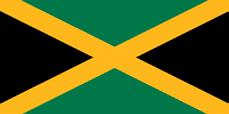
TTotal dividends paid and proposed in respect of 2023/2024 financial year amounted to J$489M, which is in line with the prior period. The Group’s dividend policy seeks to appropriately reward shareholders through consistent dividends while retaining the capital required for supporting future growth and regulatory requirements.
Through its revenue diversification strategy, JMMB Group has positioned itself to deliver longterm growth and encourages its shareholders to


Jamaica’s economic recovery continued in earnest, with GDP growth of 1.9% for FY 23/24; this resulted the economy surpassing its prepandemic output. However, there continued to be headwinds from the pandemic as the stimulus provided during this period continued to necessitate a tight monetary policy. Thus, the operating


environment continued largely unchanged relative to the prior year. Notably, interest rates remained elevated and financial markets were adversely impacted, particularly as it relates to funding costs and trading activities. Consequently, investors were in a risk-off mode with a strong aversion to price volatility.
Within this context, the Group’s Jamaican entities delivered creditable performances. This was moored by the Group’s strategic pillars of client partnership, operational efficiency and productivity and a strong focus on its people. There was a continued focus on smart growth with the prioritization of efficient use of capital.
Recognizing that strong client partnership continues to distinguish the Group in the market, the team continued to strengthen partnership skills and tools as per the following initiatives:
• Continued integration of client segments at a country level—Given the goal of ensuring that clients benefit from the ‘One JMMB ’ experience regardless of the touchpoint, alignment of the structure and delivery mechanism of client segments continued. This was specific to the Retail segment and will facilitate the optimal integration of the solutions suite across the country.
• Expanded suite of offerings – An integral part of JMMB’s value proposition is being able to partner with clients at every step of their financial life journey. It is, therefore, critical that there is a continuous assessment of the suite of solutions to ensure that it is complete. As a result of this review process, the JMMB Money Transfer VISA Prepaid Card was launched on July 27, 2023. This card allows clients to receive remittances from over 150 countries and access their funds within minutes, 24/7, without the hassle of visiting a branch or agent location.
• Expansion of digital footprint – One of the key pillars in ensuring best-in-class client partnership is maintaining an efficient cost structure and improving accessibility for its clients. Thus, there was continued focus on improving client experience by means of digital solutions. To this end, the team’s digital assistant, Johanna, was launched in August 2023. Johanna, which is in its infancy, now provides another channel for the Group’s clients to receive services such as checking account balances and remittance statuses. Further, in anticipation of a return to normalcy of the stock market, the JMMB Moneyline IPO platform for non-JMMB clients was launched in November 2023. This initiative positions JMMB as a trailblazer, offering a platform accessible to all investors, regardless of their broker affiliation. In February 2024, the eagerly anticipated Moneyline Mobile app was launched. This was done in an agile manner, whereby new functionalities are progressively released, further enhancing the client experience.
• Client contact and engagement strategy – Even though global recovery continued following the pandemic, there is an elevated level of uncertainty in the operating environment. This stems from increased geopolitical tension, concerns about the implication of monetary policy stance globally as well as increased natural disasters due to climate change. Thus, JMMB continued to prioritize and provide accurate and timely information to its clients through frequent direct one-on-one contact, emails, webinars and other client engagements.
The Jamaican entities’ contribution to Group operating revenue was J$12.6B, which was 2% lower than the prior period. This was due primarily to a decline in NII and FX trading gains as the contractionary monetary policy resulted in margin compression and a relatively stable FX environment. Otherwise, there was growth in fees from managed funds, which continued to evidence the efficacy of the team’s client contact strategy


and client confidence in the team’s expertise. Fees and commission income remained flat, reflecting reduced investor sentiment.
The operating results of the Group’s entity operations in Jamaica are based on the business line segment to which they contribute, as detailed below:
• Jamaica Money Market Brokers Limited
Investments
Banking
Remittance
Insurance Brokerage
• JMMB Fund Managers Limited
• JMMB Securities Limited
• JMMB Bank (Jamaica) Limited
• JMMB Money Transfer Limited
• JMMB Insurance Brokers Limited
services via the Group’s proprietary financial partnership conversation model, which allowed teams to genuinely remain apprised of clients’ financial goals while building trust.
The Investment Management segment reported net operating revenue of J$4.9B for the period under review. This reflected a reduction of 4% as interest rates remained elevated given the tight monetary policy stance. This negatively impacted interest margins and market liquidity. Consequently, total funds under management was stable at J$376B. This performance is demonstrative of the strong partnerships maintained as the team successfully supported clients in meeting their financial goals.
Jamaica’s investment management segment delivered solid performance during the year despite continued headwinds from the pandemic. In this context, the teams in this segment continued to focus on client education and engagement, providing reassurance and consistent support in goal protection and growth. In executing this, the team focused on providing sound financial advisory
By successfully executing a consistent client engagement strategy, the team was able to ascertain clients’ needs and defensively position their portfolios to mitigate against possible downside risks. However, NII declined from J$960M to J$278M as margin compression continued, given rising global interest rates. In the local landscape, even though the last increase in the local policy rate was in November 2022, the Bank of Jamaica continued to tighten market liquidity, which resulted in further increases in cost of funds.


Given that global interest rates remain elevated, the Asset Management business line continued to be adversely impacted as asset prices were lower. Nevertheless, the team continued to focus on providing guidance, support, and financial advice to clients. Thus, there was a modest 5% increase in off-balance sheet FUM, which moved from J$145B to J$152B. Clients, in the main, continued to remain confident in the investment offerings, fully assured that they would be able to achieve their financial goals. This reflected the team’s focus on educating clients on the need to establish long-term goals and their attainment via a well-structured and targeted program. Consequently, fees from managed funds increased by 18% to J$1.69B.
weathered over the past few years. This started with the onset of the COVID-19 pandemic, which halted economic activity and, coupled with the war against Ukraine, resulted in a high inflationary environment, the end of which is likely near. While asset prices fluctuated, a series of strategic initiatives deployed by management served to stabilise fund performance and positioned the various portfolios to benefit from the expected gradual reduction in interest rates anticipated in the medium term.
CIS market share continues to grow despite the challenging market context, reflecting the continued client confidence in the team and the financial solutions offered. Accounting for approximately 13.5% of the local CIS market, which is in line with the forecasted long-term growth trajectory. The business line maintained its position as the thirdlargest player in this space and continued to gain ground.
Collective investment schemes are managed in accordance with established investment policies geared towards providing long-term financial value for clients. The team continuously reviews strategies and makes tactical adjustments as market dynamics change. In the coming year, the drive is to expand the suite of investment solutions locally and internationally. At the same time, the team continued to ensure that value is maximised for clients and that their needs are continuously met through the range of offerings.
The resilience of the CIS market was validated in light of the significant market disruptions it has
The pension business line continued its solid performance for the financial year, with strong growth in funds under management and associated revenue. Over the financial year, FUM increased by 16%. This growth highlights a business model that embodies a client-centric focus, which resulted in above-average industry growth.


The suite of services and solutions under this business line ranges from pooled funds to segregated fund management and other customized service offerings. For the financial year, these were augmented with digital transformation initiatives to ‘Engage, Educate and Empower’ clients with new engagement strategies and enhance operational efficiency. Thus, the client partnership strategies were underpinned by two core areas of strategic focus, which were Client Engagement and Financial Education. These continue to be key ingredients of the client value proposition as JMMB seeks to strengthen client partnerships and deliver optimal service to various client segments.
Consequently, client engagement activities increased by approximately 35% for the corporate client segment. These activities were enriched with client-centred promotions and increased awareness of the tools required for effective retirement planning.
The financial markets continue to recover from the effects of the pandemic and the economic setback of the last few years. With the current challenge being high interest rates, the result of central banks worldwide efforts to combat high inflation, management remains focused on the long-term financial well-being of its clients.
As the team moves forward into the new financial year its focus is the continued development of its service model, client engagement and extracting increased operational efficiencies from its pension administrative system. The Company intends to launch its “Hello Future” microsite in the first quarter of the new financial year, which seeks to increase brand awareness, simplify retirement planning, and enhance sales processes.
The team is cognizant that significant risks associated with world events combined with a high interest rate environment locally could pose a challenge. Therefore, the team will assess and make the necessary strategic decisions to support its clients in navigating such challenges. With recent indicators pointing to a moderation of inflation, expectations are for interest rates to retrace in the medium term, creating further opportunities for value creation for clients. Thus, the team remains proactive in identifying such opportunities with a view to taking positions to deliver the best possible outcomes.
Trading and Treasury Management includes foreign exchange, bond, and equity trading for the proprietary portfolio, as well as commissions from client equity trades. This business line was faced with another challenging year because of the continued fight against inflation by global central banks. Nevertheless, the business line recorded revenues of J$1.64B, which reflected growth of 7% relative to the prior year.
The bond and equity markets continued to be impacted by a restrictive monetary policy


environment even as incremental gains were made against the inflationary pressures affecting the global economy over the last two years. In the US, the Federal Reserve increased the federal funds rate by 25 basis points to a range of 5.25% to 5.50% at their July 2023 meeting and thereafter left it unchanged as they continued to try and execute on their twin mandate of full employment and stable inflation. US Inflation has been stubbornly trending above 3% throughout this period; this was also above the Fed’s target of 2%, even with interest rates at these elevated levels.
Even though policy rate hikes were paused and market interest rates remained elevated, there was an incremental increase in bond prices compared to the prior year. Further, there was a mini recovery in emerging market global bond debt towards the end of the 2023 calendar year as the pause in the Fed policy rate increases spurred speculation that the Fed would soon lower rates. This optimism gradually eroded as new data released in the US showed that inflation was still trending above the target range.
In Jamaica, the Bank of Jamaica’s Monetary Policy Committee also paused rate increases, with the last increase occurring in December 2022, leaving the overnight rate at 7%. Consequently, inflation decelerated and trended down to the BOJ’s target range of 4-6%, achieving the midpoint of that range faster than anticipated.
The BOJ had more success in its inflation fight, particularly as it utilised other means to try and control inflation. This included but was not limited to, reducing liquidity levels in the market through its open market operations by increasing the size of the 30-day CD auction. The result was that interest rates remained high, and the bond market activity was dominated by new issues with little to no secondary market trading opportunity.
With the heightened interest rate environment, regional equities markets were less attractive,
which showed up in their performances. The TTSE composite index declined by 8.87% for the calendar year 2023, while the JSE main market index declined by almost 8.50% for the similar period. Given higher interest rates prevailing in local and international markets, there was a distinct preference for fixedincome investment options, which provided a more attractive risk-adjusted return to investors. Retail activity was also under pressure as the inflationary impact on the cost of living resulted in lower disposable income. This was reflected in the lower number of trades that were executed in the markets relative to the previous year.
JMMB Securities remained the broker of choice with Jamaica Stock Exchange (JSE) market share rankings of first for the number of trades, first for trade volume and fourth for trade value for the 2023 calendar year. Further, the Company received six (6) awards at the recently held JSE Best Practices Awards. These included Member Dealers overall winner, first place for Member Dealer Website and first place for Expansion of Investors and Listed Companies Base.
The Cambio recorded FX trading gains of J$352M for the financial year, which reflected a 25% decline. The performance was reasonable, given the Bank of Jamaica’s frequent intervention in the FX market to address supply-demand imbalances. Through the BFXITT mechanism, the BOJ sold over US$900M to the productive sector. This represented approximately 6% of the total market volume. As a consequence, there was exchange rate stability evidenced by a modest point-to-point JMD depreciation of 2.51%, with the USD closing the year at J$154.70. Given reduced volatility, there were smaller spreads.


The market has been expecting a decline in interest rates for almost a year, and recent economic data suggests that it will likely occur in FY 2024/25. There are still many headwinds to the inflation and economic outlook. These include further protraction of the Russia/Ukraine war, the Israel/ Palestinian conflict, as well as US elections this year. Once interest rates start to decline, the bond and equities market should start to pick up steam with strong secondary market trading activity in the bond market and higher valuations in the equities market. The FX market will continue to receive BOJ support, but short-term volatility is expected, which would lend itself to trading opportunities. The projection is for modest devaluation in the local currency, with the BOJ actively in the market through FX intervention and OMO instruments.
In what was a very challenging market environment for investment banking in FY2023/24, the Group’s Capital Markets business line continued to be market leaders, producing strong results.
The unit completed several Debt Capital Market transactions, including corporate bond issuances and preference share issuances. Given the bear market for equities, the unit did not complete any equity transactions during the year. Most of the transactions completed were for refinancing of existing debt transactions. Notably, during the year, the unit completed a public issue of preference shares for Sygnus Credit Investments Limited. This transaction for US$40M and J$1.6B, which was oversubscribed, was completed in the peak holiday period of December 2023, a testament to the expertise of the Capital Markets business unit. The unit continues to deliver on its promise of delivering innovative, tailored, structured investment banking solutions to clients.
With almost seven years in the commercial banking space, JMMB Bank continues to position itself as a best-in-class institution with a strong focus on client partnership. To this end, the banking team prioritised ensuring that clients were provided with an optimal solution suite. Thus, the team also remained nimble in assessing services and solutions, making enhancements as necessary. This was augmented by the launch of a digital assistant, Johanna, in August 2023, which provides another channel for its clients to receive services such as chequing account balance inquiries. Further, in February 2024, the Moneyline Mobile app was launched. This was done in an agile manner, whereby new functionalities were progressively released, further enhancing the client experience. This demonstrates a commitment to the Group’s digital transformation strategy, which is intended to enhance the client experience.
Given the foregoing, the banking segment delivered another strong year’s performance, with net operating revenue up 10% at J$7.98B. This reflected the team’s continued focus on having the clients’ best interests at heart. Thus, the team continued to engender confidence and leverage the country’s ecosystem to ensure that JMMB continued to partner with each client on their financial life journey.


Core revenue, which consists of NII, banking fees, and foreign currency trading, resultantly grew by 11% over the prior period to J$8B, primarily due to higher NII.
NII grew by 19% to J$6.29B. This was due to strong growth in the loan portfolio. Net loans grew by 12% to J$126B. The value proposition for JMMB’s loan solutions continued to be personalized service, flexibility, and customized solutions. As at endMarch 2024, JMMB Bank remained the fourth largest commercial bank in Jamaica based on its loan portfolio with stable market share of 9.86%. The team continued to be nimble in its approach to growth by prioritizing asset quality which served to maintain the high quality of the loan portfolio.
As at the financial year end, the deposit base totaled J$141.2B, which reflected a 13% increase over the prior period. Growth in the deposit portfolio outpaced the commercial banking sector, as the rate of growth for the sector was 9%.
FX trading continued to be impacted by smaller spreads given a more stable local currency. As a result, trading gains were 28% lower than the prior year at J$1.08B.
Given the expectation for continued economic growth and generally a more favourable operating environment, the aim is to continue to deepen client partnership. The deliberate focus will be on improving convenience, filling gaps in the Bank’s suite of solutions, particularly for the business segment, and implementing client goal protection measures as required. This will be underpinned by the continued integration of the client segments across the country.
The robust loan growth was funded predominantly by significant increase in the Bank’s deposit base. This growth evidenced the success of the country’s strategy to offer the full suite of solutions available to clients regardless of their primary associated subsidiary. There was thus a deliberate focus by all client partnership teams on growing deposits.
With the acceleration of the Group’s digital transformation due to the local and global environment, the Bank will continue to benefit from the Group’s imperative to increase its digital footprint. Projects to directly impact banking clients and improve operational efficiency, such as online onboarding for opening accounts and loan origination, are expected to be launched in the coming year. This new digital engagement channel will significantly improve clients’ ability to start and maintain a relationship with the Bank. Further, the Bank will continue to evolve its processes and procedures to ensure they remain efficient and maximise client experience. The Bank will also continue to focus on optimising its funding mix by attracting greater lower-cost deposits that will thereby improve margins and help to deliver sustainable profitability.


Over the 2023/24 financial year, the remittance business line continued to evolve with the objective of enhancing financial inclusion by widening the payment services offered within the remittance ecosystem.
The primary service offered is inbound and outbound remittance through eleven (11) strategic international partnerships offering services in over 160 countries worldwide, local and international money transfer services, and NHT refunds via an island-wide network of over 100 agents, including the JMMB Bank (Jamaica) Limited locations. While beneficiaries could have funds deposited at financial institutions, this service was augmented so that beneficiaries could also have funds loaded to a prepaid debit card.
The JMMB Money Transfer VISA Prepaid Card was launched on July 27, 2023. This card allows clients to receive remittances from over 150 countries, as well as to have access to their funds within minutes, 24/7, without the hassle of visiting a branch or agent location. The prepaid card also facilitates the provision of the payroll service, which was launched on September 22, 2023. Funds can be loaded onto the prepaid card for immediate access. This service is aimed at micro and small enterprises and allows for the bundling of solutions offered within the JMMB ecosystem, such as pension and insurance.
Further, JMMB GlobalPay was launched on January 31, 2024, in partnership with MasterCard Transaction Services Inc. GlobalPay enhances the existing product suite as clients can now send and receive remittances in 8 countries, including the USA, UK, Canada, China and Japan. The Global Pay solution enables corporate, SME and retail clients to make quick, transparent, secure and affordable cross-border payments and remittances
to overseas bank accounts in over 30 destination countries across the globe.
For the financial year, total remittance inflows to Jamaica dipped by 2% as performance is more tepid, reflecting the high inflationary environment and, by extension, reduced disposable income in major source markets, namely the USA, the UK and Canada. The business line’s performance was further impacted by the exit of one of its main international partners. Thus, operating revenue was down 21% at J$465M.
The team continued to focus on driving clientcentricity and delivering the value proposition of ease and convenience to clients. This was achieved via initiatives aimed at improving key client-facing and business operations processes, improving client access locally and increasing the number of international partners. The business operations processes improved throughout the year and focused on digitising several key internal processes, which directly resulted in an improvement in the timely and accurate completion of transactions and, more importantly, faster access for clients to funds.
As strong governance is a key area of focus for this segment, the team continued to strengthen its compliance program through annual online AML/CFT training for all agents and utilised advanced features of the core payment platform to detect ‘Black-listed’ persons and create profiles of recipients deemed high risk.


In the year ahead, the focus will remain on increasing market share and further differentiation through value-added solutions and services. To achieve this, the team will continue to leverage technology to improve and add new payment types and experiences. The team will also continue to focus on expanding existing services, which include new corridors for both inbound and outbound transactions.
The suite of services and solutions under the insurance brokerage business line continued to augment core financial services with competitively priced personal and corporate insurance solutions. Notably, there was reduced capacity for property insurance as reinsurers reduced their exposure to the region, given the increase in natural disasters. As a result, in instances where coverage is available, there is a material increase in premiums. Within this context, the team focused on ensuring that clients’ assets were adequately protected in the most costefficient manner.
Net operating revenue improved by 22% over the prior year, totalling J$327M, reflecting improved growth in commission and fees. This growth was attributable to the increase in premium rates. This growth was also in large part due to the team’s focus on partnership, service quality, and convenience, which resulted in high retention rates during the period.
BROKERAGE OUTLOOK FOR FY 2024/2025
The value proposition for this business line will continue to be built on innovative, competitively priced solutions and convenience via more digital channels and experiences. In the coming year, the team will continue to refine the solutions suite to ensure that clients’ unique needs are met in the most cost-efficient manner. The team will also remain focused on opportunities to diversify the portfolio and further grow the client base across all client segments via the continued leveraging of the client base of the Group’s Jamaica operations.
STRATEGIC OUTLOOK FY 2024/2025
The macroeconomic outlook is expected to be more favourable for the upcoming financial year, as the Fed is expected to begin its rate cut. Nevertheless, there are still material risks that exist. The team will, therefore, remain proactive in identifying potential risks and implementing mitigating measures. Concurrently, there will be a deliberate focus on identifying and capitalizing on opportunities cost-efficiently. A central part of this will be the execution of key strategic imperatives which focus on enhancing the provision of financial solutions in an entity-agnostic manner and improving efficiency and convenience.


The team will continue integrating its sales team to better deliver on its value proposition of providing holistic financial solutions across all its client segments. The team will also continue to nimbly identify and capitalise on market opportunities consistent with clients’ financial life goals while ensuring that risk-adjusted returns are maximised for them. Innovative and customised loan solutions will also be a focus for the year, as well as, new value-added payment solutions in response to clients’ needs.
Delivering services and solutions safely and efficiently across channels will remain a high priority. In the coming year, the team will continue executing digital transformation initiatives with the goal of making more solutions available digitally via a simple, seamless, and integrated interface. Thus, the Jamaica operations will spearhead the Group’s implementation of a digital client onboarding tool in the coming year. These projects are expected to significantly enhance clients’ experience across channels while yielding efficiencies for the entities across the Jamaican operations.
during the year. As a result, there were six (6) rate cuts amounting to 150 basis points, with the first in May 2023 and the last in November 2023. This resulted in the policy rate moving from 8.5% to 7%. There were also measures to improve market liquidity, including releasing resources from the legal reserve, repo window and the rapid liquidity facility (FLR). The FLR was introduced in November 2023 and was intended to mitigate the adverse effects of extreme weather events while continuing to support economic recovery. These initiatives only begun to be reflected in spread improvement in the market. However, in February 2024, the Central Bank closed the FLR and repo windows and requested repayment of FLRs. This resulted in tight market liquidity and higher interest rates.




For 2023/2024 financial year, the Dominican Republic’s economy continued to be one of the fastest growing in Latin America. Having surpassed its pre-pandemic output with moderate domestic inflation and controlled imported inflation, the monetary policy stance shifted to an expansive one
Given the preceding, the Group’s Dominican Republic operation continued to identify and capitalize on market opportunities and delivered a strong performance. As the Group continues to expand in this territory and increase brand awareness, it remains conscious that the ‘winwin’ combination is to continue to prioritize client partnership in the most cost-efficient manner. A key component of this partnership is providing a comprehensive suite of financial solutions and services. Thus, the successful transition to a commercial bank was a key enabler as the Group is better positioned to expand its offerings, thereby supporting its clients on their financial life journey. Recognizing that strong client partnership continues to distinguish the Group in the market, the team continued to strengthen partnership skills and tools as per the following initiatives:
• Continued integration of client segments at a country level – Given the goal of ensuring that clients benefit from the ‘One JMMB’ experience regardless of the touchpoint, alignment of the structure and delivery mechanism of client segments continued. This was specifically for the Retail and Corporate segments and will ensure that the optimal integration of the solutions suite across country is facilitated.
• Client contact and engagement strategy – Even though the Dominican economy continued to expand, there remained material downside risks at the global level, which could adversely impact the economy. As a result, it was important to continue providing accurate and timely information to clients as they faced increased uncertainties. This was achieved through direct one-on-one contact, emails, webinars, and other client engagements.
The entities in the Dominican Republic contributed J$4.6B in revenue to the Group, reflecting growth of 8%. This was due mainly to higher trading gains as there was increased trading activity in the local market, given the change to an accommodative monetary policy stance. However, this was partially offset as elevated interest rates continued to be a drag on NII.
Despite the high interest rate environment, Dom Rep’s investment management segment delivered solid performance during the year. The team continued to focus on client education and engagement. This was facilitated primarily by the team’s financial partnership conversations, through which the team remained apprised of clients’ financial goals and continued to build trust. The validation of which was the strong uptake of solutions and services as clients continued to build diversified portfolios.
As the team continued to offer financial solutions consistent with clients’ life goals, the segment reported Net operating revenue of J$3.6B for the year, reflecting a strong growth of 13%. This was attributable to the Trading and Treasury Management business line and evidenced the success of the trading strategy.
The operating results of the Group’s operations in the Dominican Republic are based on the business line segment to which they contribute, as detailed below:
• JMMB Puesto de Bolsa, S.A (Securities Broker)
• JMMB Sociedad Administradora de Fondos de Inversión, S.A. (Fund Management)
• AFP JMMB BDI, S.A. (Pension Funds Administrator)
Banking
• Banco de Ahorro y Crédito JMMB Bank, S.A.
INVESTMENT MANAGEMENT
Total clients’ Funds Under Management (FUM) grew by 3% to J$111.1B as off-balance sheet solutions reflected strong growth. Given the tight market liquidity experienced for most of the year, on-balance sheet FUM declined by 10% to J$52B. Further, margin compression continued, given the elevated interest rate sustained over the period. As a result, NII was negative at J$595M compared to similar positive levels in the prior period.


This business line experienced another strong year despite lower asset prices on account of the high interest rates. Nonetheless, there continued to be a strong appetite for the solutions offered.
Off-balance sheet FUM grew by 18% to J$59.6B as the Dom Rep team continued to support clients in their financial life journey. Consequently, fees earned from managed funds rose 10% to J$703M.
At the end of the year, the team had seven (7) funds geared towards varying investment objectives, as there is continuous review to ensure that value is maximised for clients and that the funds are adequately positioned to meet the clients’ needs. As a result, the suite of funds included the allocation of the first tranche of the closed-end Infrastructure/ Development fund (FCDS) in August 2023. This fund was approved in the latter part of the 2022/2023 financial year, and its mandate includes debt and equity investments in real estate projects, tourism real estate and/or operation, public-private partnerships for specialised infrastructure projects and potential private equity transactions.
For the 2023/2024 financial year, pension FUM increased by 27% to J$25.1B, while the client base grew by 27%, or 3,101 new affiliates. Notably, the Dom Rep’s fund management team expertise was once again validated as the pension business had the highest annualized return for clients in 2023 in the pension fund sector. However, three years ago, legislation was passed regarding fees to be charged by pension funds. This specified an annual decrease of 5 basis points until 2029. Thus, for 2023, the fee charged by pension funds was 1.05%, and for 2025, it will be 1%.
During the year, CIS FUM grew by 12% to J$34.5B, which demonstrated clients continued confidence in the CIS offering’s value proposition. This is within the context of good fund administrative practices, controls, and procedures, as corroborated by the Feller Rate rating of ‘A’ that was affirmed in May 2023.
Funds under management are expected to continue to grow in the upcoming financial year. Further, the team will continue to focus on improving client experience and deepening client partnerships, ensuring that they remain in their clients’ world while providing best-in-class financial solutions. Thus, the DR team will undertake several initiatives geared towards client partnership and client access. These include the introduction of new business lines as well as continued focus on growing existing


funds. With the introduction of new and enhanced digital tools, even greater efficiency is expected in terms of client experience and engagement across the country.
The Treasury management business line reflects trading of Dom Rep’s proprietary bond portfolio. Trading gains grew by 74% to J$3.2B. This was due to the change in monetary policy stance, which resulted in increased trading activity in local instruments. Within this context, the team successfully identified and executed on opportunities.
implications for the DR economy. Consequently, no further monetary policy changes are expected in the Dom Rep until the US FED starts its rate reduction cycle. In the meantime, the DR Central Bank will focus on achieving its economic growth target in 2024, which is set at 5%, which would entail measures to improve market liquidity for the second half of the calendar year. These measures would also lead to an improved operating environment for JMMB Group.
A key component of the Group, and more specifically, Dom Rep’s client value proposition, is providing a simple, integrated solution set tailored to meet the client’s life goals. This was even more critical on the heels of the first full year of operation since the merger with Bell Bank and, thus, a full-fledged commercial bank. The focus was therefore placed on expanding the product suite to meet the growing and evolving needs of clients through a ‘one-stop shop’, frictionless and convenient experience. The team, therefore, continued to focus on integrating and streamlining its operations to facilitate the seamless delivery of solutions and services.
In contrast, the prior period reflected a full year of contractionary monetary policy stance. This meant funding facilities were discontinued, and the policy rate was hiked. This resulted in a drastic reversal of the yield curve and a wipeout of excess liquidity, reducing trading opportunities.
For the upcoming financial year, low market liquidity is expected to persist in the first quarter as the Central Bank prioritizes maintaining a stable exchange rate. This would continue to adversely impact interest rates in the market, including the cost of funds for financial institutions. Further, given that the US is the Dom Rep’s main trading partner, changes in the US economic landscape will have
The banking segment was stable, with operating revenue of J$1.13B. This as NII was adversely impacted by the elevated interest rate environment which resulted in reduced margins.


In conjunction, the loan portfolio was stable as net loans grew by 1% to J$13.4B. The sweet spot continued to be commercial lending to small and medium-sized enterprises. To a lesser extent, there was a focus on payroll loans and retail lending. The credit quality of the portfolio remained satisfactory. This demonstrates the team’s ability to grow the business while maintaining a healthy portfolio.
Mobile app and debit card. The team will continue to leverage the country client database to ensure that clients’ financial goals are holistically met, given the goal of ensuring that clients benefit from the ‘One JMMB’ experience regardless of the touchpoint or entity. The team will also continue to focus on streamlining end-to-end processes such as credit adjudication, underwriting, and collections to strengthen the business and position for further growth.
On the contrary, there was material growth of 19% in the deposit base. At the end of the period, the deposit base totalled J$18.5B. This represented organic growth and hinted at a significant increase in the client base of the Bank.
For the upcoming financial year, macroeconomic conditions are expected to improve, especially as it relates to liquidity and interest rates. Within this context, the team will focus on growing the funds under management, particularly for the CIS and pension suite of solutions. Also, there will be a focus on increasing the loan portfolio and taking advantage of trading opportunities as the rate cycle shifts downwards.
The team remains committed to continuing this trajectory of sustainable growth while maintaining their unwavering commitment to clients and shareholders. The Dom Rep team expects its sustained growth to be driven by its focus on the following areas:
As JMMB continues to position itself in the commercial banking space, the strategy will be focused on implementing the necessary tools to compete effectively. These include new solutions and services as the team broadens the financial partnership conversation, such as the Moneyline
• Integrated Financial Solutions – One of the team’s key differentiators is providing holistic financial solutions to its clients. By this, wherever the clients interact across the Group, the teams should be equipped to satisfy all their financial needs. The team will, therefore, continue to integrate its suite of solutions across its entities in the Dominican Republic to ensure its ability to deliver this. Work to achieve this in the year ahead includes reviews for key processes supporting client partnership and sales team training. The team also remains committed to


nimbly identifying and capitalising on market opportunities that may arise that are consistent with their client’s financial life goals and that ensure risk-adjusted returns are maximised.
• Digital transformation – The digital transformation agenda has been paced, and with the onset of the pandemic, the team has ramped up its activities, initiatives, and projects to support the build-out of a digital footprint across business line segments. The focus will be on implementing the online banking platform in the coming year. This undertaking is expected to position the Bank for further growth and expansion and integrate needed functionalities to support the client’s management of goals online.
space, the Trinidadian team continued to strengthen it during the year. To this end, the team:
• Continued integration of client segments at a country level – Given the goal of ensuring that clients benefit from the ‘One JMMB ’ experience regardless of the touchpoint, alignment of the structure and delivery mechanism of client segments continued.



There remained elevated levels of apprehension among clients due to increased uncertainties from geopolitical tensions as well as weather events. Thus, it was important that the team had frequent contact with its clients, providing accurate and timely information. The team remained alert to the needs of clients and was able to nimbly provide solutions as necessary.

The Trinidad and Tobago economy continued to experience recovery with key indicators all trending in the right direction. Real GDP growth continued a positive trajectory with estimated expansion of 2.1% in 2023. This was buoyed by the non-energy sector as the energy sector contracted due to gas supply constraints. Inflation remained under control and was approximately 1% in 2023, while the interest rates remained largely stable. The policy rate was maintained at 3.5%, with the last change made in March 2020. Given that the government continued to pursue an expansive monetary policy, market liquidity also remained moderate. Within this context, the Group’s Trinidadian entities delivered solid performances.
Recognizing that strong client partnership is what distinguishes the JMMB Group in the financial
The entities in the Dominican Republic contributed J$4.6B in revenue to the Group, reflecting growth of 8%. This was due mainly to higher trading gains as there was increased trading activity in the local market, given the change to an accommodative monetary policy stance. However, this was partially offset as elevated interest rates continued to be a drag on NII.
Given increased economic activity, the country posted record operating revenue of J$6.3B, which was 8% higher than the prior period. This was due to robust growth in NII and trading gains.
Investment Management
Banking
• JMMB Investments (T&T) Limited
• JMMB Bank (T&T) Limited
• JMMB Express Finance (T&T) Limited
Trinidad and Tobago’s investment management segment delivered credible performance during the year, given continued headwinds from the pandemic. The team continued to focus on providing sound financial advisory services via the Group’s proprietary financial partnership conversation model, which allowed teams to remain genuinely apprised of clients’ financial goals while building trust.
The Investment Management segment reported net operating revenue of J$578M for the period under review, which was 39% below the prior period. This was due to a reduction in both NII as well as trading gains.
While the team continued to focus on financial partnership and providing sound financial advice to clients, there was a strong focus on spread management. Even though the policy rate was maintained for the past three years, market rates continued to inch up due to competitive pressures for institutional funding, which had a domino effect on retail funding. This margin compression adversely impacted NII, and as a mitigant, wholesale funding was rolled off.
Given this thrust, total clients’ Funds Under Management (FUM) declined by 12% to J$21.5B. Also, NII declined by 24% to J$421M.
The Treasury management business line reflects equity and bond trading for the proprietary portfolio as well as equity trading commission. Trading gains were negligible for the 2023/24 financial year compared to J$173M in the prior period. Even though there was improvement in the local economy and local market liquidity was high, global rates remained elevated, which resulted in muted trading opportunities in emerging market assets. In the prior period, there were opportunistic trading opportunities. However, these too were absent from the period under review.
Fee and Commission income was 24% lower at J$167M due to reduced investor sentiment. Nevertheless, in 2023, the team was the number three stockbroker, accounting for 15.8% of the


market. Notably, reduced investor sentiment impacted equity trading since the local equities market remained quiet.
FY 2024/2025
Given the expected continued rebound in the economy, the team will continue to deepen client engagement and seek to widen its client base. There will be an increased focus on client segmentation to ensure that they remain proactive in identifying and addressing clients’ needs.
While global interest rate cuts are expected to start this financial year, significant downside risk remains. Nevertheless, the Trinidad team will continue to nimbly identify and successfully execute market opportunities to ensure the portfolio is agilely positioned to achieve the optimal risk/reward profile and create shareholder value. Further, the team will continue to position its local and international equity brokerages so that clients can have more diversified portfolios and realize their financial life goals.
Overview – Continued Optimization of Shareholder’s Value
With continued economic rebound in Trinidad and Tobago, the year under review was focused on deepening client partnership by means of increased client engagement. The Trinidad team continued to closely monitor its clients and proactively assess potential threats, thereby preventing deterioration in the quality of the loan portfolio. Further, the team continued to migrate clients to digital channels, which bode well for operational efficiencies and an increased penetration of younger demographics.
Net operating revenue for the financial year under review grew by 15% to J$5.8B, largely on account of higher NII. Thus, the operating revenue almost entirely consisted of core revenues, which encompass NII, banking fees and foreign currency trading.
NII increased by 19%, moving from J$3.8B to J$4.5B, on account of improved spread management and a larger loan portfolio. Net Loans grew by 12% to J$39.6B and outpaced the market, which had single-digit growth. This was due in part to the consumer finance segment, which continued to outperform. Generally, the team maintained enhanced management and monitoring of loan portfolios to ensure that risks remained within the ambit of the risk tolerance.


Extending the prior year’s strategy, the Treasury team continued to focus on rebalancing the portfolio away from higher-cost institutional funding, resulting in a reduction in the overall funding costs. Thus, the deposit base grew by 4% to J$63.3B.
In the upcoming financial year, the Bank will continue to offer customised banking solutions to meet clients’ specific needs and nurture an ongoing financial partnership to assist clients and businesses achieve their goals. The team will also continue to focus on its client contact strategy to maintain frequent communication and improve accessibility to all its clients. The team will also continue to focus on attracting lower-cost deposits for a more optimal funding mix to improve margins and overall profitability.
FY 2024/2025
Trinidad and Tobago is expected to continue its growth trajectory in the upcoming financial year, albeit at a slower pace. This is on the back of a rebound in oil and gas production and prices, as well as increased domestic demand. However, there remains a significant downside risk in the global space. Nevertheless, the team will continue to seek opportunities for growth, and this will be underpinned by a focus in the following areas:

Integrated Financial Solutions – Work will continue in earnest on streamlining the client base to ensure clients across all segments are appropriately partnered with advisors, have the right solution sets, and have access to the channels and services that best support them in achieving their goals. To support the sales teams, the team will ramp up initiatives around improving productivity and increasing training on the Group’s proprietary financial partnership conversation model.

Digital Transformation - The Group’s standardisation program will continue with activities to further streamline processes and achieve targeted efficiencies for the banking business line segment in the coming year. This will be enhanced by the continued execution of the digital strategy, which will provide new digital channels and payment solutions. Additionally, the team will execute several initiatives under its digital ‘End to End Lending’ imperative for its banking business line, which will drive loan approval efficiencies and improve client experience.





As of March 2024, the country’s economic performance showed promise, with real GDP growth of 4.4% fueled by continued tourism and construction sector expansions. Comparatively, real GDP growth as of March 2023 was 10%, as the economy reopened as COVID-19 restrictions on travel, recreation and business activities were relaxed. The tourism sector growth had a boosting spill-over effect into related services such as restaurants and recreational activities. Additionally, the construction sector benefited from public and private tourism and commercial projects. Conversely, adverse weather conditions negatively impacted the agricultural sector, though food and beverage production rose.
The overall debt-to-GDP ratio of 114.3% remained on a year-over-year downward trajectory and reflected increased economic activity. Elevated global interest rates negatively impacted interestto-revenue ratios, but they remain lower than predebt restructuring levels.
Domestic inflation rates slowed on a 12-month basis but experienced pressure from volatile international fuel prices and adverse weather conditions impacting local crop yields. International reserves are at $3.25 billion or approximately 33.3 weeks, the highest levels ever recorded.
JMMBIL, a wholly owned subsidiary of JMMB Group Limited, is a limited liability company registered as a domestic company in Barbados and forms part of the investment management arm of the JMMB Group. JMMBIL was incorporated in 2006 as an International Business Company in St. Lucia. It migrated its corporate seat to Barbados in February 2021. As of March 5th, 2024, JMMBIL officially opened its doors to the Barbadian public, holding licenses to operate as a broker, dealer, and underwriter.
Barbados has undergone significant economic reforms in recent times, which has increased its attractiveness as an investment jurisdiction. This includes:
• Reform of its tax system with corporation tax for domestic companies decreasing from 30% to 9%.
• Implementation of Economic Substance Rules.
• Easing of foreign exchange controls, including allowing residents to have foreign currency accounts and increasing the types of exempt transactions.

• Removal from the Financial Action Task Force’s money laundering-related grey list.
The capital market in Barbados is characterized by its stability and diversity, with key players including local banks, credit unions, mutual fund providers and investment brokerage entities. Investors have traditionally focused their interest on mutual funds but have been developing a widened focus to look for more diverse investment opportunities. JMMB International Limited’s primary competitors in the brokerage space offer corporate and capital market solutions as well as local and international brokerage options. JMMB International Limited is positioning itself through local strategic partnerships to gain market share across service offerings.
JMMB International Limited has established a strategic vision for the upcoming year focused on sustainable growth through the introduction of investment products and services, supporting the edification of the local market through investment education, and deepening its community impact. JMMB International Limited plans to launch several new financial products tailored to the needs of corporate and institutional investors, SMEs, state and state-related entities, and high-net-worth investors. Additionally, the team will leverage its position within a regional financial institution to positively impact overall operational efficiency.

We keep our clients’ best interests at heart by offering simple, transparent solutions tailored to their unique needs and life goals.








1
KEITH DUNCAN CD GROUP CHIEF EXECUTIVE OFFICER
Keith is an Executive Director and the Group Chief Executive Officer of the JMMB Group of Companies and has responsibility for overall performance and charting the strategic direction of the Group.
His financial expertise has not only benefited the JMMB Group but also the Jamaican financial sector. Keith served as President of the Private Sector Organisation of Jamaica (PSOJ) for the period 2019 - 2022, which was during unprecedented times of the COVID-19 Pandemic. He also served as a Vice-President of the PSOJ throughout 2013 – 2015, and is currently Co-Chair of PROJECT STAR - A partnership for social & economic transformation In Jamaica. Keith Duncan is a Past President of the Jamaica Securities Dealers Association (JSDA) and continues to contribute his service to Jamaica through various roles, including his current appointment as Chairman of the Economic Programme and Oversight Committee (EPOC). He is also the immediate Past Chairman of the National Information and Communications Technology Advisory Council (NICTAC), which provides advisory services to the Ministry of Science, Energy and Technology in relation to its’ ICT Portfolio.
Under his leadership, the JMMB Group was conferred with the American Foundation for the University of the West Indies (AFUWI) Award for Excellence in Business Leadership in February 2020 and the prestigious ‘Best of Chamber Award’ from the Jamaica Chamber of Commerce in March 2011. Known for his commitment to youth development, Keith served as Chairman of the National Youth Service from 2003 to 2009. He worked closely with the respective boards and teams to fulfil the mission of creating and reforming Jamaica’s youth to become purposeful citizens.
Mr. Duncan is also a founding member of the YUTE Programme in Jamaica (Youth Upliftment through Employment). In 2020, Keith was awarded the National Honour, the Order of Distinction, in the rank of Commander, by the Government of Jamaica for his exceptional service in Finance, Business, Youth Empowerment and Community Development. In April 2022, Keith received the International Achievement Award from The American Friends of Jamaica (AFJ) for his leadership and work in National Development. He holds the Chartered Financial Analyst (CFA), a professional financial designation.
PETA-GAYE BARTLEY PAUL GROUP CHIEF INTERNAL AUDITOR
Peta-Gaye has been a member of the JMMB family for the past eight years and has already established a standard of excellence in the overall strategy and execution of internal audits across the Group. She has over fifteen years of experience in the internal audit field in large and medium-sized organisations across several industries in Jamaica and the wider Caribbean region before her appointment to the JMMB Group. In addition to leading the Group Internal
In the Audit Function, Peta-Gaye oversees the Group Fraud Monitoring and Investigations Unit and is JMMB’s assigned Data Protection Officer. Peta-Gaye holds a Bachelor’s degree in Accounting and Management Studies and certification in Internal Auditing and Fraud Examination. She is a Fellow of the Institute of Chartered Accountants of Jamaica and a Fellow of the Association of Chartered Certified Accountants (U.K.).
Avinash is a seasoned Treasury professional with two decades of experience in the financial services industry. His expertise spans foreign exchange corporate solutions, fixed-income portfolio management, and balance sheet optimisation. Avinash holds an ACCA qualification and a Master’s in Business Administration.
Avinash currently serves as Chief Investment Officer. He is particularly passionate about contributing to the development of financial markets from a policy and human capital perspective, reflecting his commitment to the industry’s growth and evolution.
4
CAROLYN DACOSTA J.P GROUP CHIEF COMPLIANCE OFFICER
Carolyn joined Jamaica Money Market Brokers Limited (JMMB) in 1995 and was appointed as Company Secretary for JMMB and its subsidiaries on March 16, 2008, and for JMMB Group Limited since its incorporation in May 2012, when she was also appointed as the Group Chief Compliance Officer. As someone who “grew up” in the organisation, she brings a unique combination of technical skills, experience, and invaluable institutional knowledge to these critical roles. Carolyn holds a certification in Corporate Governance from Harvard Business School, an MBA in Finance, a Diploma in International Compliance from the Manchester Business School in the UK, a Bachelor of Laws degree from the University of London and a Bachelor of Arts degree from the University of the West Indies Mona. Additionally, Carolyn is a Fellow of the International Compliance Association and a Justice of the Peace for the parish of St. Catherine. She is also a JSE Mentor and a Director for Image Plus Consultants Limited.
Carolyn strongly advocates for the JMMB Group’s commitment to maintain and promote the highest corporate governance and compliance risk management standards. As such, she ensures, with the support of her team, that the Group executes all of its regulatory expectations, disclosures and Compliance Obligations while ensuring that every client’s needs are met or exceeded. Carolyn offers proven, reliable and consistent support to the Board of Directors and Shareholders while, in true JMMB fashion, building real, heart-to-heart connections across the JMMB Group and the Jamaican financial sector.










GROUP CHIEF CULTURE & HUMAN DEVELOPMENT
Donna is passionate about building and maintaining the love-based culture, which supports the Group’s competitive advantage. As an authentic, principled, love-based leader, she works with the Culture and Human Development Team (CHDT) to create and implement the people-operating frameworks, people policies, processes, and practices that develop and maintain our unique culture. The CHDT supports team members to “realise the greatness within, to the benefit of themselves, our clients, the organisation and the society” (Our Vision of Love). She also has extended this transformational thinking to developing the Conversations for Greatness programme, which provides individuals with the tools for mindset change to increase the experience of love and possibility thinking in the world.
Donna holds a Bachelor’s degree in Industrial Engineering from UWI, St Augustine, and a Master of Business Administration from the Richard Ivey School of Business at the University of Western Ontario in Canada. She also holds the prestigious international Chartered Financial Analyst professional designation.
With the birth of her two daughters in quick succession, she chose to swap the emotionally demanding role of the Group CEO, which she assumed after her mother’s passing and cofounder of JMMB, for the role of Group Lead for the Culture and Human Development Team. This allowed her to focus on her passion for creating spaces for individuals to realise their greatness through motherhood and organisational transformation. During her five years at the Company’s helm, she led the team in becoming a full-service brokerage company, expanding regionally and growing our brokerage client base to the largest in the Caribbean.
Donna is the recipient of several awards, most notable of which include the Jamaica Observer Business Leader Award in 2002 for her stellar leadership, then at the helm at JMMB, and later the Lifetime Achievement Award in 2017 for outstanding contribution to the field and her unwavering commitment to Jamaica. In 2022, Donna was awarded the AFJ International Humanitarian Award and The JHUAN Impact Award for work that embodies excellence in truth and service and has positively impacted the broader community. 5
PATRICK A. ELLIS GROUP CHIEF FINANCIAL OFFICER
For the last 15 years, Patrick has held the Group’s Chief Financial Officer position, which includes overseeing and executing the Group’s strategic and financial operations. Chief, among his responsibilities are preparing financial statements, regulatory reporting, assessing the viability of possible acquisitions, and managing financial operations for Group operations in Jamaica, Trinidad & Tobago, and the Dominican Republic.
Patrick holds an MBA (Finance) from the Manchester Business School. He is also a Fellow of the Association of Chartered Certified Accountants (U.K.), a Fellow of the Institute of Chartered Accountants of Jamaica, and a Certified Public Accountant. Patrick also serves as a Director of Sagicor Life Insurance Company, Sagicor USA Inc.
PAUL A. GRAY
7
GROUP EXECUTIVESPECIAL PROJECTS, OFFICE OF THE CHIEF EXECUTIVE OFFICER
With over 25 years of experience in the financial industry, including the Dominican Republic, Paul brings a wealth of knowledge and experience to his current role as Group Chief Executive - Special Projects, where he has the responsibility to lead and or oversee the Real Estate Business line together with other specific projects of key strategic importance.
Paul previously served in the capacity of Group Chief Investment & Treasury Officer until May 2017, when he was seconded to serve as Interim Country Chief Executive Officer for JMMB Dominican Republic from May 2017 to June 2019, as well as Interim Chief Executive Officer of JMMB Sociedad Administradora de Fondos de Inversiones S.A May 2017 to September 2018.
Paul is a member of the Board of Directors of JMMB Insurance Brokers & ICR Holdings Limited, Island Car Rentals Limited and Jamaica Rental Company Limited. He is also a past president of the Jamaica Primary Dealers Association of Jamaica. Paul holds a Master’s degree in Finance from the Manchester Business School UK, Certification in Merger & Acquisition Integration from PRICHETT & Institute of Mergers, Acquisitions & Alliances, as well as receiving various professional training in Treasury, Asset/Liability and Risk management, both locally and overseas.
8
JULIAN MAIR GROUP CHIEF INVESTMENT STRATEGIST
With over 20 years of experience, Julian has a proven record of accomplishment in the financial services industry, including his integral role in developing the region’s capital markets. In his current role as JMMB’s Group Chief Investment Strategist, Julian is charged with leading the strategic direction of the Group’s investments.
His experience includes positions at Dehring, Bunting and Golding Limited (now Scotia Investments Jamaica Limited) and JMMB. He is a former Managing Director of Lets Investment Limited, where his leadership resulted in the boutique operation becoming a global player in trading internationally issued securities. Julian is the former Jamaica Stock Exchange (JSE) Chairman and a founding member and past president of the Jamaica Securities Dealers Association (JSDA). Julian serves on the boards of JMMB Securities Limited, JMMB Investments (Trinidad & Tobago) Limited, JMMB Securities (T&T) Limited, JMMB Puesto de Bolsa; Supreme Ventures Racing and Entertainment Ltd and Sagicor Life Insurance Inc.
9

In his current role as Group Chief Risk Officer at JMMB, Garfield has oversight for the formulation and implementation of acceptable enterprise wide risk management framework including: credit risk management policies; procedures and standards for all business lines, namely: retail, micro, small and medium-sized enterprises and corporate risks; in addition to having general oversight of the adjudication of credit proposals to ensure quality asset growth and management across the Group.
Before stepping into his current post, Garfield served as Credit Risk Manager for JMMB Bank (Jamaica) Limited and within a year and a month was promoted to General Manager, Credit Risk. During his tenure as General Manager, he displayed sound professional and technical competence resulting in him matriculating in a ‘double-hatted’ role as Group Credit Risk Lead, with responsibility for credit risk management across the Group. He has a proven track record as a credit risk professional, boasting over 20 years experience in the local financial sector, which has provided him with the platform and access to hone his skills in credit portfolio management; financial analysis; environmental and social risk analysis; collateral and legal procedures; retail, SME and corporate lending; strategic leadership and credit administration.
Garfield holds a Bachelor of Laws (LLB) and Bachelor of Business Administration (BBA) from the University of Technology, Jamaica, UTECH as well as certification as a Credit Professional and Commercial Banking & Credit Analyst. He has amassed several other professional accreditations and notable practical successes in the field which bolster his impressive educational background and strong credit management history.






KERRY-ANN BETTON STIMPSON GROUP CHIEF MARKETING OFFICER
Kerry-Ann has been a financial services marketer for over 20 years, leading the marketing function of well-known Caribbeanbased financial brands. In addition to being the Group Chief Marketing Officer, she is the Country Chief Marketing Officer for the JMMB Group’s operations in Jamaica. Her portfolio of accountability includes marketing strategy development and execution, digital marketing, field marketing, corporate communication and client insights management.
In her spare time, she is the producer and host of The Internal Marketing Podcast; a personal passion project supporting the business leadership community by hosting discussions with various subject matter experts in internal marketing and employee brand advocacy. Kerry-Ann has an MBA in Marketing from the Robert H. Smith School of Business, University of Maryland, College Park, Maryland, U.S.A.
11
PATRICIA SUTHERLAND GROUP CHIEF OPERATIONS OFFICER
Patricia has over 30 years of experience in management, operations and strategic planning in the financial services and manufacturing sectors. As Group Chief Operations Officer, she is charged with leading the establishment of the operational framework and overseeing the processes for the efficient and effective service delivery of products and services through the management of shared services and business lines across the JMMB Group of companies, to support the achievement of the strategic goals. She also oversees the day-to-day operation of the regulations and policies monitoring departments. Patricia has held senior positions at the ICD Group of Companies (now ICD Group Limited), Butterkist Limited and HoFAB Manufacturing Company Limited.
She holds a B.Sc. in Pure and Applied Chemistry, which she attained at the University of the West Indies (UWI), Jamaica. She has completed several professional development and leadership courses and seminars, including Women and Power: Leadership in a New World, with the John F. Kennedy School of Government at Harvard. Patricia actively contributes to nation-building through voluntary services. She serves as Chairman of the JMMB Joan Duncan Foundation and as a Director of JMMB Bank (Jamaica) Limited, The MultiCare Youth Foundation, Stanley Motta Limited, The Early Childhood Commission and the National Commission on Violence Prevention.
Peter is the Group Chief Client Investment Officer (GCCIO) at the JMMB Group, where he has executive oversight for managing offbalance sheet portfolios within the Group. As the GCCIO, he leads the design and oversees the implementation of the Group Client Managed Portfolio framework to facilitate the consistent optimisation of portfolio returns for corporate and individual clients across the JMMB Group of companies. These portfolios include pension portfolios, collective Investment Schemes and customized portfolios. Peter has been an integral part of the JMMB team since 2002, starting as a research analyst. Over the years, he has demonstrated his commitment and expertise, progressing to roles such as business development analyst, business development manager, and manager of the Group’s product portfolio.
He holds a Master’s and Bachelor of Science degrees in Economics from The University of the West Indies, Mona. He is a CFA charter holder and holds a certificate in investment performance management. He is a trustee of the Urban Development Corporation (UDC) Pension fund and a Director on the board of Sygnus Credit Investment.
Peter is dedicated to his role at JMMB and shares his knowledge and expertise with the next generation of finance professionals. Since 2014, he has been an adjunct lecturer at the Mona Business School, UWI, Mona, delivering finance and investment management courses.
GROUP CHIEF STRATEGY AND CLIENT PARTNERSHIP SUPPORT OFFICER
Claudine joined the JMMB Group team as Group Chief Strategy Officer in 2016, bringing a well-decorated career in risk management, strategic management, business analytics, project management, compliance and product development to bear on the role. As the Group’s Chief Strategy Officer, she provides strategic leadership and innovative solutions to create and unlock opportunities for sustainable organic and inorganic growth and value for all stakeholders. She is also tasked with leading the Group’s client experience design and supporting the execution of its client partnership activities.
Claudine holds a Bachelor of Science and a Master of Business Administration (MBA) in Economics and Psychology and Banking and Finance, respectively, from the University of the West Indies, Mona. These are complemented by certification in International Risk Management and Mergers and Acquisitions. She is also an Accredited Director and the chairperson of Turner Innovations and sits on the Boards of Innovate 10X and MYNElend Jamaica Limited. Additionally, she sits on the Finance Committee for the Council of Voluntary Social Services. She is a passionate advocate for the MSME community and serves the sector in many areas, including as a business mentor.









KEISHA FORBES ELLIS CHIEF COUNTRY OFFICER
JAMAICA & CHIEF EXECUTIVE OFFICER – JAMAICA
MONEY
MARKET BROKERS LTD.
Keisha embodies a true JMMB success story, having joined the Company 27 years ago as a Trading Assistant and climbing the ranks of Chief Country Officer (Jamaica) and CEO of JMMB Investments. Her expertise includes trading and treasury management, portfolio management and strategic planning. Thus, she ably provides strategic leadership to all entities within Jamaica – JMMB Investments, JMMB Bank, JMMB Securities, JMMB Fund Managers, JMMB Insurance Brokers and JMMB Money Transfer. Keisha is responsible for the growth and development of these companies, overseeing their stock brokerage, banking, cambio, unit trust, pensions, insurance, portfolio management services, and, by extension, the overall asset management business line.
Keisha holds an MBA with a specialization in Banking and Finance from Mona School of Business, UWI, and a Bachelor’s degree in Business Management from Nova South Eastern University. 1
3
SHARON GIBSON
CHIEF
EXECUTIVE
OFFICER –
JMMB MONEY TRANSFER LTD
SHERON GILZEAN CHIEF EXECUTIVE OFFICER –JMMB INSURANCE BROKERS LTD
Sheron has served as CEO of JMMB Insurance Brokers Ltd. since 2017 after being promoted from her previous position as General Manager. Sheron boasts a wealth of insurance industry knowledge, having amassed over 35 years of experience in claims and underwriting, risk management, team building, and relationship management. Sheron has been a part-time lecturer at the College of Insurance & Professional Studies since 2003 and is also a former Executive and Chartered Member of the Jamaica Society of Insurance Professionals and Technicians (JSIPT). She has been a Jamaica Insurance Brokers Association Board (JIBA) Executive Member since 2023. Her educational achievements complement her experience; Sheron holds an undergraduate and postgraduate degree from the UWI, Mona and is a Fellow Chartered Insurance Professional with the Insurance Institute of Canada. She recently completed her Risk Management certification through the Insurance Institute of Canada. She is the past Treasurer and a Distinguished member of the Kiwanis Club of Constant Spring and a Charter Member of the Kiwanis Club of Young Professionals, Kingston.
5
CHRISTOPHER WALKER CHIEF EXECUTIVE OFFICER –JMMB FUND MANAGERS LTD.
Christopher joined the JMMB team in September 2012, following JMMB’s acquisition of the Capital and Credit Financial Group (CCFG). A veteran financier, having served 28 years in the financial services industry, Christopher was appointed to his current position at the helm of JMMB Fund Managers Limited in April 2013. His current post sees him continuing to offer expert leadership while overseeing the operating and governance framework for the Group’s off-balance sheet client portfolio, with a particular focus on collective investment schemes (CIS), fund registrar services, pension funds and other annuity-based solutions. Christopher also acts as Chairman of the Group Client Portfolio Investment Committee.
Complementing his vast experience is a BSc in Management and Economics from the University of the West Indies (UWI), a Canadian Investment Manager Designation from the Canadian Securities Institute and a Master’s degree in Business Administration from the University of Liverpool.
Additionally, Christopher is the chairman of IV Acquisitions Limited and The Jamaica Evangelistic Association and a Director on the boards of 109OHR Limited and Chalmers Commercial Limited.
JEROME SMALLING
4


Sharon is a seasoned financial expert with over twenty years of experience at the senior managerial level in the industry. She has a proven track record of delivering exceptional client experience, driving innovation, and achieving solid results. Before joining the JMMB team in October 2014, she served in several capacities at the National Commercial Bank (NCB), including product development, customer service, and operations manager.
Sharon holds an Executive Master of Business Administration (EMBA), with Distinction, from the University of the West Indies, Mona, and other professional designations, including AICB from the Canadian Institute of Bankers. Sharon also has a Diploma in Management Studies from the Jamaica Institute of Management (JIM).
Sharon brings her in-depth experience to bear at the national level as a Director of the Jamaica Money Remitters Association (JMRA) and a member of the Modernization of Jamaica’s Remittance Industry Project Steering Committee, which is spearheaded jointly by the International Organisation for Migration (IOM) and the Planning Institute of Jamaica (PIOJ). 2
CEO & MANAGING DIRECTOR JMMB BANK (JAMAICA) LIMITED GROUP BANKING LEAD, JMMB GROUP
Jerome is a seasoned financial expert with an esteemed 26-year career in banking spanning the Caribbean and North America. Smalling joined the JMMB Group team in 2012 as the CEO of the then JMMB Merchant Bank. In his role as Group Banking Lead, his key functions include formulating strategic plans, ensuring the development and promotion of products and services, reviewing the Bank’s overall financial position, and determining appropriate strategies to achieve sustained profitability, expansion and growth.
His career includes tenures as a Scotiabank Branch Manager, Vice President, Personal Banking at RBC Caribbean and Manager, Branch Sales Strategy Initiatives at the RBC Royal Bank’s National Office in Toronto, Canada. He holds an MBA and a Bachelor’s degree in Business & Professional Management from the H. Wayne Huizenga Business School, Nova Southeastern University, Florida, USA. Jerome is also a fellow of The Institute of Canadian Bankers and completed executive training at The University of Pennsylvania’s Wharton Business School.
Jerome is a Director for JMMB Bank and has overall responsibility for JMMB’s banking businesses in Trinidad and Tobago and the Dominican Republic. He is the immediate past President of the Jamaica Bankers’ Association and sits on the boards of the Ports Authority of Jamaica and the Spectrum Management Authority, where he leads as Chairman of the Board Finance Sub-committees. He also serves on the Board of his Alma Mater, Munro College.





1
SHAWN MOSES CHIEF COUNTRY OFFICER AND CHIEF EXECUTIVE OFFICER - JMMB BANK TRINIDAD AND TOBAGO LTD.
With over 20 years of dynamic experience in the banking industry, Shawn has excelled in various roles across all lending segments across the region. His stellar track record speaks for itself—he achieved impressive growth numbers and pioneered value-added solutions for his clients.
Results-driven and relentless, Shawn’s work ethic is unparalleled. His passion for leadership and talent development shines through in every endeavour. As a leader, he drives innovation with a sharp, visionary focus. Shawn also believes in empowering his team to align with the vision and share in the success. Academically, Shawn holds a Master’s in International Finance with Distinction from the Arthur Lok Jack Graduate School of Business and a Double Major in Economics and Management from The University of the West Indies.
Dedicated to corporate social responsibility, Shawn is also committed to fostering education and financial literacy in schools across Trinidad and Tobago.
2
ELSON JAMES
CHIEF EXECUTIVE OFFICER – JMMB EXPRESS FINANCE (T&T) LTD.
Elson has built a track record of excellence as he spearheaded the design and launch of JMMB Express Finance (T&T) Limited, an arm of the JMMB Group primarily focused on providing consumer loans to the Trinidad and Tobago market. Elson has held several management positions at financial entities such as Citibank, American Express, Ryder Systems and Unicomer and brings valuable multi-national working experience gained in the Caribbean, the United States and Asia.
With more than 20 years of consumer and corporate finance experience, Elson has been expanding his track record of profit creation and improvement at JMMB. Elson has a Bachelor’s degree in Business Administration and Management from UWI St Augustine and an MBA in Finance from Pennsylvania State University Smeal College of Business.
JEREMY LALLA
Jeremy is an accomplished finance professional with over 15 years of experience in investment sales, portfolio management, and financial analysis. He is the General Manager at JMMB Investments in Trinidad and Tobago. In his role at JMMB Investments, Jeremy has been instrumental in formulating long-term investment strategies that address regulatory capital requirements, liquidity, cash flow, and interest rate risk. His expertise in gap analysis and liquidity risk management has been crucial in maintaining the company’s financial health.
Before JMMB, Jeremy was a Business Analyst at De Novo Energy Limited, where he played a key role in gas price modelling, industry research, and business development, enhancing the company’s financial growth. His career trajectory includes positions as Wealth Manager at Guardian Asset Management, where he managed high-networth clients, and Investment Analyst at RBC Royal Bank (Caribbean), where he provided valuable market insights.
Jeremy’s professional journey began at Caribbean Money Market Brokers as a Client Relations Officer, laying a solid foundation in client management. Additionally, he serves on the Board of Directors of the Insurance Industry Credit Union in Trinidad, contributing as an Executive Director, Investment Committee Chair, and Assistant Treasurer, further showcasing his commitment to financial oversight and governance. His strategic insights and leadership skills make him a significant asset in the finance sector.
He holds a BSc in Economics and Mathematics from the University of the West Indies, Trinidad, and has been honoured with the UWI Development and Endowment Award. Known for his critical thinking and communication skills, Jeremy is adept at fostering team collaboration and harnessing technology to meet business objectives. 3







JUAN JOSÉ MELO
1 JESUS CORNEJO CHIEF EXECUTIVE OFFICER – JMMB SOCIEDAD ADMINISTRADORA DE FONDOS DE INVERSIÓN, S.A. (SAFI)
CHIEF COUNTRY OFFICER AND CHIEF EXECUTIVE OFFICER - JMMB
PUESTO DE BOLSA S.A / AFP JMMB
BDI,
S. A.
Juan is a finance executive with 17 years of experience in the Dominican financial market, specializing in banking and investments. Before joining the JMMB Group in 2009 as Director of Investment Banking, he worked as a financial consultant at firms such as Deloitte and KPMG, where he participated in various advisory projects for important companies in the Dominican Republic.
In 2012, he was appointed General Manager of the Crédito América Corporation after JMMB acquired the majority of its shares and was tasked with developing the banking business for JMMB in the Dominican Republic. In 2015, Juan headed the acquisition and rebranding of the Banco de Ahorro y Crédito Rio, which, combined with the assets and liabilities of Corporación de Crédito América, gave way to the creation of JMMB Bank, Banco de Ahorro y Crédito, for which he was appointed CEO.
In June 2019, he assumed the Chief Country Officer position for JMMB Group in the Dominican Republic, CEO of JMMB Puesto de Bolsa, and CEO of AFP JMMB BDI. His responsibilities as Chief Country Officer for JMMB Dominican Republic are mainly to oversee and lead the operations of the four companies that make up the Group: JMMB Bank, JMMB Puesto de Bolsa, AFP JMMB BDI and JMMB Funds (SAFI). Juan holds an Industrial Engineering degree from the Pontificia Universidad Católica Madre y Maestra and a Masters in Finance from the Universidad de Comillas in Madrid, Spain. As part of his vision for JMMB, he looks to continue the growth of the Group and its various companies, focusing on customer satisfaction.
With over 27 years of experience, Jesus has extensive knowledge of the Banking and Securities market in the Dominican Republic and Mexico. His previous experience includes Risk Management, Treasury and Client Partnership leadership positions at Citigroup, APAP, and JMMB Puesto de Bolsa.
Jesus holds an Industrial Engineering degree from Universidad Panamericana and a Masters in Business Administration from ITESM in Mexico. He graduated from Kellogg’s CEO Management Program and PADE - Senior Business Management Program from Barna Management School.
3
LUIS BOGAERT CHIEF EXECUTIVE OFFICERBANCO MÚLTIPLE JMMB BANK, S.A.
Luis Bogaert is the CEO of JMMB Bank in the Dominican Republic. He brings over a decade of industry experience and a distinguished track record of consistently surpassing revenue growth targets. He is renowned for maintaining the highest risk management standards, safeguarding the firm’s reputation, and ensuring compliance with all relevant laws and regulations.
Before his current role, Luis had a successful 10-year career at Citibank, where he served as Caribbean Co-Head of the Financial Institution Group. In this capacity, he was responsible for developing and executing a comprehensive strategic agenda across various financial products and services tailored to meet each market segment’s unique needs and priorities. His expertise includes structuring complex transactions such as leveraged buyouts, corporate syndications, underwritten positions, and hedging solutions, including cross-currency, interest rate, and commodities swaps.
Luis holds a Bachelor’s Degree in Business Administration (B.B.A) with a concentration in Economics and Finance from Western Michigan University and a Master’s Degree in Business Administration (M.B.A.) from the same institution. In addition, he completed a Foreign Exchange Program in Economics and Finance in Lancaster University Management School, United Kingdom.



Integrity means standing by our word and acting with unwavering honesty in all our endeavours.



The Board of Directors (the Board) of JMMB Group Limited (JMMBGL) remains committed to high governance standards consistent with legal and regulatory standards and evolving industry best practices aligned with our strategy and risk appetite. Good governance is not just about overseeing JMMBGL and its subsidiaries and its practices but also doing so in a way that is transparent, accountable, and with integrity. It involves an independent Board actively engaging with all stakeholders, knowing the business and its risks, constructively challenging management, and understanding the opportunities and challenges of a changing industry and economy. It involves setting clear and robust standards and principles that will guide JMMBGL and its subsidiaries to ensure a long-term sustainable business model that delivers on its purpose of helping clients achieve their financial goals and the communities in which we operate while enhancing value for our shareholders.
This report provides an overview of the corporate governance structures, principles, policies, and procedures/practices designed to help ensure that the JMMB Group is well managed with effective oversight and controls.
While JMMBGL has adopted an enterprise-wide approach to Corporate Governance from a policy perspective, the corporate governance structures of all subsidiaries are independent of JMMBGL. The Group’s Corporate Governance framework is maintained by several coordination mechanisms
between the Group and its subsidiaries. Specifically, several JMMBGL’s Directors and Senior Executives Officers are present on our subsidiary Boards and Board Committees, either as members or standing invitees, reinforcing the Group’s oversight and control mechanisms and supplementing the local Boards with the required skill set. The JMMBGL corporate governance policy and framework are subject to ongoing review, assessment, and improvement.
The Board proactively adopts governance policies and practices designed to align the interests of the Board and management with those of shareholders and other stakeholders and promote the highest standards of ethical behaviour and risk management across the Group( see core governance principles below). The Board exercises its authority in accordance with relevant Articles of Incorporation, internal policy and applicable laws and regulations.





JMMBGL places significant focus on the quality of oversight, direction and communication among the Board and its Committees, management, shareholders and other stakeholders (including regulators), and the relationship among these groups is of paramount importance. The figure below depicts the JMMBGL’s model Corporate Governance structure.
Our communication and engagement with shareholders and investors aim to ensure the Group’s interests are aligned with those of its shareholders through sustainable growth and longterm value creation and to retain shareholders’ and broader society’s confidence. To that end, we:
• provide information to shareholders and investors that meets their expectations and upholds our culture and values;
• communicate and engage with them regularly (via our investor quarterly briefing) so that senior managers and Directors consider their views.
Our practice of communication and engagement with shareholders and investors supports the following principles;
• Protection of all shareholders’ rights and lawful interests. We facilitate the exercise of rights for shareholders, provide them with information and give them opportunities to have a say in our corporate governance.
• Equal treatment and non-discrimination. We treat investors in the same situation equally.
• Fair disclosure. We ensure that the information we disclose is transparent, truthful, and consistent with applicable law.
• Appropriate disclosure of information. We report appropriate and relevant information to meet our shareholders’ and investors’ needs and expectations, and ensure it is clear, concise and accurate.
• Compliance with law and corporate governance rules. We adhere closely to the laws and


regulations on inside and price-sensitive information and follow the principles of cooperation and transparency with supervisory and regulatory bodies.
As part of our engagement with shareholders and investors, we carried out the following activities during the year:
The AGM is the most important annual event for our shareholders. We strive to encourage them to attend and participate fully in the meeting in an informed way. In this forum, we can openly discuss the Company’s affairs with our shareholders and receive their feedback.
The AGM is broadcast live on our corporate website and JMMB Group YouTube channel, and recordings are made available in full afterwards. This live broadcast enables shareholders who cannot attend the meeting and other stakeholders to remain fully informed of deliberations and adopted resolutions.
The 2023 AGM was hybrid, allowing shareholders to attend and participate in person or virtually. Shareholders could watch the entire meeting through a live feed, vote, and make remarks. Our shareholder participation rate at the most recent general meetings proves the effectiveness of our electronic means of attendance, delegation, and remote voting prior to the meeting.
We present our results at quarterly investor briefings that are held shortly after we make our results public. The presentation can be followed live on our corporate website or YouTube. During the presentation, we explain our performance, strategy, and targets for each quarter and the financial year. Investors may also interact directly with senior managers and Directors by asking or emailing questions to info@jmmb.com or agm questions@ jmmb.com during our AGM.
The Group’s key priority is a continuous and open dialogue with shareholders and other stakeholders. The Board encourages all stakeholders to provide timely and meaningful feedback. There are many ways for people to engage with us and access important information (see below).
BOARD OF DIRECTORS & CORPORATE SECRETARY
Stakeholders can communicate with Directors or the Board Chair by sending an email to shareholderquery@jmmb.com
Tel.: 876-998-5662
The CEO, Group Executive and senior management may be contacted at info@jmmb.com
Tel.: 876-998-5662
INVESTOR RELATIONS
Stakeholders can communicate with Directors or the Board Chair by sending an email to shareholderquery@jmmb.com
Tel# 876-998-5662
The Board of Directors is our highest decisionmaking body, except in matters reserved for shareholders, at the general meeting. It performs its duty with independent judgement and unity of purpose. The Board is responsible for the overall stewardship of the Group, aiming to promote sustainable success and long-term shareholder value. As such, the Board of JMMGL determines/ establishes the Group’s strategic objectives. The Board’s policy is to designate executive bodies/ Board Committees and managers to run day-to-day operations and implement the strategy. Critically, the Board of JMMBGL ensures that it acts in the best interest of the Group and its stakeholders by


ensuring robust frameworks are in place for strategic decision-making, performance monitoring, and risk oversight, by holding fast to the principles of:
The Board’s functions are fully described in the Group’s Corporate Governance Policy, which can be found on our website at www.jmmb.com, specifically at:
https://www.jmmb.com/sites/default/files/Jamaica/Attachments/Policies/JMMB-Group-Corp-GovPolicy-May-25-2023.pdf
Minutes of the last Annual General meeting can also be accessed at the link
https://jm.jmmb.com/sites/default/files/Jamaica/Attachments/2023/JMMB-Group-Annual-GeneralMeeting-Minutes-October-6-2023.pdf


The table below highlights the responsibilities of the Board and responsibilities that may be delegated to its Committees:
• Establish the tone from above and champion JMMB Group’s values.
• Set and expect the highest standards of conduct and integrity at JMMB Group to build and maintain the trust of our clients, shareholders, team members and the communities we serve
• Promote a respectful environment and encourage team members to help shape our culture by speaking up and challenging behaviours when they do not align with our values
• Oversee our strategic direction, plans and priorities and ensure they align with our risk appetite
• Discuss and challenge management in setting enterprise strategy and monitor its implementation and effectiveness
• Annually approve the strategic plan, taking into account the opportunities and risks of our businesses
• Approve our financial objectives and operating plans, including significant capital allocations, expenditures and transactions that exceed delegated authorities
• Assess merger and acquisition pipelines
• Oversee and approve our risk appetite framework
• Oversee strategic risk management by approving risk management frameworks and policies
• Promote a strong risk culture and monitor that conduct adheres to the enterprise-wide risk management framework
• Oversee compliance with applicable audit, accounting, financial reporting, legal and regulatory requirements
• Monitor the implementation and maintenance of effective internal control systems, including management information systems, and assess their adequacy and effectiveness
• Approve the quarterly and annual financial reports
• Oversee the qualifications, performance and independence of the external auditors and the performance of the internal audit function


To Board Committees supports the Board in:
• Formulating strategy for core areas through the Finance Committee, Culture and Human Development Committee and Information Systems Committee.
• Supervising and making important recommendations through the Audit and Compliance Committee, Finance Committee, Nominations and Corporate Governance Committee and Risk Management Committee.
The Board has six (6) Committees, namely:
1. Audit and Compliance Committee
2. Risk Management Committee
3. Nominations and Corporate Governance Committee
4. Information Systems Committee
5. Culture and Human Development Committee
• Supervise succession planning processes, which include the selection, appointment and development of the CEO and the Group Executive positions
• Evaluate and approve the compensation of the CEO, the Group Executive
• Review strategies and programs for the assessment and development of talent and for increasing diversity and inclusion at all levels of the Group
• Establish appropriate structures and procedures to allow the board to function effectively and independently
• Develop and implement corporate governance principles and guidelines and monitor best governance practices
The Secretary of the Board assists the Chairman and ensures the formal and substantial legality of all the Board’s actions. The Secretary also ensures that good governance recommendations and procedures are observed and regularly reviewed.
The Board of Directors held nine (9) meetings during the 2023/24 financial year. The rules and regulations of the Board dictate that it must convene at least six (6) board meetings for the financial year.
Although Board meetings follow a calendar approved annually and a provisional agenda of items to discuss among the matters that fall under its remit, new items can be added to the agenda, and additional meetings can be called. Directors may also propose items to be added to the agenda and are duly informed of changes to the calendar and meeting agendas.
To help Directors prepare effectively for each meeting, they are given relevant documents sufficiently in advance and in a secure electronic


format. The Corporate Governance Policy expressly acknowledge Directors’ rights to request and obtain information on anything related to JMMB Group Limited and its subsidiaries.
Directors are required to attend meetings in person, either physically or virtually and strive to limit their attendance to situations of absolute necessity. The Nominations and Corporate Governance Committee checks that Directors attend at least 75% of Board and Committee meetings.
** appointed April 2 2024


The Secretary of the Board maintains the Board’s documents on file and records the content of meetings in meeting minutes. Meeting minutes of the Board and Board Committees include statements members expressly request to be put on record.
The Board encourages communication and promotes dialogue between its committees, especially the Risk Management, Audit and Compliance, and Finance Committees, given the relevance of their respective work. Additionally, some committees hold joint meetings throughout the year. Though they cannot vote, any Director can attend and participate in meetings of committees on which they do not serve if invited by the chair of the Board and the chair of the respective committee.
Board Committees follow a calendar that includes at least four (4) meetings per financial year. Each committee may meet as often as is required to fulfil its duties.
A committee meeting has a quorum of three (3) independent Directors. Committee resolutions pass with a simple majority vote.
Committee members are given relevant meeting materials sufficiently in advance of each meeting to facilitate adequate meeting preparation and, therefore, promote committee effectiveness.
Committees have the authority to summon executives, who will appear at meetings at the invitation of the respective chair. Additionally, committees may also submit a request to the Corporate Secretary to hire legal, accounting or financial advisors or other experts to assist with their duties at the Group’s expense. Committee chairs report on committee meetings and activities at all Board meetings. Furthermore, all Board members are provided with a copy of the committee meeting minutes, and the meeting documents are available on Sharefile.
The Board strives to ensure that all Directors receive a thorough introduction to their role and have access to the resources they need to focus on ongoing development, such as articles from the National Association of Corporate Directors website.
The Nomination and Corporate Governance Committee is responsible for making the transition of new Directors as seamless as possible and equipping them with the right tools to succeed and make valuable contributions to the Board. Our principles-based approach to Director development reflects three key pillars to facilitate an agile and adaptive Board, each of which remains highly relevant.





The Board has a robust induction programme where new Directors can gain a deep understanding of the industry, the Group’s business model and structure, risk profile, and governance arrangements, taking into consideration their existing skills, competence, and knowledge. Induction is completed within three months of taking their new positions.
This includes:
• Provision of the Directors’ Handbook, Corporate Governance Policy, Code of Conduct and Ethics, most recent annual report and audited financial statements, and presentation on the history and culture of the Group.
• Introduction to the Group’s unique Vision of Love and principles
• Strategic and business deep-dives with Group Executive and senior management members and attendance at committee meetings even if a Director is not a member.
• One-on-one sessions with team leaders and the Group CEO
• Mentorship program matching new Directors with experienced members,
• One-on-one meetings with the Board Chair and Committee Chairs to enhance their understanding of the Board’s culture and dynamics; and
• Ongoing engagement with members of the Group’s Executive and senior management to deepen their knowledge of our strategic objectives and foster open dialogue and constructive relationships.
Directors have full access to Committee meetings and training sessions regardless of committee membership. They also receive educational material and updates between Board meetings on matters relevant to our business.
Tailored programs address the particular needs of each Director based on their background, experience and areas of personal focus. All Directors are encouraged to provide feedback on areas where they think they would benefit from training or development.
The Board has an annual training and development programme to help Directors continue to develop skills and increase their understanding of the Group and industry, taking into account their experience and expertise. During the year under review, the Directors attended the following training sessions:
• AML/CFT/CFP/FATCA BOD training
• Effective Corporate Governance in Financial Institutions
• Leading Effective Board - How good boards are run
• AML Conference for CEO & BOD
• Understanding Fiduciary responsibility and Conflict of Interest- Managing Board Conflicts
• Understanding Beneficial Ownership
• Board Performance Review
• ESG and AI for Board Directors and Senior Managers
• Sustainability & Climate Change Forum
Directors can also request one-to-one and ad-hoc training on specific topics tailored to their needs if helpful. The objective of such sessions is to enable our Directors to deep dive into specific areas to ensure optimal knowledge.


The Group shares its training, induction, and development approach with subsidiaries to promote best practices and consistency across all jurisdictions in which it operates.
The Board and its committees are independently reviewed periodically for their effectiveness as part of the Group’s commitment to identify areas of continuous improvement and maximize the Board’s effectiveness going forward. Managed by the Nominations and Corporate Governance Committee, this process also includes separate evaluations of the Board Chair and each Committee Chair, as well as a self-assessment.
The results inform the Board’s development of priorities and action plans. Based on the results of the last independent assessment, action was taken to ensure that the Board and its committees are operating effectively.
Our Director Effectiveness Framework identifies the key characteristics and behaviours the Board considers essential for each Director to fulfil their role successfully. This framework forms the basis of the peer evaluation components of the assessment and reflects the Director’s commitment to improvement at a Board and individual level.
Having an independent, non-executive Board Chairman (the Chairman) for JMMBGL enhances the Board’s independent oversight and the ability to monitor management more effectively. The Chairman provides leadership to the Board and ensures the effective overall functioning of the BOD, including maintaining a relationship of trust with Board members. While he does not serve on any Board Committee, he attends and


participates in committee meetings as needed. The Chairman has unrestricted access to management and the authority to engage independent advisors, including legal counsel, and approve their engagement fees and terms.
Among other things, the Chairman also:
1. Sets the tone with respect to Corporate Governance and manages conflicts of interest.
2. Ensures that Board decisions are taken on a reasoned and well-informed basis, and to that end, ensure that the management/leadership team is making adequate reports and providing the information required to support these decisions;
3. Presides over Board and shareholders’ Annual General/Extraordinary and other Shareholder meetings (where applicable);
4. Ensures that good relations and effective lines of communication are maintained with the leadership team, shareholders and strategic stakeholders;
5. Coordinates with the Group Nominations and Corporate Governance Committee and the Company Secretary, for the assessment of Board Committees and Directors;
6. Has regular discussions with the Group CEO, assesses his performance against agreed goals, provides coaching and aligns on a development plan where appropriate;
7. Ensures that the views of Shareholders coming to his/her attention are communicated to the Board and other relevant parties;
8. Approves the trading of JMMBGL shares by the subsidiaries’ Directors and senior management during a lock-out period in accordance with the Jamaica Stock Exchange Model Code.
The Nominations and Corporate Governance Committee, under the direction of its Chair, analyzes
evaluations of the Board, provides feedback, and makes recommendations as appropriate.
There is a clear distinction between the roles and responsibilities of the Board and senior management that fosters an environment of transparency, confidence and mutual trust in which the Board can constructively challenge and provide guidance to management. The primary responsibility of management and senior team leaders is to partner, collaborate with and execute the strategic objectives and policies established by the Board in a manner consistent with the business strategy, risk appetite, and other policies approved by the Board.
The Group has established Group Chief function roles at the Organisation’s highest level, which support the CEO in effectively running the Organisation.
The Board delegates authority and responsibility for day-to-day affairs to the Group Chief Executives and other senior team leaders. This team is accountable for implementing the Board’s decisions and for directing and overseeing the Group’s operations.
The Group CEO and other group chiefs have written mandates describing their respective roles, responsibilities, and required authorities of their positions.
The Group’s Chief Executives are responsible for JMMB Group’s strategy and its execution. They actively shape and make recommendations for the respective Board Committees’ and the entire Board’s approval.


The Group’s Chief Executives have independent oversight of the Finance, Risk Management, Compliance, and Internal Audit functions and are responsible for providing enterprise-wide oversight in this regard. The heads of these functions have direct access to the JMMBGL Finance Committee, Risk Management Committee, and Audit and Compliance Committee (as appropriate) and report through these Committees to the Board of Directors.
The JMMB Group takes an enterprise-wide approach to subsidiary governance. The Board and its Committees oversee subsidiary governance at the entity and country levels. The Office of Strategy Management monitors the performance of JMMB Group’s subsidiaries through business line meetings, bringing together local expertise and global oversight. This centralized approach provides consistency and transparency, enabling us to respond to evolving business needs, best practices, and regulatory requirements and expectations.
Overall policies are determined at the Group level with consultation at the various country levels on subsidiary Boards, enhancing our strong governance. Active and engaged subsidiary Boards are crucial in overseeing our entities in various jurisdictions. Our subsidiaries’ Boards are comprised mainly of Independent Directors with specific skills and experience to assist the subsidiary Board in balancing the interests of all stakeholders, challenging management, and furthering the strategic priorities of JMMBGL.
We continue to accelerate diversity on our subsidiary Boards and leverage the subsidiary Boards’ experience to build talent for growth across the Group.
The Board of JMMBGL applies the most robust ethical and corporate governance standards, encompassing high levels of business integrity, honesty, accountability, and transparency. The Code of Conduct and Ethics (the Code) is a guide to operating with integrity. JMMBGL’s commitment to high ethical standards is the foundation of the Vision of Love and our Core Values. By demonstrating these values every day, we strengthen our ethical culture and elevate the JMMB brand. The Code is designed to help all users understand that “how” we achieve our goals is as important as the goal itself and is critical to sustainable growth.
The Board and management are expected to set the tone at the top, conduct all their business and affairs in full compliance with applicable laws, rules and regulations, and encourage and promote such behaviour across the Group. The JMMBGL continues to enhance Board and committee reporting on conduct and culture matters, including client outcomes, team member conduct and risk culture, and the impact on the integrity, soundness and resilience of financial markets on our reputation. Monitoring emerging trends and best practices help refine a holistic approach to overseeing these critical issues.
Our Code of Conduct and Partnership Contract establishes standards of desired behaviours that apply to Directors, management, and all team members and covers our treatment of critical areas such as anti-bribery and corruption, political contributions and activities, conflicts of interest, insider trading, competition and fair dealing, foreign payments, and financial responsibility.
JMMBGL fosters an open and transparent environment where team members can speak up and raise concerns through various channels without retaliation. An annual online learning program is administered, at the end of which team members and Directors are asked to confirm that


they are familiar with and understand the Group’s values and principles.
As part of our goal of continuous improvement, the Nominations and Corporate Governance Board Committee developed and implemented a Code of Conduct and Ethics specifically for Directors across the Group this year.
Conflicts of interest can arise due to professional and contractual arrangements, directorships and other business interests. The personal or business interests of Directors and Executive officers may conflict with those of JMMB Group. Directors must disclose the nature and extent of the conflict of interest as soon as possible, in writing or by requesting to have it entered in the meeting minutes. In the event of a conflict of interest, the Director or Executive officer in question will recuse themselves when the issue is being discussed, and he/she will not vote nor participate in the decision.
Diversity and inclusion have always been core values at JMMBGL. The Group is an equal opportunity employer and principles of equity, diversity and recruitment and promotion based on merit are at the heart of everything that the Group does. JMMBGL firmly believes that a balanced and diverse Board leads to rich and sustainable Board oversight. As such, JMMBGL is committed to ensuring that its BODs reflect the diversity of its clients, team members, shareholders and communities.
Further, the Group supports the contribution from people with differences in ethnicity, gender, language, age, sexual orientation, religion, socioeconomic status, physical and mental ability, thinking styles, experience and education and as such these and other aspects of diversity are
always important factors in our recruitment. The Board is committed to diversity and inclusion at all levels, thus providing the Group access to a broader pool of talent and driving creativity, innovation and growth.


JMMB Group is committed to adhering to Corporate Social Responsibility (CSR) principles as part of the Group’s Core Values and its Vision of Love and Values. These CSR principles include:
1 Minimizing the impact and maximizing the benefits that our operations have on the environment and the communities in which we operate;
2 Integrating CSR considerations into business decisions;
3. Complying with and exceeding, where practicable, all applicable legislation, regulations and codes of practice.
The JMMB Group executes its CSR strategies through the JMMB/Joan Duncan Foundation and the decentralized programs in place at its subsidiaries operating outside of Jamaica.
The Group is committed to reviewing and periodically reporting CSR performance to encourage continuous improvement in this area.


The Board of Directors (BOD), in carrying out its responsibilities, understands that it has a role to play in Environmental, Social and Governance (hereinafter termed “ESG”) matters. As such, JMMB Group is actively concerned with the well-being of its clients, the communities in which JMMB operates, and the sustainability of the environment. Therefore, ESG is included in JMMB Group’s business and CSR strategies. The Banking business line has an approved ESG Policy. Management is working to fine-tune the Group’s ESG Policy.
Several team members, as well as Directors, have attended training in this area.
The Board maintains a matrix to help identify the competencies and experience it regards as key to the longterm strategic success of the JMMB Group of Companies. The matrix assists the Group Nominations and Corporate Governance Board Committee acquire the right talent and expertise in a dynamic marketplace and evolving regulatory landscape. As the matrix shows, the Directors bring diverse knowledge, experience and perspectives, which support strong and effective oversight of the JMMB Group as it pursues its strategic goals and financial objectives. The Board Directors are selected based on proven skill and expertise in their field and a diversity of viewpoints and experience, which directly benefit the Board’s operation as the business custodian.
Experience in academic research experience is important as it brings perspective regarding organisational management and academic research which are relevant to our business and strategy.
Brand management expertise on how the brand should be perceived in the marketplace and how to protect the brand.


Client experience and partnership is critical as this is the core of our existence . Having chosen to create a company based on unconditional love, we serve our clients and each other.
Corporate Governance experience supports our goals of strong Board and management accountability, transparency and protection of shareholders' interest.
Cultural fit with the central philosophy of the JMMB Group’s core values and mission.
Demonstrated leadership experience is important since individuals with this experience typically possess strong leadership qualities with the ability to identify and develop those qualities in others.
Knowledge of finance, investments and banking experience are important in evaluating our financial statements, the business strategy and operations as well as capital structure.
Information technology experience is relevant to the Group as it looks at ways to improve efficiencies, enhance client experience and internal operations.
Knowledge of control environment experience is critical to the Board's role in overseeing the risks faced by the Group.
Legal experience and knowledge are critical to the Group’s success in the highly regulated environments in which we operate.


Regional awareness experience is important as we oversee the strategy of the regional subsidiaries.
Strategic thinking experience is critical to defining the way forward for the Group.
Talent management experience is valuable in helping to attract, motivate, develop and retain top candidates for positions within the Group.
Environmental, social and governance consider how a company safeguards the environment. Social criteria examine how it manages relationship key stakeholders and the communities where it operates. Governance deals with the company’s leadership, audits, internal controls, and shareholder rights.
As stated previously, the Board has delegated specific responsibilities to its Board Committees. Each committee’s terms of reference can be found in the JMMB Group’s Corporate Governance Policy, available on the Group’s website.
Each committee has a written mandate that sets out its roles and responsibilities. Committees review their mandates as needed based on changes in the environment or legislation or as part of the periodic review of the Corporate Governance Policy. These
reviews ensure the Board and its committees are adaptive and responsive to new requirements while practicing strong oversight.
Each committee prepares, annually, a report of its activities over the previous year and these reports, as well as details about the composition and responsibilities of each committee, are included in this report. Committee Chairs report to the Board at each board meeting, and the minutes of the Board Committees are also shared as part of the Board package. Each committee is comprised entirely of independent Directors/non-executive Directors and is chaired by an independent Director responsible for the effective operation of the committee and fulfilling the committee’s mandate.


The Nominations and Corporate Governance Committee of the JMMBGL BOD has Group-wide oversight responsibility and has been appointed to assist the JMMBGL Board by advising on the application of governance principles. This committee is also responsible for assessing the appropriate mix of skills and characteristics required of BOD members in the context of the current composition of the Board and the needs of the Company, as well as for recommending new Directors to the JMMBGL Board.
The Nominations and Corporate Governance Committee is satisfied that its activities over the fiscal year have fulfilled its mandate. In the course of this period, the committee met and executed inter alia the following;
1. Assessed and recommended the appointment of a new Director to JMMB Group Limited
2. Reviewed the conduct of the Annual General Meeting and made recommendations for improvement.
3. Reviewed Jamaica Stock Exchange (JSE) Corporate Governance Index results and agreed on actions to be taken;
4. Reviewed JSE Corporate Governance Index Handbook;
5. Recommended training to enhance the functioning of the Board.
6. Executed board evaluation for JMMB Bank ( Jamaica) Limited
7. Assessed the skills and expertise needed at the JMMB Group Limited Board ( holding Company) vs JMMB Financial Holdings Limited ( financial holding company) to ensure compliance with the Banking Services Act (2014)
8. Reviewed and recommended independent Directors to be considered for the Trinidad and Tobago financial holding company
9. Assess amendments that may be needed to Corporate Governance policy
A total of five (5) meetings were convened for the FY ended March 31 2024.
The Culture and Human Development Committee (CHD) of the JMMBGL Board has Group-wide oversight responsibility and is appointed to advise the JMMBGL Board on compensation and compensation risk management and provide oversight of key people policies and practices, including employee engagement, diversity, and inclusion. Broadly speaking, the Culture and Human Development Committee assists the Board in discharging its duties regarding team members, ensuring that the activities are consistent with the policies and directives of the Boards of the JMMB Group. The committee formulates and reviews the compensation packages for Board members and senior officers. Doing so ensures that compensation is consistent with the Group’s objectives, strategy, and control environment to guarantee fairness and compliance with the legal requirements of the countries in which the Group operates and consistency with its mission and values.
During the year, the committee focused on the following:
1. Assessed the Group succession planning framework
2. Supported and provided guidance on Maximising Profitability and Productivity Project
3. Review and approved the CHD budget
4. reviewed and approve the organisational structure focusing on the Financial Life Goal Centre.


A total of three (3) meetings were convened during the Financial Year.
The Finance Committee assists the Board in the oversight of financial reporting. To this end, the Finance Committee is responsible for ensuring that the annual financial statements and other returns are accurate and consistent with policy and International Accounting Standards, and that financial transactions are consistent with the policies and directives of the Board.
This Committee is also charged with ensuring the quality and integrity of financial statements and public accountability reporting. It has responsibility for overseeing the Group’s financial reporting, ensuring that fair, balanced, comprehensible and compliant reports are produced.
The Finance Committee monitored the financial statements review process and submitted certification to the Board, enabling approval of the financial statements. The Group has robust controls, procedures, and systems designed to ensure that information is disclosed promptly to Regulators and the market.
The Committee met and executed inter alia on the following:
1. Recommended the approval of the audited financial statements for JMMB Group Limited and its subsidiaries;
2. Recommended the approval of unaudited financial statements for JMMB Group Limited and its subsidiaries;
3. Considered dividend payment to shareholders;
4. Recommended the approval of the annual budget for the Group of Companies;
5. Assessed the performance of the external auditors.
6. Approved financial audit plan
7. Met with external auditors to debrief on the audit process and recommendations in the management letter.
8. Approved the Group Budget
For the Financial Year ended March 31, 2024, the Committee reviewed the external auditors’ independence, the scope of non-audit services and independence safeguards with the Group’s external auditor - KPMG Chartered Accountants. As part of the review, the Committee received and reviewed confirmation in writing that, in KPMG’s professional judgment, the independence and objectivity of the audit engagement partner and audit staff were not impaired.
A total of ten (10) meetings were held for the year under review.
The Information Systems (IS) Committee of the JMMBGL Board has Group-wide oversight responsibility, and is appointed to assist the JMMBGL Board in its oversight of technology strategy, investments made in support of the strategy, information security and cyber- security matters as well as other technology-related risks. The Committee is responsible for establishing structures, mechanisms and processes that ensure information systems (IS) are controlled and deliver value to the business. The responsibilities of the Committee include:
1. Guiding the Group as to the future of technological developments;
2. Linking IT strategy and goals to the business strategy and goals;
3. Leading the development of a process framework, based on generally accepted


practices, that aligns, controls and measures IT activities;
4. Ensuring that there is consistent and relevant communication between IT and the business on strategic and operational activities, issues and opportunities;
5. Directing the development and implementation of a performance measurement mechanism to monitor IT-related strategic and operational activities across the Group;
6. Leading the development of a robust IT risk management framework with clearly defined and articulated responsibilities across the Group; and
7. Providing oversight to ensure that IT policies are adhered to, and procedures exist to reinforce defined policies.
During the year, the IS Committee executed, inter alia, on the following areas:
1. Monitored the operations of T24 software to assess any upgrades or modifications needed
2. Reviewed and approved 2024-2025 IT Budget;
3. Reviewed and updated IS Policies:
4. Ensure that the Jamaican subsidiaries were in a state of readiness for the Implementation of the Data Protection Act.
5. Reviewed the implementation plan for the Infrastructure improvements
6. Reviewed and approved on Mobile App business case and implementation plan
7. Assess software systems to ensure fraudulent attempts are identified and mitigated
8. Monitored IT risk issues and agreed on mitigation strategies.
9. Reviewed the connectivity infrastructure across the territories for improved disaster recovery capabilities.
A total of five (5) meetings were convened during the Financial Year.
v.
As an integral part of the Group’s corporate governance structure, the Group’s Internal Audit and Compliance Units and their activities are guided by a Charter approved by the Group Audit & Compliance Committee (GACC). Both Units report to the GACC, which ensures independence in the review of the effectiveness of the Group’s risk management, governance, regulatory compliance and internal control processes.
The GACC provides independent oversight of governance, risk management, compliance and internal control practices. The GACC also supports the Board and management by providing assessments, advice and guidance on the quality, adequacy and effectiveness of management’s practices and potential improvement of:
1. Internal Audit activity and processes;
2. Risk management processes and controls;
3. Management of compliance risks, including regulatory risk, conduct risk and Anti-Money Laundering and Counter Financing of Terrorism and Proliferation (AML/CFT/CFP);
4. Effectiveness of internal controls;
5. Compliance framework and activities;
6. Annual Compliance Plan to support the Group’s strategies;
7. Fraud prevention and detection


During the Financial Year under review, the Committee achieved the following:
1. Reviewed and approved the Group’s audit and compliance plans and strategies, ensuring the plans were designed to assist the Group in achieving its strategic objectives;
2. Reviewed reports on compliance - AML/CFT/ CFP and Regulatory Compliance;
3. Reviewed compliance with internal policies, procedures and standards, relevant external laws and regulations, and assessed the adequacy and effectiveness of the Group’s internal control system;
4. Reviewed reports on specific key business processes and assessed recommendations to improve their effectiveness and efficiency;
5. Reviewed the adequacy and effectiveness of the controls incorporated in implementing new systems/processes;
6. Reviewed reports on investigations and other updates from the Group’s Fraud Monitoring and Investigations Team;
7. Received and reviewed audit reports from subsidiary Board Audit Committees;
8. Approved AMY / CFT/ CFP and ABC policies.
The issues identified during the Financial Year have been or are being addressed by the process owners.
A total of eight (8) were held for the year.
vi. Report from the Board Risk Management Committee (BRC)
The Risk Management Committee of the JMMBGL Board is an independent Committee with Groupwide oversight responsibility. The Risk Management Committee is expected to assist the Board in fulfilling its oversight responsibilities regarding the:
1. Enterprise Governance and risk management framework;
2. Liquidity and funding risk management framework;
3. Risk appetite, risk limits and tolerances;
4. Credit risk management framework;
5. Operational risk and compliance framework and governance structure which supports the same; and
6. Performance of the enterprise risk function.
The role of the Board Risk Committee is to ensure that the approved enterprise-wide risk management framework is fully enacted by management and to promote an appropriate risk management culture on behalf of the Board for both the Onand Off-Balance Sheet portfolios. The Board Risk Committee’s oversight responsibilities concerning the risk management framework and the underlying compliance monitoring and governance structure include overseeing risk exposures and strategies about the following:
1. Capital Allocation;
2. Credit;
3. Market (inclusive of interest rate, liquidity, counterparty, concentration, foreign currency exposure and equity risks);
4. Operational (inclusive of IT Risk);
5. Compliance;
6. Legal; and
7. Reputational.
The Board Risk Committee approves the Group’s risk policies and risk appetite statement, including risk limits, which are then recommended to the Group Board of Directors for ratification. The Risk framework is designed to achieve business


outcomes consistent with the Group’s risk-return expectations and includes:
1. The Group Risk Appetite, which is determined by an annual survey and Internal Capital Adequacy Assessment frameworks;
2. Group-wide risk management policies for each of the principal risk areas;
3. Major risk limits to manage exposures and risk concentrations, and
4. Appropriate monitoring and reporting of business risks during the year.
The Board Risk Committee undertook the following during the Financial Year:
1. Monitored management’s compliance with the Group risk management framework, including policies and limits;
2. Oversight of the execution of the Group Risk Unit’s strategic initiatives;
3. Conducted a risk appetite survey of the Board of Directors and management;
4. Reviewed significant transactions for the Group and its subsidiaries;
5. Reviewed and approved the Internal Capital Adequacy Assessment Process (ICAAP) for JMMBGL and its subsidiaries;
6. Reviewed and recommended to the JMMBGL Board any capital requests that were outside of those identified in the ICAAP;
7. Reviewed and approved various capital market transactions;
8. Assess the Group’s Business Continuity Plan Gap Analysis and agreed on action to take;
9. Assessed the impact of pending legislation on the Group and its subsidiaries and crafted strategies to address same.
The Committee met seventeen (17) times in the Financial Year, with most meetings focusing on assessing capital markets deals.
Committed, experienced and skilled Directors are essential to achieving our strategic objectives and providing effective guidance and oversight to management. The Culture and Human Development Committee is responsible for Board compensation and annually reviews the amount and form of non-executive Directors’ remuneration, considering the following:
1. Size, complexity, and geographic scope of the JMMB Group;
2. The time-commitment expected of Directors;
3. Overall expertise and experience required;
4. Need for compensation that is fair and positioned to attract highly qualified Directors; and
5. Alignment of the interests of Directors with those of our shareholders.
JMMB Group compensates its Directors fairly and responsibly. A total of JA$177,930,000 was paid to the Directors across the Group in Jamaica, Barbados, Trinidad and Tobago and the Dominican Republic, an increase of approximately 4.5% over last year’s figure of JA$170,484,000. For the Company, the amount paid for the Financial Year was J$51,252,000, a decrease of JA$4,021,000 or 7.5% savings.


The Group Compliance Department ensures compliance with laws, regulations, guidance notes, policies and standards of good governance in the territories within which the Group operates. The Group Chief Compliance Officer provides a bimonthly compliance report to the JMMBGL Board, and each subsidiary Compliance Officer provides similar reporting to their entity Board in line with the Board cycle. The report provides details on, among other matters, AML/CFT/CFP and regulatory compliance, changes in the regulatory environment in which the entities operate, information on regulatory audits and ‘Know Your Client’ matters.
The Board is satisfied that compliance issues raised during the Financial Year have been adequately addressed and resolved and that there are no unresolved material issues. The Board understands the regulatory framework under which the Group operates and cooperates with Regulators to ensure the financial system is safe and sound.
The Board and management, therefore:
1. Maintain open communication with the Regulators;
2. Comply promptly and thoroughly with requests for information as required by law;
3. Keep abreast of the findings of on-site examination processes and direct management to determine whether similar problems exist elsewhere in the Group and take corrective action; and
4. Ensure that all team members and Directors have annual training on the Proceeds of Crime Act, Code of Ethics, ‘Know Your Client and Employee’ and any new regulations.
No significant issues were identified in regulatory audits conducted during the Financial Year.
JMMBGL received a Corporate Governance Index (CGI) rating of “A” in the last round of ratings conducted by the JSE on listed Companies and issued on January 31,2024. The Board has reviewed and discussed the rating criteria and is working to ensure that where improvements are needed, these were addressed.
The JMMB Group, in its commitment to the best interest of the territories in which it operates, contributes to the democratic process. In Jamaica, our policy has been to contribute equal amounts of money to the two major political parties for their respective campaign initiatives. For the Financial Year, the amount of $2,500,000 (Two Million Five Hundred Thousand Dollars) was contributed to each of the two major political parties.
The JMMBGL values our stakeholders’ support and encourages the sharing of your opinions, suggestions, and concerns. Stakeholders are invited to email the Company Secretary at shareholderquery@jmmb.com or write directly to the Chairman, Dr Archibald Campbell, c/o JMMB Group Limited, 6 Haughton Terrace Kingston 10.
Dr. Anne Crick, PhD Chair, Nominations and Corporate Governance Board Committee
July 24 2024



Delivering on our promises with unwavering integrity is at the heart of everything we do. We build trust through consistent and reliable actions.


Given the ever-changing financial landscape in which the JMMB Group operates, we continuously monitor our operating environment. This is especially true for the territories in which we have a presence, namely Jamaica, Trinidad and Tobago, Barbados and the Dominican Republic. We also closely monitor markets that can impact the outlook for these jurisdictions or any others where the Group may have exposures to manage our risk exposures proactively.
Risk management is the process of identifying, measuring and mitigating risks to an organisation’s capital and earnings. These risks stem from a wide variety of sources, including market-related and internal factors, which are discussed in the following sections.
According to the Organisation for Economic Cooperation and Development (OECD), global growth was 3.0% in 2023 and forecasts growth of 3.1% in 2024. This pace is weaker than the decade before the global financial crisis but close to the estimated potential growth rates in both advanced and emerging market economies. The OECD also projects global growth of 3.2% in 2025 as inflation abates and real incomes strengthen. The IMF’s baseline forecast is for the world economy to continue growing at 3.2% during 2024 and 2025, at the same pace as in 2023. The major downside risks to the global economy in 2024 include persistent inflation, financial stress resulting from prolonged elevated interest rates in response to persistent inflation, trade fragmentation as countries decouple and shift supply chains to cheaper and nearshore markets, and Climate-related disasters.
The global economic outlook improved albeit with slower growth outlooks as disinflation continued at pace and recession fears abated. Nevertheless, inflation remained above the target range for many central banks. Thus, the investor’s hopes for rate cuts dwindled, solidifying the “higher for longer” narrative regarding interest rates. The April 2024 Global Financial Stability Report (GFSR) highlighted that interest rates have declined globally, led by the US and Eurozone, as corporate and covering borrowing spreads have narrowed, allowing a risk-on appetite for emerging and some frontier sovereign debt. Confidence in a soft landing for the global economy is growing against a backdrop of better-than-expected economic data in many parts of the world. However, this optimism is tempered by ongoing geopolitical tensions in Europe, the Middle East and South Asia. This, coupled with global inflation remaining persistently above targets, could trigger instability within more vulnerable markets like China – which is grappling with a slow-moving housing crisis – and low-income markets in Latin America and Africa.
Notably, the recent high interest rate environment, which resulted in the regional banking crisis in the US, has not triggered a global financial meltdown. Financial sectors in major markets and Jamaica have demonstrated resilience to these interest rate shocks. Moreover, regulatory authorities globally took steps to bolster their regulatory environment and the capital and liquidity profiles of their market participants. It is anticipated that the implementation of the Basel II/III framework within the Caribbean and the introduction of the Twin Peaks regulatory framework in Jamaica could pose increased regulatory risk for the financial industry amidst global macroeconomic uncertainty. The


JMMB Group continues to work with our regulators and other industry players to smoothly implement changes to regulations, so as to minimize the impact when the new regulations come into effect.
The following outlines some material developments that would have impacted global markets and the territories in which we operate.
• According to the IMF, global growth slowed in 2023 to 3.0%, driven by China’s reopening and expected growth in India and other emerging economies. However, this is well below the historic average of 3.8%. The reduction reflects the tight policy rate environment due to persistently elevated global inflation and ongoing geopolitical uncertainty in Europe, the Middle East, and South Asia.
• The IMF predicted that global inflation would decline from 6.8% in 2023 to 5.9% in 2024 and 4.5% in 2025. Global oil prices peaked in September 2023 due to a number of factors such as the USD strengthening against cross currencies and elevated inflation exacerbating the cost-of-living crisis and the outbreak of the Israeli-Gaza war. Since the high of US$93.68, multiple factors support the decline in prices such as global markets adjusting to new trade dynamics, such as Russian crude oil finding destinations outside the EU, a weaker macroeconomic global outlook and Saudi Arabia allowing for settlement of oil trades in currencies outside of the US Dollar.
• Central banks worldwide, particularly in Emerging Markets, have begun cutting their policy interest rates, albeit with rates still remaining historically high in an ongoing attempt to combat the residual effects of high inflation.
• Heightened geopolitical risk with uncertainty surrounding the war in Ukraine and Israel/
Palestinian relations have triggered simultaneous humanitarian crises that demand peaceful resolutions and increased tension in the South China Sea has seen an uneasy alliance form between Cold War era allies Russia and China.
• The LATAM and Caribbean economies have shown remarkable resilience in the face of recent global challenges, rebounding more strongly than expected from the pandemic, according to the IMF. Growth in the region is expected to slow to 2.0% in 2024 from 2.3% in 2023 relative to global growth of 3.0%. The early and swift monetary tightening across the region since 2021, together with the withdrawal of most of the pandemic fiscal stimulus and the reversal of external price pressures, have helped put headline inflation on a downward trajectory. The Jamaican economy is estimated to have grown by 1.9% for FY 2023/24 and is projected to expand by 2.0% in FY 2024/25.
• Macroeconomic stability continued in Jamaica during 2023 with relative stability in the foreign currency market and disinflation positively impacting the balance of payment and financial stability. Jamaican economic activity has normalized, reflecting a full recovery from preCOVID-19 levels. Jamaica’s debt-to-GDP ratio is projected to decline to 67.5% by the end of December-2024 driven by modest fiscal surpluses and balanced budgets over the medium-term.
• The Dominican Republic’s macroeconomic outlook is generally positive, with some analysts predicting growth of 5% annually for the rest of the decade. The World Bank expects the economy to rebound in 2024, with a growth rate of 5.1%, due to increased public investment and the delayed effects of monetary easing. The Dominican Republic has made significant efforts to attract and mobilise high-quality investment, focusing mainly on a broad system of incentives


to develop important national economy sectors. As a result, FDI into the economy is expected to increase, driven by nearshoring activities from US-based companies. The economy is also projected to continue benefitting from the positive effects of the DR-CAFTA free trade arrangement.
• For the first time in a decade, Trinidad and Tobago is undergoing a gradual and sustained economic recovery. The IMF estimates that TT’s real GDP growth expanded by 2.3% in 2023, driven by non-energy sector expansion amidst a slight decline in the energy sector. Banks’ credit to the private sector continues to expand and the financial sector appears sound and stable. The balance of risk is skewed to the downside in the near term due to energy sector disruptions and disappointing domestic energy production. However, in the medium term, with the addition of new natural gas projects. The government has developed a strategic push to drive domestic energy production by developing small-scale LNG infrastructure, i.e., liquefaction and regasification, that can service regional demand.
• In March 2024, Fitch Ratings upgraded Jamaica’s Long-Term Foreign-Currency and Local-Currency Issuer Default Ratings (IDRs) to ‘BB-’ from ‘B+’. Both Trinidad and Dom. Rep. will likely maintain their sovereign credit ratings in the upcoming year despite the downside risks owing to strong recoveries and prudent fiscal policies.
• The region continues to face uncertainties associated with the increased frequency and intensity of weather-related shocks/hurricanes. The establishment of catastrophe risk insurance is a mitigant; however, the impact of climate change has increased the sovereign risk associated with the LATAM region.


Geopolitical tensions remained elevated during the financial year, with ongoing conflicts in Ukraine and recent escalations in the Middle East adding to global instability and posing risks to global supply chains and commodity prices. The recent expansion of the BRICS bloc, which includes significant emerging economies now representing about 25% of global exports, presents opportunities and challenges. This evolving landscape has implications for energy and global trade dynamics.
The persistence of a global cost-of-living crisis could result in a growing proportion of the most vulnerable parts of society being priced out of access to basic needs, fuelling unrest and political instability. This has resulted in growing ideological and geo-economic fragmentation, which could disrupt governance frameworks. This has been evidenced by three coups on the African, protests in Panama & Peru and most notably in Niger in resistance to French hegemony within the nation.
Climate change and the risks associated with responding to this environmental challenge are profound. The issue is not solely physical or financial or restricted to geography or industries. There are also the risks associated with shifts in supply and demand, changes in energy prices, changes in asset valuations or changing sentiment towards specific industries that could affect the financial performances and credit risk profile of lenders.
Despite some longer-term government action on energy transition, such as the USA’s Inflation Reduction Act and the EU’s REPowerEU plan, climate mitigation strategies are unlikely to ramp up over the next two years. However, more of the global population is at risk of severe flooding, heat waves, prolonged droughts, and other extreme weather events that become more severe and frequent.
Climate change and the risks associated with responding to this environmental challenge are profound. The issue is not solely physical or financial or restricted to geography or industries. There are also the risks associated with shifts in supply and demand, changes in energy prices, changes in asset valuations or changing sentiment towards specific industries that could affect the financial performances and credit risk profile of lenders.
Despite some longer-term government action on energy transition, such as the USA’s Inflation Reduction Act and the EU’s REPowerEU plan, climate mitigation strategies are unlikely to ramp up over the next two years. However, more of the global population is at risk of severe flooding, heat waves, prolonged droughts, and other extreme weather events that become more severe and frequent.


The JMMB Group continues to adjust its financial and investment profile and actively manages its risk exposures to position itself to take advantage of market opportunities and ensure resilience even if significant adverse market conditions should develop in global markets or in any of the jurisdictions in which we operate.
The JMMB Group Board of Directors (“BOD” or “the Group Board”) is ultimately responsible for the risk management architecture of JMMB Group Limited and its subsidiaries. Given its commitment to this mandate, the Group Board’s responsibilities are executed mainly through the delegation of certain powers to the Group Board Risk Committee
(“BRC”) to ensure sufficient attention and resources are applied to risk management.
JMMB Group actively manages its risk exposures to ensure resilience even if significant adverse market conditions should develop in global markets or any of the jurisdictions in which we operate. The risk management hierarchy that has consistently guided our activities is shown below.












































The JMMB Group prioritises proactive risk management through its well-established governance structure to safeguard the best interests of all our stakeholders. The Board Committees provide independent oversight of the key control functions with the Group’s executive management team having the direct responsibility for day-to-day execution of the control framework. This is within a robust capital and risk management framework whereby the risk universe is accurately identified; material risk factors are then continuously measured, monitored, controlled and reported. The limit and breach escalation system provides a mechanism for risk control, with limits based on the risk appetite for each major risk approved by the Board of Directors (BOD) after being reviewed and approved recommended by the JMMB Group Board Risk Committee (BRC). This also occurs in the context of the ICAAP process where strategy is assessed on an annual basis and the capital requirements necessary for maintaining an acceptable risk profile are determined. This is a central key component of the organisation’s strategy for managing risk to create value.

• Business line and Support Functions
• Treasury

• Risk Management and Compliance functions
• Financial Analysis and Reporting Function

• Audit Function (Internal and External)
The Group’s approach to risk management is to identify and measure all material risks within the Group and to ensure a suitable framework is in place to manage these risks within acceptable parameters. While the Group Board has overall responsibility for the Group-wide risk management
framework, the respective subsidiary Boards of Directors have responsibility to ensure the risk framework is appropriate for their organisation.
The Group Risk unit monitors the risk exposures across the Group’s portfolios on an ongoing basis and provides support to the subsidiaries’ Investment/Treasury Departments and business decision-makers regarding strategic business decisions and material transactions.
The Boards have designated Audit and Compliance, and Credit Committees with oversight and responsibility for adhering to the Group’s risk appetite. Management-level committees are also established with oversight and responsibility for adhering to the approved risk appetite, which usually has representation from Group management.
The Group Board developed risk appetite statements to guide management in determining acceptable actions and levels of exposure in the context of the Board-approved strategies.
The overarching risk tolerance metrics set by the Group Board relate to:
• Capital
• Asset Quality
• Concentration of Assets and Liabilities
• Market Risks
• Funding and Liquidity
• Policy Stress Tests
Risk reports are presented to the Group Board with more detailed reporting to relevant board and management committees. Where necessary, a report addressing substantive changes to market/ economic conditions is prepared to highlight the potential impact of market developments and suggested actions.


JMMB Group’s risk policy, together with other supporting policies for the different areas of risk, formally outlines the risk management approach of the overall Group. The process for review and updating of the Group risk and other policies are as follows:
• management review and update
• review by the relevant board sub-committee for a recommendation of approval to the Group Board
• review and final approval by Group Board.
The policy explores the principal risk exposures of the JMMB Group from an enterprise level and further outlines a process for determining and managing new risks.
These principal risks include market risk, credit risk, liquidity risk and operational risk, as well as the issues of risk aggregation, capital adequacy and capital allocation. By effectively implementing and managing this risk framework, we ensure the longterm earnings stability of the Group.
The framework identifies methodologies for identifying, quantifying, and managing risk, utilising international best practices. It also outlines an enterprise-wide risk management process that supports the effective identification and management of risk.
JMMB Group remains committed to the following core principles of its risk management framework:
• There is full Board ownership of risk governance and the specific focus of a BRC enhances this oversight responsibility.
• There is a vibrant risk management culture
embedded in the organisation inclusive of the Board, senior management, team leaders and all team members. They are all aware of, and aligned with, their roles and responsibilities in risk management through regular training and the prevalence of risk-based assessments in decision-making.
• Best practice risk management techniques are employed in managing the various risks to which the Group is exposed, and adequate resources are allocated to the management of risk.
• Risks undertaken are within the Group’s risk appetite, and there are effective, dynamic and adaptive processes for the ongoing identification, measurement and management of material risk exposures.
• All entities within the Group are adequately capitalised to meet business and regulatory requirements as well as to protect against the effects of major shocks.
• Data quality is continuously monitored to achieve timeliness, transparency, accuracy, completeness and relevance of reporting.
• The operating environment for each jurisdiction is considered, and risk management techniques are tailored to support each entity adequately.
• All entities within the Group comply with the regulatory requirements of the jurisdictions in which they operate.
The Group Board, supported by the BRC and the Group Risk unit, will continue to oversee all aspects of risk within the Group. Any changes in business activities, including product offerings or material risks faced by the Group, will be assessed in the usual manner in keeping with all regulations, policies and procedures.


TThe Group’s measurement of material risk exposures utilises quantitative and qualitative approaches, thus ensuring an optimal balance between model outputs and our management team’s sound and expert judgment. Given the dynamic nature of our operating environment, these models and techniques are validated periodically to ensure that they are efficient, adequately capture the risk factors, and align with applicable international best practices. Our data quality is also assessed for accuracy and sufficiency. These risk assessment processes and the management of material risk exposures are documented in our various risk policies and procedures. Risk reports are presented to the Group Board with more detailed reporting to relevant board and management committees.
• Legal and Regulatory
• Competition
• Strategic
• Reputational
• Operational
• Regulatory
• Market
• Credit
• Liquidity
The management of risks will be executed in the context of the overall framework for the Group as follows:
Concentration Risk
Credit risk is the potential for loss resulting from the failure of a borrower or counterparty to meet
their financial or contractual obligations to repay a debt in accordance with the agreed terms. The JMMB Group is exposed to credit risk from its lending, investment and funding activities where counterparties have contractual obligations to make payments or facilitate transactions.
Using internally developed quantitative and


qualitative models, fundamental research, and, where practicable, use of third-party research, we assign credit ratings and determine exposure limits to counterparties arising from lending, investment and funding activities. The strategy for the Group’s commercial banking entities is to facilitate continued growth in the portfolio while maintaining prudent underwriting strategies, which will be achieved by ensuring robust evaluation of the creditworthiness of clients. The Credit Risk department provides direct oversight of credit exposures, including management of the credit portfolio, adjudicates on proposed exposures, reviews exposure limits against regulatory and internal requirements and manages remediation/recovery of past due exposures. Independent Credit Administration functions to reinforce the separation of duties and enhance controls.
Market risk is commonly defined as the likelihood that there is a decline in the value of assets due to adverse movements in market factors such as interest rates, foreign exchange rates, equity prices and commodity prices.
Market risk exposures are managed using a combination of approaches. For loan portfolios, the use of variable rate pricing limits the potential exposure to movements in interest rates. Repricing gaps are utilised to manage overall interest rate exposures. Value at Risk (VaR) and stress testing assessments are conducted on the investment portfolios to ensure any potential impact is identified and managed.
Liquidity risk is the risk that a financial institution’s condition and soundness will be challenged by an inability or perceived inability to efficiently meet both expected and unexpected current and future cash flow needs. Liquidity risk usually arises from other issues, such as credit deterioration and
market disruption. It is actively managed within the Group with both short-term and long-term horizons.
The liquidity profile is assessed in detail as part of the monthly review by the ALCO to determine the potential liquidity needs in light of market conditions. Liquidity stress tests are also conducted to determine if obligations can be met in predefined adverse scenarios, and potential response plans are in place to ensure that obligations can be reasonably expected to be serviced under any plausible scenario. Key liquidity metrics, including liquidity coverage ratios (LCR), liquidity gaps, and overall liquid assets to total and available liquid assets, are regularly monitored to ensure that liquidity objectives are not compromised. Desired liquidity levels are adjusted according to market and internal liquidity condition evaluations.
Operational risk may be defined as “the risk of loss from inadequate or failed internal processes, people and systems or from external events.” and includes risks such as Business continuity risk, IT risk, Human Resource risk, legal risk, process and project risks.
Policies, procedures, and compliance activities are in place to manage the operational risk inherent to the Group. Recruitment and training of competent staff, as well as the segregation of duties and independent checks, are employed to reduce the possibility of errors or inappropriate actions. A robust Business Continuity Plan (“BCP”) is an integral part of managing operational risks. The BCP encompasses a defined set of planning, preparatory and related activities intended to ensure that the critical business functions will either continue to operate despite serious incidents or disasters that might otherwise have interrupted its operations or will be recovered to an operational state within


a reasonably short period. The internal audit framework provides independent verification of the robustness of the overall control framework and facilitates continuous improvement as issues are identified or circumstances change. The Group Board Audit & Compliance Committee maintains strategic oversight of the entity’s control environment by reviewing internal audit and operational risk reports.
Legal, Regulatory and Compliance Risks encompasses the risks of financial loss, damage to reputation, or criminal sanctions due to failure to comply with applicable laws as well as facing consequences for failure to adhere to rules, regulations and prescribed practices established by regulatory authorities, and compliance-related internal policies and procedures.
The Compliance Department is charged with overseeing the Anti-Money Laundering/CounterFinancing of Terrorism and Proceeds of Crime Act framework and supporting entities in executing functions in this regard. The Compliance function conducts reviews, assesses controls and conformance with policies and procedures and submits monthly compliance reports to the Board. Where there is the potential for any breach, this is promptly escalated to all relevant parties and the Board, with an appropriate explanation and remediation plan.
Macroeconomic risk refers to a change in any of the major economic variables and its impact on business operations specifically and the broader economy generally. This refers to changes in inflation, interest rates, GDP growth, fiscal deficits, balance of payments, trade etc., and how adjustments in these variables impact bonds, equities, households, clients and company / firm financial performance.
The Group Research Unit is charged with overseeing these risk factors. The team reviews, forecasts and presents quarterly on these factors and their potential impact on the Company’s on and off balance-sheet portfolios and across all major territories.
Reputational risk at JMMB Group is defined as the risk of possible damage to our brand and reputation, and the associated risk to earnings, capital or liquidity arising from any association, action or inaction which could be perceived by stakeholders or regulators to be inappropriate or inconsistent with the JMMB’s values and beliefs as outlined in our Vision of Love.
There is a low tolerance for reputational risk, and it is a key consideration in all activities that the Group undertakes. Policies are developed to reduce any business activity that would damage the Group’s reputation, and staff members are strongly encouraged through a Staff Code of Conduct and directives from management to act in a manner that reflects positively on the institution and adheres to the JMMB Group’s standards.
On an annual basis, the JMMB Group institutes an Internal Capital Adequacy Assessment Process (ICAAP) process, which supports our strategies and provides a comprehensive view of the risk profile and capital requirements of the Group and its subsidiaries. It also provides the mechanism to adjust our business operations and strategies given internal and external environment changes.
Where the assessments suggest that a subsidiary could require additional capital to support the projected growth or in the event of very adverse market developments, the BRC and the subsidiary’s Board of Directors review this and articulate appropriate capital plans. If both agree


that additional capital is potentially required, it is then referred to the Group Board for consideration.
Capital will be maintained above the minimum levels needed to support the financial profile, given the Group’s desire to ensure the financial stability of all entities under all plausible circumstances.
The Risk Management Framework is delivered via a combination of policy formation, review and governance, analysis, stress testing, limit setting and monitoring in the context of the market environment and business strategy. In setting limits, the Group takes into consideration factors such as market volatility, liquidity, and overall approved risk appetite.
Periodic reports are used to inform the decisions of senior management and the Board Risk Committee with a clear understanding of the Group’s risk profile. This includes compliance with risk limits, and reflects management’s strategies and tactics while ensuring compliance with the Board’s expressed risk tolerance.
A number of regulatory changes will occur in the jurisdictions within which JMMB Group operates in FY 2024/25. These include:
1. Introduction of the Standard of Sound Practice on Minimum Capital Requirements (for Licensees under the Banking Services Act), which ensures that the pillars of the Basel II/III framework are adopted in Jamaica.
2. The Government of Jamaica and the Bank of Jamaica have indicated that they intend to implement the Twin Peaks Model of Financial regulations within the next two years. This will separate the financial regulation into two broad functions: (a) conduct of business or market conduct regulation and consumer protection and (b) prudential supervision.
3. The Liquidity Coverage ratio (LCR) requirement for Financial Holding companies (FHCs) will be implemented following the enactment of the FHC licensee amendment to the BOJ Act.
4. The FSC introduced new guidelines for Collective Investment Schemes to strengthen their risk management as it relates to liquidity and conflicts of interest.



Our dedication to serving with love means we support and nurture each other, fostering an environment where everyone thrives.


We care deeply for the well-being of our clients, team members and our world




Embracing renewable energy is a steadfast goal for our Company. Therefore, JMMB continues to invest in Solar Photovoltaic (PV ) systems to supply cleaner energy for our operations. Our commissioned systems, active since 2017, have continually delivered financial savings and, more importantly, reduced our carbon footprint. The results for this fiscal year are shown below:
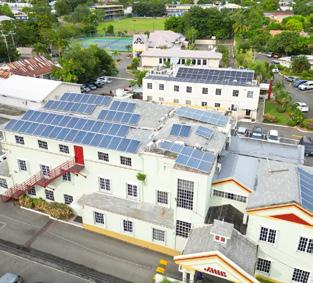







As part of JMMB’s commitment to becoming more energy-efficient, we continue to prioritize the integration of energy-efficient air conditioning units in our operations. This technology is a key focus in enhancing energy efficiency across all our locations.

Since 2014, the deployment of LED lights has become standard across all JMMB locations as part of our Go Green initiative. This requirement applies to all new construction, remodelling, renovation projects, and routine maintenance activities managed by our Facilities Management Department.
We mandate that our contractors adhere to this standard for all our locations.
JMMB is dedicated to supporting the reduction of carbon emissions by offering our clients loan products at competitive rates. These loans are designed to help clients invest in alternative energy options for their homes or businesses, covering up to 70% of the investment.
JMMB’s architectural design intentionally incorporates greenery through thoughtful landscaping and the inclusion of indoor plants. These elements enhance the aesthetic appeal of our offices and contribute significantly to promoting cleaner air and better air quality. Here are some ways in which landscaping and indoor plants achieve this:

- Air Purification
- Oxygen Production
- Humidity Regulation
- Reduction of Airborne Dust
- Improved Mental Health and Well-being
- Aesthetic and Acoustic Benefits
By intentionally incorporating greenery through landscaping and indoor plants, JMMB beautifies its office spaces and actively promotes a healthier, cleaner, and more productive work environment.


The harvested rainwater has been invaluable, especially during drought periods, as we use it to irrigate our plants and maintain our green spaces.
This practice allows us to reduce our reliance on the national water supply and, in turn, lessen our environmental impact. JMMB remains committed to exploring opportunities to increase our rainwater harvesting capacity wherever possible.



An active initiative focused on plastic bottle recycling has been implemented in collaboration with Jamaica Recycling Partners. With two main collection cages installed at our Phoenix Ave location, JMMB has made recycling easily accessible for our team members.


The environment is the newest pillar of the JMMB Foundation. Team members are invited to volunteer all year round in climate change initiatives, such as the Great Mangrove Cleanup.
JMMB remains steadfast in our commitment to environmental sustainability through our operations, partnerships, and practices. Year after year, we continuously seek opportunities to enhance our efforts in this regard.
As at Feb 2024, JMMB Transitioned to issuing printed statements upon request. As a result, we are projecting a reduction of 1,710,000 pages annually, estimated to save approximately 205 trees.


Additional strategies to reduce our reliance on paper across our operations include implementing digital service delivery channels both externally (such as ATMs, Moneyline, and other platforms) and internally (such as e-signatures and electronic document sharing).
***WFH statistic frequency over last three (3)years
*** 10% of TM body works from home, totalling savings of 266.72 metric tons of CO2 per year.
Our Work from Home (WFH) arrangement remains a key component of our long-term strategy. As a result, we continue to enjoy significant environmental benefits, including reduced carbon emissions due to fewer commutes and decreased overall office energy consumption.

- The wide-scale rollout of solar exterior lights now that the beta phase is completed.
- Installation of three (3) new Solar PV systems. Estimated 350 KWp combined when systems are online.
- We are excited to announce that we will be expanding the Collection Cages campaign to include additional locations in the upcoming fiscal year.
- Deduction of carbon emission by an additional 3,000,000 Kg per year minimum.


We believe in building and maintaining a sustainable Jamaica and, more broadly, a sustainable world for future generations. Our Vision of Love wholeheartedly supports this agenda, and we will strive to play our part in stewarding a sustainable future.



Information Technology’s (IT) focus for the last financial year 2023/24 has been to maintain stability whilst enhancing the resilience of the IT infrastructure and business applications. The team completed several initiatives that had a significant, positive impact across all territories. Notable initiatives include:


Completed

Improved system uptime and availability of IT services

As the technology unit continues to strengthen our Enterprise Architecture capabilities, we continue to achieve significant milestones that includes the retirement of legacy technologies, and consolidation of applications and services to improve operational efficiencies. With the Application Programming Interface (API) Gateway infrastructure in place,
we have started to see benefits with seamless integration of third-party services that have enhanced and improved our service delivery to our clients.
With our data protection policies and data governance framework in place, we have also developed our data warehouse and data quality management capabilities. This will allow us to better classify and manage our data throughout the data life cycle. We have also continued to improve our data loss prevention measures to further increase our ability to secure and protect sensitive data. We have become more data-driven, and the policies and frameworks in place will propel us forward through data analytics.
JMMB continues to invest in strengthening our cyber security framework and capabilities. We increased our digital footprint to provide additional services to our clients through our digital channels. Strengthening our cyber security has enhanced our ability to protect customer data and mitigate cyber threats that have become commonplace today.
Our IT initiatives have been strategically aligned to support the business’s goals and objectives. By focusing on infrastructure improvements, automation, data management, and security, we have enhanced our ability to deliver reliable and efficient services. These efforts have improved operational performance and positioned us to support future growth and innovation better. With current Artificial intelligence (AI) improvements, the team will leverage this technology to seek higher heights.


In line with the JMMB Group’s strategic direction to accelerate digital solutions to better meet the needs of clients and cater to their lifestyles and preferences, the JMMB Mobile App was launched on February 15th, 2024.
The app enhances client experience with greater convenience and ease when managing their portfolios and executing daily transactions from their mobile phone while empowering them to do more for themselves without the need to visit or call a branch.
Additionally, we aim to continuously improve the user experience by continuously introducing new features and capabilities. Clients can expect: card management features in the new FY2024/2025. This will facilitate activation of debit cards, changing pins and blocking or reporting cards outside of business operations hours.
The Group currently sees 62% of its clients interacting with it digitally, including completely or partially digital clients. The remaining clients continue to prefer to be served through our branch network. In addition to the convenience of the recently launched Moneyline App, the Group will continue to execute its digital initiatives to drive the adoption of our digital channels.




Clients interacting with the Group digitally account for 80% of total transactions processed:

AT JMMB
To further accelerate the Group’s digital transformation, the Moneyline IPO platform was also launched. This platform broadens investor participation by offering it to all investors regardless of broker affiliation.
Participants in public offers who are not clients of JMMB can now access offers through JMMB Moneyline, which was previously exclusive to clients. This platform allows for participation in public offers, including initial public offerings (IPO), additional public offerings (APO), rights issues and preference share offers.
The JMMB Money Transfer pre-paid card was included in the debit card suite of products to meet the need for financial inclusion and cash pick-up disbursements. This allows individuals in Jamaica to receive funds from friends and family overseas, from over 150 countries, with access to funds within minutes, 24/7, and without the hassle of visiting a branch or agent location.


To foster a more supportive ecosystem for MSME clients, our Visa Business Debit Card has been introduced to offer solutions tailored to their business needs. The card empowers business owners to streamline their financial operations, allowing separate personal and business transactions to manage their cash flow efficiently.
Financial year 2024/2025 will see the Group advancing the build-out of its digital capabilities to improve client access and experience. The year ahead will see our client and account opening process being converted to a fully digital process. This will provide an omni-channel experience that drives greater efficiency, improves client experience, and furthers the Group’s pursuit to reduce our carbon footprint by reducing the reliance on paper for this process.
Our payment options will be bolstered in the year ahead by the expansion of its VISA Debit offering to clients in the Dominican Republic, giving these clients greater access to their funds. The team also aims to launch its credit card offerings in the coming year. Clients can look forward to doing more with the JMMB Group as we remain committed to building capabilities that enable the Group to deliver a fully digital experience.


The 2023/2024 financial year was another successful period for JMMB Group’s Marketing function.
As the only financial brand in the world founded on the basis of love, JMMB continues to hold a special place in the hearts and minds of our community members. JMMB exists to inspire both our internal and external stakeholders to experience love and realize their greatness. In line with this purpose, the marketing function aims to achieve the following objectives:
• Enhancing the awareness of the JMMB brand.
• Growing revenue by generating and capturing demand for our financial solutions.
• Supporting the delivery of JMMB’s unique client experience.
Our team of marketing professionals operates in the Dominican Republic, Jamaica, and Trinidad and Tobago, executing strategies tailored to the needs of their respective countries.
The communication objectives for 20232024 were centred around brand building and positioning JMMB as an expert financial partner with comprehensive financial solutions to help clients achieve their financial goals. We continued integrating more digital and online channels into our marketing activities to creatively support our clients’ financial needs while maintaining closeness and quality service.
• Marketing Campaign: Launched an all-media marketing campaign themed “The New Bank,” aiming to position JMMB Bank in a competitive market.
• Dinerology Series: Continued the financial series “Dinerology” on YouTube, addressing financial questions for millennials and Generation Z concerned about financial growth and retirement.
• Channel Optimisation: Ongoing projects to optimize our channels and digital experiences, including implementing a Queue Management System (QMS) to streamline wait times and improve facility flow.
• Strategic Sponsorships and PR: Engaged in strategic sponsorships and public relations activities to enhance brand visibility and client engagement.
JMMB Group achieved remarkable milestones in Jamaica, demonstrating its commitment to marketing innovation and brand excellence. Here are the key initiatives and outcomes:
• Building Strong Brand Awareness and Brand Knowledge via Social Media – With the pervasive use of social media platforms as part of daily life, we continue to leverage those


channels as a way to build the awareness of the JMMB brand, through engaging content that is educational, informative and fun. Our brand metrics showed that the JMMB brand continues to enjoy strong awareness and endearment in the hearts and minds of our current and prospective clients.
• Campaign Launch of the JMMB Money Transfer Visa Prepaid Card - Successfully introduced a card that provides a convenient and secure cross-border payment solution for clients.
• Marketing Communication Introduction of the JMMB Moneyline Mobile App - The highly anticipated one-of-a-kind app that empowers clients to seamlessly conduct banking and investing transactions.
• Communications Coverage of the JMMB SME Accelerator and EmpowHer Programmes – Both focused on highlighting how JMMB continues to provide small and medium-sized business owners with the skills and tools they need to grow; through financial education, mentorship and tailored solutions.
• Grand Opening of JMMB’s Offices in Barbados - Effectively expanding JMMB’s regional footprint and strengthening our presence in the Caribbean market.
The primary focus of the Trinidad and Tobago marketing function was to build brand awareness for JMMB Bank, JMMB Investments, and JMMB Express Finance. Specific initiatives included:
• JMMB Express Finance: Continued to leverage the ‘JEF’ mascot and a content partnership with media influencer ‘Blaze’ to build awareness.
• JMMB Investments: Launched a digital
campaign supported by limited print ads to highlight and promote JMMB’s mutual funds.
• JMMB Bank: Introduced a new all-media brand campaign, “JMMB is a Real Bank,” to increase brand awareness. This campaign featured everyday people’s perspectives, creating an authentic and personable experience. By collaborating with brand influencer Jason Williams “JW,” we engaged in meaningful conversations with the audience, driving market influence.




We value open and respectful dialogue, and foster a culture where everyone feels heard and valued.




“Our core values of love, care, integrity, honesty and openness are demonstrated in everything that we do and everything that we are.”
Living true to our values gives us our competitive Advantage and our legacy to the world! You won’t find it listed on the product schedules, contracts, or competitive rate sheets, nor will it be on a barcode to enter our Financial Life Goals Centres and locations throughout the region; yet you’ll find Unconditional LOVE and our Core Values in each interaction with a JMMB family member. It is in the way our financial solutions are created, in how we establish strategic partnerships and the way that our teams and team members relate to each other and partner with our clients to achieve their financial life goals. We have been doing this since 1992 and have remained strongly committed to having Love direct how we deliver our client, shareholder, and team member value propositions.
Our core values have provided the foundation that has set us up to achieve at our highest and
remain resilient in challenging seasons. Clients, team members and shareholders have benefited from solutions created from our hearts and minds. Wherever we are located; Jamaica, Trinidad and Tobago, Dominican Republic or Barbados, our leadership teams, entities, departments and team members – Marketing, Research, Risk Management, Legal and Compliance, Trading and Treasury, Strategy Office, Fund Management, Insurance Brokerage, Remittance, Express, Real Estate, Capital Markets, Client Partnership & Care teams, Administrative and Operations teams, the Culture and Human Development Team are committed to foster an environment that perpetuates our Family Success Model and our Vision of Love.
It’s our mission to be “a dynamic, international, multi-faceted financial group of companies that has a caring, loving and fun environment where team members are happy, productive, creative and fulfilled.” We, therefore, provide opportunities for our core values to be tested and challenged because when all is said and done, we take pride



in unconventional partnerships built on Love and in redefining what’s possible in maximizing “client satisfaction through exceptional client care and world-class financial expertise”.
Unselfish, loyal, and benevolent concern for the good of self and others “ “
During the year, various initiatives and programmes were implemented to embed and ensure the perpetuation of our Core Values. The team Support Services unit was empowered to deliver the JMMB Way sessions, and approximately 550 team members have participated since its renewal. Wellbeing support for team leaders, team members and teams was developed and completed as we pivoted to support modifying the business model. The workshops were expanded with a particular focus on leadership and the introduction of leadership: the JMMB Way provided our leaders with an open forum to share and access one-to-one coaching, team intervention strategies and ways to level up team performance, as needed. Tools and distinctions were explored for a mindset shift to produce extraordinary results for self and others. Embedding the Core Values was also a focus of the Centre of Excellence as unique, fun ways to keep these values front and centre were done creatively using varied channels building on the JMMB Values Bingo from the previous year.
“The JMMB Group seeks to create an organisational environment where team players can achieve their full potential.” (Excerpt -Vision of Love)



Integrity
Firm adherence to one’s code and ethical values; the quality of being whole “ “
The execution of the JMMB Love Train in Jamaica facilitated face-to-face, heart-to-heart connections with team members and teams to discuss and share ideas about our strategic imperatives, enhancing our team member experience and thereby deepening the team’s ownership and partnership.




Through the Leadership Development Programme, 28 team leaders completed the programme in Cohort #4. The world-class workshops were tailored for JMMB and included coaches, presenters, and facilitators to guide team leaders in assessing their current teams while positioning them to fill future roles within the team. Team leaders who were recommended to participate were referred by a previous graduate or their direct team leader based on our Succession Planning.









The objective of Succession Planning is to identify and develop potential leaders within JMMB providing a smooth transition of key roles and responsibilities to ensure business continuity, talent development, retention, and mitigate risks including knowledge retention. Mission critical roles were identified and assessed throughout the Group, considering regulatory and other requirements per territory. Successors nominated for a team leader role are then enrolled in the corresponding Leadership Development Programme track.




Fairness and straight forwardness of conduct; Adherence to the facts, sincere “ “
Team members need clear and uplifting communication about the changes required to face the challenges and level up performance, productivity, and profitability. Therefore, Jamaica’s Culture and Human Development team formed the Team Engagement and Communication Support (TEC) hub to support our leadership in doing just this.
The team, supported by the respective project leaders and business owners, engaged team members in determining what changes looked like and the benefits of embracing them. This increased the level of ownership created a space for open feedback and the best ways to effect changes. The desired results are increased productivity, adjustments to organisational structure and improved operational efficiency, which would improve profitability within the targeted timelines.
In Jamaica, team members in the retail segment were prepared through workshops, road trips, and conversations online and in person, as the buildout of the One Client, One Partnership model to increase client intimacy was scheduled for implementation. We took the lessons from the experiences of the Dominican Republic team, who previously made the change, and our Client Partnership teams benefited from the Financial Partnership Conversation, which has been implemented in the Group.
The integration of JMMB University and LinkedIn Learn provided a diverse channel to meet the training needs of the team members across the Group. We look forward to the Career Pathing module, which will provide options for the next steps in career growth and development, thereby further creating “an organisational environment in which team players can achieve their full potential.”











Characterized by ready accessibility and usually generous attitude
“ “
Consistent with our strategic people objectives, the infusion of available technology and studies in the trends for the future remains a priority for the CHD Team. Our Automated People Processes have allowed team members to self-serve in making requests and updating their files, manage leave requests, keep track of performance management
and recording, have opportunities to learn in conjunction with JMMB University and analyse and make recommendations for successors for mission-critical roles. With additional features to be added, we look forward to the buildout of reports to provide supplementary data and analysis on our team members’ preferences and the ease with which new team members are onboarded and enjoy the JMMB team member journey.
implemented a Voluntary Separation Programme (VSP) as a team member-centred win/win strategy for making appropriate workforce adjustments and creating opportunities for organisational renewal. Our Voluntary Separation Programme allowed team members to fulfil their purpose and dreams beyond JMMB.
JMMB is happy that team members who applied and were accepted will be moving on to positively impacting their families and the wider society by:
• pursuing new opportunities outside of JMMB in furtherance of their passion, purpose, dreams
• Moving their entrepreneurial pursuits to the next level
Therefore, team members are expected and encouraged to be genuine, taking responsibility to express anything they feel, knowing that it is safe to do so. To ensure this, JMMB is committed to providing an open forum for ideas to be discussed, tested, and implemented to help each other grow.
Care thorough or watchful attention; being in the ‘world of the other’ “ “
In keeping with our VOL, JMMB took a win/win/win approach to modify our business operations to serve our clients better and increase our resilience in the face of the challenging economic environment. We
• Changing their work arrangements to dedicate more time to the special needs of their family.
Accordingly, the VSP eliminated the need for involuntary redundancies, save for one role. Our VSP was highly successful and served the best interest of all - it allowed us to put in place a new structure to improve our client experience, facilitated team members’ realisation of their personal goals and dreams, and allowed the Company to reconfigure for increased resilience and cost containment.
The atmosphere that JMMB is in the process of developing may be defined as an energy field where overlapping circles of creativity, passion, excitement, fun and laughter coexist in a dynamic process that ultimately leads to higher and higher levels of self-actualisation; hence, the achievement of the organisational mission.
Our team members engaged in celebration activities, team building, volunteering, thanksgiving, and personal achievements throughout the year. Initiatives that were driven to create this environment


included inter-departmental and Divas vs Dolls football competitions, inter-house competitions, Business House Netball competition, Week of Love, Team building activities, “Back to School” Day, Annual Blood Drive participation, 5K Run/Walk, Thanksgiving and Long Service Award ceremonies, among others.

• Start of the Trading knowledge program for the Business team to:
• Diversify the client portfolio and its profitability.
• Provide greater opportunities for growth in the organisation.
• Start of Inter-departmental Synergy sessions
• Cultivate a culture of self-learning: 90% of team members (TM) completed their Client Partnership Academy learning path.
• Follow-up on the implementation of activities to care for TMs holistically through the Wellness program.
• Xtreme Makeover
• Connect challenge.
• Fun challenge (Dance with me)
Our Dominican Republic operations received the following recognitions from the global organisation Great Place To Work:








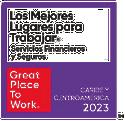
18th place in the Best Places to Work ® in Latin America 2023 in the category of small and medium-sized companies.
3rd in the Best Places to Work ® Dominican Republic and the Caribbean 2023.
Best Places to Work ® in the category of 101 to 1,000 employees in the Caribbean and Central America 2023.
3rd place in the Best Places to Work ® in the Early Childhood category in the Caribbean and Central America 2023.
3rd place in the Best Places to Work ® Financial Services and Insurance in the Caribbean and Central America 2023.



• Enhanced team member reward and recognition by creating and implementing Long Service Awards and framework for JMMB TT.
• Created KPI dashboards for all entities to support high-level CHDT reporting.
• Promotions resulting from higher levels of engagement, communication on the process and an increase in TMs’ confidence.
• 89% of Client Partnership TMs successfully completed the FPC training.
• Launched the “Life Milestones Celebration” programme to honour team members’ achievements. We are on target to have 66% of our leaders complete with LDP at the end of Cohort #4
Successful launch of learning and development survey to capture Personal Development Plan data for all TMs with training for aspirational roles


Successfully onboarding of key role to ensure the launch of JMMB International







• 99% of team members enrolled in LinkedIn Learn.
• Over 23,000 hours of learning videos viewed and 900 courses completed.
• 103 team members remain enrolled in the RWA.
• 96% of team members completed Mary Gober Principles training.
• 73% of development plans are completed, and steps for implementation are in place.
• 522 team members and 28 team leaders experience the JMMB Way!
• Over 50 team members were promoted within the Company.


JMMB Netball Team take top spot in Business House Competition Team Lymes brought renewed synergy in a fun and creative way across the country.
Team engagement activities including interdepartment football, Sports Day and other House competitions rekindled team spirit.
The care for our team members made it natural to care for our clients and deliver on the Client Value Proposition. Our Client Partnership Monitoring Unit (CPMU), located in the CHD Team, provides direct support to team members, clients, and strategic initiatives:
























Subject Matter Experts on projects that are high impact to clients (e.g The Save Smart Migration)
Measuring and monitoring performance via surveys
Monitoring feedback from clients and the impact to client experience, both positive and negative.

























I would like to contribute to the good of all persons with whom I come in contact, and to achieve complete harmony with the Holy Spirit. I will do so by focusing on, and endeavouring to realize the good for all persons concerned, which can be derived from every situation with which I am presented. - Joan Duncan







We strive to inspire greatness in every person we touch, creating a legacy of love, support, and achievement.


Simplicity and ease of process for the client
Clients enjoy their experience and feel like family
Clients are empowered to make the best choice and find the right solution to meet/achieve their needs/goals
“JMMB has the client’s back” and is fully invested in their success


The core of the JMMB Group’s client service delivery model is providing easy, enjoyable, empowering experiences in the best interest of our clients.
In the 2023/24 financial year, the Group made significant strides to enhance its service delivery model and ultimately deepen client partnership and intimacy for all segments.
The JMMB Group prides itself in consistently deepening our client partnerships and seeking opportunities to provide exceptional experiences. In Financial Year 2023/24, we focused on standardizing our service delivery framework across all channels, business lines and countries in keeping with the Group’s mantra of One Group, One Client, One Experience.
Enhancing our digital experience was a key imperative to improving client experience in all markets simultaneously. As such, the Group rolled out crucial digital solutions and enhancements to reduce client pain points, meet client expectations, and ultimately “wow” our clients.
The Group addressed a pain point of our clients while simultaneously “wowing” them with the release of the long-awaited Moneyline (Mobile) app in the financial year. This app allows clients to manage both their banking and investment needs
at the client’s fingertips. Earlier in the Financial Year, the Group launched the JMMB Moneyline (NonClient) IPO platform, which facilitates non-JMMB clients to participate in several public offerings, a service previously enjoyed only by JMMB clients. The launch of the Group’s Merchant Services solutions (Point of Sale), Money Transfer prepaid card, and Business Visa Business Debit Card further advanced the Group’s digital acceleration in providing a superior digital channel experience via payment solutions.
During the financial year, the Group rolled out its Queue Management System (QMS) and the simultaneous implementation of its Daily Real Time Client Feedback System. The QMS has allowed the effective monitoring of all queues joined by clients to fix pain points such as wait time and enhance overall service delivery. In Financial Year 2023/24, the Group realised the benefit of 67% reduced wait time in 14 of 21 branches across the Group, with plans to significantly reduce the wait time of the remaining branches in financial year 2024/25.
The launch of the QMS allowed for the implementation of daily real-time feedback. The Group is grateful for this opportunity to be in our clients’ world daily like never before. Clients can give us feedback daily, positive or negative, through a simple client survey received via WhatsApp at the end of each transaction. This feedback has been the driving force behind many successes achieved over the year in addressing client issues. For example, “on-call officers” were implemented in many branches across the Group to ensure maximum manning during branch peak hours. Consequently, there has been a significant reduction in client complaints for most branches and continued work to resolve in all remaining branches in Financial Year 2024/25. At the end of the Financial Year, the average overall branch experience daily score was 4.5 out of 5 for the Group.


The Group rolled out its Centralised Client Feedback Repository, which allows for the recording, tracking and monitoring client feedback received across the Group within the required time frames. This has led to more speedy resolution of client complaints and proper storage, recording and easy retrieval of client complaints when necessary. The information captured is then used to inform our internal client experience training. The introduction of this repository has simultaneously led to the improvement of our internal process by the creation of initiatives to permanently solve systemic problems
The Group continues to ensure it has the capacity and capability to deliver valuable solutions and expertly advise clients no matter where they are in their financial life cycle as an individual, family or business. On an ongoing basis, the Group invests in programmes and systems that support expert service delivery to empower team members to effectively partner with clients so that they can achieve their goals.
The Group continues to use our proprietary Financial Partnership Certification programme, which takes team members through a uniquely designed training module to build the highest levels of financial expertise and partnership with clients. This is complemented by ongoing mandatory financial partnership training and refreshers throughout the year for all team members on the frontline.
Rounding out ongoing financial partnership training is the voluntary Exceptional Life Mentorship Programme, available in Jamaica and Trinidad and Tobago. This programme’s mandate is to help TMs achieve their full potential in their work and personal lives. This aligns with the Group’s Vision of Love,
which says in part, “JMMB is seeking to create an organisational environment in which team players can achieve their full potential.”
n total, seventy team members have completed this programme, which has resulted in a marked improvement in goal achievement for our clients and significant growth in our mentees’ personal lives and career development. Complementary to this programme is the Client Partnership Academy in the Dominican Republic, which continues to provide a well-rounded development facility to support team members in achieving exceptional performance.
The Group continues to focus on delivering on the client value proposition - JMMB is your financial partner who always keeps the client’s best interest at heart by providing simple, transparent solutions oriented around life goal(s) – “Your Financial Life Goals Centre.”
As part of our commitment to providing our clients with exceptional care, in the 2024/25 Financial Year, retail clients in Jamaica will have one dedicated financial partner facilitating all their banking and investment needs:
• A single point of contact for all banking, investing and other financial solution needs;
• A holistic approach to service, which is focused on our client’s unique journey towards achieving your financial goals; and
• Greater financial planning support as our clients move along the different phases of their financial life cycle.
This model is currently present in the Dominican Republic, where we have successfully served our clients across business lines through one point of contact.



Our commitment to love means delivering excellence with a pure heart and fostering strong, supportive relationships that make a real difference.


individual and organisational goals are achieved.
This is the central ethos/philosophy of The JMMB Group and becomes increasingly challenging as the organisation increases in size. This innovative approach to life represents a new way of looking at the world, where equality and equity are dominant. Hence, this represents a paradigm shift. The JMMB Group is, therefore, actively and publicly involved in charitable and voluntary activities within the society and recognizes and accepts its social responsibility; understanding that it has everything to do with JMMB, which is part of the link in the wider chain.
The JMMB Group seeks to create an organisational environment where team players can achieve their full potential. Accordingly, the teams within the Group are committed to a long-term ongoing process of holistic development that recognizes the complete development of the individual. Therefore, The JMMB Group is a medium through which individuals may have dreams for themselves; they can extend those dreams beyond the organisation into an infinite, prosperous and abundant society and universe. Each person is loving and respectful of each other, and represents an important link in a chain of LOVE, serving each other, sharing ideas and building each other. Hence the JMMB vision is shared by all team players.
The JMMB Group is clear that the organisation is based on UNCONDITIONAL LOVE and MUTUAL RESPECT. This LOVE is expressed in ongoing day-to-day WORKING RELATIONSHIPS and PERFORMANCE. Unconditional love is expressed in every interaction and is the foundation upon which the organisation rests. Love motivates the JMMB team to serve our clients, who are a very special part of our family. The driving force of the organisation is to provide opportunities for team players to expand their potential, to recognize the power within and their ability to fully express and manifest this power to the benefit of the individual, the organisation and the society. In the process, all
With this perspective, the JMMB team recognizes diversity while celebrating differences among team members, realizing that there are commonalities that bind members together. When this ‘One-Ness’ is accepted, nurtured and developed, this enhances the ongoing implementation of the shared vision. The intention is to ensure that wherever conflict exists, we achieve a positive outcome.
The JMMB Group is committed to life in all its abundance. Accordingly, team players recognize the links between the organisation and the wider society and the interrelatedness of all life. In keeping with this, we are committed to actively concerned with the conservation, preservation, and sustenance of the natural environment to ensure sustainable development.
The atmosphere that the JMMB Group is in the process of developing may be defined as an energy field where overlapping circles of creativity, passion, excitement, fun and laughter coexist in a dynamic process that ultimately leads to higher and higher levels of self-actualization; hence, the achievement of the organisational mission. This is a loving, caring, and honest atmosphere where ideas are valued and shared openly; where a balance is created between aspirations and practical aspects of work and life, between actualization and potential. There is no fear, no limitations, no boundaries. Team members are, therefore, expected and encouraged to be genuine, taking responsibility to express anything they feel, knowing that it is safe to do so. To ensure



this, the JMMB Group is committed to providing an open forum for ideas to be discussed, tested and implemented to help each other grow.
Team members, therefore, envision the JMMB Group as the premier – financial institution of its kind: successful and professionally managed, with team members giving exceptional client care and striving to achieve excellence in all areas of life. Team members see the JMMB Group continuing to expand beyond Jamaica, retaining its spiritual characteristics and therefore developing all the
disciplines required for its continued success. DECLARATION: I believe so strongly in myself that I will not get defensive by criticism, as I know that every experience is an opportunity for growth. I will nurture and build my fellow team players. I will use every opportunity to praise and give thanks.
I embrace the uncertainty that forms part of my vision. I have strong enough faith to know that everything that happens along my path happens for a reason and that all things work together for my good.






Compelled by a strong commitment to our corporate social responsibility, the JMMB Joan Duncan Foundation’s path to nation-building and people empowerment continues to be guided by JMMB’s core values of love, openness, honesty, integrity, and care. This commitment is strongly demonstrated in initiatives focused primarily on education, transformational leadership, youth entrepreneurship, capacity building, community development and the environment.
As responsible corporate citizens, team members are involved in outreach initiatives geared towards empowering people and their communities facilitated by the network of branches Islandwide. We remain steadfast in our commitment to national transformation, and continue to deliver on our promise to develop, support and partner on initiatives in education and entrepreneurship that will impact the individual, community, and national levels. Our initiatives and partnerships continue to integrate practical tools and knowledge with a transformational mindset, leading to tangible impact and sustained results.
Given the JMMB Group’s regional footprint and international diversification, we remain committed to deepening our relationships in all the territories within which we operate. We are focused on the Foundation’s vision of “the positive transformation of lives and nations, to support the creation of oneness and the realization of greatness,” leading to a more prosperous and abundant society.
We are delighted to share the details of some of our initiatives under our key pillars for JMMB Financial Year 2023-24.
Braille Machines
The JMMB Joan Duncan Foundation joined other corporate sponsors on the Digicel Foundation-led ‘Follow the Trail, Invest in Braille’ campaign, donating J$765,000 to the cause to provide five additional braille machines to facilitate the teaching and learning process. The Salvation Army School for the Blind is the only educational institution in Jamaica catering to visually impaired and blind students. It has been providing quality education for some of the most vulnerable Jamaicans since 1927.


“A Braille machine is like a pen or pencil to a sighted child,” shared Mr. Iyeke Erharuyi, principal of the Salvation Army School for the Blind. The St. Andrew-based institution’s administrator also revealed that the school has only 26 working braille machines to cater to the 132 students enrolled at the institution, underscoring the dire need for additional machines to increase access to quality education for the students.
By providing additional braille machines, we are helping to create a conducive learning environment for visually impaired and blind students, allowing them to unearth their greatness and open unlimited possibilities to impact our society positively. We are proud partners of this campaign as it serves as another step in driving inclusion in our society by putting the requisite infrastructure and resources in place to increase equitable access for all.”
Studies have shown that low food security among tertiary students is an often-overlooked issue, although it can affect more than 25% of the tertiary population. Against this background, the JMMB Joan Duncan Foundation has made a J$1 million donation to the GraceKennedy (GK) Campus Connect Food Bank, which is executed through the GraceKennedy Foundation (GKF).
The initiative provides over 250 tertiary students with food packages monthly in a bid to alleviate the hunger of these vulnerable, financially challenged students.
“No educational pursuit should be hindered by hunger or poor nutrition, especially with the challenges students already face while pursuing tertiary studies. Recognising the far-reaching impact that inadequate nutrition can have on educational outcomes, the JMMB Joan Duncan Foundation is pleased to be a part of this food bank initiative led by GKF, alongside other corporate donors, to assist our future leaders to realise their greatness and
achieve their dreams,” shared Kim Mair, CEO of the JMMB Joan Duncan Foundation.
Partnering with the Creative Language-Based Learning (CLBL) Foundation to improve children’s learning ability across Jamaica, the Foundation provided funding to facilitate the Year-Round Instructional Mentorship Development and JobEmbedded Coaching delivered by the CLBL Senior Coach and Associate Coaches to 273 teachers from all cohorts. This programme takes participating teachers through the Four Stages of Professional Development to become Local Instructional Mentors (LIMs).
For the academic year 2023-24, we continued our commitment to supporting students’ educational dreams through academic scholarships and bursaries for individuals ranging from high school to university levels, as well as summer camps. Emphasis was again placed on funding final-year tertiary students. Scholarship recipients also participated in the LIFE Accelerator programme‘Leadership, Involvement and Innovation, Financial Literacy & Education (LIFE) Accelerator’, ensuring that future generations are equipped to contribute to a prosperous society fully.






We continued to support sports through the funding of programmes which strengthen coaching development. This year, we embarked on a new relationship with GC Foster College while continuing our partnership with the Jamaica Football Federation Coaching School and Netball Jamaica Centre Pass Technical Assistance Programme. Clarendon College also received funding for improving its football field while other support of various school and sports club activities continued.
The JMMB Joan Duncan Foundation has invested approximately J$400,000 in the Franklyn Town Community Development Project (FTDCP). This initiative is designed to empower at-risk young men to make positive and healthy lifestyle choices and develop life skills by creating socio-economic opportunities, reducing violence and crime, and promoting a sense of community. The yearlong programme includes a structured football programme, educational and personal development initiatives, and community engagement activities.
Support also extended to track and field through the support of Gibson McCook Relays and several community-based youth organisations.
The Joan Duncan/JMMB Endowment was established to provide scholarships and bursaries, student development and training programmes at the University of the West Indies (UWI), and to support Mona School of Business Management (MSBM) academic staff development. We continue to enjoy a fruitful relationship with UWI.
The 10th annual Joan Duncan Memorial Lecture, ‘Party Done? Entrepreneurial Opportunities in the Entertainment Industry’ was delivered by Ibrahim ‘IB’ Konteh, CEO of IB Enterprises and Director of IBE Limited. Known for his work as a creative powerhouse and conceptualizer behind popular entertainment events such as Strictly 2KThrowback Music Festival and Afro Soca Jam, IB shared his journey as an entrepreneur, marketer and author, which has taken him to his current position as owner of five event brands servicing five international markets in Jamaica, Atlanta, New York, Florida, Washington DC and Canada.
Discussing the challenges and opportunities of the entertainment industry, IB provided insights into creating and sustaining a business model built on creating value for the target audience. He encouraged industry players to create niche events that cater to evolving needs, that are safe, inclusive and consistent with their values.
The lecture was broadcast live on Television Jamaica and moderated by Mr. George Davis.


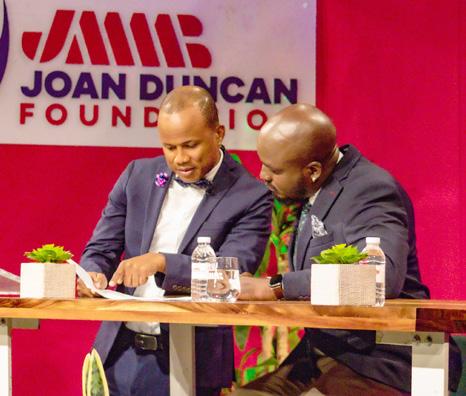
Conversations for Greatness has been included as part of the Entrepreneurial Behaviour course offered through the Joan Duncan School of Entrepreneurship, Ethics & Leadership (JDSEEL), UTech, Jamaica. The workshop is delivered by trained CFG Facilitators to broaden the thinking of Jamaica’s future entrepreneurs and support them in anchoring themselves in practical tools that will serve them in the future.
The Joan Duncan School of Entrepreneurship, Ethics & Leadership (JDSEEL), UTech, Jamaica, is the first school in the English-speaking Caribbean to offer a specialized B.Sc. degree in Entrepreneurship. It is also the first school in the English-speaking Caribbean to have an active business entrepreneurship incubator centre – The Technology Innovation Centre (TIC) - for start-up businesses.
The Conversations for Greatness (CFG) InSchools programme, which was completed in June 2021, impacted approximately 6,700 lives in 88 schools over five years. This transformational conversation, which inspired educators and entire school communities to take a stand for themselves and their students, manifest their greatness, and
transform their lives, now continues through our targeted engagements with teachers’ colleges.
The MICO University and the JMMB Joan Duncan Foundation partnered to provide Conversations for Greatness as an 18-hour course offered through their School of Continuing Education. The engagement was very strong, and feedback from the university indicated that CFG was notable as a “must attend” course, as students predominantly identified CFG as the first choice when making their selection. Although primarily targeting first-year students, the course has also been offered to second and third-year students who need continuing education credits to matriculate for graduation.
We continue to work with Sam Sharpe and Church Teachers Colleges to make Conversations for Greatness available to students and staff at these institutions.
Continuing to encourage the development of young entrepreneurs, the JMMB Joan Duncan Foundation continued its support for major secondary and tertiary entrepreneurial competitions to nurture young entrepreneurs and inspire corporate social responsibility in new business ventures. The Foundation once again sponsored the UWI Venture Challenge and Junior Achievement Jamaica Marketing Mavens competitions.
As major supporters of the UWI Vincent Hosang Venture competition, we again saw the display of ingenuity and creativity. Winners of the competition were:
1st place – Sim’s Pimento Liquids
2nd Place – Brave New Technologies
3rd Place – Ceres Robotics & Green Worx (tie)
CSR prize – Green Worx, Robert Williams






Project Star
As a legacy partner of Project Star, the JMMB Joan Duncan Foundation continues to work on the ground in communities through Conversations for Greatness workshops for community leaders, participants of the STAR Employment Programme and basic schools within the designated communities.
Project STAR is a social transformation and renewal programme, led by the Private Sector Organisation of Jamaica (PSOJ) in partnership with the Jamaica Constabulary Force (JCF). It is a strategic and targeted intervention aimed at transforming ten (10) of Jamaica’s under-resourced communities, through a collaborative, evidence-based approach to achieve sustainable violence prevention at the community level.
The Foundation continued to partner with the Programme of Advancement Through Health and Education (PATH) in the Ministry of Labour and Social Security to facilitate Conversations for Greatness to the Steps to Work Project beneficiaries. From April 2023 to March 2024, seven hundred and fourteen (714) participants in its BizStart101 workshop series participated in CFG. BizStart101 is offered to PATH Beneficiaries who have been identified as potential or existing micro-entrepreneurs who, with training, can develop and sustain successful businesses. The Ministry provided participants with the technical training and grant funding while the Foundation provided participants with the “possibility thinker” mindset and practical tools of CFG to engender an entrepreneurial mindset; that is, the confidence to make the most of opportunities, overcome and learn from setbacks, make decisions, and take ownership of their performance.





The MultiCare Youth Foundation’s (MYF) YUTE &YOU annual mentorship training programme is primarily funded by the JMMB Joan Duncan Foundation. The programme facilitated training workshops that benefitted more than 260 mentors and 300 mentees in Kingston, St. Andrew, St. Catherine, Clarendon, St. James, and Westmoreland from April 2023 to March 2024.
Matches were established between caring adult mentors and mentees, who have committed to developing trusting, supportive and enduring relationships for at least one year.
JMMB Joan Duncan Foundation has supported The MultiCare Youth Foundation and its YUTE programme over the past thirteen years.
The Child Resiliency Programme(CRP) continued its expanded objectives to include the provision of Training in Building Peace, Resiliency and Wellness (PRW) to university students at the International University of the Caribbean (IUC) and to those persons involved in providing care for children “at risk” or emerging from trauma. The Building Peace, Resiliency and Wellness Curriculum has been integrated into the master’s in educational
administration, the Bachelor of Education, Guidance and Counseling and Psychology Course thus far as part of the offerings of the Peace Institute, with 90 undergraduate students completing the 8-week course this year. In addition, 30 Teachers and Guidance Counselors from MVPI, 30 Council for World Council in Mission (CWM) participants, 30 Guidance counsellors from Region 1 and 25 Project Star facilitators completed the one-day Certificate Training in PRW in the context of trauma during this reporting period.
The Child Resiliency programme has also continued to build Resiliency in Children and their parents at Boys Town and Mountain View Primary for 20232024. The cohort of 60 referred children ages 1011 years, identified to be “at risk” for violence from Edward Seaga Primary, Trench Town Primary, Boys Town All Age, St Alban’s Primary and St Annie’s Primary were supported at Boys Town and another 25 children identified to be at risk were supported at the Mountain View Primary and Infant School (MVPI).
Literacy support, life skills training (including spiritual development), creative activities and sporting activities to reinforce life skills training, as well as parent/family/training /counselling and home visits for the families of the children referred were provided. The children also received a daily nutritional meal. The programme has continued to thrive this year, culminating in Christmas concerts, Sports Days, Behavior Prize giving medals awards, and field trips for the winning behaviour house prizes each term. The Boys Town and Mountain View Primary sites continue to serve as communitybased and in-school CRP models, respectively, for practicum learning assignments for university students. This year, they included University of Toronto students from the faculty of Sports for Peace and CWM participants in training.
An Operational Guideline Manual and kit for the Child Resiliency Programme have now been developed along with the PRW training manual.


The leadership team is poised for training and evaluation of any replication site. The CRP model was replicated at Steer Town primary, St Ann, in the reporting period. Tremendous gratitude was extended to the JMMB Joan Duncan Foundation for the invaluable support to the CRP leadership team and all beneficiaries throughout 2023-2024.
The Foundation continues to be a strong and consistent supporter of this gem of a programme, which provides a comprehensive rehabilitation programme for those who face mental challenges and homelessness. Participants are empowered to live normal, productive lives within their families and society through activities designed to improve their lives by imparting the necessary knowledge and coping skills.
The Foundation also provided additional support as a sponsor of the annual fundraising event CUMI Golf event in September 2023.
Dedicated to restoring peace and tranquillity, the CUMI team continues to do a fantastic job ensuring the delivery of services for Montego Bay’s mentally ill.

Among the numerous organisations supported during the year, significant support went to the Violence Prevention Alliance (VPA), Council of Voluntary Social Services (CVSS), Girl Guides Association of Jamaica, ID Pioneers, American Friends of Jamaica, and Moorlands Camp to name a few.
Jamaica In My Tummy, Waa Gwaan Jimi, Welcome to the Jungle, and The Unforgiveness Monsters were just a few of the books read by JMMB team members to excited students at selected schools islandwide on Read Across Jamaica Day 2023. After reading, these books were gifted to the school.



JMMB team members, their friends and families donned their sneakers and took part in many 5K run/walks, remaining steadfast in our commitment to participating in community activities, including the 2024 Sagicor Sigma Honour Run, which benefits the National Chest Hospital, Savanna-LaMar Public Hospital and the Danny Williams School for the Deaf and Jamaica Reach to Recovery ICWI Pink Run to name a few.




As part of our commitment to being actively concerned with conserving, preserving, and sustaining the natural environment (Vision of Love), we partnered with the Port Royal Marine Laboratory & Biodiversity Centre. Team members volunteered for International Coastal Cleanup Day on September 16 to help rid the coast of man-made debris.

In the true spirit of giving during the Yuletide season, the JMMB Joan Duncan Foundation joined hands and hearts with its team members and charities islandwide to share love and bring Christmas cheer to over 3000 vulnerable individuals this year, including the elderly, disabled and others in need. These individuals were gifted with SHARE THE LOVE packages filled with groceries to provide a meal for a small family for a week, warming the hearts and tummies of many families at Christmas.
We continue to seek partnerships and support initiatives within our focus areas, knowing that we are truly changing lives and transforming communities, especially for the elderly, disabled, and vulnerable families who face food insecurity across the island.





At the Foundation, we offer our beneficiaries more than just monetary or in-kind donations. Every individual or entity receiving funding, regardless of the contribution’s size or nature, is invited to partake in a transformational experience designed to empower them to maximize every opportunity. This, we believe, is our greatest contribution.
In the true spirit of JMMB, championed by our co-founders Joan Duncan and Dr. Noel Lyon, participants are equipped with a possibility-thinking mindset and practical tools to help them make a unique mark towards an “infinite, prosperous, and abundant society & Universe” (Vision of Love). Beneficiaries are invited to participate in the Conversations for Greatness transformational workshop, which supports individuals in tapping into and unleashing their collective and individual potential. This year, we impacted 1973 people through this approach including participants from Project STAR
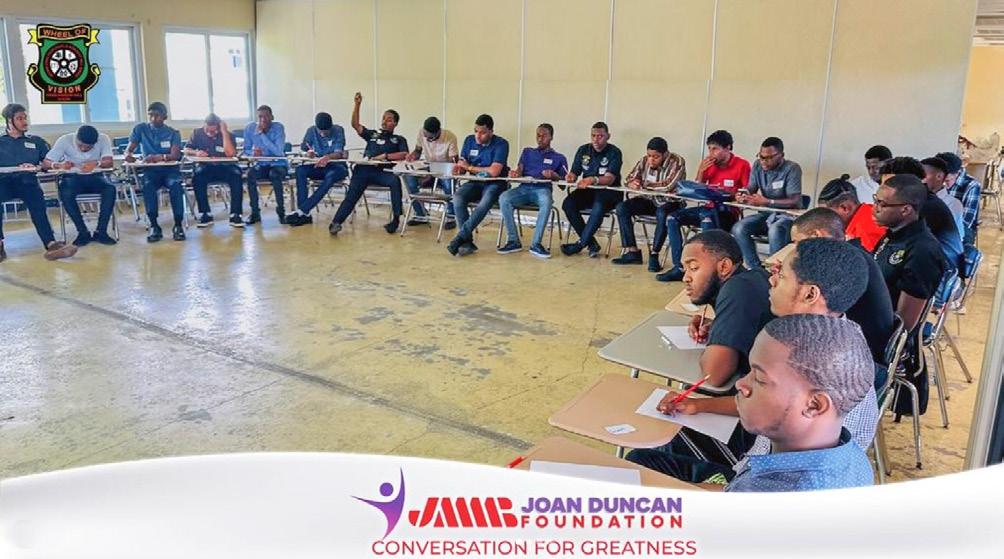
We end this year with a spirit of gratitude and hope, recognizing that as part of the JMMB family, it is our responsibility and our purpose to support the building of our society and to impact lives in significant ways. We are thankful that God has enabled us to make our contribution to this important effort through the power of love and service.









Empowering our communities by giving with a pure heart and best intentions.



(876) 998-JMMB (5662)
From the USA and Canada: 1 (877) 533-5662
From the UK: 0 (800) 404-9616
Opening Hours: Monday – Sunday: 8:00 a.m. – 12:00 a.m. info@jmmb.com www.jmmb.com
6 Haughton Terrace, Kingston 10
Tel: (876) 998-5662
Fax: (876) 960-9546
Opening Hours: Monday – Friday: 8:30 a.m. – 2:30 p.m.
Email: info@jmmb.com www.jmmb.com
HAUGHTON AVENUE BRANCH
5 Haughton Avenue, Kingston 10
Tel: (876) 998-5662
Fax: (876) 920-7281 or (876) 998-9380
Opening Hours: Monday – Friday: 8:30 a.m. – 2:30 p.m.







BRANCH
11 Knutsford Boulevard, Kingston 5
Tel: (876) 998-5662
Fax: (876) 960-3927 or (876) 960-4455
Opening Hours: Monday – Friday: 8:30 a.m. – 2:30 p.m.
JUNCTION AGENCY
Shop 2, Roye’s Plaza, Main Street,
Junction St. Elizabeth
Tel: (876) 998-5662
Opening Hours:
Monday – Friday:
8:30 a.m. to 2:30 p.m.
MANDEVILLE BRANCH
23 Ward Avenue, Mandeville, Manchester
Tel: (876) 998-5662
Fax: (876) 625-2352
Opening Hours:
Monday – Friday:
8:30 a.m. – 2:30 p.m.
MONTEGO BAY BRANCH
Suite 1,
Fairview Office Park, Alice Eldemire Drive, Montego Bay, St. James
Tel: (876) 998-5662
Fax: (876) 979-8985
Opening Hours: Monday – Friday: 8:30 a.m. – 2:30 p.m.
MAY PEN BRANCH
Shop 28B, Bargain Village Plaza, 35 Main Street, May Pen, Clarendon Tel: (876) 998-5662
Fax: (876) 786-3660
Opening Hours: Monday – Friday: 8:30 a.m. – 2:30 p.m.
OCHO RIOS BRANCH
Shop 12/30-30B, Island Village Shopping Centre, Turtle River Road, Ocho Rios, St. Ann Tel: (876) 998-5662
Fax: (876) 795-3886
Opening Hours:
Monday – Friday: 8:30 a.m. – 2:30 p.m.
PORTMORE BRANCH
47 - 48 West Trade Way, Portmore Town Centre, Portmore, St. Catherine Tel: (876) 998-5662
Fax: (876) 939-3207
Opening Hours:
Monday – Friday: 10:30 a.m. – 2:30 p.m.
SANTA CRUZ BRANCH
96 Main Street (beside STETHS across from Gas Mart), Santa Cruz, St. Elizabeth
Tel: (876) 998-5662
Fax: (876) 966-9816
Opening Hours:
Monday – Friday: 8:30 a.m. – 2:30 p.m.


6 Haughton Terrace, Kingston 10
Tel: (876) 998-5662
Fax: (876) 960-8106
Opening Hours: Monday – Friday: 8:30 a.m. – 2:30 p.m.
www.jmmb.com
Email: info@jmmb.com
Dr Archibald Campbell - Chairman H. Wayne Powell - Director
Kisha Anderson - Director
Audrey Deer-Williams - Director
Keith Duncan - Director
V. Andrew Whyte - Director
Carolyn DaCosta - Company Secretary



8 Dominica Drive, New


JMMB INSURANCE BROKERS LTD.
Kingston, Kingston 5
Tel: (876) 998-5662
Fax: (876) 960-3927 or (876) 998-9380
Opening Hours: Monday – Friday: 8:30 a.m. – 2:30 p.m. www.jmmb.com
Email: info@jmmb.com
Dr Archibald Campbell - Chairman Keith Duncan - Director
Kisha Anderson - Director Paul Gray – Director
Cecile Cooper - Director
Carolyn DaCosta - Company Secretary
6 Haughton Terrace, Kingston 10
Tel: (876) 998-5662
Fax: (876) 960-9546
Dr Archibald Campbell - Chairman
Kisha Anderson - Director
Audrey Deer-Williams - Director
Keith Duncan - Director
Opening Hours: Monday – Friday: 8:30 a.m. – 2:30 p.m. www.jmmb.com
Email: info@jmmb.com
Julian Mair - Director
V. Andrew Whyte - Director
Carolyn DaCosta - Company Secretary
HEAD OFFICE
6-8 Grenada Way, Kingston 5 Jamaica, W.I.
Tel: (876) 998-5662
Toll Free: 1 (888) 991-2062/7
Fax: (876) 960-1381
Opening Hours:
Monday – Friday: 8:30 a.m. – 2:30 p.m.
www.jmmb.com
Email: info@jmmb.com
HAUGHTON AVENUE BRANCH
5 Haughton Avenue, Kingston 10
Tel: (876) 998-5662
Fax: (876) 920-7281 or (876) 998-9380
Opening Hours:
Monday – Friday:
8:30 a.m. – 2:30 p.m.
Drive -Thru:
Monday – Friday: 9:00 am – 2:30 p.m.
11 Knutsford Boulevard New Kingston, Kingston 5
Tel: (876) 998-5662
Fax: 960-3927 or 960-4455
Opening Hours:
Monday – Friday: 8:30 a.m. – 2:30 p.m.
23 Ward Avenue, Mandeville, Manchester
Tel: (876) 998-5662
Fax: (876) 625-2352
Opening Hours: Monday – Friday: 8:30 a.m. – 2:30 p.m.
MONTEGO BAY CHURCH STREET BRANCH
25 Church Street, Montego Bay, St. James Jamaica, W.I.
Tel: (876) 998-5662
Fax: (876) 952-4647
Opening Hours:
Monday – Friday: 8:30 a.m. – 2:30 p.m.
Dennis Harris - Chairman
Vintoria Bernard - Director
BOARD OF DIRECTORS
MONTEGO BAY FAIRVIEW BRANCH
Suite 1,
Fairview Office Park, Alice Eldemire Drive, Montego Bay, St. James
Tel: (876) 998-5662
Fax: (876) 979-8985
Opening Hours:
Monday – Friday: 8:30 a.m. – 2:30 p.m.
OCHO RIOS BRANCH
Shop 12/30-30B, Island Village Shopping Centre, Turtle River Road, Ocho Rios, St. Ann
Opening Hours:
Monday – Friday: 8:30 a.m. – 2:30 p.m.
PORTMORE BRANCH
47 - 48 West Trade Way, Portmore Town Centre, Portmore, St. Catherine
Tel: (876) 998-5662
Fax: (876) 939-3207
Opening Hours:
Monday – Friday: 10:30 a.m. – 2:30 p.m.
H Wayne Powell - Director
Gregory Shirley - Director
Dr Archibald Campbell - Director
Keith Duncan - Director
Martin Lyn - Director
Patricia Sutherland - Director
Jerome Smalling - Executive Director
Carolyn DaCosta - Company Secretary


JMMB MONEY TRANSFER LTD.
6 Haughton Terrace, Kingston 5 Jamaica, W.I.
Tel: (876) 998-5662
Toll Free: 1 (888) 991-2062/7 Fax: (876) 960-2833
OF DIRECTORS
Opening Hours: Monday – Friday: 8:30 a.m. – 2:30 p.m.
www.jmmb.com
Email: info@jmmb.com
Dr Archibald Campbell - Chairman Keith Duncan - Director
Kisha Anderson - Director
Andrew Cocking - Director
V. Andrew Whyte - Director
Carolyn DaCosta - Company Secretary
JMMB PUESTO DE BOLSA, S.A
Gustavo Mejia Ricart No. 102, esq. Abraham Lincoln. Torre Corporativo 2010. Piso 12. Piantini. Santo Domingo, República Dominicana
Tel: (809) 566-5662
Fax: (809) 620-5662
www.jmmb.com
Email: info@jmmb.com.do
Gustavo Mejia Ricart No. 102, esq. Abraham Lincoln. Torre Corporativo 2010. Piso 2. Piantini. Santo Domingo, República Dominicana
Tel: (809) 566-5662
Fax: (809) 620-5662
Opening Hours: Monday – Friday: 9:00 a.m. – 6:00 p.m.
BOARD OF DIRECTORS
www.jmmb.com
Email: info@jmmb.com.do
Av. 27 de Febrero esquina Erick Ekman. Plaza Portal del Norte. Santiago, República Dominicana
Tel: (849) 937-JMMB (5662)
Fax: (809) 620-5662
Opening Hours: Monday – Friday: 9:00 a.m. – 6:00 p.m.
Alerso Pimentel Dominguez - President José De Moya Cuesta - Director
Juan Jose Melo Pimentel - Vice-President
Roberto Jimenez Collie - Director
Carolina Pichardo Toral - Company Secretary


AFP JMMB BDI, S.A
HEAD OFFICE
Gustavo Mejia Ricart No. 102, esq. Abraham Lincoln. Torre Corporativo 2010. Piso 15. Piantini. Santo Domingo,
República Dominicana
Tel: (809) 542-JMMB (5662) Fax: (809) 620-5662
Opening Hours: Monday – Friday: 8:00 a.m. – 5:00 p.m. www.jmmb.com Email: info@jmmb.com.do
406 Abraham Lincoln Avenue, Unicentro Plaza,
second floor, suite 48, Piantini, Santo Domingo, República Dominicana
Tel: (809) 542-JMMB (5662)
Fax: (809) 620-5662
Opening Hours: Monday – Friday: 8:00 a.m. – 5:00 p.m. www.jmmb.com
Email: info@jmmb.com.do
Dr. Archibald Campbell - President Rafael Patricio Medina Quiñones - Director
Juan Carlos Rodríguez Copello - Vice President Polibio Miguel Valenzuela Scheker - Director
Keith Duncan - Director Carolina Pichardo Toral - Company Secretary
Lizette Solano De Aquino - Director
JMMB SOCIEDAD ADMINISTRADORA DE FONDOS DE INVERSIÓN, S.A
HEAD OFFICE
Gustavo Mejia Ricart No. 102, esq. Abraham Lincoln. Torre Corporativo 2010. Piso 15. Piantini. Santo Domingo, República Dominicana
Tel: (809) 567-JMMB (5662)
Fax: (809) 620-5662
Opening Hours:
Monday – Friday: 9:00 a.m. – 6:00 p.m. www.jmmb.com
Email: info@jmmb.com.do
SANTO DOMINGO BRANCH
Gustavo Mejia Ricart No. 102, esq. Abraham Lincoln. Torre Corporativo 2010. Piso 2. Piantini. Santo Domingo, República Dominicana
Tel: (809) 566-5662
Fax: (809) 620-5662
Opening Hours:
Monday – Friday: 9:00 a.m. – 6:00 p.m. www.jmmb.com
Email: info@jmmb.com.do
SANTIAGO BRANCH
Av. 27 de Febrero esquina Erick Ekman. Plaza Portal del Norte. Santiago, República Dominicana
Tel: (849) 937-JMMB (5662)
Fax: (809) 620-5662
Opening Hours: Monday – Friday: 9:00 a.m. – 6:00 p.m.
Isaac Castañeda - President Rodolfo Antonio Cabello Blanco - Director
Juan Jose Melo Pimentel - Vice-President Carolina Pichardo Toral - Company Secretary
Roberto Luis Jimenez Collie - Director


Gustavo Mejia Ricart No. 102, esq. Abraham Lincoln. Torre Corporativo 2010. Piso 1. Piantini. Santo Domingo, República Dominicana
Tel: (809) 683-1333 (JMMB)
Fax: (809) 620-5662
Opening Hours:
Monday – Friday: 8:30 a.m. – 5:30 p.m. www.jmmb.com
Email: info@jmmb.com.do
Gustavo Mejia Ricart No. 102, esq. Abraham Lincoln. Torre Corporativo 2010. Piso 1. Piantini. Santo Domingo, República Dominicana
Tel: (809) 683-1333 (JMMB)
Fax: (809) 620-5662
Opening Hours:
Monday – Friday: 8:30 a.m. – 5:30 p.m. www.jmmb.com
Email: info@jmmb.com.do
Av. 27 de Febrero esquina Erick
Ekman. Plaza Portal del Norte. Santiago, República Dominicana
Tel: (809) 683-1333 (JMMB)
Fax: (809) 620-5662
Opening Hours:
Monday – Friday: 8:30 a.m. – 5:30 p.m.
Boulevard 1ro de Noviembre, GAL Business Center, suite 1, Punta Cana, La Altagracia, República Dominicana
Tel: (809) 566-5662 (JMMB)
Fax: (809) 620-5662
Opening Hours:
Monday – Friday: 8:30 a.m. – 5:30 p.m.
Saturday: 9:00 a.m. –1:00 p.m. www.jmmb.com
Email: info@jmmb.com.do
321 San Vicente de Paul Av., Megacentro Mall, Pasillo La Fauna, suite 46-A, Santo Domingo Este, República Dominicana
Tel: (809) 566-5662 (JMMB)
Fax: (809) 620-5662
Opening Hours:
Monday – Friday: 8:30 a.m. – 5:30 p.m.
Saturday: 9:00 a.m. –1:00 p.m. www.jmmb.com
Email: info@jmmb.com.do
62 Sarasota Avenue, Bella Vista Mall, first floor, Suite 42-A, Santo Domingo, República Dominicana
Tel: (809) 566-5662 (JMMB)
Fax: (809) 620-5662
Opening Hours:
Monday – Friday: 8:30 a.m. – 5:30 p.m.
Saturday: 9:00 a.m. –1:00 p.m. www.jmmb.com
Email: info@jmmb.com.do


DSM Plaza, Old Southern Main Road, Chaguanas, Trinidad and Tobago
Tel: (868) 800-JMMB (5662) Fax: (868) 665-6663 www.jmmb.com
Email: infott@jmmb.com
68 Ariapita Avenue, Woodbrook, Trinidad and Tobago
Tel: (868) 800-JMMB (5662) Fax: (868) 625-8678
Opening Hours: Monday – Thursday:
9:00 a.m. – 3:00 p.m. Friday: 9:00 a.m. – 5:00 p.m.
30-32 Eastern Main Road, Tunapuna, Trinidad
Tel: (868) 800-JMMB (5662) Fax: (868) 645-1821
Lorraine Kam - Chairman
Hugh Duncan - Director
Wayne Sutherland - Director
Catherine Kumar - Director
John Tang Nian - Director
Opening Hours: Monday – Thursday: 9:00 a.m. – 3:00 p.m. Friday: 9:00 a.m. – 5:00 p.m.
SouthPark, Tarouba Link Road, San Fernando, Trinidad
Tel: (868) 800-JMMB (5662) Fax: (868) 658-5662
Opening Hours: Monday – Friday: 10:00 a.m. – 5:00 p.m.
Vijai Ragoonanan - Director
Anna-Maria Garcia-Brooks - Directorr
Darren Mohammed - Director
Aliyah Hamel-Smith - Director
Rachel Maikhoo - Company Secretary


JMMB EXPRESS FINANCE (T&T) LIMITED
HEAD OFFICE
86 Ramsaran Street, Chaguanas, Trinidad and Tobago
Tel: (868) 800-JMMB (5662)
Fax: (868) 665-6663
www.jmmb.com
Email: infott@jmmb.com
ARIMA BRANCH
#6 Prince Street, Arima, Trinidad
Opening Hours: Monday – Friday: 9:00 a.m. – 4:00 p.m.
PORT-OF-SPAIN BRANCH
130 Charlotte Street, Port of Spain, Trinidad
Lorraine Kam - Chairman
Hugh Duncan - Director
Wayne Sutherland - Director
SAN FERNANDO BRANCH
65 Cipero Street, San Fernando, Trinidad
Opening Hours: Monday – Friday: 9:00 a.m. – 4:00 p.m.
SCARBOROUGH BRANCH
#4 Knott Court, Milford Road, Scarborough, Tobago
Opening Hours: Monday – Friday: 9:00 a.m. – 4:00 p.m.
Vijai Ragoonanan - Director
Anna-Maria Garcia-Brooks - Director
Darren Mohammed - Director
Catherine Kumar - Director Aliyah Hamel-Smith - Director
John Tang Nian - Director
Rachel Maikhoo - Company Secretary
JMMB INVESTMENTS (TRINIDAD AND TOBAGO) LIMITED
PORT-OF-SPAIN BRANCH
169 Tragarete Road, Port-of-Spain
Tel: (868) 800-JMMB (5662)
Fax: (868) 224-5662
Opening Hours:
Monday – Friday: 8:00 a.m. – 4:00 p.m.
CHAGUANAS BRANCH
DSM Plaza, Old Southern Main Road, Chaguanas, Trinidad and Tobago
Tel: (868) 800-JMMB (5662)
Fax: (868) 671-9120
Opening Hours: Monday – Friday: 8:00 a.m. – 5:00 p.m.
Wayne Sutherland - Chairman
Julian Mair - Director
Kisha Anderson - Director
Amoy Van Lowe - Director
www.jmmb.com
Email: infott@jmmb.com
SAN FERNANDO BRANCH
South Park Centre, Michael Rahael Boulevard, San Fernando, Trinidad
Tel: (868) 800-JMMB (5662)
Fax: (868) 658-5820
Opening Hours: Monday – Friday: 8:00 a.m. – 5:00 p.m.
Catherine Kumar - Director
Emily Chee Wah - Director
Carolyn DaCosta - Company Secretary
Rachel Maikhoo - Asst. Company Secretary


JMMB SECURITIES (T&T) LIMITED
169 Tragarete Road, Port-of-Spain
Tel: (868) 800-JMMB (5662)
Fax: (868) 224-5667
Opening Hours: Monday – Friday: 8:00 a.m. – 4:00 p.m. www.jmmb.com
Email: infott@jmmb.com
Wayne Sutherland - Chairman
Julian Mair - Director
Kisha Anderson - Director
Amoy Van Lowe - Director
Catherine Kumar - Director
Emily Chee Wah - Director
Carolyn DaCosta - Company Secretary
Rachel Maikhoo - Asst. Company Secretary
JMMB INTERNATIONAL LIMITED
HEAD OFFICE
JMMB International Limited, 2nd Floor, Hastings Business Centre, Hastings, Christ Church, Barbados BB15150
Opening Hours: Monday – Friday: 8:00 a.m. – 4:30 p.m.
Dennis Harris - Chairman
Kisha Anderson - Director
Diana Burgess - Director
Professor C. Justin Robinson - Director
Julian Mair - Director
Michael Jordan - Director
Ann Wallace-Elcock - Director
Carolyn DaCosta - Company Secretary



Our commitment to care ensures we prioritize the well-being and success of everyone we interact with, fostering a culture of compassion and support.




I/We ________________________________________________________________________ of _____________________________________________________________ being a member/members of JMMB Group Limited (the Company) hereby appoint ______________________________________________ of _______________________________ or failing him/her appoint ___________________________ of as my/our proxy to vote on my/our behalf at the Annual General Meeting of the Company to be held on will be held MONDAY SEPTEMBER 23, 2024 at 10:00 a.m. (Jamaica) in a hybrid format (i) at the Jamaica Pegasus Hotel Kingston, located at 81 Knutsford Boulevard, Kingston 5 Jamaica, for attendance in person, and (ii) via electronic means* in accordance with the provisions of the Companies Act of Jamaica 2004 (as amended) to consider and if thought fit, to pass the following ordinary resolutions:
Please indicate by inserting a cross (x) in the appropriate box for how you wish to cast your vote. If you do not insert the cross in any of the boxes below, your proxy shall be entitled to vote as they deem fit in respect of the resolution corresponding with such box.
RESOLUTION 1
To receive the Reports of the Directors and Auditors and the Audited Accounts for the twelve (12) months ended March 31, 2024.
RESOLUTION 2
To ratify interim dividend payment and declare it final.
THAT the interim dividends of Twenty-Five Cents (25¢) paid on October 9, 2023, and Twenty-Five Cents (25¢) paid on August 12, 2024, making a total of Fifty Cents (50¢) for the year under review be and are hereby ratified and declared as final and that no further dividend be paid in respect of the year under review.
RESOLUTION 3 TO RE-APPOINT DIRECTORS
Resolution 3 (a)
THAT Dr. Archibald Campbell, who retires by rotation and being eligible for re-election, be and is hereby re-elected a Director of the Company.”
Resolution 3 (b)
THAT Mr. Andrew Cocking, who retires by rotation and being eligible for re-election, be and is hereby re-elected a Director of the Company.”


“THAT Mrs. Donna Duncan-Scott, who retires by rotation and being eligible for re-election, be and is hereby re-elected a Director of the Company.”
“THAT Mr. Dennis Harris, who retires by rotation and being eligible for re-election, be and is hereby re-elected a Director of the Company.”
In accordance with Article 108 of the Articles of Incorporation, the following Director, having been appointed during the year, retire and are eligible for re-election ;
“That Director Nerisha Davis Farquharson, having been appointed during the year, retires and being eligible offers himself for re-election.”
“THAT KPMG, Chartered Accountants, having agreed to continue in office as auditors, be and are hereby appointed auditors of the Company to hold office until the end of the next Annual General Meeting at a remuneration to be fixed by the Directors of the Company.”
RESOLUTION 6
THAT the amount included in the Audited Accounts of the Company for the year ended March 31, 2024, as remuneration for their services as Directors be and is hereby approved.”
Dated this 24th day of July, 2024 Signature
Notes:
1. To be valid, this Proxy must be deposited with the Secretary of JMMB GROUP LIMITED at 6 HAUGHTON TERRACE, KINGSTON 10, JAMAICA, not less than 48 hours before the time appointed for holding the meeting. A Proxy need not be a member of the Company.
2. This Proxy Form should bear stamp duty of J$100.00. Adhesive stamps are to be cancelled by the person signing the Proxy.
3. If the appointer is a Corporation, this Proxy Form must be executed under its Common Seal or under the hand of an officer or attorney duly authorized in writing.
* NB: the details of the various methods of accessing the meeting online will be shared shortly via our website and in daily newspapers and in any event at least 21 days before the date fixed for the holding of the Annual General Meeting.


The Directors of JMMB Group Limited are pleased to present their report for the year ended March 31, 2024, and submit the Consolidated Income Statement and the Consolidated Statement of Financial Position.
• Operating revenue net of interest expense was J$22.29B (2023: J$23.38B)
• The profit/loss before income tax was J$7.32B (2023: J$0.96B restated)
• The profit attributable to equity holders of the parent after income tax was J$11.54B (2023: J$0.58B restated)
• Shareholders’ equity was J$54.67B (2023: J$38.1 B restated)
The Directors recommend that the interim dividends paid on October 9, 2023 and August 12, 2024 be ratified and declared as final and that no further dividend be paid in respect of the year under review.
The Directors retiring from office by rotation pursuant to Article 105 of the Company’s Articles of Incorporation are Dr. Archibald Campbell, Mr. Andrew Cocking, Mrs. Donna Duncan-Scott, and Mr. Dennis Harris, all of whom, being eligible, offer themselves for re-election.
In accordance with Article 108 of the Articles of Incorporation, the Mrs. Nerisha Davis Farquharson, having been appointed during the year, retires and is eligible for re-election.
The auditors, KPMG Chartered Accountants, have indicated their willingness to continue in office pursuant to Section 154 of the Companies Act, 2004.
JMMB Group Limited advises that during the financial year under review, the following holding companies were transferred to JMMB Financial Holdings Limited as mandated by the Banking Services Act 2014; Jamaica Money Market Brokers (Trinidad and Tobago) Limited and JMMB DR Holding Company Limited. This restructuring was undertaken following receipt of the non-objection from the Bank of Jamaica (“BOJ”) and is part of a wider restructuring exercise being undertaken by the Group. The restructuring exercise aims to harmonise the Group’s overall corporate structure for its local and overseas holdings with the structure required for financial groups under the Banking Services Act, 2014 (“BSA”) by separating financial services companies in the Group from the nonfinancial companies.
The Directors wish to thank management and all team members of the Group for their performance during the year under review.
As always, we sincerely thank our clients and our shareholders for their continued support and partnership.
By Order of the Board Dated this 22 day of July, 2024
Carolyn DaCosta Corporate Secretary





KPMG Chartered Accountants
P.O. Box 436 6 Duke Street Kingston Jamaica, W.I. +1 (876) 922 6640 firmmail@kpmg.com.jm
To the Members of JMMB GROUP LIMITED
Report on the Audit of the Financial Statements
Opinion
We have audited the separate financial statements of JMMB Group Limited (“the Company”) and the consolidated financial statements of the Company and its subsidiaries (“the Group”), set out on pages 9 to 123, which comprise the Group’s and Company’s statements of financial position as at 31 March 2024, the Group’s profit or loss account, the Group’s and Company’s statements of profit or loss and other comprehensive income, changes in stockholders’ equity and cash flows for the year then ended, and notes, comprising material accounting policies and other explanatory information.
In our opinion, the accompanying financial statements give a true and fair view of the financial position of the Group and the Company as at 31 March 2024, and of the Group’s and Company’s financial performance and cash flows for the year then ended in accordance with IFRS Accounting Standards as issued by the International Accounting Standards Board (IFRS Accounting Standards) and the Jamaican Companies Act.
Basis for Opinion
We conducted our audit in accordance with International Standards on Auditing (ISAs). Our responsibilities under those standards are further described in the Auditors’ Responsibilities for the Audit of the Financial Statements section of our report. We are independent of the Group and the Company in accordance with the International Ethics Standards Board for Accountants International Code of Ethics for Professional Accountants, including International Independence Standards (IESBA Code), and we have fulfilled our other ethical responsibilities in accordance with the IESBA Code. We believe that the audit evidence we have obtained is sufficient and appropriate to provide a basis for our opinion.

2
To the Members of JMMB GROUP LIMITED
Report on the Audit of the Financial Statements (Continued)
Key Audit Matters
Key audit matters are those matters that, in our professional judgment, were of most significance in our audit of the financial statements of the current period. These matters were addressed in the context of our audit of the financial statements as a whole, and in forming our opinion thereon, and we do not provide a separate opinion on these matters.
1. Fair value of investments
Key Audit Matter
[see notes 16 and 33(a) for further disclosures
Investment Securities: Group: $320,178,779,000 (2023: $342,478,224,000].
A significant portion of the Group’s investment securities measured at fair value are instruments for which quoted prices are not available.
Valuation of these investments, although based on mainly observable market inputs, requires significant estimation. The Group used valuation techniques which involve inputs such as market yields obtained from established yield curves which are impacted by uncertainty of market factors.
Though market conditions have improved since the onset of the COVID-19 pandemic, there has been continued volatility of prices in various markets which has increased estimation risk for yields and prices used in determining fair values.
How the matter was addressed in our audit
Our procedures in this area included, in the main, the following:
• Assessing and testing the design and operating effectiveness of the Group’s controls over the determination and computation of fair values.
• Evaluating the reasonableness of yields or prices by comparison to independent third-party pricing sources.
• Involving our own valuation specialists to assist us to determine or obtain yields or prices of specific securities and comparing these yield or prices to those used by the Group.
• Assessing the adequacy of the disclosures surrounding the key judgements and estimation uncertainty included in the financial statements

3
To the Members of JMMB GROUP LIMITED
Report on the Audit of the Financial Statements (Continued)
Key Audit Matters (continued)
2. Measurement of expected credit losses on financial assets
Key Audit Matter
[see note 32(b)]
The Group recognises expected credit losses (‘ECL’) on financial assets, the determination of which is highly subjective and requires the Group to make significant judgements and assumptions.
The key areas that required greater management judgement included the determination of significant increase in credit risk (‘SICR’), the determination of probability of default, loss given default, exposures at default and the application of forward-looking information.
How the matter was addressed in our audit
Our procedures, in the main, in this area included the following:
• Obtaining our understanding of the models used by the Group for the calculation of expected credit losses, including governance over the determination of key judgements and assumptions.
• Testing the design and implementation of the controls over the determination of expected credit losses.
• Testing the completeness and accuracy of the data used in the models to the underlying accounting records on a sample basis.
• Involving our own financial risk modelling specialists to assist us in evaluating the appropriateness of the Group’s impairment methodologies, including the SICR criteria used, independently assessing certain assumptions for probability of default, loss given default, exposure at default and the incorporation of forwardlooking information.

Page 4
To the Members of JMMB GROUP LIMITED
Report on the Audit of the Financial Statements (Continued)
Key Audit Matters (continued)
2. Measurement of expected credit losses on financial assets (continued)
Key Audit Matter [see notes 31(b)]
Significant management judgement and assumptions are also used in determining the appropriate variables and assumptions in the model used to measure of the expected credit losses.
The use of these judgements and assumptions increases the risk of material misstatement and is therefore an area of increased audit focus.
3. Impairment assessment of investment in associate
Key Audit Matter
Interest in Associate: $44,873,796 (2023: $24,194,819) [see note 18]
The market capitalisation of the Group’s shareholding in the associated company is below its carrying value, determined using equity accounting. This is considered to be an indicator of impairment for which the Group performed a formal impairment assessment.
How the matter was addressed in our audit
Our procedures, in the main, in this area included the following (continued):
• Evaluating the adequacy of the financial statements’ disclosures including disclosures of the key assumptions and judgements, for compliance with IFRS 9.
How the matter was addressed in our audit
Our procedures, in the main, in this area included the following:
• Involving our own valuation specialists to assist us in evaluating the Group’s calculation of the recoverable amount of the investment and evaluating the assumptions and methodology used.
• Comparing the Group’s assumptions to externally derived data as well as our assessment of key inputs such as discount rate.
• Evaluating the Group’s assessment of the forecast performance of its investment by comparing projected results with historical performance as well as our own assessment based on our knowledge of the industry.

Page 5
To the Members of JMMB GROUP LIMITED
Report on the Audit of the Financial Statements (Continued)
Other Information
Management is responsible for the other information. The other information comprises the information included in the annual report but does not include the financial statements and our auditors’ report thereon. The annual report is expected to be made available to us after the date of this auditors’ report.
Our opinion on the financial statements does not cover the other information and we will not express any form of assurance conclusion thereon.
In connection with our audit of the financial statements, our responsibility is to read the other information identified above when it becomes available and, in doing so, consider whether the other information is materially inconsistent with the financial statements or our knowledge obtained in the audit, or otherwise appears to be materially misstated.
When we read the annual report, if we conclude that there is a material misstatement therein, we are required to communicate the matter to those charged with governance.
Responsibilities of Management and Those Charged with Governance for the Financial Statements
Management is responsible for the preparation of financial statements that give a true and fair view in accordance with IFRS Accounting Standards and the Jamaican Companies Act, and for such internal control as management determines is necessary to enable the preparation of financial statements that are free from material misstatement, whether due to fraud or error.
In preparing the financial statements, management is responsible for assessing the Group’s and the Company’s ability to continue as a going concern, disclosing, as applicable, matters related to going concern and using the going concern basis of accounting unless management either intends to liquidate the Group and/or the Company or to cease operations, or has no realistic alternative but to do so.
Those charged with governance are responsible for overseeing the Group’s financial reporting process.
Auditors’ Responsibilities for the Audit of the Financial Statements
Our objectives are to obtain reasonable assurance about whether the financial statements as a whole are free from material misstatement, whether due to fraud or error, and to issue an auditors’ report that includes our opinion.
Reasonable assurance is a high level of assurance, but is not a guarantee that an audit conducted in accordance with ISAs will always detect a material misstatement when it exists. Misstatements can arise from fraud or error and are considered material if, individually or in the aggregate, they could reasonably be expected to influence the economic decisions of users taken on the basis of these financial statements.
A further description of our responsibilities for the audit of the financial statements is included in the Appendix to this auditors’ report. This description, which is located at pages 7-8, forms part of our auditors’ report.

Page 6
To the Members of JMMB GROUP LIMITED
Report on the Audit of the Financial Statements (Continued)
We have obtained all the information and explanations which, to the best of our knowledge and belief, were necessary for the purposes of our audit.
In our opinion, proper accounting records have been maintained, so far as appears from our examination of those records, and the financial statements, which are in agreement therewith, give the information required by the Jamaican Companies Act in the manner required.
The engagement partner on the audit resulting in this independent auditors’ report is Karen Ragoobirsingh.

Chartered Accountants
Kingston, Jamaica
June 18, 2024

To the Members of JMMB GROUP LIMITED
As part of an audit in accordance with ISAs, we exercise professional judgment and maintain professional skepticism throughout the audit. We also:
• Identify and assess the risks of material misstatement of the financial statements, whether due to fraud or error, design and perform audit procedures responsive to those risks, and obtain audit evidence that is sufficient and appropriate to provide a basis for our opinion. The risk of not detecting a material misstatement resulting from fraud is higher than for one resulting from error, as fraud may involve collusion, forgery, intentional omissions, misrepresentations, or the override of internal control.
• Obtain an understanding of internal control relevant to the audit in order to design audit procedures that are appropriate in the circumstances, but not for the purpose of expressing an opinion on the effectiveness of the Group’s and the Company’s internal control.
• Evaluate the appropriateness of accounting policies used and the reasonableness of accounting estimates and related disclosures made by management.
• Conclude on the appropriateness of management’s use of the going concern basis of accounting and, based on the audit evidence obtained, whether a material uncertainty exists related to events or conditions that may cast significant doubt on the Group’s and Company’s ability to continue as a going concern. If we conclude that a material uncertainty exists, we are required to draw attention in our auditors’ report to the related disclosures in the financial statements or, if such disclosures are inadequate, to modify our opinion. Our conclusions are based on the audit evidence obtained up to the date of our auditors’ report. However, future events or conditions may cause the Group and/or the Company to cease to continue as a going concern.
• Evaluate the overall presentation, structure and content of the financial statements, including the disclosures, and whether the financial statements represent the underlying transactions and events in a manner that achieves fair presentation.
• Obtain sufficient appropriate audit evidence regarding the financial information of the entities or business activities within the Group to express an opinion on the consolidated financial statements. We are responsible for the direction, supervision and performance of the group audit. We remain solely responsible for our audit opinion.
We communicate with those charged with governance regarding, among other matters, the planned scope and timing of the audit and significant audit findings, including any significant deficiencies in internal control that we identify during our audit.

Page 8
To the Members of JMMB GROUP LIMITED
Appendix to the Independent Auditors’ report (Continued)
We also provide those charged with governance with a statement that we have complied with relevant ethical requirements regarding independence, and communicate with them all relationships and other matters that may reasonably be thought to bear on our independence, and where applicable, related safeguards.
From the matters communicated with those charged with governance, we determine those matters that were of most significance in the audit of the financial statements of the current period and are therefore the key audit matters. We describe these matters in our auditors’ report unless law or regulation precludes public disclosure about the matter or when, in extremely rare circumstances, we determine that a matter should not be communicated in our report because the adverse consequences of doing so would reasonably be expected to outweigh the public interest benefits of such communication.

Consolidated Profit or Loss Account
Consolidated Profit or Loss Account
Year ended 31 March 2024 (expressed in Jamaican dollars unless otherwise indicated)

Year ended 31 March 2024 (expressed in Jamaican dollars unless otherwise indicated) The notes on pages 20 to 123 are an integral part of
see note 36. The notes on pages 20 to 123 are an integral part of these


Consolidated Statement of Profit or Loss and Other Comprehensive Income Year ended 31 March 2024 (expressed in Jamaican dollars unless otherwise indicated)
Consolidated Statement of Profit or Loss and Other Comprehensive Income Year ended 31 March 2024 (expressed in Jamaican dollars unless otherwise indicated)
Other comprehensive income
Item that will not be reclassified to profit or loss:
Unrealised gain/(loss) on equity securities at fair value through other comprehensive income (FVOCI)
Items that are or may be reclassified to profit or loss:
( 112,122)
Realised gains/(losses) on debt securities at FVOCI reclassified 387,620 ( 675,592)
Unrealised gains/(losses) on debt securities at FVOCI 6,278,333 ( 3,526,457)
Share of other comprehensive gains/(losses) of associate 18
( 917,309)*
Foreign exchange differences on translation of foreign Subsidiaries ( 1,480,411) ( 1,211,282)
Total other comprehensive income/(loss), net of tax 5,140,741 ( 4,897,310)
Total comprehensive income/(loss) for the year 16,992,325 ( 4,207,748)
Total comprehensive income/(loss) attributable to:
( 571,446) 16,992,325 ( 4,207,748)

*Restated see note 36.

The notes on pages 20 to 123 are an integral part of these financial statements.
The notes on pages 20 to 123 are an integral part of these financial statements.

Consolidated Statement of Financial Position
Consolidated Statement of Financial Position
31 March 2024
31 March 2024
(expressed in Jamaican dollars unless otherwise indicated)
(expressed in Jamaican dollars unless otherwise indicated)

*Restated see note 36.

The notes on pages 20 to 123 are an integral part of these financial statements.
The notes on pages 20 to 123 are an integral part of these financial statements.

Consolidated Statement of Financial Position (Continued) 31 March 2024 (expressed in Jamaican dollars unless otherwise indicated)


The financial statements on pages 9 to 123 were approved for issue by the Board of Directors on June 18, 2024 and signed on its behalf by:


Archibald Campbell Chairman Keith P. Duncan Group Chief Executive Officer
*Restated see note 36.
Consolidated Statement of Financial Position (Continued) 31 March 2024 (expressed in Jamaican dollars unless otherwise indicated) The notes on pages 20 to 123 are an integral part of these financial statements.
The notes on pages 20 to 123 are an integral part of these financial statements.

ended 31 March 2024 (expressed

Consolidated Statement of Chan ges in Stockholders’ Equity Year ended 31 March 2024 (expressed in Jamaican dollars unless otherwise indicated)

pages
*Restated see note 36. The notes on pages 20 to 123 are an integral part of these

Consolidated Statement of Cash Flows
Consolidated Statement of Cash Flows
Year ended 31 March 2024 (expressed in Jamaican dollars unless otherwise indicated)


( 1,817,650) Net cash (used in)/provided by operating activities (Page 15) (14,909,585) 1,758,255
*Restated, see note 36.
The notes on pages 20 to 123 are an integral part of these financial statements.
Year ended 31 March 2024 (expressed in Jamaican dollars unless otherwise indicated) The notes on pages 20 to 123 are an integral part of these financial statements.

Consolidated Statement of Cash Flows (Continued)
Year ended 31 March
Year ended 31 March 2024 (expressed in



Company Statement of Profit or Loss Account and Other Comprehensive Income Year ended 31 March 2024
Company Statement of Profit or Loss Account and Other Comprehensive Income Year ended 31 March 2024 (expressed in Jamaican dollars unless otherwise indicated)
(expressed in Jamaican dollars unless otherwise indicated)

The notes on pages 20 to 123 are an integral part of these financial statements.
The notes on pages 20 to 123 are an integral part of these financial statements.


Company Statement of Financial Position
Company Statement of Financial Position
31 March 2024
31 March 2024
(expressed in Jamaican dollars unless otherwise indicated)


The financial statements on pages 9 to 123 were approved for issue by the Board of Directors on June 18, 2024 and signed on its behalf by:


Archibald Campbell Chairman Keith P. Duncan Group Chief Executive Officer
The notes on pages 20 to 123 are an integral part of these financial statements.
(expressed in Jamaican dollars unless otherwise indicated) The notes on pages 20 to 123 are an integral part of these financial statements.

Company Statement of Changes in Stockholders’ Equity
Company Statement of Changes in Stockholders’ Equity
Year ended 31 March 2024
Year ended 31 March 2024
(expressed in Jamaican dollars unless otherwise indicated)
(expressed in Jamaican dollars unless otherwise indicated)

The notes on pages 20 to 123 are an integral part of these financial statements.
The notes on pages 20 to 123 are an integral part of these financial statements.


Company Statement of Cash Flows
Company Statement of Cash Flows
Year
Year ended 31 March 2023 (expressed in Jamaican dollars unless otherwise indicated)



Notes to the Financial Statements
31 March 2024
Notes to the Financial Statements
31 March 2024
(expressed in Jamaican dollars unless otherwise indicated)
(expressed in Jamaican dollars unless otherwise indicated)
(a) JMMB Group Limited (the “Company”) is incorporated and domiciled in Jamaica. The registered office of the Company is located at 6 Haughton Terrace, Kingston 10, Jamaica. The principal activity of the Company is that of holding equity investments in business enterprises.
(b) JMMB Group Limited has interest in several subsidiaries and an associate which are listed below. The Company, its subsidiaries and associate are collectively referred to as “the Group”.
and its subsidiaries
JMMB Investments (Trinidad and Tobago) Limited and its subsidiary
Bank (T&T) Limited

JMMB Financial Holdings Limited (JMMB FHL) was incorporated on 24 December 2021. JMMB FHL is licensed as a Financial Holding Company as required under the Banking Services Act (2014) and regulated by the Bank of Jamaica. During the year, the financial regulated entities in Trinidad and Tobago and Dominican Republic were transferred from JMMB Group Limited to direct ownership of JMMB FHL. The transfers were made at book value.


Notes to the Financial Statements
31 March 2024
Notes to the Financial Statements
31 March 2024
(expressed in Jamaican dollars unless otherwise indicated)
(expressed in Jamaican dollars unless otherwise indicated)
In the prior year, the regulated entities in Jamaica were transferred to JMMB Financial Holdings Limited. The non-financial entities, CC SPV Limited, formerly Capital & Credit Securities Limited and JMMB Real Estate Holdings Limited, were transferred from Jamaica Money Market Brokers Limited to direct ownership of JMMB Group Limited. The transfers were made at book value.
(a) Statement of compliance:
The financial statements are prepared in accordance with IFRS Accounting Standards as issued by the International Accounting Standards Board (IFRS Accounting Standards) and comply with the provisions of the Jamaican Companies Act.
Effective April 1, 2023, the Group adopted the amendments to IAS 1, which resulted in the Group disclosing material accounting policies, rather than significant accounting policies, based on the following definition from the amended standard:
“Accounting policy information is material if, when considered together with other information included in an entity’s financial statements, it can reasonably be expected to influence decisions that the primary users of general-purpose financial statements make on the basis of those financial statements”.
Other pronouncements under IFRS Accounting Standards did not result in any changes to amounts recognised or disclosed in these financial statements.
Details of the Group’s accounting policies are included in note 37.
(b) Basis of preparation:
The financial statements are prepared on the historical cost basis, except for certain financial instruments and investment properties which are measured at fair value.
(c) Functional and presentation currency:
The financial statements are presented in Jamaican dollars, which is the functional currency of the Company, and are expressed in thousands of dollars unless otherwise stated.
(d) Use of estimates and judgements:
The preparation of the financial statements in conformity with IFRS requires management to make estimates and assumptions that affect the reported amounts of, and disclosures relating to, assets, liabilities, contingent assets and contingent liabilities at the reporting date and the income and expenses for the year then ended. Actual amounts could differ from those estimates.
Estimates and underlying assumptions are reviewed on an ongoing basis. Revisions to accounting estimates are recognised in the period in which the estimate is revised, or in the period of the revision and future periods, if the revision affects both current and future periods.
Information about estimation uncertainty and critical judgements in applying accounting policies that have the most material effect on the amounts recognised in the financial statements are described in note 3.



JMMB GROUP LIMITED
Notes to the Financial Statements
Notes to the Financial Statements
31 March 2024
31 March 2024
(expressed in Jamaican dollars unless otherwise indicated)
(expressed in Jamaican dollars unless otherwise indicated)
The Group accounting policies which require the use of judgements that have the most material effect on the amounts recognised in the financial statements are described below:
(a) Key sources of estimation uncertainty
(i) Impairment of financial assets (Group and Company)
The measurement of the allowances for expected credit loss (ECL) allowance for financial assets measured at amortised cost and fair value through other comprehensive income (FVOCI) is an area that requires the use of complex models and significant assumptions about future economic conditions and credit behaviour (e.g. the likelihood of customers defaulting and the resulting losses).
A number of significant judgements are required in applying the accounting requirements for measuring ECL, such as:
Choosing appropriate models and assumptions for the measurement of ECL;
Establishing the number and relative weightings of forward-looking scenarios for each type of product/market and the associated ECL; and
Explanation of the inputs, assumptions and estimation techniques used in measuring ECL is further detailed in notes 32(b) and 37(b)(vii).
(ii) Fair value of financial instruments (Group)
There are no quoted market prices for a significant portion of the Group’s financial assets. Accordingly, fair values of several financial assets are estimated using prices derived from a yield curve. The yield curve is, in turn, obtained from a pricing source which uses indicative prices submitted to it by licensed banks and other financial institutions in Jamaica. There is significant uncertainty inherent in this approach. The fair values determined in this way are classified as Level 2 fair values.
Some other fair values are estimated based on quotes published by broker/dealers, and these are also classified as Level 2. The estimates of fair value arrived at from these sources may be significantly different from the actual price of the instrument in an actual arm’s length transaction (see notes 16 and 33).
(iii) Impairment of intangible assets (Group)
Impairment of intangible assets with indefinite useful lives is dependent upon management’s internal assessment of future cash flows from the intangibles. That internal assessment determines the amount recoverable from future use of these assets. The estimate of the amount recoverable from future use of these assets is sensitive to the discount rates and other assumptions used (note 20).
(iv) Impairment of the carrying value of interest in associate (Group)
Impairment of interest in associate is dependent upon management’s internal assessment of future cash flows from the associate. That internal assessment determines the recoverable value of the associate. The estimate of the amount recoverable from future operations of the associate is also sensitive to the discount rates used.



Notes to the Financial Statements
31 March 2024
Notes to the Financial Statements
31 March 2024
(expressed in Jamaican dollars unless otherwise indicated)
(expressed in Jamaican dollars unless otherwise indicated)
3. Critical Accounting Judgements and Key Sources of Estimation Uncertainty (Continued)
(b) Critical accounting judgements in applying the Group’s accounting policies
The Group’s accounting policies which require the use of judgements in applying accounting policies that have the most material effects on the amounts recognised in the consolidated financial statements include the following:
Impairment of financial assets (Group and Company):
Establishing the criteria for determining whether credit risk on the financial asset has increased significantly since initial recognition, determining the methodology for incorporating forward-looking information into the measurement of expected credit losses (ECL) and selection and approval of models used to measure ECL require significant judgement [see notes 32(b) and 37(b)(vii)].
4. Segment Reporting
A segment is a distinguishable component of the Group that is engaged either in providing related products or services (business segment), or in providing products or services within a particular economic environment (geographical segment), which is subject to risks and rewards that are different from those of other segments.
The Group’s activities are organised into three main business segments:
(i) Financial and related services which include securities brokering, stock brokering, portfolio planning, funds management and investment advisory services.
(ii) Banking and related services which include taking deposits, granting loans and other credit facilities, foreign currency trading and remittance and related services.
(iii) Other represents insurance brokering, investment and real estate holding.



Notes to the Financial Statements
to the Financial Statements 31 March 2024
31 March 2024
(expressed in Jamaican dollars unless otherwise indicated)
(expressed in Jamaican dollars unless otherwise indicated)
4. Segment Reporting (continued)
The geographic information analyses the Group’s external revenue and non-current assets by the Company’s country of domicile and other countries. In presenting the geographic information below, segment revenue is based on the geographic location of the customers and segment assets are based on the geographic location of the assets.
The Group 2024

The Group 2023


Notes to the Financial Statements
31 March 2024
Notes to the Financial Statements
31 March 2024
(expressed in Jamaican dollars unless otherwise indicated)
(expressed in Jamaican dollars unless otherwise indicated)

Included in salaries and benefits is $526,623,000 (2023: Nil) for restructuring costs.


Notes to the Financial Statements
31 March 2024
Notes to the Financial Statements
31 March 2024
(expressed in Jamaican dollars unless otherwise indicated)
(expressed in Jamaican dollars unless otherwise indicated)



Notes to the Financial Statements
31 March 2024
Notes to the Financial Statements
31 March 2024
(expressed in Jamaican dollars unless otherwise indicated)
(expressed in Jamaican dollars unless otherwise indicated)
(a) Income tax for the Company is computed at 25% on the profit for the year adjusted for tax purposes. Income taxes for all subsidiaries are based on statutory income tax rates prevailing in each jurisdiction.
Deferred income tax (note 22)
(b) The tax on profit differs from the theoretical amount that would arise using the statutory rate of 25% as follows:



Notes to the Financial Statements
31 March 2024
Notes to the Financial Statements
31 March 2024
(expressed in Jamaican dollars unless otherwise indicated)
(expressed in Jamaican dollars unless otherwise indicated)
9. Taxation (Continued)
(c) At the reporting date, taxation losses, subject to agreement with the relevant tax authorities, available for set off against future taxable profits, amounted to approximately $33,494,110,000 (2023: $14,592,028,000) for the Group. At the financial year end, the Group has tax losses of approximately $2,969,463,000 (2023: $996,214,000) where deferred tax has not been recognised due to uncertainty of the realisation of these amounts.
10. Earnings per Stock Unit
Earning per stock unit (“EPS’’) is computed by dividing the profit attributable to stockholders of the parent of $11,537,728,000 (2023: $581,392,000) by the weighted average number of ordinary stock units in issue during the year, numbering 1,955,552,532 (2023: 1,955,552,532).
11. Dividends paid to Ordinary Stockholders
12. Cash and Cash Equivalents
13. Loans and Notes Receivable



Notes to the Financial Statements
31 March 2024
Notes to the Financial Statements
31 March 2024
(expressed in Jamaican dollars unless otherwise indicated)
(expressed in Jamaican dollars unless otherwise indicated)
13. Loans and Notes Receivable (Continued)
The Group 2023

The Company 2024


Notes to the Financial Statements
31 March 2024
Notes to the Financial Statements
31 March 2024
(expressed in Jamaican dollars unless otherwise indicated)
(expressed in Jamaican dollars unless otherwise indicated)
13. Loans and Notes Receivable (Continued) The Company 2023
for impairment:
Notes receivable for the Company represents loan advances to subsidiaries repayable on 12 January 2029. Interest is payable monthly at a fixed rate of 6.0% to 12.3% per annum.
Notes receivable includes the balance on an interest-free revolving advance of $2,751,732,000 (2023: $2,824,906,000) to the trustees of the Group’s Employee Share Ownership Plan (ESOP), the repayment date for which has not been fixed. The number of stock units held by the ESOP at 31 March 2024 was 182,653,174 (2023: 183,009,135).

allowance for impairment (

* Other receivables consist mainly of prepayments, recoverable expenses, deposit on capital expenditure and rental deposits.

Notes to the Financial Statements
to the Financial Statements 31 March 2024
31 March 2024
(expressed in Jamaican dollars unless otherwise indicated)
(expressed in Jamaican dollars unless otherwise indicated)
14. Other Receivables (Continued) Allowance
Comprises of the
15. Resale Agreements
Allowance for impairment:

Resale agreements include balances with related parties as set out in note 29. All resale agreements mature within twelve months after the reporting date.
The securities that the Group obtains as collateral under resale agreements may be used as collateral under repurchase agreements. Certain of these securities and interest accrued thereon with carrying value of $1,071,887,000 (2023: $4,195,483,000) are pledged as security for repurchase agreements (note 26).
At the reporting date, the fair value of the securities obtained and held under resale agreements was $1,071,887,000 (2023: $4,971,705,000) and $205,676,000 (2023: $256,777,000) for the Group and Company, respectively.


Notes to the Financial Statements
31 March 2024
Notes to the Financial Statements
31 March 2024
(expressed in Jamaican dollars unless otherwise indicated)
(expressed in Jamaican dollars unless otherwise indicated)



Notes to the Financial Statements
31 March 2024
Notes to the Financial Statements
31 March 2024
(expressed in Jamaican dollars unless otherwise indicated)
(expressed in Jamaican dollars unless otherwise indicated)
During the year, there were no disposals or transfers of any cumulative gain or loss within equity relating to equity investment securities designated as at FVOCI. Dividend income recognized on these investments was $142,969,000 (2023: $86,155,000).
Allowance for impairment for investments at amortised cost:
Investments mature, from the reporting date, as follows:



Notes to the Financial Statements
31 March 2024
Notes to the Financial Statements
31 March 2024
(expressed in Jamaican dollars unless otherwise indicated)
(expressed in Jamaican dollars unless otherwise indicated)
16. Investment Securities (Continued)
(a) Government of Jamaica securities and certain other bonds with carrying value of $310,346,246,000 (2023: $310,278,322,000) are pledged as security for repurchase agreements (note 26) and notes payable (note 27) under terms that they may be repledged or resold by counterparties if the Group fails to meet its obligations.
(b) Government of Jamaica securities with an aggregate face value of $649,545,000 (2023: $619,814,000) have been pledged as collateral against possible overdrafts at the Central Bank and against uncleared effects at one of the Group’s bankers.
(c) Other securities include quoted equities, unit trust holdings and interest in pooled money market fund, for which there are no fixed maturity dates.
17. Interest in Subsidiaries
During the year, the financial regulated entities in Trinidad and Tobago and Dominican Republic were transferred from JMMB Group Limited to direct ownership of JMMB Financial Holdings Limited. The transfer was done at carrying value thereby realising no gain or loss. This is a non-cash transaction and therefore not included in the statement of cash flows.
18. Interest in Associate

The Group owns 23.62% (2023: 23.32%) of the issued and outstanding common shares of Sagicor Financial Company Limited (SFC). The change in percentage shareholding during the year arose from SFC’s repurchase of its own shares.

35

Notes to the Financial Statements
31 March 2024
Notes to the Financial Statements
31 March 2024
(expressed in Jamaican dollars unless otherwise indicated)
(expressed in Jamaican dollars unless otherwise indicated)
The Group has accounted for this investment as an associate and has applied the equity method of accounting.
The principal activities of SFC are life and health insurance, annuities and pension administration services and banking and investment management services. The registered office of SFC is located at Clarendon House, 2 Church Street, Hamilton, HM 11, Bermuda, with its principal office located at Cecil F De Caires Building, Wildey, St. Michael, Barbados. The main purpose of the acquisition is to diversify the Group’s income stream while improving core earnings. SFC is listed on the Toronto Stock Exchange.
The following table presents the summarised financial information in respect of SFC as indicated in its own financial statements, adjusted for fair value adjustment at acquisition. The table also reconciles the summarized financial information to the carrying amount of the Group’s interest in SFC. The Group has used the last audited financial statements of SFC as at and for the year ended 31 December 2023 adjusted for its unaudited results for the three months to 31 March 2024 for inclusion in these financial statements.
3,421,638,776 1,620,984,230

24,194,819
The carrying value of SFC and the fair value indicated by its quoted price on the Toronto Stock Exchange (‘’TSE Indicative Value’’) as at 31 March is as follows:


Notes to the Financial Statements
31 March 2024
Notes to the Financial Statements
31 March 2024
(expressed in Jamaican dollars unless otherwise indicated)
(expressed in Jamaican dollars unless otherwise indicated)
18. Interest in Associate (Continued)
Management has conducted an impairment assessment in respect of this investment involving a review of the performance of SFC as well as the fair value of the underlying assets and determined that no impairment in the carrying values has occurred.
19. Investment Property
The properties are measured at fair value, as appraised by professional, independent valuers every three years and in the intervening years by the directors. The valuation model uses a market approach and considers the location and condition of the properties as well as recent comparable transactions in the same proximity.
The properties generated rental income of $16,756,000 (2023: $3,084,000) and incurred expenses of $43,993,000 (2023: $40,398,000) for the year.
The fair value of the Group’s investment property is categorised as Level 3 in the fair value hierarchy.
The techniques used to determine the fair value of the Group’s investment property is as follows.
Valuation technique
Significant unobservable inputs
Inter-relationship between key unobservable inputs and fair value measurement

Market approach: This model takes into account:
The assumed intention to dispose of the property in an open market transaction
The assumed sale would take place on the basis of a willing seller and willing buyer;
A reasonable period in which to negotiate a sale, taking into account the nature of the property and state of the market;
Values are expected to remain stable throughout the period of market exposure and disposal (hypothetical); and
The property will be freely exposed to the market.

Details of the sales of comparable properties
Conditions influencing the sale of the comparable properties
Comparability adjustment
(Changes in these inputs by 5-10% would have a significant impact on the value of the properties)
The estimated fair value would increase/(decrease) if:
The demand for properties in the location was higher/(lower).
Sale value of comparable properties were higher/(lower).
Comparability adjustments were higher/(lower).

Notes to the Financial Statements
31 March 2024
Notes to the Financial Statements 31 March 2024
(expressed in Jamaican dollars unless otherwise indicated)
(expressed in Jamaican dollars unless otherwise indicated)
Valuation technique
Income capitalisation approach: This is an approach whereby the present value of the estimated or actual future cash benefits or income stream is calculated. The approach applies the use of valuation tables derived for professional valuation purposes.
Significant unobservable inputs Inter-relationship between key unobservable inputs and fair value measurement
rate of 8.1% - 9.6% (based on the length of the lease)
The estimated fair value would increase/ (decrease) if: Capitalisation rate is higher/ lower.

Impairment testing for intangible assets with indefinite useful lives
Licences recognised in JMMB Bank (Trinidad & Tobago) Limited and JMMB Holding Company Limited, S.A.
The recoverable amounts of the cash generating units (CGUs) with the licences are based on value in use, determined by discounting the future cash flows of the CGUs. The licences were valued using “with-and-without” (WOW) method which compares the present value of the cash flows “with the asset” in place to the present value of cash flows “without the asset.”


Notes to the Financial Statements
31 March 2024
Notes to the Financial Statements
31 March 2024
(expressed in Jamaican dollars unless otherwise indicated)
(expressed in Jamaican dollars unless otherwise indicated)
Impairment testing for intangible assets with indefinite useful lives (continued)
The key assumptions used in the estimation of the recoverable amounts were as follows:
Discount rates would need to exceed 161% and 106% for the recoverable amounts to be below the carrying amount of the licences for the Dominican Republic and Trinidad and Tobago, respectively.
The discount rates are post-tax measures determined based on rates used for similar assets in the relevant countries, business risks and other company specific risks.
The cash flow projections include specific estimates for ten and eleven years and a terminal growth rate thereafter. The terminal growth rate was determined based on management’s estimate of the long-term compounded annual growth rates, consistent with assumptions that a market participant would make. The ten and eleven year cash flow projections are considered reflective of a stabilized level of earnings to estimate terminal value.
The estimated recoverable amounts of the CGUs were estimated to be higher than their carrying amounts and no impairment was identified.



Notes to the Financial Statements
31 March 2024
31 March 2024
(expressed in Jamaican dollars unless otherwise indicated)
(expressed in Jamaican dollars unless otherwise indicated)
Deferred tax assets and liabilities are offset when there is a legally enforceable right to offset current income tax assets against current income tax liabilities and when the deferred income tax assets and liabilities relate to income tax levied by the same fiscal authority.
Deferred income tax is calculated in full on temporary differences under the balance sheet method using the principal tax rate applicable to the jurisdictions in which the temporary differences arise.
Deferred tax assets and liabilities recognised on the statement of financial position are as follows:

14,607,509


Notes to the Financial Statements
31 March 2024
Notes to the Financial Statements
31 March 2024
(expressed in Jamaican dollars unless otherwise indicated)
(expressed in Jamaican dollars unless otherwise indicated)
The movement for the year in the net deferred tax is as follows:



Notes to the Financial Statements
Notes to the Financial Statements
31 March 2024
31 March 2024
(expressed in Jamaican dollars unless otherwise indicated)
(expressed in Jamaican dollars unless otherwise indicated)
The Group leases properties for office space and other uses. The leases run for periods of 1 to 15 years. Certain leases have an option to renew for further periods of 1 to 15 years.
The Group leases IT equipment with contract terms of one to three years. These leases are short-term and/or leases of low-value items. The Group has elected not to recognise right-of-use assets and lease liabilities for these leases.
(i) Amounts recognised in the statement of financial position:
(ii) Amounts recognised in the profit and loss account:



Notes to the Financial Statements
31 March 2024
Notes to the Financial Statements
31 March 2024
(expressed in Jamaican dollars unless otherwise indicated)
(expressed in Jamaican dollars unless otherwise indicated)
(iii) Amounts recognised in the statement of cash flows
(iv) Extension options
Some property leases contain extension options exercisable by the Group up to twelve months before the end of the non-cancellable contract period. Where practicable, the Group seeks to include extension options in new leases to provide operational flexibility. The extension options held are exercisable only by the Group and not by the lessors. The Group assesses at lease commencement date whether it is reasonably certain to exercise the extension options. The Group reassesses whether it is reasonably certain to exercise the options if there is a significant event or significant changes in circumstances within its control.



Notes to the Financial Statements 31 March 2024
Notes to the Financial Statements 31 March 2024 (expressed in Jamaican dollars unless otherwise indicated)
(expressed in Jamaican dollars unless otherwise indicated)
24.Share Capital (Continued)
Stated capital:
1,955,552,532 (2023: 1,955,552,532) ordinary stock units 9,434,000 7.25% cumulative redeemable
9.50% cumulative
5.75% cumulative redeemable
42,783,500 US$ 8.50% cumulative redeemable preference shares
1,848,937,000 7.25%

During the year, the Company repurchased 75,000 shares at a total cost of $2.06M. Share capital in equity has been reduced by the cost of the shares repurchased and commission paid on the transactions. The cost of shares repurchased and not cancelled, has been referred to as treasury shares.
The significant terms and conditions of the preference shares are as follows:
(i)The right to a cumulative preferential dividend payable monthly at the rate agreed for each class;
(ii)The right, on winding up, to receive all arrears of dividend and repayment of capital in priority to the ordinary stockholders; and
(iii)No right to vote, except where dividends are not paid for twelve months or on winding up of the Company.
The rights attaching to the ordinary stock units include the following:
(i)Entitlement of dividends as declared from time to time
(ii) Entitlement to one vote per stock units at meetings of the Company.
(iii)Entitlement to the residual assets.


Notes to the Financial Statements
31 March 2024
Notes to the Financial Statements
31 March 2024
(expressed in Jamaican dollars unless otherwise indicated)
(expressed in Jamaican dollars unless otherwise indicated)
25.Reserves
(a)Retained Earnings Reserve
In a previous year, in accordance with a board resolution, a subsidiary transferred a portion of its profit after tax to a non-distributable retained earnings reserve. This reserve constitutes a part of the subsidiary’s regulatory capital.
(b) Investment Revaluation Reserve
The investment revaluation reserve comprises the cumulative net change in the fair value of debt securities at fair value through other comprehensive income, impairment losses on such securities, net of deferred tax, until the assets are derecognised or impaired.
(c) Cumulative Translation Reserve
The cumulative translation reserve comprises all foreign currency differences arising from the translation of the financial statements of foreign operations.
26.Repurchase agreements
Repurchase agreements are collateralised by certain securities and other instruments held by the Group with a carrying value of $311,624,537,000 (2023: $314,473,805,000) (notes 15 and 16).



Notes to the Financial Statements
Notes to the Financial Statements
31 March 2024
31 March 2024 (expressed in Jamaican dollars unless otherwise indicated)
(expressed in Jamaican dollars unless otherwise indicated)
27. Notes Payable
(xiv)

The movements in notes payable are as follows:


Notes to the Financial Statements
31 March 2024
Notes to the Financial Statements
31 March 2024
(expressed in Jamaican dollars unless otherwise indicated)
(expressed in Jamaican dollars unless otherwise indicated)
(i) The note is unsecured and bears interest at 5.5% per annum, with interest payable on a quarterly basis. The note matured on 15 June 2023 and was repaid.
(ii) This represents unsecured subordinated debt of TT$100M issued by a subsidiary for a term of eight (8) years, maturing on 28 March 2030 at a fixed rate of 5% per annum.
(iii) This represents fixed rate TT$ debt issued in three tranches bearing interest from 3.05% to 3.75% per annum, payable on a semi-annual basis. The notes mature in November 2024 and November 2025 and are secured by investment securities (note 16).
(iv) This represents fixed rate US$ debt issued in two tranches bearing interest from 3.40% to 5% per annum, payable on a semi-annual basis. The notes mature in November 2024 and are secured by investment securities (note 16).
(v) This note is unsecured and bears interest at 2.5% per annum, payable quarterly. The note matured on 30 April 2023 and was repaid.
(vi) This represents a fixed rate TT$ debt bearing interest at 3.25% per annum payable on a semi-annual basis. The notes are unsecured and mature in November 2024.
(vii) This represents a fixed rate US$ debt bearing interest at 4.00% per annum payable on a semi-annual basis. This debt is unsecured and matures in November 2025.
(viii) This represents unsecured fixed rate J$ debt bearing interest at 11.40% per annum, payable on a semiannual basis. The note matures on 2 December 2024.
(ix) This represents unsecured fixed rate J$ debt bearing interest at 11.80% per annum, payable on a semiannual basis. The note matures on 2 June 2026.
(x) This represents unsecured fixed rate J$ debt bearing interest at 12.30% per annum, payable on a semiannual basis. The note matures on 2 December 2027.
(xi) This represents unsecured fixed rate J$ debt bearing interest at 10.75% per annum, payable on a semiannual basis. The note matures on 29 June 2027.
(xii) This represents unsecured fixed rate J$ debt bearing interest at 10.50% per annum, payable on a semiannual basis. The note matures on 27 July 2024.
(xiii) This represents a fixed rate US$ indexed debt bearing interest at 7.50% per annum, payable on a semiannual basis. The note matures on 27 July 2024.
(xiv) This represents unsecured fixed rate US$ debt bearing interest at 8.30% per annum, payable on a semiannual basis. The note matures on 2 December 2024.
(xv) This represents unsecured fixed rate US$ debt bearing interest at 8.55% per annum, payable on a semiannual basis. The note matures on 2 June 2026.
(xvi) This represents unsecured fixed rate US$ debt bearing interest at 8.90% per annum, payable on a semiannual basis. The note matures on 2 December 2027.
(xvii) This represents unsecured fixed rate US$ debt bearing interest at 8.0% per annum, payable on a semiannual basis. The note matures on 30 June 2026.
(xviii) This represents a unsecured subordinated debt of TT$40M issued by a subsidiary for a term of six (6) years, maturing on 26 June 2029 at a fixed rate of 6.5% per annum.
(xix) This note is unsecured and bears interest at 7.7% per annum, with interest payable on a semi-annual basis. The note matures on 15 December 2025.
(xx) This represent unsecured fixed rate RD$ loan bearing interest at 14.95% per annum, payable on a monthly basis. The note matures on 30 June 2025.
(xxi) This represent unsecured fixed rate US$ debt bearing interest at 7% per annum, payable on quarterly basis. The note matures on 30 June 2026.



Notes to the Financial Statements
Notes to the Financial Statements
31 March 2024
31 March 2024
(expressed in Jamaican dollars unless otherwise indicated)
(expressed in Jamaican dollars unless otherwise indicated)
28. Due to Other Financial Institutions
(a) Amounts due to Development Bank of Jamaica (DBJ) bear interest at rates of 2% to 6.5% per annum for periods up to 10 years (2023: 2% to 6.5% per annum for periods up to 9 years). The loans are for onlending to customers to finance development and agricultural projects within the terms and conditions specified by the DBJ and are repayable in monthly instalments.
(b) The balances due to National Housing Trust (NHT) are at interest rates of 0.00% to 2.5% (2023: 0.00% to 2.5%) per annum for periods of 25 years. The amounts are for on-lending to customers to finance home acquisition within the terms and conditions specified by NHT and are repayable in monthly instalments.
(c) The above balance consists of US$29,335,000 (2023: US$44,011,000) due to Inter-American Investment Corporation (IDB Invest), at interest rates of 9.58391% and 4.4375% (2023: 9.1297% and 4.4375%) per annum for a period up to 5 years. The loan is for on-lending to Small and Medium Enterprises (SME’S) within the terms and conditions specified by the IDB Invest and are repayable in semi-annual instalments.
(d) The above balance consists of US$20,000,000 due to Development Finance Institute Canada (FINDEV), at an interest rate of 6.8621% per annum for a period up to 5 years. The loan is for on-lending to Small and Medium Enterprises (SME’S) within the terms and conditions specified by FINDEV and are repayable in semi-annual instalments.
Parties are considered to be related if one party has the ability to control or exercise significant influence over the other party in making financial or operational decisions or if both are subject to control or significant influence by the same party.
Related companies include subsidiaries and major shareholders. Related parties include directors, key management and companies for which the Group provides management services.



Notes to the Financial Statements
31 March 2024
Notes to the Financial Statements
31 March 2024
(expressed in Jamaican dollars unless otherwise indicated)
(expressed in Jamaican dollars unless otherwise indicated)
29. Related Party Transactions and Balances (Continued)
(i) The statement of financial position includes balances, arising in the normal course of business, with related parties, as follows:



Notes to the Financial Statements
31 March 2024
(expressed in Jamaican dollars unless otherwise indicated)
(expressed in Jamaican dollars unless otherwise indicated)
(i) The statement of financial position includes balances, arising in the normal course of business, with related parties, as follows (continued):
Loans and notes receivable are unsecured/secured and are being repaid in accordance with their terms. No waivers were granted in respect of these loans and no provision was made for any loans. The loans bear interest rates ranging from 3% to 7%.
Customer deposits are generally conducted at market rates on commercial terms and conditions. These balances are held in demand accounts and interest rates vary based on the average balances which is consistent to what is available to similar types of clients.
Repurchase, resale agreements and investments have interest rates ranging from 1% to 9% with tenors ranging from 30 to 365 days.
(ii) The profit or loss account includes the following income earned from, and expenses incurred in, transactions with related parties, in the ordinary course of business:

(iii) Key management personnel are those persons having authority and responsibility for planning, directing and controlling the activities of the Group, directly or indirectly. Such persons comprise the directors and senior management of the Group. The compensation paid or payable to key management for employee services is as shown below:


Notes to the Financial Statements
31 March 2024
Notes to the Financial Statements
31 March 2024
(expressed in Jamaican dollars unless otherwise indicated)
(expressed in Jamaican dollars unless otherwise indicated)
30. Business Combinations
Acquisition of assets and liabilities of Banco Multiple Bellbank S.A. (BellBank)
In July 2022, JMMB Group Limited received formal approval by the local Regulator for the acquisition of 100% of the shares of Banco Multiple Bellbank S.A. (BellBank), and on 24 October 2022, its combination with Banco Rio De Ahorro Y Credito JMMB Bank S.A., a saving and loan bank. BellBank, a commercial banking operation located in Dominican Republic, was acquired at a cost of approximately US$7.4 million or J$1.09 billion. The combination entity is named Banco Múltiple JMMB Bank, S.A.
Valuations of acquired tangible and intangible assets are finalised. Details of the purchase price allocation among net assets acquired are as follows:
The assets and liabilities arising from the acquisition are as follows:



Notes to the Financial Statements
Notes to the Financial Statements
31 March 2024
31 March 2024
(expressed in Jamaican dollars unless otherwise indicated)
(expressed in Jamaican dollars unless otherwise indicated)
The following table summarises information relating to material non-controlling interest (NCI) in JMMB Puesto de Bolsa, S.A. before any intra-group eliminations.
(a)
(c) Statement of cash flows:

1,146,558 ( 1,812,265)


Notes to the Financial Statements
31 March 2024
(expressed in Jamaican dollars unless otherwise indicated)
(expressed in Jamaican dollars unless otherwise indicated)
The Group is exposed to several types of financial risks arising from its operations which involves activities such as trading securities, issuing of loans and notes receivables, managing investment portfolios and funding of these activities primarily through the use of repurchase agreements (or repos) and debt issuances.
(a) Introduction and overview
The Group has exposure to the following risks from its use of financial instruments:
Credit risk
Liquidity risk
Market risk
Operational risk
These risks are managed through an established risk management framework, which involves the identification, evaluation and measurement of the risks faced by the Group as well as implementation of strategies to mitigate the risks identified. Taking risk is core to the financial business, and these risks are an inevitable consequence of being in business. The Group’s aim is therefore to achieve an appropriate balance between risk and return and minimise potential adverse effects on the Group’s financial performance.
The Group risk management policies are designed to identify and analyse these risks, to set appropriate risk limits and controls, and to monitor the risks and adherence to limits by means of reliable and up-todate information systems. The Group regularly reviews its risk management policies and systems to reflect changes in markets, products and emerging best practice.
The Board of Directors is ultimately responsible for the establishment and oversight of the Group’s risk management framework. The Board has established committees/departments for managing and monitoring risks, as follows:
The BRC is a Board Committee responsible for the supervision of the overall risk management functions of the Group. The committee decides the policies and strategy for integrated risk management of the various risk exposures of the Group in keeping with the risk appetite of the Group Board.
The BRC is responsible for approving transactions above a specified threshold and ensuring that all exposures conform to standards agreed by the Board and embodied in the various investment and risk policies. The committee is responsible for ongoing monitoring of the composition and management of the various portfolios. This responsibility is executed through the review of quarterly reports provided to the committee by the Group Risk Management Unit outlining risk exposures within the Group’s portfolios.
This Committee reports to the Board on significant risk issues and recommended actions and strategies to management on risk exposures identified in the portfolio. The Committee is also responsible for the approval of risk limits. The committee is supported in its work by various management committees noted below.



Notes to the Financial Statements
Notes to the Financial Statements
31 March 2024
31 March 2024
(expressed in Jamaican dollars unless otherwise indicated)
(expressed in Jamaican dollars unless otherwise indicated)
32. Financial Risk Management (Continued)
(a) Introduction and overview (continued)
Risk management framework (continued)
(ii) Audit Committees
The Audit Committees monitor the quality of the Group’s internal controls and compliance with regulatory requirements. The Audit Committees are assisted in their oversight role by the Internal Audit Function and the Risk and Compliance Unit. Internal Audit undertakes both regular and ad hoc reviews of the risk management controls and procedures, the results of which are reported quarterly to the Audit Committees.
The management of certain specific aspects of operational risk, such as fraud, is also within the purview of the Audit Committees.
(iii) Investment Committees
The Investment Committee is a senior management level committee responsible for the management of market risks. The committee monitors the composition of assets and liabilities, evaluates potential market risk involved in launching new products, reviews and articulates funding policy and decides optimal ways of managing the Group’s liquidity.
(iv) Asset and Liability Committees (ALCOs)
ALCOs are management committees that monitor and adjust the overall profile of assets and liabilities of the respective entities to increase the probability of achieving strategic business results within the context of Board approved risk appetite, relevant policies and applicable regulations.
The continuing Russia-Ukraine war has caused significant humanitarian crisis and disruptions to global economic sectors and commodity markets. While the Group has no direct exposure to the region, we remain vigilant due to the potential for indirect impacts, such as increased volatility in global financial markets and supply chain disruptions. We continue to monitor and execute our management strategies to mitigate these risks and ensuring our resilience in the face of this ongoing geopolitical instability.
The JMMB Group is committed to addressing the impacts of climate change on our business and our clients. We recognize climate change as a significant emerging risk with both threats and opportunities. This disclosure outlines potential risks, categorized as physical and transition risks, that could disrupt our financial performance as well as opportunities related to a low-carbon, sustainable economy and our plans to develop a framework to address this emerging risk area.
Physical risks arise from climate-driven events such as floods, storms, rising sea levels that could damage our physical assets and those of our clients and changing weather patterns that could disrupt our operations.
These risks could influence the viability of certain sectors or businesses, the valuation of collateral and by extension the credit risk associated with certain borrowers. There are also the risks associate with shifts in supply and demand, changes in energy prices, changes in asset valuations or changing sentiment towards certain industries that could affect the financial performance of clients and impact the Group’s own investment and credit portfolios.



Notes to the Financial Statements
31 March 2024
(expressed in Jamaican dollars unless otherwise indicated)
(expressed in Jamaican dollars unless otherwise indicated)
(Continued)
(a) Introduction and overview (continued)
Risk management framework (continued)
Climate change (continued)
Transition risks arise from the shift towards a low-carbon economy. These risks are varied and include changes in policy and regulations, technological advancements, and consumer preferences which can have financial and reputational impacts on our operations. These changes could affect the viability of certain sectors or businesses, collateral valuation, and ultimately, borrower creditworthiness. There are also the risks associated with shifts in supply and demand, changes in energy prices, changes in asset valuations or changing sentiment towards certain industries that could affect the financial performance of our clients and impact our own investment and credit portfolios.
The transition to a sustainable future presents various opportunities for JMMB Group such as the growing demand for green finance products, sustainability-linked loans, and client advisory services related to climate-related issues.
The Group ensures that there are mitigants in place for certain climate related events such as insurance for its physical assets as well as assets held as collateral for credit exposures. There is also a Business Continuity Plan (BCP) in place to ensure that the Group can operate in situations where climate related disruptions to business may occur. The Group also integrated an environmental and social risk management framework into our existing lending policies, guidelines and business practices to promote sustainability within our credit portfolios.
The Group acknowledges that we are in the early stages of building our expertise to develop a robust climate-related risk management framework and remain committed to further progress in developing a formal policy with clear methodologies to identify, quantify, and manage climate risks potentially impacting both JMMB Group and our clients. We will be working to progress this in the upcoming fiscal year.
Credit risk is the risk of suffering financial loss, should any of the Group’s customers, clients or market counterparties fail to fulfil their contractual obligations to the Group. Credit risk arises mainly from commercial and consumer loans and advances, and loan commitments arising from such lending activities, financial guarantees, letters of credit, endorsements and acceptances. The Group is also exposed to other credit risks arising from investments in debt securities and other exposures arising from its trading activities (‘trading exposures’) including non-equity trading portfolio assets as well as settlement balances with market counterparties and resale agreements.
(i) Management of credit risk
Credit risk is a significant risk for the Group’s business; management therefore carefully manages its exposure to credit risk. The credit risk management and control are centralised in a credit risk management team which reports regularly to the Board of Directors and head of each business unit.
The Group structures the levels of credit risk it undertakes by placing limits on the amount of risk accepted in relation to a single counterparty or groups of related counterparties and to geographical and industry segments.
The estimation of credit exposure for risk management purposes is complex and requires the use of models, as the exposure varies with changes in market conditions, expected cash flows and the passage of time. The assessment of credit risk of a portfolio of assets entails further estimations as to the likelihood of defaults occurring, of the associated loss ratios and of default correlations between counterparties. The Group measures credit risk using probability of default (PD), exposure at default (EAD) and loss given default (LGD).



Notes to the Financial Statements
Notes to the Financial Statements
31 March 2024
31 March 2024
(expressed in Jamaican dollars unless otherwise indicated)
(expressed in Jamaican dollars unless otherwise indicated)
32. Financial Risk Management (Continued)
(b) Credit risk (continued)
(i) Management of credit risk (continued)
Key financial assets are managed as follows:
i. Loans and notes receivable (including commitments and guarantees)
The Group has established a credit quality review process involving regular analysis of the ability of borrowers and other counterparties to meet interest and capital repayment obligations.
Exposure to credit risk is managed in part by obtaining collateral and corporate and personal guarantees. Counterparty limits are established by the use of a credit classification system, which assigns each counterparty a risk rating. Risk ratings are subject to regular revision. The credit quality review process allows the Group to assess the potential loss as a result of the risk to which it is exposed and to take corrective action.
The Group assesses the probability of default of individual counterparties using internal ratings. Clients of the Group are segmented into rating classes. The Group’s rating scale, which is shown below, reflects the range of default probabilities defined for each rating class.
Loans and notes receivable that are cash-secured are included in the credit classification as Risk Rated 1, based on the Group’s rating grades.
Under the IFRS 9 ‘three stage’ model for impairment (Expected Credit Loss Measurement), exposures rated 1-4 are generally classified as stage 1 and requiring standard monitoring, exposures rated as 5 are classified as stage 2 and requiring special monitoring, while exposures rated 6 and above are classified as stage 3 in the default category
ii. Investments and resale agreements
The Group limits its exposure to credit risk by investing in liquid securities with counterparties that have high credit quality. As a consequence, management’s expectation of default is low.
The Group has documented investment policies which facilitate the management of credit risk on investment securities and resale agreements. The Group’s exposure and the credit ratings of its counterparties is continually monitored.



Notes to the Financial Statements
Notes to the Financial Statements
31 March 2024
31 March 2024
(expressed in Jamaican dollars unless otherwise indicated)
(expressed in Jamaican dollars unless otherwise indicated)
32. Financial Risk Management (Continued)
(b) Credit risk (continued)
(i) Management of credit risk (continued)
Key financial assets are managed as follows (continued):
iii. Cash and cash equivalents
Cash and cash equivalents are held in financial institutions which management regards as strong and there is no significant concentration. The strength of these financial institutions is continually reviewed by the Risk Management Committee.
(ii) Credit risk analysis
The following table sets out information about the credit risk and the credit quality of financial assets measured at amortised cost and debt instruments measured a fair value through other comprehensive income (FVOCI). Unless specifically indicated amounts in the tables represent gross carrying amounts, which is the maximum exposure to credit risk. For loan commitments, the amounts in the table represent the amounts committed.
Loans and notes receivable at amortised cost (note 13):

The Group 2023

[note 32(b)(vi)(v)] (
(
(3,534,798) (

Notes to the Financial Statements
Notes to the Financial Statements
31 March 2024 (expressed in Jamaican dollars unless otherwise indicated)
31 March 2024
(expressed in Jamaican dollars unless otherwise indicated)
32. Financial Risk Management (Continued)
(b) Credit risk (continued)
(ii) Credit risk analysis (continued)
Loans and notes receivable at amortised cost (note 13) (continued):
For financial assets not recognised at the reporting date:
(note 16):



Notes to the Financial Statements
31 March 2024
Notes to the Financial Statements
(expressed in Jamaican dollars unless otherwise indicated)
31 March 2024
(expressed in Jamaican dollars unless otherwise indicated)
32. Financial Risk Management (Continued)
(b) Credit risk (continued)
(ii) Credit risk analysis (continued)
Debt securities at FVOCI (note 16) (continued):



Notes to the Financial Statements
Notes to the Financial Statements
31 March 2024
31 March 2024
(expressed in Jamaican dollars unless otherwise indicated)
(expressed in Jamaican dollars unless otherwise indicated)
32. Financial Risk Management (Continued)
(b) Credit risk (continued)
(ii) Credit risk analysis (continued)
Resale agreements at amortised cost (note 15):
[note 32(b)(vi)(v)]
allowance [note 32 (b)(vi)(v)] ( 2) ( 4)
(iii) Exposure to credit risk
The maximum exposure to credit risk is the amount of loss that should be suffered if every counterparty to the Group’s financial assets were to default at once. These are represented by the carrying amounts of financial assets on the statement of financial position.
Repossessed properties are sold as soon as practicable with the proceeds used to reduce the outstanding indebtedness. The Group does not occupy repossessed properties for business or other use. The carrying value of the loans on which the collateral was repossessed during the year was $222,864,000 (2023: $42,500,000).
Renegotiated loans and leases
Restructuring activities include extended payment arrangements, approved external management plans, modification and deferral of payments. Following restructuring, a previously overdue customer account is reset to a normal status and managed together with other similar accounts. Restructuring policies and practices are based on indicators or criteria which, in the judgment of management, indicate that payment will most likely continue. These policies are kept under continual review.



Notes to the Financial Statements
Notes to the Financial Statements
31 March 2024
31 March 2024
(expressed in Jamaican dollars unless otherwise indicated)
(expressed in Jamaican dollars unless otherwise indicated)
32. Financial Risk Management (Continued)
(b) Credit risk (continued)
(iv) Concentration of credit risk
The Group monitors concentrations of credit risk by sector and by geographic location. An analysis of concentrations of credit risk at the reporting date is shown below:



Notes to the Financial Statements
Notes to the Financial Statements 31 March 2024
31 March 2024
(expressed in Jamaican dollars unless otherwise indicated)
(expressed in Jamaican dollars unless otherwise indicated)
32. Financial Risk Management (Continued)
(b) Credit risk (continued)
(iv) Concentration of credit risk (continued)
The Group 2023
Company 2024



Notes to the Financial Statements
Notes to the Financial Statements
31 March 2024
31 March 2024
(expressed in Jamaican dollars unless otherwise indicated)
(expressed in Jamaican dollars unless otherwise indicated)
32. Financial Risk Management (Continued)
(b) Credit risk (continued)
(iv) Concentration of credit risk (continued)
2023
by location:
(v) Collateral and other credit enhancements held against financial assets
The Group holds collateral against loans and advances to customers and others in the form of mortgage interests over property, other registered securities and other assets, and guarantees. The amount and type of collateral required depends on an assessment of the credit risk of the counterparty. Guidelines are implemented regarding the acceptability of different types of collateral.
The main types of collateral obtained are as follows:
Loans and notes receivable – Cash and other near cash securities, mortgages over commercial and residential properties, charges over general business assets such as premises, equipment, inventory, accounts receivable, marketable securities and motor vehicles.
Resale agreements – Government of Jamaica and Bank of Jamaica securities. The collateral obtained (including accrued interest) is at least 100% of the sum of the principal value of the resale agreement plus interest to be earned.
Management monitors the market value of collateral held and where necessary, requests additional collateral in accordance with the underlying agreement.
Estimates of fair value are based on the value of collateral assessed at the time of borrowing, and generally are updated as part of the ECL assessment using a proxy for collateral. The table below sets out the gross amount of loans and notes receivable and resale agreements and the value of identifiable collateral held against loans and notes receivable and resale agreements. For each loan, the value of disclosed collateral is capped at the nominal amount of the loan that it is held against. When a loan becomes credit-impaired, the fair value of the collateral is updated and used in calculating the ECL, otherwise a proxy for collateral value is generally used on a portfolio basis to compute the ECL throughout the year. Collateral generally is not held over balances with banks or broker/dealers, except when securities are held under resale agreements. Collateral is generally not held against investment securities.



Notes to the Financial Statements 31 March 2024 (expressed in Jamaican dollars unless otherwise indicated)

to the Financial Statements 31 March 2023 (expressed in Jamaican dollars unless otherwise indicated)



March 2024
in Jamaican dollars unless otherwise indicated)


Notes to the Financial Statements
31 March 2022
(expressed in Jamaican dollars unless otherwise indicated)
(expressed in Jamaican dollars unless otherwise indicated)
32. Financial Risk Management (Continued)
(b) Credit risk (continued)
(vi) Expected credit loss measurement
The Group applies a ‘three-stage’ model for impairment based on changes in credit quality since initial recognition as summarised below:
A financial instrument that is not credit-impaired on initial recognition is classified in ‘Stage 1’ and has its credit risk continuously monitored by the Group.
If a significant increase in credit risk (‘SICR’) since initial recognition is identified, the financial instrument is moved to ‘Stage 2’ but is not yet deemed to be credit-impaired. Details of how the Group determines when a significant increase in credit risk has occurred, are described below.
Financial instruments in Stage 1 have their ECL measured at an amount equal to the portion of lifetime expected credit losses that result from default events possible within the next 12 months. Instruments in Stages 2 or 3 have their ECL measured based on expected credit losses on a lifetime basis. A description of inputs, assumptions and estimation techniques used in measuring the ECL is provided below.
A pervasive concept in measuring ECL in accordance with IFRS 9 is that it should consider forward-looking information. An explanation of how the Group incorporates this in its ECL models, is included in section (iii) below.
Purchased or originated credit-impaired financial assets (POCI) are those financial assets that are credit- impaired on initial recognition. Their ECL is always measured on a lifetime basis (Stage 3).
The key inputs, assumptions and techniques used for estimating impairment adopted by the Group are as follows:
(i) Significant increase in credit risk
When determining whether the risk of default on a financial instrument has increased significantly since initial recognition, the Group considers reasonable and supportable information that is relevant and available without undue cost and effort. This includes both quantitative and qualitative information and analysis, based on the Group’s historical experience and expert credit assessment and including forward-looking information.
The objective of the assessment is to identify whether a significant increase in credit risk has occurred for an exposure by comparing the remaining lifetime probability of default (PD) as at the reporting date with the remaining lifetime PD that was estimated at the time of initial recognition of the exposure (adjusted where relevant for changes in prepayment expectations).
The Group uses three criteria for determining whether there has been a significant increase in credit risk:
- quantitative test based on movement in probability of default (PD);
- qualitative indicators; and
- backstop of 30 days past due.



Notes to the Financial Statements
31 March 2024
31 March 2024
(expressed in Jamaican dollars unless otherwise indicated)
(expressed in Jamaican dollars unless otherwise indicated)
32. Financial Risk Management (Continued)
(b) Credit risk (continued)
(vi) Expected credit loss measurement (continued)
(i) Significant increase in credit risk (continued)
Credit risk grades:
The Group allocates each exposure to a credit risk grade based on a variety of data that is determined to be predictive of the risk of default and applying experienced credit judgement. Credit risk grades are defined using qualitative and quantitative factors that are indicative of risk of default. These factors vary depending on the nature of the exposure and the type of borrower.
The Group uses internal credit risk gradings that reflect its assessment of the probability of default of individual counterparties. The Group uses internal rating models tailored to the various categories of counterparty.
Borrower and loan specific information collected at the time of application (such as disposable income, and level of collateral for retail exposures; and turnover and industry type for corporate exposures) is fed into this rating model. This is supplemented with external data such as credit bureau scoring information on individual borrowers. In addition, the models enable expert judgement from the Credit Risk Officer to be fed into the final internal credit rating for each exposure. This allows for considerations which may not be captured as part of the other data inputs into the model.
The credit grades are calibrated such that the risk of default increases exponentially at each higher risk grade. For example, this means that the difference in the PD between Grades 1 and 2 rating is lower than the difference in the PD between a Grades 3 and 4 ratings.
The following are additional considerations for each type of portfolio held by the Group:
For retail business, the rating is determined at the borrower level. After the date of initial recognition, the payment behaviour of the borrower is monitored on a periodic basis and adjusted as may be necessary. Any other known information about the borrower which impacts their creditworthiness such as unemployment and previous delinquency history is also incorporated into the behavioural score.
For commercial and corporate business, the rating is determined at the borrower level. A relationship manager will incorporate any updated or new information/credit assessments into the credit system on an ongoing basis. In addition, the credit risk manager will also update information about the creditworthiness of the borrower on an annual basis from sources such as financial statements. This will determine the updated internal credit rating and PD.



Notes to the Financial Statements
Notes to the Financial Statements
31 March 2024
31 March 2024
(expressed in Jamaican dollars unless otherwise indicated)
(expressed in Jamaican dollars unless otherwise indicated)
32. Financial Risk Management (Continued)
(b) Credit risk (continued)
(vi) Expected credit loss measurement (continued)
(i) Significant increase in credit risk (continued)
Credit risk grades (continued)
Treasury
For debt securities in the treasury portfolio, external rating agency credit grades are used. These published grades are continuously monitored and updated. The PD’s term structure associated with each grade are determined based on realised default rates as derived from the average 12-month through-the-cycle (TTC) transition matrices published by the external rating agencies.
The Group’s rating method comprises 21 rating levels for instruments not in default (1 to 21) and two default classes (22 to 23). The master scale assigns each rating category a specified range of probabilities of default, which is stable over time. The rating methods are subject to periodic (at least once every three years) validation and recalibration so that they reflect the latest projections in light of observed defaults.
The Group considers a debt investment security to have low credit risk when its credit risk rating is equivalent to the globally understood definition of ‘investment grade’. The Group does not apply the low credit risk exemption to any other financial instrument.
Generating the term structure of PD:
Credit risk grades are the primary input into the determination of the term structure of PD for exposures. The Group collects performance and default information about its credit risk exposures analysed by jurisdiction and by type of product and borrower as well as by credit risk grading.
The Group uses statistical models to analyse the data collected and generate estimates of the remaining lifetime PD of exposures and how these are expected to change as a result of the passage of time.
Determining when credit risk has increased significantly:
The Group assesses whether credit risk has increased significantly since initial recognition at each reporting date. Determining whether an increase in credit risk is significant depends on the characteristics of the financial instrument and the borrower and the geographical region.
The Group considers that there is a significant increase in credit risk for its loans portfolio no later than when a loan is more than 30 days past due or downgraded by more than two notches in its internal ratings. The credit risk may also be deemed to have increased significantly since initial recognition based on qualitative factors linked to the Group’s credit risk management processes that may not otherwise be fully reflected in its quantitative analysis on a timely basis. This is the case for exposures that meet certain heightened risk criteria such as placement on a watch list.



Notes to the Financial Statements
31 March 2024
(expressed in Jamaican dollars unless otherwise indicated)
(expressed in Jamaican dollars unless otherwise indicated)
32. Financial Risk Management (Continued)
(b) Credit risk (continued)
(vi) Expected credit loss measurement (continued)
(i) Significant increase in credit risk (continued)
Determining when credit risk has increased significantly (continued)
The Group considers external credit ratings to determine that there is a significant increase in credit risk for its investment portfolio when there is a decrease in external credit rating as follows: a three-notch downgrade from investment grade to non-investment grade (below BBB-); a two-notch downgrade within or outside the BB/B bucket; or a one-notch downgrade within or outside the B-, CCC, CC and C buckets.
Financial instruments for which it is determined that there is a significant increase in credit risk are transferred from stage 1 to stage 2 and impairment loss is measured based on lifetime expected credit loss.
If there is evidence that there is no longer a significant increase in credit risk relative to initial recognition, then the loss allowance on an instrument returns to being measured as 12-month ECL.
Some qualitative indicators of an increase in credit risk, such as delinquency or forbearance, may be indicative of an increased risk of default that persists after the indicator itself has ceased to exist. In these cases, the Group determines a probation period during which the financial asset is required to demonstrate good behaviour to provide evidence that its credit risk has declined sufficiently.
When contractual terms of a loan have been modified, evidence that the criteria for recognising lifetime ECL are no longer met includes a history of up-to-date payment performance against the modified contractual terms generally for a period of 12 months.
(ii) Definition of default:
The Group considers the following quantitative and qualitative factors in determining whether a financial asset is in default:
- The borrower is more than 90 days past due on its obligation to the Group.
- The borrower is unlikely to pay its obligation to the Group in full, without recourse by the Group to actions such as realising security. This may arise from instances such as bankruptcy, long-term forbearance, insolvency, breach of financial covenants, death and restructuring.
Inputs into the assessment of whether a financial instrument is in default and their significance may vary over time to reflect changes in circumstances.
Financial assets classified as ‘default’ are transferred to stage 3 and impairment loss is measured based on lifetime expected credit losses.



Notes to the Financial Statements
31 March 2024
31 March 2024
(expressed in Jamaican dollars unless otherwise indicated)
(expressed in Jamaican dollars unless otherwise indicated)
32. Financial Risk Management (Continued)
(b) Credit risk (continued)
(vi) Expected credit loss measurement (continued)
(iii) Incorporation of forward-looking information
The Group incorporates forward-looking information into the assessment of whether the credit risk of an instrument has increased significantly since its initial recognition and the measurement of the expected credit losses (ECL).
The Group has performed historical analysis and identified the key economic variables impacting credit risk and expected credit losses for each portfolio.
These economic variables and their associated impact on the PD, EAD and LGD vary by financial instrument.
The impact of these economic variables on the PD, EAD and LGD has been determined by performing a trend analysis and comparing historical information with forecast macro-economic data to determine whether the indicator describes a very positive, positive, stable, negative or very negative trend and to understand the impact changes in these variables have had historically on default rates and on the components of LGD and EAD.
The Group formulates three scenarios: a base case, which is the median scenario, and assigned a 70% probability of occurring and two less likely scenarios; being best, assigned a rating of 20% and worst, assigned a rating of 10%. The base case is aligned with information used by the Group for other purposes such as strategic planning and budgeting. External information considered includes economic data and forecast published by government bodies, monetary bodies and supranational organisations such as the International Monetary Fund.
The scenario weightings are determined by a combination of statistical analysis and expert credit judgement.
Interest rate
Marginal Decrease Flat Increase
As with any economic forecasts, the projections and likelihoods of occurrence are subject to a high degree of inherent uncertainty and therefore the actual outcomes may be significantly different to those projected. The Group considers these forecasts to represent its best estimate of the possible outcomes and has analysed the non-linearities and asymmetries within the Group’s different portfolios to establish that the chosen scenarios are appropriately representative of the range of possible scenarios.
The Group has identified and documented key drivers of credit risk and credit losses for each portfolio of financial instruments, and using the scorecard approach has estimated relationships between macro-economic variables and credit risk and credit losses. The Group has assessed that the key drivers of its sovereign portfolio are debt to GDP ratio, current account to GDP ratio and net international reserves with weightings of 30%, 20% and 50%, respectively. The drivers for the corporate portfolio are debt to GDP ratio, annual inflation rate and GDP annual growth rate with weightings of 10%, 30% and 60%, respectively. The drivers for the retail (individual) loan portfolio are interest rate (i.e. policy rates as issued by central banks), unemployment rate and consumer price index with weightings of 30%, 35% and 35% respectively.



Notes to the Financial Statements
Notes to the Financial Statements
31 March 2024
31 March 2024
(expressed in Jamaican dollars unless otherwise indicated)
(expressed in Jamaican dollars unless otherwise indicated)
32. Financial Risk Management (Continued)
(b) Credit risk (continued)
(vi) Expected credit loss measurement (continued)
(iii) Incorporation of forward-looking information (continued)
Other forward-looking considerations not otherwise incorporated within the above scenarios, such as the impact of any regulatory, legislative or political changes, have also been considered, but are not deemed to have a material impact and therefore no adjustment has been made to the ECL for such factors. This is reviewed and monitored for appropriateness on a quarterly basis.
The assumptions underlying the ECL calculation such as how the maturity profile of the PDs collateral values change are monitored and reviewed on a quarterly basis.
(iv) Computation of the expected credit losses (ECL)
The key inputs into the measurement of ECL are the term structure of the following variables:
- probability of default (PD);
- loss given default (LGD); and
- exposure at default (EAD).
ECL for exposures in Stage 1 is calculated by multiplying the 12-month PD by LGD and EAD.
Lifetime ECL is calculated by multiplying the lifetime PD by LGD and EAD.
PD represents the likelihood of a borrower defaulting on its financial obligation, either over the next twelve months (12-month PD) or over the remaining lifetime (lifetime PD) of the obligation.
LGD is the magnitude of the likely loss if there is a default. The Group estimates LGD parameters based on the history of recovery rates of claims against defaulted counterparties. The LGD models consider the structure, collateral, seniority of the claim, counterparty industry and recovery costs of any collateral that is integral to the financial asset. For loans secured by property, LTV ratios are a key parameter in determining LGD. LGD estimates are recalibrated for different economic scenarios and, for real estate lending, to reflect possible changes in property prices. They are calculated on a discounted cash flow basis using the effective interest rate as the discounting factor.
The Group derives the EAD from the current exposure to the counterparty and potential changes to the current amount allowed under the contract and arising from amortisation.
EAD is no longer taken as the gross carrying amount at the time of default. Instead, EAD is computed as the sum of the amortized amount and accrued interest to reflect contractual cash flows.
Subject to using a maximum of a 12-month PD for Stage 1 financial assets, the Group measures ECL considering the risk of default over the maximum contractual period (including any borrower’s extension options) over which it is exposed to credit risk, even if, for credit risk management purposes, the Group considers a longer period. The maximum contractual period extends to the date at which the Group has the right to require repayment of an advance or terminate a loan commitment or guarantee.



Notes to the Financial Statements
Notes to the Financial Statements
31 March 2024
31 March 2024
(expressed in Jamaican dollars unless otherwise indicated)
(expressed in Jamaican dollars unless otherwise indicated)
32. Financial Risk Management (Continued)
(b) Credit risk (continued)
(vi) Expected credit loss measurement (continued)
(iv) Computation of the expected credit losses (ECL) (continued)
The Group employs a simplified scorecard in estimating its forward-looking indicator factors. This model differentiates between sovereign, corporate and retail loan exposures. A minimum of three leading macroeconomic variables are used for each asset class. There were no other significant changes in estimation techniques or significant assumptions made during the reporting period.
(v) Loss allowance
The loss allowance recognised in the period is impacted by the following factors:
Transfers between Stage 1 and Stages 2 or 3 due to financial instruments experiencing significant increases (or decreases) of credit risk or becoming credit-impaired in the period, and the consequent “step up” (or “step down”) between 12-month and Lifetime ECL;
Additional allowances for new financial instruments recognised during the year, as well as releases for financial instruments de-recognised in the period;
Impact on the measurement of ECL due to changes in PDs, EADs and LGDs in the period, arising from regular refreshing of inputs to models;
Impacts on the measurement of ECL due to changes made to models and assumptions;
Discount unwind within ECL due to the passage of time, as ECL is measured on a present value basis;
Foreign exchange retranslations for assets denominated in foreign currencies and other movements; and
Financial assets derecognised during the period and write-offs of allowances related to assets that were written off during the period.
The following tables show reconciliations from the opening to the closing balance of the ECL allowance by class of financial instrument:



Notes to the Financial Statements
31 March 2024
Notes to the Financial Statements 31 March 2024 (expressed in Jamaican dollars unless
(expressed in Jamaican dollars unless otherwise indicated)
32. Financial Risk Management (Continued)
(b) Credit risk (continued)
(vi) Expected credit loss measurement (continued)
(v) Loss allowance (continued)
Loans and notes receivable at amortised cost (see note 13): The Group 2024



Notes to the Financial Statements
Notes to the Financial Statements
31 March 2024
31 March 2024
(expressed in Jamaican dollars unless otherwise indicated)
(expressed in Jamaican dollars unless otherwise indicated)
32. Financial Risk Management (Continued)
(b) Credit risk (continued)
(vi) Expected credit loss measurement (continued)
(v) Loss allowance (continued)
Loans and notes receivable at amortised cost (see note 13) (continued):
Debt securities at amortised cost (see note 16):



Notes to the Financial Statements
Notes to the Financial Statements
31 March 2024
31 March 2024 (expressed
(expressed in Jamaican dollars unless otherwise indicated)
32. Financial Risk Management (Continued)
(b) Credit risk (continued)
(vi) Expected credit loss measurement (continued)
(v) Loss allowance (continued)
Resale agreements (see note 15):



Notes to the Financial Statements
Notes to the Financial Statements
31 March 2024
31 March 2024
(expressed in Jamaican dollars unless otherwise indicated)
(expressed in Jamaican dollars unless otherwise indicated)
32. Financial Risk Management (Continued)
(b) Credit risk (continued)
(vi) Expected credit loss measurement (continued)
(v) Loss allowance (continued)
Debt securities at FVOCI (continued):
New financial assets originated or purchased
exchange and other movements (
(c) Liquidity risk
Liquidity risk is the risk that the Group is unable to meet the payment obligations associated with its financial liabilities when they fall due and to replace funds when they are withdrawn. The consequence may be the failure to meet obligations to repay investors/depositors and to fulfil loan commitments. The Group is exposed to daily calls on its available cash resources from overnight placement of funds, maturing placement of funds and loan draw-downs. The Group does not maintain cash resources to meet all of these needs as experience shows that a minimum level of fund outflows can be predicted with a high level of certainty.
A Liquidity Management Committee meets at least monthly and more frequently where management considers that heightened monitoring and coordination of liquidity exposures across the Group is warranted. The Group’s approach to managing liquidity is to ensure, as far as possible, that it has sufficient liquidity to meet its liabilities when due, under both normal and stressed conditions, without incurring unacceptable losses or risking damage to the Group’s reputation.
The Group has implemented a liquidity risk response strategy, including stress testing for entities within the Group. The Group’s liquidity stress testing process utilises assumptions about significant changes in key funding sources, adverse changes in political and macroeconomic conditions, market triggers (such as credit ratings) and outlines contingent uses of funding. These conditions include expected and stressed market conditions as well as entity-specific events. The assumptions used in the liquidity stress tests are reviewed and approved by the ALCO.
Liquidity stress tests are developed and performed to quantify the potential impact of an adverse liquidity event on the balance sheet and liquidity position and to ascertain potential mismatches between liquidity sources and uses over a variety of time horizons and over different stressed conditions. To monitor the liquidity of the Group, these stress tests and potential mismatches are calculated on an ongoing basis.



Notes to the Financial Statements
Notes to the Financial Statements 31 March 2024
31 March 2024
(expressed in Jamaican dollars unless otherwise indicated)
(expressed in Jamaican dollars unless otherwise indicated)
32. Financial Risk Management (Continued)
(c) Liquidity risk (continued)
The Group continues to monitor the current global geopolitical events and the ongoing impact on market conditions with respect to asset and liability management. Against this backdrop, the Group continues to robustly manage our liquidity planning in keeping with our regulatory and internal obligations and have applied enhanced risk controls including stress testing, monitoring liquidity coverage and net stable funding ratios.
The Group’s liquidity management process includes:
(i) Monitoring future cash flows and liquidity on a daily basis. This incorporates an assessment of expected cash flows and the availability of high grade collateral which could be used to secure funding if required;
(ii) Maintaining a portfolio of highly marketable and diverse assets that can easily be liquidated as protection against any unforeseen interruption to cash flow;
(iii) Maintaining contingency funding plans. These plans specify a wide range of readily available actions for a variety of adverse market conditions or idiosyncratic stresses. Managing the concentration and profile of debt maturities.
Monitoring and reporting take the form of cash flow measurement and projections for the next day, week and month, respectively, as these are key periods for liquidity management. The starting point for those projections is an analysis of the contractual maturity of the financial liabilities and the expected collection date of the financial assets.
The maturities of assets and liabilities and the ability to replace, at an acceptable cost, interest-bearing liabilities as they mature, are important factors in assessing the liquidity of the Group and its exposure to changes in interest rates and exchange rates. Management estimate that the expected cash flows on these instruments will occur much later as demonstrated by retention history. Maturing liabilities are usually renewed and therefore will not have a significantly outflow of actual cash flows.
The tables below present the residual contractual maturities of undiscounted cash flows (both interest and principal cash flows) of the Group’s and the Company’s financial liabilities:



Notes to the Financial Statements
31 March 2024
Notes to the Financial Statements 31 March 2024 (expressed in Jamaican dollars unless otherwise indicated)
(expressed in Jamaican dollars unless otherwise indicated)
32. Financial Risk Management (Continued)
(c) Liquidity risk (continued)
Liquidity risk management process (continued)
The tables below present the residual contractual maturities of undiscounted cash flows (both interest and principal cash flows) of the Group’s and the Company’s financial liabilities:



Notes to the Financial Statements
31 March 2024
(expressed in Jamaican dollars unless otherwise indicated)
(expressed in Jamaican dollars unless otherwise indicated)
32. Financial Risk Management (Continued)
(c) Liquidity risk (continued)
Liquidity risk management process (continued)
The tables below present the residual contractual maturities of undiscounted cash flows (both interest and principal cash flows) of the Group’s and the Company’s financial liabilities (continued):
(d) Market risk
The Group assumes market risk, which is the risk of changes in market prices, such as interest rates, equity prices, foreign exchange rates and commodity prices that will affect the Group’s income or fair value of its financial instruments. The objective of market risk management is to manage and control market risk exposures within acceptable parameters, while optimizing return on risk.
The overall responsibility for market risk oversight is vested in the Board Risk Committee. The Risk Department is responsible for the development of detailed risk management policies (subject to review and approval by the Board Risk Committee) and for the day-to-day review of their implementation.
The principal tool used to measure and control market risk exposures within the Group is Value at Risk (VaR). The VaR of a portfolio is the estimated loss that will arise on the portfolio over a specified period of time (the holding period) from an adverse market movement with a specified probability (confidence level). The VaR model used by the Group is based on a 99 percent confidence level and assumes a 10 day holding period. The VaR model used is based mainly on the Monte Carlo simulation model. Taking account of market data from the previous year and observed relationships between differences in market prices, the model generates a wide range of plausible future scenarios for market price movements.



Notes to the Financial Statements
31 March 2024
(expressed in Jamaican dollars unless otherwise indicated)
(expressed in Jamaican dollars unless otherwise indicated)
32. Financial Risk Management (Continued)
(d) Market risk (continued)
Although VaR is an important tool for measuring market risk, the assumptions on which the model is based give rise to some limitations, including the following:
A 10 day holding period assumes that it is possible to hedge or dispose of positions within that period. This is considered to be a reasonable assumption, but may not be the case in situations in which there is severe market illiquidity for a prolonged period;
A 99% confidence level does not reflect losses that may occur beyond this level. Even within the model used, there is a one percent probability that losses could exceed the VaR;
VaR is calculated on an end-of-day basis and does not reflect exposures that may arise on positions during the trading day;
The use of historical data to determine the relationships between different market prices may not cover all possible scenarios, as these relationships may break down in times of market stress; and
The VaR measure is dependent on the Group’s positions and volatility of market prices. The VaR of an unchanged position reduces if the market prices volatility declines and vice-versa.
The Group uses VaR limits for its overall portfolio and for sub-portfolios. The overall structure of VaR limits is subject to review and approval by the Board Risk Committee. VaR is measured at least once daily. Daily reports of utilization of VaR limits are prepared by the Risk department and regular summaries submitted to the Board Risk Committee.
A summary of the VaR position of the Group‘s overall portfolio as at 31 March 2024 and during the year then ended is as follows:

The limitations of the VaR methodology are recognised by supplementing VaR limits with other position and sensitivity limit structures, including limits to address potential concentration of risks within the portfolio.


Notes to the Financial Statements
Notes to the Financial Statements
31 March 2024
31 March 2024
(expressed in Jamaican dollars unless otherwise indicated)
(expressed in Jamaican dollars unless otherwise indicated)
32. Financial Risk Management (Continued)
(d) Market risk (continued)
(i) Currency risk
Currency risk is the risk that the fair value of future cash flows of a financial instrument will fluctuate because of changes in foreign exchange rates.
The Group is exposed to foreign currency risk on transactions that it undertakes in foreign currencies that give rise to the net currency gains and losses recognised during the year. Such exposures comprise the assets and liabilities of the Group that are not denominated in its functional currency. The Group ensures that the risk is kept to an acceptable level by monitoring its value at risk exposure.
At the reporting date, the Jamaica dollar equivalents of net foreign currency assets/(liabilities) were as follows:
The following tables indicate the currencies to which the Group and Company had significant exposure on their monetary assets and liabilities and the estimated effect of changes in rates on profit for the year. The change in currency rates below represents management’s assessment of a reasonably probable change in foreign exchange rates at the reporting date:



Notes to the Financial Statements
Notes to the Financial Statements
31 March 2024
31 March 2024
(expressed in Jamaican dollars unless otherwise indicated)
(expressed in Jamaican dollars unless otherwise indicated)
32. Financial Risk Management (Continued)
(d) Market risk (continued)
(i) Currency risk (continued)
Foreign currency sensitivity (continued) The Group
(ii) Interest rate risk
Interest rate risk is the risk that the value or future cash flows of a financial instrument will fluctuate because of changes in market interest rates. Floating rate instruments expose the Group to cash flow interest risk, whereas fixed interest rate instruments expose the Group to fair value interest risk.
The Group has an effective risk management process that maintains interest rate risk within prudent levels which is essential to the safety and soundness of the Group. Interest rate risk is managed principally across four broad areas, these are repricing risk, yield curve risk, basis risk and optionality and the subsequent impact on earnings and economic value. The Group management of interest rate risk incorporates the following:
• Appropriate Board and senior management oversight;
• Adequate risk management policies and procedures;
• Appropriate risk measurement and monitoring systems; and
• Comprehensive internal controls and independent external audits



Notes to the Financial Statements
31 March 2024
Notes to the Financial Statements 31 March 2024 (expressed in Jamaican dollars unless otherwise indicated)
(expressed in Jamaican dollars unless otherwise indicated)
32. Financial Risk Management (Continued)
(d) Market risk (continued)
(ii) Interest rate risk (continued)
The Group has an ALCO which reviews on a monthly basis the non-credit and non-operational risk for each subsidiary, since asset and liability management is a vital part of the risk management framework. The mandate of the Committee is to assess and approve strategies for the management of the non-credit risks of the Group, including interest rate, foreign exchange, equity price and liquidity risks. The primary tools currently in use are gap analysis, interest rate sensitivity analysis and exposure limits for financial instruments. The limits are defined in terms of amount, term, issuer, depositor and country. Interest on financial instruments classified as floating is repriced at intervals of less than one year while interest on financial instruments classified as fixed is fixed until the maturity of the instrument.
The following tables summarise the Group’s and the Company’s exposures to interest rate risk and the possible effect to earnings. It includes the Group’s and the Company’s financial instruments at carrying amounts, categorised by the earlier of contractual repricing or maturity dates.



Notes to the Financial Statements 31 March 2024 (expressed in Jamaican dollars unless otherwise indicated)
Notes to the Financial Statements 31 March 2024 (expressed in Jamaican dollars unless otherwise indicated)
32. Financial Risk Management (Continued)
(d) Market risk (continued)
(ii) Interest rate risk (continued) The Group 2023



Notes to the Financial Statements 31 March 2024 (expressed in Jamaican dollars unless otherwise indicated)
to the Financial Statements 31 March 2024 (expressed in Jamaican dollars unless otherwise indicated)
32. Financial Risk Management (Continued) (d) Market risk (continued) (ii) Interest rate risk (continued)
The Company 2023



Notes to the Financial Statements
Notes to the Financial Statements
31 March 2024
31 March 2024
(expressed in Jamaican dollars unless otherwise indicated)
(expressed in Jamaican dollars unless otherwise indicated)
32. Financial Risk Management (Continued)
(d) Market risk (continued)
(ii) Interest rate risk (continued)
Interest rate sensitivity
The following table indicates the sensitivity to a reasonable probably change in interest rates, on the Group’s interest income and gains recognised in other comprehensive income, with all other variables held constant.
The sensitivity of the profit or loss is the effect of the assumed changes in interest rates on net profit, based on the floating rate financial assets and financial liabilities. The sensitivity of stockholders’ equity is calculated by revaluing fixed and variable rate FVOCI financial assets for the gross effects of the assumed changes in interest rates. The correlation of a number of variables will have an impact on market risk. Movements in these variables are non-linear and are assessed individually.
The Group
in basis points
(iii) Equity price risk
Equity price risk arises on equity securities held by the Group as part of its investment portfolio. Management monitors the mix of debt and equity securities in its investment portfolio based on market expectations. The primary goal of the Group’s investment strategy is to maximise investment returns while managing risk so as to minimise potential adverse effects on the Group’s financial performance.
The Group’s equity securities are listed on the Jamaica and Trinidad and Tobago stock exchanges. A 6% (2023: 6%) increase in quoted bid prices at the reporting date would result in an increase of $652,545,000 (2023: $480,828,000) and $417,804,000 (2023: $314,712,000) in equity and profit respectively. A 6% (2023: 6%) decrease in quoted bid prices would result in a decrease of $652,545,000 (2023: $480,828,000) and $417,804,000 (2023: $314,712,000) in equity and profit, respectively.
(e) Operational risk
Operational risk is the risk of direct or indirect loss arising from a wide variety of causes associated with the Group’s processes, personnel, technology and infrastructure, and from external factors other than credit, market and liquidity risks such as those arising from legal and regulatory requirements and generally accepted standards of corporate behaviour. Operational risks arise from all of the Group’s operations.



Notes to the Financial Statements
31 March 2024
(expressed in Jamaican dollars unless otherwise indicated)
(expressed in Jamaican dollars unless otherwise indicated)
(Continued)
The Group’s objective is to manage operational risks so as to balance the avoidance of financial losses and damage to the Group’s reputation with overall cost effectiveness and to avoid control procedures that restrict initiative and creativity.
The primary responsibility for the development and implementation of controls to address operational risk is assigned to senior management within each business unit. This responsibility is supported by the development of overall standards for the management of operational risk in the following areas:
requirement for appropriate segregation of duties, including the independent authorisation of transactions;
requirements for the reconciliation and monitoring of transactions;
compliance with regulatory and other legal requirements;
documentation of controls and procedures;
requirements for the periodic assessment of operational risks faced and the adequacy of controls and procedures to address the risks identified;
requirements for the reporting of operational losses and proposed remedial action;
development of a contingency plan; and
risk mitigation, including insurance where this is effective.
Compliance with the Group’s standards is supported by a programme of periodic reviews undertaken by Internal Audit. The results of internal audit reviews are discussed with the management of the business unit to which they relate, with summaries submitted to senior management and the Audit Committee.
The Company and its subsidiaries have regulatory oversight from several regulators that impose capital requirements for various entities.
The objectives when managing capital, which is a broader concept than the ‘equity’ on the face of the statement of financial position, are:
(i) To comply with the capital requirements set by the regulators of the financial markets where the entities within the Group operate;
(ii) To safeguard the Company’s ability to continue as a going concern so that it can continue to provide returns for stockholders and benefits for other stakeholders; and
(iii) To maintain a strong capital base to support the development of its business.
The Board provides oversight of capital sufficiency and deployment within the Group. It determines internal capital limits in line with its stated risk appetite based on an annual internal capital adequacy assessment process and its allocation to the respective business units.
Capital adequacy and the use of regulatory capital are monitored monthly by the Group’s management based on the guidelines developed by the Group’s regulators and the Risk Management Unit. The required information is filed with the respective Regulatory Authorities at stipulated intervals.
The regulated authorities require each regulated entity to:
(i) Hold the minimum level of the regulatory capital; and (ii) Maintain a minimum ratio of total regulatory capital to the risk-weighted assets.



Notes to the Financial Statements
Notes to the Financial Statements
31 March 2024
31 March 2024 (expressed in Jamaican dollars unless otherwise indicated)
(expressed in Jamaican dollars unless otherwise indicated)
32. Financial Risk Management (Continued)
(f) Capital management (continued)
Certain subsidiaries’ regulatory capital is divided into two tiers:
(i) Tier 1 capital: share capital, share premium, retained earnings, investment revaluation reserve and cumulative translation reserve.
(ii) Tier 2 capital: redeemable preference shares and investment revaluation reserve.
The risk-weighted assets are determined according to specified requirements that seek to reflect the varying levels of risk attached to assets and off-balance sheet exposures.
The regulated companies within the Group with prescribed capital requirements are Jamaica Money Market Brokers Limited (JMMB), JMMB Securities Limited (JMMBSL), JMMB Fund Managers Limited (JMMBFM), JMMB Insurance Brokers Limited (JMMBIB), JMMB Puesto de Bolsa, S.A., Banco Multiple JMMB Bank, S.A., JMMB Sociedad Admistradora de Fondos de Inversion, S.A., AFP JMMB BDI S.A., JMMB Bank (Jamaica) Limited (JMMBBJL) JMMB Bank (T&T) Limited (JMMBBTT), JMMB Express Finance (T&T) Limited (JMMBETT), JMMB Investments (Trinidad and Tobago) Limited (JMMBITT), JMMB Securities Limited (T&T) (JMMBSTT), and Jamaica Money Market Brokers (Trinidad and Tobago) Limited(JMMBTTH).
The table and notes below summarise the composition of regulatory capital and the ratios of the regulated companies within the Group for the years ended 31 March 2024 and 31 March 2023.



Notes to the Financial Statements
Notes to the Financial Statements
31 March 2024
31 March 2024
(expressed in Jamaican dollars unless otherwise indicated)
(expressed in Jamaican dollars unless otherwise indicated)
32. Financial Risk Management (Continued)
(f) Capital management (continued)

(i) The capital requirement for JMMBIB is to maintain a minimum capital base of $10 million.
(ii) The capital requirement for JMMB Puesto de Bolsa S.A. is RD$153 million.
(iii) The capital requirement of JMMB Investments (Trinidad and Tobago) Limited and JMMB Securities (T&T) Limited is to maintain a minimum capital base of TT$15 million and TT$6 million respectively.


Notes to the Financial Statements
31 March 2024
31 March 2024
(expressed in Jamaican dollars unless otherwise indicated)
(expressed in Jamaican dollars unless otherwise indicated)
32. Financial Risk Management (Continued)
(f) Capital management (continued)
(iv) The capital requirement for JMMB Sociedad Administradora De Fondos De Inversion, S.A. (SAFI) is to maintain a minimum capital base of RD$15 million or at least 1% of the ratio of total asset to funds under management (AUM/Capital).
(v) The capital requirement for AFP JMMB BDI S.A. is to maintain a minimum capital base of RD$10 million.
(vi) The capital requirement for Banco Multiple JMMB Bank, S.A., formerly Banco Rio De Ahorro Y Credito JMMB Bank S.A is to maintain a minimum capital to risk weighted asset (CAR) in excess of 10%. The company’s CAR at 31 March was 12%.
The regulated entities within the Group have complied with all regulatory capital requirements throughout the year.
33. Financial Instruments – Fair Value
(a) Definition and measurement of fair values
The Group’s accounting policies on measurement and disclosure require the measurement of fair values for financial assets and financial liabilities. Fair value is the price that would be received to sell an asset or paid to transfer a liability in an orderly transaction between market participants at the measurement date.
When measuring fair value of an asset or liability, where a quoted market price is available, fair value is computed by the Group using the quoted bid price at the reporting date, without any deduction for transaction costs or other adjustments. Where a quoted market price is not available, fair value is computed using alternative techniques, making use of available input data; the Group uses observable data as far as possible. Fair values are categorised into different levels in a three-level fair value hierarchy, based on the degree to which the inputs used in the valuation techniques are observable. The different levels in the hierarchy have been defined as follows:
Level 1 refers to financial assets and financial liabilities that are measured by reference to published quotes in an active market. A financial instrument is regarded as quoted in an active market if quoted prices are readily and regularly available from an exchange, dealer, broker, industry group, pricing service or regulatory agency and those prices represent actual and regularly occurring market transactions on an arm's length basis.
Level 2 refers to financial assets and financial liabilities that are measured using a valuation technique based on assumptions that are supported by prices from observable current market transactions, and for which pricing is obtained via pricing services, but where prices have not been determined in an active market. This includes financial assets with fair values based on broker quotes, investments in funds with fair values obtained via fund managers, and assets that are valued using a model whereby the majority of assumptions are market observable.
Level 3 refers to financial assets and financial liabilities that are measured using non-market observable inputs. This means that fair values are determined in whole or in part using a valuation technique (model) based on assumptions that are neither supported by prices from observable current market transactions in the same instrument nor are they based on available market data.
The Group recognises transfers between the levels of the fair value hierarchy at the end of the reporting period during which the change has occurred There were no transfers between levels during the year.



Notes to the Financial Statements
Notes to the Financial Statements
31 March 2024
31 March 2024
(expressed in Jamaican dollars unless otherwise indicated)
(expressed in Jamaican dollars unless otherwise indicated)
33. Financial Instruments – Fair Value (Continued)
(b) Techniques for measuring fair value of financial instruments
Type of Financial Instrument
Cash and cash equivalents, other receivables, resale agreements, accounts payable, repurchase agreements, Bank of Jamaica certificates of deposit
Quoted securities
Units in unit trusts
Non-Jamaican sovereign bonds and corporate bonds
Government of Jamaica securities:
Traded overseas
Other
Interest in money market fund and unquoted shares
Redeemable preference shares
Loans and notes receivable
Method of estimating fair value
Considered to approximate their carrying values, due to their short-term nature.
Bid prices quoted by the relevant stock exchanges.
Prices quoted by unit trust managers
Estimated using bid-prices published by major overseas brokers.
Estimated using bid-prices published by major overseas brokers.
Estimated using mid-market prices from the Jamaica Securities Dealers Association yield curve.
Net asset valuation method.
Pricing model using market data.
The carrying amounts of variable rate financial instruments are assumed to approximate their fair values as the rate on these instruments typically reset in line with market rates. The fair value of fixed rate loans is estimated by comparing market interest rates when the loans were granted with current market rates offered on similar loans. The loan portfolio comprises of variable rate loans which can be reset as market rates change and are therefore carried at book value. Changes in the credit quality of loans within the portfolio are not taken into account in determining gross fair values as the impact of credit risk is recognised separately by deducting the allowance for credit losses from both book and fair values. Management has determined that the carrying amount for loans and notes receivable approximates fair value.


Notes payable
Discounted cash flows

Notes to the Financial Statements 31 March 2024 (expressed

Notes to the Financial Statements 31 March 2024 (expressed in Jamaican dollars unless otherwise indicated)

33. Financial InstrumentsFair Value (Continued) (c) Accounting classifications and fair values
The following table shows the classification of financial as sets and financial liabilities and their carrying amounts. Where the carrying amounts of finan cial assets and financial liabilit ies are measured at fair value, their levels in the fair v alue hierarchy are also shown. Fair value information is not disclosed where the ca rrying amounts of financial assets and financial liabilities are no t measured at fair value, and those carrying amounts are a reasonable approximation of fair value. These are included in the level 2 fair value hi erarchy.
335,094,210

Notes to the Financial Statements 31 March 2024
(expressed in Jamaican dollars unless otherwise indicated)

to the Financial Statements
March 2024 (expressed in Jamaican dollars unless otherwise indicated)

Accounting classifications and fair values (continued)

Notes to the Financial Statements 31 March 2024

to the Financial Statements

March 2024 (expressed in Jamaican dollars unless otherwise indicated)

Notes to the Financial Statements 31 March 2024 (expressed in Jamaican dollars unless otherwise

to the Financial Statements 31 March 2024 (expressed in Jamaican dollars unless otherwise indicated)


Notes to the Financial Statements 31 March 2024 (expressed in

March 2024 (expressed in Jamaican dollars unless otherwise indicated)


Notes to the Financial Statements 31 March 2024 (expressed in Jamaican dollars unless otherwise

March 2024 (expressed in Jamaican dollars unless otherwise indicated)


Notes to the Financial Statements 31 March 2024 (expressed in Jamaican dollars unless otherwise

Notes to the Financial Statements 31 March 2024 (expressed in Jamaican dollars unless otherwise indicated) 33. Financial InstrumentsFair Value (Continued) (d) The following table presents the changes in Level 3 instruments for the year ended 31 March 2024.




to the Financial Statements
Notes to the Financial Statements
31 March 2024
31 March 2024
(expressed in Jamaican dollars unless otherwise indicated)
(expressed in Jamaican dollars unless otherwise indicated)
Pensions are the only post-employment benefits to which the Group is committed. A subsidiary company operates a defined-contribution pension fund for the Group’s Jamaican employees who have satisfied certain minimum service requirements. The Fund is financed by equal contributions of employer and employees of 5% of pensionable salaries with an option for employees to contribute up to an additional 10% of pensionable salaries.
The Fund is administered by trustees and the assets are held separately from those of the Group. Under the rules of the Fund, an actuarial valuation should be carried out by the appointed actuaries every three years. An actuarial valuation of the Fund was done as at 31 December 2020 by Eckler Jamaica Limited, independent actuaries. The valuation report revealed a funding surplus.
The pension benefit is the annuity that can be purchased by the amount standing to the credit of the member’s account at the date of retirement.
The Trinidadian subsidiaries operate a two-tiered defined contribution plan, which is in compliance with section 134(6) of the Income Tax Act of Trinidad & Tobago. Under the terms of employment, the entities are obligated to contribute on behalf of all eligible employees an amount of 10% of the employees’ pensionable salary directly to the Plan. In addition, all eligible employees contribute an amount of 5% of their pensionable salary to individual annuities.
Eligible employees of the Dominican Republic subsidiaries contribute of 2.87% of their pensionable salaries to various authorised pension plans. Employers contribute a corresponding 7.10%.
Employers’ contributions for the Group for the year amounted to $369,132,000 (2023: $340,173,000).
The Group acts as agent and earns fees for managing retail and corporate investment funds on a non-recourse basis under management agreements. This includes some of the assets of the Group’s Jamaican pension fund (note 34). Although the Group is the custodian of the securities in which the clients participate, it has no legal or equitable right or interest in these securities. Accordingly, the securities in which the clients’ funds are invested are not recognised in the statement of financial position.
At 31 March 2024, funds managed in this way by the Group amounted to $205,937,416,000 (2023: $179,840,006,000) which includes assets of the Group’s pension fund (note 34) amounting to $7,253,284,000 (2023: $6,227,322,000). The Group’s financial statements include the following assets/(liabilities) relating to the funds:
Also, bank balances held in the name of a subsidiary on behalf of the funds amounted to $457,282,117 (2023: $817,011,357). These amounts are not included in these financial statements.



to the Financial Statements
Notes to the Financial Statements
31 March 2024
31 March 2024 (expressed in Jamaican dollars unless otherwise indicated)
(Expressed in Jamaican dollars unless otherwise indicated)
The Group’s associated company, Sagicor Financial Company Limited (SFC), changed how it accounted for insurance contracts, which was previously recognised under IFRS 4, and effectively adopted IFRS 17 –Insurance Contracts on 1 April 2023. The adoption of this standard resulted in material change in the associated company’s results for prior years and restatement of the company’s interest in associate. The impact of the restatement is highlighted below:
Statement of Financial Position



to the Financial Statements
Notes to the Financial Statements
31 March 2024
31 March 2024 (expressed in Jamaican dollars unless otherwise indicated)
(Expressed in Jamaican dollars unless otherwise indicated)
36. Restatement (Continued) Statement of Profit or Loss and Other Comprehensive Income

Notes to the Financial Statements
Notes to the Financial Statements
31 March 2024
31 March 2024
(expressed in Jamaican dollars unless otherwise indicated)
(Expressed in Jamaican dollars unless otherwise indicated)
36. Restatement (Continued)
Statement of Cash Flows
The material accounting policies below conform in all material respects to IFRS.
(a) Basis of consolidation:
The consolidated financial statements include the assets, liabilities and results of operations of the Company, its subsidiaries and associate presented as a single economic entity.
Subsidiaries are all entities over which the Company has the power to govern the financial and operating policies, generally accompanying a shareholding of more than one half of the voting rights of an investee, where there is exposure to variability of returns and the Company can use its power to influence the returns. The existence and effect of potential voting rights that are currently exercisable or convertible are considered when assessing whether the Company controls another entity. Subsidiaries are consolidated from the date on which control is transferred to the Group. They are no longer consolidated from the date that control ceases.
Intra-group transactions, balances and unrealised gains on transactions between Group companies are eliminated. Unrealised losses are also eliminated unless the transaction provides evidence of impairment of the asset transferred. Accounting policies of the subsidiaries are consistent with those of the Group.





to the Financial Statements
Notes to the Financial Statements
31 March 2024
31 March 2024
(expressed in Jamaican dollars unless otherwise indicated)
(Expressed in Jamaican dollars unless otherwise indicated)
(a) Basis of consolidation (continued):
The Group uses the acquisition method of accounting for business combinations. The cost of acquisition is measured as the fair value of the assets given, equity instruments issued and liabilities incurred or assumed at the date of exchange. Identifiable assets acquired and liabilities and contingent liabilities assumed in a business combination are measured at their fair values at the acquisition date, irrespective of the extent of any non-controlling interest. The excess of the cost of acquisition over the fair value of the Group’s share of the identifiable net assets acquired is recorded as goodwill. If the cost of acquisition is less than the fair value of the net assets of the subsidiary acquired, the difference is recognised directly in the consolidated profit and loss account.
The Group uses the book value method of accounting for business combinations with entities under common control. Any differences between the consideration paid and the net assets of the acquired entity is recognised in equity.
(i) Non-controlling interest
Non-controlling interest (NCI) are measured at their proportionate share of the acquiree’s identifiable net assets at the acquisition date.
Changes in the Group’s interest in a subsidiary that do not result in a loss of control are accounted for as equity transactions.
(ii) Loss of control
When the Group loses control over a subsidiary, it derecognises the assets and liabilities of the subsidiary, and any related non-controlling interest (NCI) and other components of equity. Any resulting gain or loss is recognised in profit or loss. Any interest retained in the former subsidiary is measured at fair value.
(iii) Interest in associate
Associates are those entities in which the Group has significant influence, but not control or joint control, over the relevant financial and operating policies. Interest in associate is accounted for using the equity method in the consolidated financial statements.
They are recognised initially at cost, which includes transaction costs. Subsequent to initial recognition, the consolidated financial statements include the Group’s share of the profit or loss and other comprehensive income of equity-accounted investees, until the date on which significant influence ceases.
When the Group’s share of losses exceeds its interest in an associate, the Group’s carrying amount is reduced to zero and recognition of further losses is discontinued, except to the extent that the Group has incurred legal or constructive obligations, or made payments on behalf of an associate. If the associate subsequently reports profits, the Group resumes recognising its share of those profits only after its share of profits equals the share of accumulated losses not recognised.



Notes to the Financial Statements
to the Financial Statements
31 March 2024
31 March 2024
(expressed in Jamaican dollars unless otherwise indicated)
(Expressed in Jamaican dollars unless otherwise indicated)
A financial instrument is any contract that gives rise to a financial asset of one enterprise and financial liability or equity instrument of another enterprise.
Financial instruments are classified, recognised and measured in accordance with the substance of the terms of the contracts as set out herein.
Financial assets and financial liabilities are recognised when the entity becomes a party to the contractual provisions of the instrument. Regular way purchases and sales of financial assets are recognised on trade-date, the date on which the Group commits to purchase or sell the asset.
At initial recognition, the Group measures a financial asset or financial liability at its fair value plus or minus, in the case of a financial asset or financial liability not at fair value through profit or loss, transaction costs that are incremental and directly attributable to the acquisition or issue of the financial asset or financial liability, such as fees and commissions. Transaction costs of financial assets and financial liabilities carried at fair value through profit or loss are expensed in profit or loss. Immediately after initial recognition, an expected credit loss allowance (ECL) is recognised for financial assets measured at amortised cost and investments in debt instruments measured at FVOCI, which results in an accounting loss being recognised in profit or loss when an asset is newly originated.
When the fair value is evidenced by a quoted price in an active market for an identical asset or liability (i.e. a Level 1 input) or based on a valuation technique that uses only data from observable markets, the difference is recognised as a gain or loss.
In all other cases, the difference is deferred and the timing of recognition of deferred day one profit or loss is determined individually. It is either amortised over the life of the instrument, deferred until the instrument’s fair value can be determined using market observable inputs, or realised through settlement.
Financial assets
The Group has classified its financial assets in the following measurement categories:
Fair value through profit or loss (FVTPL);
Fair value through other comprehensive income (FVOCI); or
Amortised cost.
The classification requirements for debt and equity instruments are described below:
(a) Debt instruments
Debt instruments are those instruments that meet the definition of a financial liability from the issuer’s perspective, such as loans, government and corporate bonds and trade receivables purchased from clients in factoring arrangements without recourse.



to the Financial Statements
Notes to the Financial Statements
31 March 2024
31 March 2024
(expressed in Jamaican dollars unless otherwise indicated)
(Expressed in Jamaican dollars unless otherwise indicated)
37. Material Accounting Policies (Continued)
(b) Financial Instruments (continued)
(ii) Classification and subsequent remeasurement (continued)
Financial assets (continued)
(a) Debt instruments (continued)
Classification and subsequent measurement of debt instruments depend on:
the Group’s business model for managing the asset; and
the cash flow characteristics of the asset.
Based on these factors, the Group classifies its debt instruments into one of the following three measurement categories:
Amortised cost: Assets that are held for collection of contractual cash flows where those cash flows represent solely payments of principal and interest (‘SPPI’), and that are not designated at FVTPL, are measured at amortised cost. The carrying amount of these assets is adjusted by any expected credit loss allowance recognised and measured as described at note 37(b)(vii). Interest income from these financial assets is included in ‘Interest income from securities using the effective interest method’.
Fair value through other comprehensive income (FVOCI): Financial assets that are held for collection of contractual cash flows and for selling the assets, where the assets’ cash flows represent solely payments of principal and interest, and that are not designated at FVTPL, are measured at fair value through other comprehensive income (FVOCI).
Fair value through profit or loss: Assets that do not meet the criteria for amortised cost or FVOCI are measured at fair value through profit or loss. A gain or loss on a debt investment that is subsequently measured at fair value through profit or loss and is not part of a hedging relationship is recognised in profit or loss. Interest income from these financial assets is included in ‘Interest income’ using the effective interest method.
Business model: That is, whether the Group’s objective is solely to collect the contractual cash flows from the assets or is to collect both the contractual cash flows and cash flows arising from the sale of assets. If neither of these is applicable (e.g. financial assets are held for trading purposes), then the financial assets are classified as part of ‘other’ business model and measured at FVTPL.
Factors considered by the Group in determining the business model for a group of assets include:
1. Past experience on how the cash flows for these assets were collected; 2. How the asset’s performance is evaluated and reported to key management personnel;
3. How risks are assessed and managed; and 4. How managers are compensated.
For example, securities held for trading are held principally for the purpose of selling in the near term or are part of a portfolio of financial instruments that are managed together and for which there is evidence of a recent actual pattern of short-term profit-taking. These securities are classified in the ‘other’ business model and measured at FVTPL.

Notes to the Financial Statements
Notes to the Financial Statements
31 March 2024
31 March 2024
(expressed in Jamaican dollars unless otherwise indicated)
(Expressed in Jamaican dollars unless otherwise indicated)
37. Material Accounting Policies (Continued)
(b) Financial Instruments (continued)
(ii) Classification and subsequent remeasurement (continued)
Financial assets (continued)
(a) Debt instruments (continued)
Solely payments of principal and interest (SPPI): Where the business model is to hold assets to collect contractual cash flows or to collect contractual cash flows and sell, the Group assesses whether the financial instruments’ cash flows represent solely payments of principal and interest (the ‘SPPI test’). In making this assessment, the Group considers whether the contractual cash flows are consistent with a basic lending arrangement i.e., interest includes only consideration for the time value of money, credit risk, other basic lending risks and a profit margin that is consistent with a basic lending arrangement. Where the contractual terms introduce exposure to risk or volatility that are inconsistent with a basic lending arrangement, the related financial asset is classified and measured at fair value through profit or loss. Financial assets with embedded derivatives are considered in their entirety when determining whether their cash flows are solely payment of principal and interest.
The Group reclassifies debt investments when and only when its business model for managing those assets changes. The reclassification takes place from the start of the first reporting period following the change. Such changes are expected to be very infrequent and none occurred during the period.
(b) Equity instruments
Equity instruments are instruments that meet the definition of equity from the issuer’s perspective; that is, instruments that do not contain a contractual obligation to pay and that evidence a residual interest in the issuer’s net assets. Examples of equity instruments include basic ordinary shares.
The Group subsequently measures all equity investments at fair value through profit or loss, except where the Group’s management has elected, at initial recognition, to irrevocably designate an equity investment at fair value through other comprehensive income. The Group’s policy is to designate equity investments as FVOCI when those investments are held for purposes other than to generate investment returns.
Gains and losses on equity investments at FVTPL are included in the ‘Net (loss)/gain from financial assets at fair value through profit or loss’ line in the statement of profit or loss.





to the Financial Statements
31 March 2024
31 March 2024
(expressed in Jamaican dollars unless otherwise indicated)
(Expressed in Jamaican dollars unless otherwise indicated)
37. Material Accounting Policies (Continued)
(b) Financial Instruments (continued)
(ii) Classification and subsequent remeasurement (continued)
Financial liabilities
Financial liabilities are classified as subsequently measured at amortised cost, except for:
Financial liabilities at fair value through profit or loss: this classification is applied to derivatives, financial liabilities held for trading (e.g. short positions in the trading booking) and other financial liabilities designated as such at initial recognition. Gains or losses on financial liabilities designated at fair value through profit or loss are presented partially in other comprehensive income (the amount of change in the fair value of the financial liability that is attributable to changes in the credit risk of that liability, which is determined as the amount that is not attributable to changes in market conditions that give rise to market risk) and partially profit or loss (the remaining amount of change in the fair value of the liability). This is unless such a presentation would create, or enlarge, an accounting mismatch, in which case the gains and losses attributable to changes in the credit risk of the liability are also presented in profit or loss;
Financial liabilities arising from the transfer of financial assets which did not qualify for derecognition, whereby a financial liability is recognised for the consideration received for the transfer. In subsequent periods, the Group recognises any expense incurred on the financial liability; and
Financial guarantee contracts and loan commitments [See note 36(b)(v)].
(iii) Derecognition of financial assets and financial liabilities
Financial assets:
The Group derecognises a financial asset when the contractual rights to the cash flows from the financial asset expire or it transfers the rights to receive the contractual cash flows in a transaction in which substantially all of the risks and rewards of ownership of the financial asset are transferred or in which the Group neither transfers nor retains substantially all of the risks and rewards of ownership and it does not retain control of the financial asset.
On derecognition of a financial asset, the difference between the carrying amount of the asset (or the carrying amount allocated to the portion of the asset derecognised) and the sum of (i) the consideration received (including any new asset obtained less any new liability assumed) and (ii) any cumulative gain or loss that had been recognised in other comprehensive income (OCI) is recognised in profit or loss.
Cumulative gains or losses recognised in OCI in respect of equity investment securities designated as at FVOCI are not recognised in profit or loss on derecognition of such securities. Any interest in transferred financial assets that qualify for derecognition that is created or retained by the Group is recognised as a separate asset or liability.
The Group enters into transactions whereby it transfers assets recognised on its statement of financial position, but retains either all or substantially all of the risks and rewards of the transferred assets or a portion of them. In such cases, the transferred assets are not derecognised. Examples of such transactions are securities lending and sale-and-repurchase transactions.



to the Financial Statements
Notes to the Financial Statements
31 March 2024
31 March 2024
(expressed in Jamaican dollars unless otherwise indicated)
(Expressed in Jamaican dollars unless otherwise indicated)
(Continued)
(b) Financial Instruments (continued)
(iii) Derecognition of financial assets and financial liabilities (continued)
Financial assets (continued):
In transactions in which the Group neither retains nor transfers substantially all of the risks and rewards of ownership of a financial asset and it retains control over the asset, the Group continues to recognise the asset to the extent of its continuing involvement, determined by the extent to which it is exposed to changes in the value of the transferred asset.
Financial liabilities:
The Group derecognises a financial liability when its contractual obligations are discharged, cancelled or expired.
The exchange between the Group and its original lenders of debt instruments with substantially different terms, as well as substantial modifications of the terms of existing financial liabilities, are accounted for as an extinguishment of the original financial liability and the recognition of a new financial liability. The terms are substantially different if the discounted present value of the cash flows under the new terms, including any fees paid net of any fees received and discounted using the original effective interest rate, is at least 10% different from the discounted present value of the remaining cash flows of the original financial liability. In addition, other qualitative factors, such as the currency that the instrument is denominated in, changes in the type of interest rate, new conversion features attached to the instrument and change in covenants are also taken into consideration. If an exchange of debt instruments or modification of terms is accounted for as an extinguishment, any costs or fees incurred are recognised as part of the gain or loss on the extinguishment.
If the exchange or modification is not accounted for as an extinguishment, any costs or fees incurred adjust the carrying amount of the liability and are amortised over the remaining term of the modified liability.
Financial assets:
If the terms of a financial asset are modified, then the Group evaluates whether the cash flows of the modified asset are substantially different.
If the cash flows are substantially different, then the contractual rights to cash flows from the original financial asset are deemed to have expired. In this case, the original financial asset is derecognised [see (b)(iii)] and a new financial asset is recognised at fair value plus any eligible transaction costs. Fees that are considered in determining the fair value of the new asset and fees that represent reimbursement of eligible transaction costs are included in the initial measurement of the asset; and other fees are included in profit or loss as part of the gain or loss on derecognition.
If cash flows are modified when the borrower is in financial difficulties, then the objective of the modification is usually to maximise recovery of the original contractual terms, rather than to originate a new asset with substantially different terms. If the Group plans to modify a financial asset in a way that would result in forgiveness of cash flows, then it first considers whether a portion of the asset should be written off before the modification takes place (see below for writeoff policy). This approach impacts the result of the quantitative evaluation and means that the derecognition criteria are not usually met in such cases.



to the Financial Statements
Notes to the Financial Statements
31 March 2024
31 March 2024
(expressed in Jamaican dollars unless otherwise indicated)
(Expressed in Jamaican dollars unless otherwise indicated)
37. Material Accounting Policies (Continued)
(b) Financial Instruments (continued)
(iv) Modifications (continued)
Financial assets (continued):
If the modification of a financial asset measured at amortised cost or FVOCI does not result in derecognition of the financial asset, then the Group first recalculates the gross carrying amount of the financial asset using the original effective interest rate of the asset and recognises the resulting adjustment as a modification gain or loss in profit or loss. For floating-rate financial assets, the original effective interest rate used to calculate the modification gain or loss is adjusted to reflect current market terms at the time of the modification. Any costs or fees incurred and fees received as part of the modification adjust the gross carrying amount of the modified financial asset and are amortised over the remaining term of the modified financial asset.
If such a modification is carried out because of financial difficulties of the borrower (see (vii)), then the gain or loss is presented together with impairment losses. In other cases, it is presented as interest income calculated using the effective interest method.
Financial liabilities:
The Group derecognises a financial liability when its terms are modified and the cash flows of the modified liability are substantially different. In this case, a new financial liability based on the modified terms is recognised at fair value. The difference between the carrying amount of the financial liability derecognised and consideration paid is recognised in profit or loss. Consideration paid includes non-financial assets transferred, if any, and the assumption of liabilities, including the new modified financial liability.
If the modification of a financial liability is not accounted for as derecognition, then the amortised cost of the liability is recalculated by discounting the modified cash flows at the original effective interest rate and the resulting gain or loss is recognised in profit or loss. For floating-rate financial liabilities, the original effective interest rate used to calculate the modification gain or loss is adjusted to reflect current market terms at the time of the modification. Any costs and fees incurred are recognised as an adjustment to the carrying amount of the liability and amortised over the remaining term of the modified financial liability by re-computing the effective interest rate on the instrument.
(v) Measurement and gains and losses
The 'investment securities' caption in the statement of financial position includes:
- debt investment securities measured at amortised cost, which are initially measured at fair value plus incremental direct transaction costs, and subsequently at their amortised cost using the effective interest method;
- equity investment securities mandatorily measured at FVTPL or designated as at FVTPL which are at fair value with changes recognised immediately in profit or loss;
- debt securities measured at FVOCI; and
- equity investment securities designated as at FVOCI.
- debt securities measured at FVTPL; and

Notes to the Financial Statements
Notes to the Financial Statements
31 March 2024
31 March 2024
(expressed in Jamaican dollars unless otherwise indicated)
(Expressed in Jamaican dollars unless otherwise indicated)
37. Material Accounting Policies (Continued)
(b) Financial Instruments (continued)
(v) Measurement and gains and losses (continued)
For debt securities measured at FVOCI, gains and losses are recognised in other comprehensive income OCI, except for the following, which are recognised in profit or loss in the same manner as for financial assets measured at amortised cost:
- interest income, calculated using the effective interest method;
- ECL charges and reversals; and
- foreign exchange gains and losses.
When a debt security measured at FVOCI is derecognised, the cumulative gain or loss previously recognised in OCI is reclassified from equity to profit or loss.
Changes in the fair value of certain investments in equity instruments that are not held for trading are presented in OCI. The election is made on an instrument-by-instrument basis on initial recognition and is irrevocable.
When this election is used, fair value gains and losses are recognised in OCI and are not subsequently reclassified to profit or loss, including on disposal. Impairment losses (and reversal of impairment losses) are not reported separately from other changes in fair value. Dividends, when representing a return on such investments, continue to be recognised in profit or loss as other income when the Group’s right to receive payments is established.
Specific financial instruments:
Cash and cash equivalents
Cash comprises cash in hand, demand and call deposits with banks and very short-term balances with other brokers/dealers. Cash equivalents are highly liquid financial assets that are readily convertible to known amounts of cash (that is, with original maturities of less than three months), which are subject to insignificant risk of changes in value, and are used for the purpose of meeting short-term commitments. Cash and cash equivalents are classified and measured at cost.
Bank overdrafts that are repayable on demand and form an integral part of the Group’s cash management are included as a component of cash and cash equivalents for the purpose of the statement of cash flows.
Balance with the Central Bank
Balance with eh Central Bank is classified as current and measured at cost.



Notes to the Financial Statements
Notes to the Financial Statements
31 March 2024
31 March 2024
(expressed in Jamaican dollars unless otherwise indicated)
(Expressed in Jamaican dollars unless otherwise indicated)
37. Material Accounting Policies (Continued)
(b) Financial Instruments (continued)
(v) Measurement and gains and losses (continued)
Specific financial instruments (continued):
Resale and repurchase agreements
Transactions involving purchases/sales of securities under resale agreements and repurchase agreements are accounted for as short-term collateralised lending and borrowing, respectively. Accordingly, securities sold under repurchase agreements remain on the statement of financial position and are measured in accordance with their original measurement principles. The proceeds of sale are reported as liabilities and are carried at amortised cost. Resale agreements are reported not as purchases of the securities, but as receivables and are carried in the statement of financial position at amortised cost less impairment. It is the policy of the Group to obtain possession of collateral with a market value in excess of the principal amount loaned under resale agreements.
Interest earned on resale agreements and interest incurred on repurchase agreements is recognised as interest income and interest expense, respectively, over the life of each agreement using the effective interest method.
Loans and notes receivable and other receivables
Loans and notes receivable and other receivables are classified and measured at amortised cost less allowance for impairment.
Accounts payable
Accounts payable are classified and measured at amortised cost.
Interest-bearing borrowings
Interest-bearing borrowings are recognised initially at fair value less attributable transaction costs. Subsequent to initial recognition, interest-bearing borrowings are measured at amortised cost, with any difference between cost and redemption recognised in the profit or loss over the period of the borrowings on an effective yield basis.
Embedded derivatives
Derivatives may be embedded in another contractual arrangement (a host contract). The Group accounts for an embedded derivative separately from the host contract when the host contract is not itself carried at fair value through profit or loss. Separated embedded derivatives are measured at fair value, with all changes in fair value recognised in profit or loss. Separated embedded derivatives are presented in the statement of financial position together with the host contract.





to the Financial Statements
31 March 2024
31 March 2024
(expressed in Jamaican dollars unless otherwise indicated)
(Expressed in Jamaican dollars unless otherwise indicated)
37. Material Accounting Policies (Continued)
(b) Financial instruments (continued)
(v) Measurement and gains and losses (continued)
Specific financial instruments (continued):
Financial guarantee contracts and loan commitments
Financial guarantee contracts are contracts that require the issuer to make specified payments to reimburse the holder for a loss it incurs because a specified debtor fails to make payments when due, in accordance with the terms of a debt instrument. Such financial guarantees are given to banks, financial institutions and others on behalf of customers to secure loans, overdrafts and other banking facilities.
Financial guarantee contracts are initially measured at fair value and subsequently measured at the higher of:
The amount of the loss allowance [calculated as described in note 36(b)(vii)]; and
The premium received on initial recognition less income recognised in accordance with the principles of IFRS 15.
Loan commitments provided by the Group are measured as the amount of the loss allowance. The Group has not provided any commitment to provide loans at a below-market interest rates, or that can be settled net in cash or by delivering or issuing another financial instrument.
For loan commitments and financial guarantee contracts, the loss allowance is recognised as a provision. However, for contracts that include both a loan and an undrawn commitment and the Group cannot separately identify the expected credit losses on the undrawn commitment component from those on the loan component, the expected credit losses on the undrawn commitment are recognised together with the loss allowance for the loan. To the extent that the combined expected credit losses exceed the gross carrying amount of the loan, the expected credit losses are recognised as a provision.
Financial assets and financial liabilities are offset and the net amount presented in the statement of financial position when, and only when, the Group currently has a legally enforceable right to set off the amounts and it intends either to settle them on a net basis or to realise the asset and settle the liability simultaneously.
Income and expenses are presented on a net basis only when permitted under IFRS, or for gains and losses arising from a group of similar transactions such as in the Group’s trading activity.
The Group recognises loss allowances for expected credit losses (ECL) on debt financial instruments measured at fair value through other comprehensive income (FVOCI) and amortised cost.
The Group measures loss allowances at an amount equal to lifetime ECL, except for the following, for which they are measured as 12-month ECL:
- debt investment securities that are determined to have low credit risk at the reporting date; and - other financial instruments on which credit risk has not increased significantly since their initial recognition.

Notes to the Financial Statements
Notes to the Financial Statements
31 March 2024
31 March 2024
(expressed in Jamaican dollars unless otherwise indicated)
(Expressed in Jamaican dollars unless otherwise indicated)
37. Material Accounting Policies (Continued)
(b) Financial instruments (continued)
(vii) Impairment (continued)
The Group considers a debt investment security to have low credit risk when its credit risk rating is equivalent to the globally understood definition of ‘investment grade’. The Group does not apply the low credit risk exemption to any other financial instruments.
12-month ECL are the portion of ECL that result from default events on a financial instrument that are possible within the 12 months after the reporting date. Financial instruments for which a 12month ECL is recognised are referred to as ‘Stage 1 financial instruments’.
Lifetime ECL are the ECL that result from all possible default events over the expected life of the financial instrument. Financial instruments for which a lifetime ECL is recognised but which are not credit-impaired are referred to as ‘Stage 2 financial instruments’.
ECL are a probability-weighted estimate of credit losses. They are measured as follows:
- financial assets that are not credit-impaired at the reporting date: as the present value of all cash shortfalls (i.e. the difference between the cash flows due to the entity in accordance with the contract and the cash flows that the group expects to receive);
- financial assets that are credit-impaired at the reporting date: as the difference between the gross carrying amount and the present value of estimated future cash flows;
- financial guarantee contracts: the expected payments to reimburse the holder less any amounts that the Group expects to recover.
If the terms of a financial asset are renegotiated or modified or an existing financial asset is replaced with a new one due to financial difficulties of the borrower, then an assessment is made of whether the financial asset should be derecognised and ECL are measured as follows:
- If the expected restructuring will not result in derecognition of the existing asset, then the expected cash flows arising from the modified financial asset are included in calculating the cash shortfalls from the existing asset.
- If the expected restructuring will result in derecognition of the existing asset, then the expected fair value of the new asset is treated as the final cash flow from the existing financial asset at the time of its derecognition. This amount is included in calculating the cash shortfalls from the existing financial asset that are discounted from the expected date of derecognition to the reporting date using the original effective interest rate of the existing financial asset.
At each reporting date, the Group assesses whether financial assets carried at amortised costs are credit-impaired (referred to as ‘Stage 3 financial assets’). A financial asset is ‘credit-impaired’ when one or more events that have a detrimental impact on the estimated future cash flows of the financial asset have occurred.



Notes to the Financial Statements
Notes to the Financial Statements
31 March 2024
31 March 2024
(expressed in Jamaican dollars unless otherwise indicated)
(Expressed in Jamaican dollars unless otherwise indicated)
37. Material Accounting Policies (Continued)
(b) Financial instruments (continued)
(vii) Impairment (continued)
Credit-impaired financial assets (continued)
Evidence that a financial asset is credit-impaired includes the following observable data:
- significant financial difficulty of the borrower or issuer;
- a breach of contract such as a default or past due event;
- the restructuring of a loan or advance by the Group on terms that it would not consider otherwise;
- it is becoming probable that the borrower will enter bankruptcy or other financial reorganisation; or
- the disappearance of an active market for a security because of financial difficulties.
A loan that has been renegotiated due to a deterioration in the borrower’s condition is usually considered to be credit-impaired unless there is evidence that the risk of not receiving contractual cash flows has reduced significantly and there are no other indicators of impairment. In addition, a loan that is overdue for 90 days or more is considered credit-impaired even when the regulatory definition of default is different.
In making an assessment of whether an investment in sovereign debt is credit-impaired, the Group considers the following factors:
- The market’s assessment of creditworthiness as reflected in the bond yields.
- The rating agencies’ assessments of creditworthiness.
- The country’s ability to access the capital markets for new debt issuance.
- The probability of the debt being restructured, resulting in holders suffering losses through voluntary or mandatory debt forgiveness.
- The international support mechanisms in place to provide the necessary support as ‘lender of last resort’ to that country, as well as the intention, reflected in public statements, of governments and agencies to use those mechanisms. This includes an assessment of the depth of those mechanisms and, irrespective of the political intent, whether there is the capacity to fulfil the required criteria.
Presentation of allowance for ECL in the statement of financial position
Allowances for ECL are presented in the statement of financial position as follows:
- financial assets measured at amortised cost: as a deduction from the gross carrying amount of the assets.
- loan commitments and financial guarantee contracts: generally, as a provision.
- debt instruments measured at FVOCI: no loss allowance is recognised in the statement of financial position because the carrying amount of these assets is their fair value. However, the loss is recognised in profit or loss as a reclassification from OCI.
Loans and debt securities are written off (either partially or in full) when there is no reasonable expectation of recovering a financial asset. This is generally the case when the Group determines that the borrower does not have assets or sources of income that could generate sufficient cash flows to repay the amounts subject to the write-off. This assessment is carried out at the individual asset level.



Notes to the Financial Statements
Notes to the Financial Statements
31 March 2024
31 March 2024
(expressed in Jamaican dollars unless otherwise indicated)
(Expressed in Jamaican dollars unless otherwise indicated)
37. Material Accounting Policies (Continued)
(b) Financial instruments (continued)
(vii) Impairment (continued)
Write-off (continued)
Recoveries of amounts previously written off are included in ‘impairment losses on financial instruments’ in the statement of profit or loss and OCI.
Financial assets that are written off could still be subject to enforcement activities in order to comply with the Group’s procedures for recovery of amounts due.
(c) Property, plant and equipment
Property, plant and equipment are measured at cost less accumulated depreciation and impairment losses. Cost includes expenditures that are directly attributable to the acquisition of the asset.
The cost of self-constructed assets includes the cost of materials and direct labour, any other costs directly attributable to bringing the asset to a working condition for its intended use, and the costs of dismantling and removing the items and restoring the site on which they are located. The cost of replacing part of an item of property, plant and equipment is recognised in the carrying amount of the item if it is probable that future economic benefits embodied within the part flow to the Group and its cost can be measured reliably. The costs of day-to-day servicing of property, plant and equipment are recognised in profit or loss.
Property, plant and equipment, with the exception of freehold land and paintings, on which no depreciation is provided, are depreciated on the straight-line basis at annual rates estimated to write down the assets to their residual values over their expected useful lives. The depreciation rates are as follows:
Freehold buildings
Leasehold improvements
Motor vehicles
Computer equipment
Other equipment, furniture and fittings
2½% - 5%
The shorter of the estimated useful life and the period of the lease
20%
20% - 25%
10% - 20%
The depreciation method, useful lives and residual values are reassessed at each reporting date.
(d) Intangible assets
Intangible assets acquired separately are measured on initial recognition at cost. Intangible assets acquired in a business combination are recognised at fair value at the date of acquisition. Following initial recognition, intangible assets are carried at cost less any accumulated amortisation and impairment losses. Internally generated intangible assets, excluding capitalised development costs meeting the criteria of IAS 38, are not capitalised and the expenditure is charged against profits in the year in which the expenditure is incurred. The useful lives of intangible assets are assessed to be either finite or indefinite. Intangible assets with finite lives are amortised over the useful economic life and assessed for impairment whenever there is an indication that the intangible asset may be impaired.



Notes to the Financial Statements
Notes to the Financial Statements
31 March 2024
31 March 2024
(expressed in Jamaican dollars unless otherwise indicated)
(Expressed in Jamaican dollars unless otherwise indicated)
37. Material Accounting Policies (Continued)
(d) Intangible assets (continued)
The amortisation period for an intangible asset with a finite useful life is reviewed at a minimum at each financial year end. Changes in the expected useful life or the expected pattern of consumption of future economic benefits embodied in the asset are accounted for by changing the amortisation period and treated as changes in accounting estimates. The amortisation expense on intangible assets with finite lives is recognised in profit or loss. Intangible assets with infinite useful lives are measured at cost less impairment losses. They are assessed for impairment at least annually.
(i) Computer software
Computer software is measured at cost, less accumulated amortisation and impairment losses. Amortisation is charged on the straight-line basis over the useful life of the assets ranging from 20% to 25% per annum, from the date it is available for use.
(ii) Goodwill
Goodwill represents the excess of the cost of the acquisition over the Group’s interest in the net fair value of the identifiable assets, liabilities and contingent liabilities of the acquiree. When the cost is less than the fair value (negative goodwill), it is recognised immediately in profit or loss. Goodwill is measured at cost less accumulated impairment losses and is assessed for impairment at least annually.
(iii) Customer lists and core deposits
Acquired customer lists are measured initially at cost. Customer lists have a finite useful life and are measured at cost less accumulated amortisation. Amortisation is calculated using the straight-line method to allocate the cost over the expected retention period with the Group, which ranges from 8 to 15 years.
(iv) Licences
These assets represent the value of JMMB Securities Limited’s seat on the Jamaica Stock Exchange and the banking licence and securities licence acquired for JMMB Bank (T&T) Limited and JMMB Securities (T&T) Limited, which have indefinite useful lives. These assets are tested for impairment annually, and whenever there is an indication that the asset is impaired, the carrying amount is reduced to the recoverable amount.
(v) Other intangibles
Other intangible assets that are acquired by the Group and have finite useful lives are measured at cost less accumulated amortisation and any accumulated impairment losses.





to the Financial Statements
Notes to the Financial Statements
31 March 2024
31 March 2024
(expressed in Jamaican dollars unless otherwise indicated)
(Expressed in Jamaican dollars unless otherwise indicated)
A contract is, or contains, a lease if the contract conveys the right to control the use of an identified asset for a period of time in exchange for consideration.
At commencement or on modification of a contract that contains a lease component, the Group allocates the consideration in the contract to each lease component on the basis of its relative stand-alone prices. However, for the leases of property, the Group has elected not to separate non-lease components and account for the lease and non-lease components as a single lease component.
The Group recognises a right-of-use asset and a lease liability at the lease commencement date. The right-of-use asset is initially measured at cost, which comprises the initial amount of the lease liability adjusted for any lease payments made at or before the commencement date, plus any initial direct costs incurred and an estimate of costs to dismantle and remove the underlying asset or to restore the underlying asset or the site on which it is located, less any lease incentives received.
The right-of-use asset is subsequently depreciated using the straight -line method from the commencement date to the end of the lease term. The right-of-use asset is periodically reduced by impairment losses, if any, and adjusted for certain re-measurements of the lease liability.
The lease liability is initially measured at the present value of future lease payments, discounted using the Group’s incremental borrowing rate.
Lease payments included in the measurement of the lease liability comprise the following: –
fixed payments, including in-substance fixed payments;
– variable lease payments that depend on an index or a rate, initially measured using the index or rate as at the commencement date;
– amounts expected to be payable under a residual value guarantee; and
– the exercise price under a purchase option that the Group is reasonably certain to exercise, lease payments in an optional renewal period if the Group is reasonably certain to exercise an extension option, and penalties for early termination of a lease unless the Group is reasonably certain not to terminate early.
The lease liability is measured at amortised cost using the effective interest method. It is re-measured when there is a change in future lease payments arising from a change in an index or rate, if there is a change in the Group’s estimate of the amount expected to be payable under a residual value guarantee, if the Group changes its assessment of whether it will exercise a purchase, extension or termination option or if there is a revised in-substance fixed lease payment.

Notes to the Financial Statements
Notes to the Financial Statements
31 March 2024
31 March 2024
(expressed in Jamaican dollars unless otherwise indicated)
(Expressed in Jamaican dollars unless otherwise indicated)
37. Material Accounting Policies (Continued)
(e) Leases (continued)
When the lease liability is re-measured in this way, a corresponding adjustment is made to the carrying amount of the right-of-use asset, or is recorded in profit or loss if the carrying amount of the right-of-use asset has been reduced to zero.
Short-term leases and leases of low-value assets
The Group has elected not to recognise right-of-use assets and lease liabilities for leases of low-value assets and short-term leases, including IT equipment. The Group recognises the lease payments associated with these leases as an expense on a straight-line basis over the lease term.
(f) Foreign currency translation
(i) Functional and presentation currency
Items included in the financial statements of each of the Group entities are measured using the currency of the primary economic environment in which the entity operates (‘the functional currency’).
The consolidated financial statements are presented in Jamaican dollars, which is the Company’s functional currency.
(ii) Transactions and balances
Foreign currency transactions are accounted for at the exchange rates prevailing at the dates of the transactions. Monetary assets and liabilities denominated in foreign currencies are translated using the closing exchange rates at the reporting date.
Exchange differences resulting from the settlement of transactions at rates different from those at the dates of the transactions, and unrealised foreign exchange differences on unsettled foreign currency monetary assets and liabilities are recognised in profit or loss.
Exchange differences on non-monetary financial assets are a component of the change in their fair value. Depending on the classification of a non-monetary financial asset, exchange differences are either recognised in profit or loss (applicable for trading securities), or within other comprehensive income if non-monetary financial assets are classified as fair value through other comprehensive income (FVOCI). In the case of changes in the fair value of monetary assets denominated in foreign currency classified as FVOCI, a distinction is made between translation differences resulting from changes in amortised cost of the security and other changes in the carrying amount of the security. Translation differences related to changes in the amortised cost are recognised in profit or loss, and other changes in the carrying amount, except impairment, are recognised in other comprehensive income.



31 March 2024
Notes to the Financial Statements 31 March 2024
to the Financial Statements
(expressed in Jamaican dollars unless otherwise indicated)
(Expressed in Jamaican dollars unless otherwise indicated)
(Continued)
(f) Foreign currency translation (continued)
(iii) Group companies
The results and financial position of all the Group entities (none of which has the currency of a hyperinflationary economy) that have a functional currency different from the presentation currency are translated into the presentation currency as follows:
Assets and liabilities are translated at the closing rates at the reporting date;
Income and expenses are translated at average exchange rates (unless this average is not a reasonable approximation of the cumulative effect of the rates prevailing on the transaction dates, in which case income and expenses are translated at the dates of the transactions); and
All resulting exchange differences are recognised in other comprehensive income and accumulated as a separate component of equity.
(g) Share capital
The Group classifies capital instruments as financial liabilities or equity instruments in accordance with the substance of the contractual terms of the instrument. Preference share capital is classified as equity if it is non-redeemable, or redeemable only at the issuer’s option, and any dividends are discretionary. Dividends thereon are recognised as distributions within equity. Preference share capital is classified as liability if it is redeemable on a specific date or at the option of the stockholders, or if dividends are not discretionary. Dividends thereon are recognised as interest in profit or loss.
The Group’s redeemable preference shares are redeemable on specific dates, and bear entitlements to distributions that are cumulative, and not at the discretion of the directors. Accordingly, they are presented as financial liabilities.
Incremental costs directly attributable to the issue of an equity instrument are deducted from the initial measurement of the equity instruments.
(h)
Income tax on the profit or loss for the year comprises current and deferred tax. Income tax is recognised in profit or loss except to the extent that it relates to items recognised in other comprehensive income or equity, in which case it is recognised accordingly.
Current income tax is the expected tax payable on the taxable income for the year, using tax rates enacted at the reporting date, and any adjustment to income tax payable in respect of previous years.


(ii)
Deferred tax is provided for temporary differences between the carrying amounts of assets and liabilities for financial reporting purposes and the amounts used for taxation purposes.



to the Financial Statements
Notes to the Financial Statements
31 March 2024
31 March 2024
(expressed in Jamaican dollars unless otherwise indicated)
(Expressed in Jamaican dollars unless otherwise indicated)
(h) Taxation (continued)
(ii) Deferred tax (continued)
Deferred tax assets are recognised for unused tax losses, unused tax credits and deductible temporary differences to the extent that it is probable that future taxable profits will be available against which they can be used. Future taxable profits are determined based on the reversal of relevant taxable temporary differences. If the amounts of taxable temporary differences is insufficient to recognize a deferred tax asset in full, then future taxable profits, adjusted for reversals of existing temporary differences, are considered, based on the business plan for the Group. Deferred tax assets are reviewed at each reporting date and are reduced to the extent that it is no longer probable that the related tax benefit will be realised; such reductions are reversed when the probability of future taxable profits improves.
Deferred tax is measured at the tax rates that are expected to be applied to temporary differences when they reverse, using tax rates enacted at the reporting date.
(i) Impairment of non-financial assets
The carrying amounts of the Group’s non-financial assets, except for deferred tax assets, are reviewed at each reporting date to determine whether there is any indication of impairment. If any such indication exists for any asset, the asset’s recoverable amount is estimated. An impairment loss is recognised whenever the carrying amount of an asset or its cash-generating unit exceeds its recoverable amount. Impairment losses are recognised in profit or loss.
(i) Calculation of recoverable amount
The recoverable amount of other assets is the greater of their fair value less cost to sell and value in use. In assessing value in use, the estimated future cash flows are discounted to their present value using a pre-tax discount rate that reflects current market assessments of the time value of money and the risks specific to the asset. For an asset that does not generate largely independent cash inflows, the recoverable amount is determined for the cash-generating unit to which the asset belongs.
(ii) Reversals of impairment
An impairment loss is reversed if there has been a change in the estimates used to determine the recoverable amount.
An impairment loss is reversed only to the extent that the asset’s carrying amount does not exceed the carrying amount that would have been determined, net of depreciation or amortisation, if no impairment loss had been recognised.
(j) Revenue recognition
The principal types of revenue and the manner in which they are recognised are as follows:
(i) Interest income
Interest income is recognised in profit or loss using the effective interest method. The “effective interest rate” is the rate that exactly discounts the estimated future receipts through the expected life of the financial instruments to its gross carrying amount.

Notes to the Financial Statements
Notes to the Financial Statements
31 March 2024
31 March 2024
(expressed in Jamaican dollars unless otherwise indicated)
(Expressed in Jamaican dollars unless otherwise indicated)
37. Material Accounting Policies (Continued)
(j) Revenue recognition (continued)
The principal types of revenue and the manner in which they are recognised are as follows (continued):
(i) Interest income (continued)
When calculating the effective interest rate for financial instruments, the Group estimates future cash flows considering all contractual terms of the financial instrument, but not ECL.
The calculation of the effective interest rate includes transaction costs and fees and points paid or received that are an integral part of the effective interest rate. Transaction costs include incremental costs that are directly attributable to the acquisition of a financial asset.
The ‘amortised cost’ of a financial asset is the amount at which the financial asset is measured on initial recognition minus the principal repayments, plus or minus the cumulative amortisation using the effective interest method of any difference between that initial amount and the maturity amount and, for financial assets, adjusted for any expected credit loss allowance.
The ‘gross carrying amount of a financial asset’ is the amortised cost of a financial asset before adjusting for any expected credit loss allowance.
The effective interest rate of a financial asset is calculated on initial recognition. In calculating interest income, the effective interest rate is applied to the gross carrying amount of the asset (when the asset is not credit-impaired) and is revised as a result of periodic re-estimation of cash flows of floating rate instruments to reflect movements in market rates of interest.
However, for financial assets that have become credit-impaired subsequent to initial recognition, interest income is calculated by applying the effective interest rate to the amortised cost of the financial asset. If the asset is no longer credit-impaired, then the calculation of interest income reverts to the gross basis.
Interest income calculated using the effective interest method presented in the statement of profit or loss and OCI, includes interest on financial assets measured at amortised cost, other interest income presented in the statement of profit or loss and OCI includes interest income on finance leases.
(ii) Fees and commissions
Fee and commission income from contracts with customers is measured based on the consideration specified in a contract with a customer. The Group recognises revenue when it transfers control over a service to a customer.



Notes to the Financial Statements
Notes to the Financial Statements
31 March 2024
31 March 2024
(expressed in Jamaican dollars unless otherwise indicated)
(Expressed in Jamaican dollars unless otherwise indicated)
37. Material Accounting Policies (Continued)
(j) Revenue recognition (continued)
The principal types of revenue and the manner in which they are recognised are as follows (continued):
(ii) Fees and commissions (continued)
The nature and timing of the satisfaction of performance obligations in contracts with customers, including significant payment terms, and the related revenue recognition policies are as follows:
Type of service
Investment banking services
Nature and timing of satisfaction of performance obligations, including significant payment terms.
The Group provides investment banking related services, including execution of customers’ transactions and maintenance of customers’ investments records. Fees are charged when the transaction takes place and are based on fixed rates.
Portfolio and asset management services
Capital market services
(iii) Dividends
The Group provides portfolio and asset management services to customers. Fees are calculated based on a fixed percentage of the value of the assets and are charged at various time intervals based on the investment agreement but at no time period exceeding twelve months.
The Group provides capital market services including from debt issuances, equity issuance and merger and acquisition advisory services. Fees are charged when services have been successfully executed.
Revenue recognition under IFRS 15.
Revenue from investment banking related services is recognised at the point in time when the service is provided.
Revenue from portfolio and asset management services is recognised over time as the service is provided.
Revenue is recognised at the point in time when the transaction is successfully executed.

Dividend income is recognised when the right to receive payment is irrevocably established.
(k) Employee benefits
Employee benefits are all forms of consideration given by the Group in exchange for service rendered by employees.
Short-term employee benefits are charged as expense within staff cost.




to the Financial Statements
31 March 2024
31 March 2024
(expressed in Jamaican dollars unless otherwise indicated)
(Expressed in Jamaican dollars unless otherwise indicated)
37. Material Accounting Policies (Continued)
(k) Employee benefits (continued)
Pensions are the Group’s only post-employment benefit. Pension fund costs included in Group profit or loss represent contributions to the defined-contribution fund which the Group operates to provide retirement pensions for the Group’s employees (Note 34). Contributions to the fund, made on the basis provided for in the rules, are accrued and charged as expense when due.
(l) Segment reporting
A segment is a distinguishable component of the Group that is engaged either in providing related products or services (business segment), or in providing products or services within a particular economic environment (geographical segment), which is subject to risks and rewards that are different from those of other segments. Operating segments are reported in a manner consistent with the internal reporting provided to the chief operating decision-maker. The chief operating decision-maker is the Board of Directors.
(m) Interest expense
Interest expense is recognised in profit or loss using the effective interest method. The ‘effective interest rate’ is the rate that exactly discounts estimated future cash payments through the expected life of the financial instrument to the amortised cost of the financial liability.
The calculation of the effective interest rate includes transaction costs and fees and points paid or received that are an integral part of the effective interest rate. Transaction costs include incremental costs that are directly attributable to the issue of financial liability.
(n) Borrowings
Borrowings are recognised initially at fair value net of transaction costs incurred. Borrowings are subsequently measured at amortised cost and any difference between net proceeds and the redemption value is recognised in profit or loss over the period of the borrowings using the effective interest method.
(o) Investment property
Investment property is held for rental income and fair value gains. Investment property is treated as a long-term investment and is measured at fair value. Fair value is determined every third year by an independent professional valuer, and in each of the two intervening years by the directors. Changes in fair value are recognised in profit or loss. Rental income from investment property is recognised in profit or loss on the straight-line basis over the tenure of the leases.
(p) New and amended standards and interpretations issued but are not yet effective
At the date of authorisation of the financial statements, certain new standards and amendments to existing standards and interpretations have been issued which are not yet effective and which the Group has not early-adopted. The Group has assessed all such new standards, amendments to existing standards and interpretations with respect to its operations and has determined that the following are likely to have an effect on the financial statements.

Notes to the Financial Statements
Notes to the Financial Statements
31 March 2024
31 March 2024
(expressed in Jamaican dollars unless otherwise indicated)
(Expressed in Jamaican dollars unless otherwise indicated)
(Continued)
(p) New and amended standards and interpretations issued but are not yet effective (continued)
The following new and amended accounting standards are not expected to have a material impact on the Group’s financial statements.
Classification of Liabilities as Current and Non-current Liabilities with covenants (amendments to IAS 1, effective 1 January 2024)
The amendments remove the requirement for a right to defer settlement for at least 12 months be “unconditional” and instead requires that a right to defer settlement must exist at the reporting date and have substance. For liabilities with conversion options that involve a transfer of the entity’s own equity instruments, the IASB has now clarified that when a reporting entity classifies the host liability as current or non-current, it can ignore only those conversion options that are recognised as equity.
Supplier Finance Arrangements (Amendments to IAS 27 and IFRS 7, effective 1 January 2024)
The amendments introduce two new disclosure objectives – one in IAS 7 and another in IFRS 7 –for a reporting entity to provide information about its supplier finance arrangements that would enable users to assess the effects of these arrangements on the entity’s liabilities and cash flows, and its exposure to liquidity risk.
Lease Liability in a Sale and Leaseback (amendments to IFRS 16, effective 1 January 2024)
The amendments provide detailed guidance on sale and leaseback accounting, requiring that the seller-lessee applies the subsequent measurement requirements in such a way that it does not recognize a gain or loss associated with the rights retained under the leaseback.
Lack of Exchangeability (Amendments to IAS 21, effective 1 January 2025)
The amendments provide clarification for situations where market participants are unable to buy and sell currency to meet their needs at the official exchange rate and turn instead to unofficial, parallel markets. The amendments contain no specific requirements for estimating a spot rate.











